
Publication of TriQuarterly is made possible in part by the donors of gifts and grants to the magazine. For their recent and continuing support, we are very pleased to thank the Illinois Arts Council, the Lannan Foundation, the John D. and Catherine T. MacArthur Foundation, the Robert R. McCormick Charitable Trust and the National Endowment for the Arts.
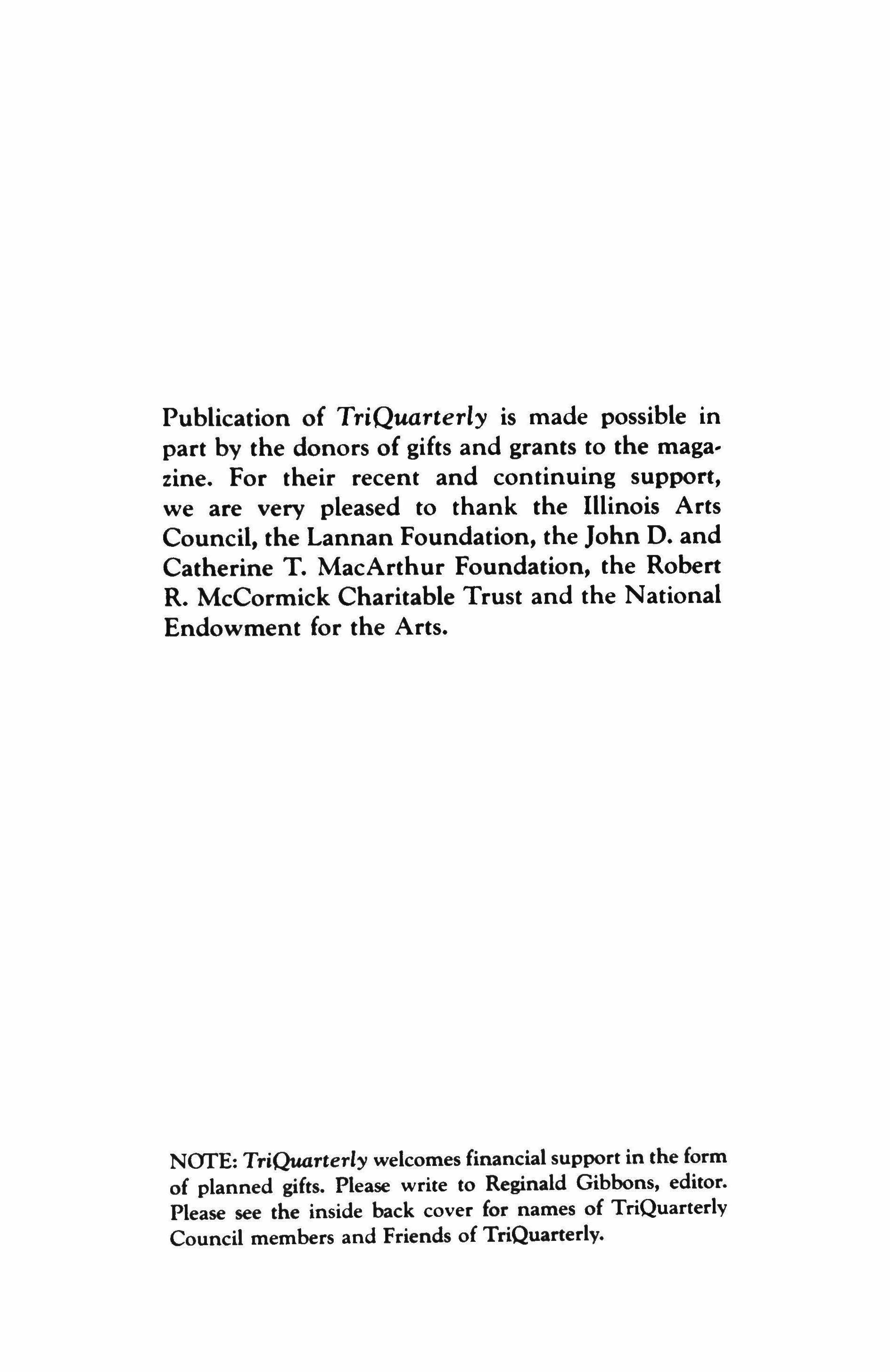
NOTE: TriQu4rterly welcomes financial support in the form of planned gifts. Please write to Reginald Gibbons, editor. Please see the inside back cover for names of TriQuarterly Council members and Friends of TriQuarterly.
Fall 1989
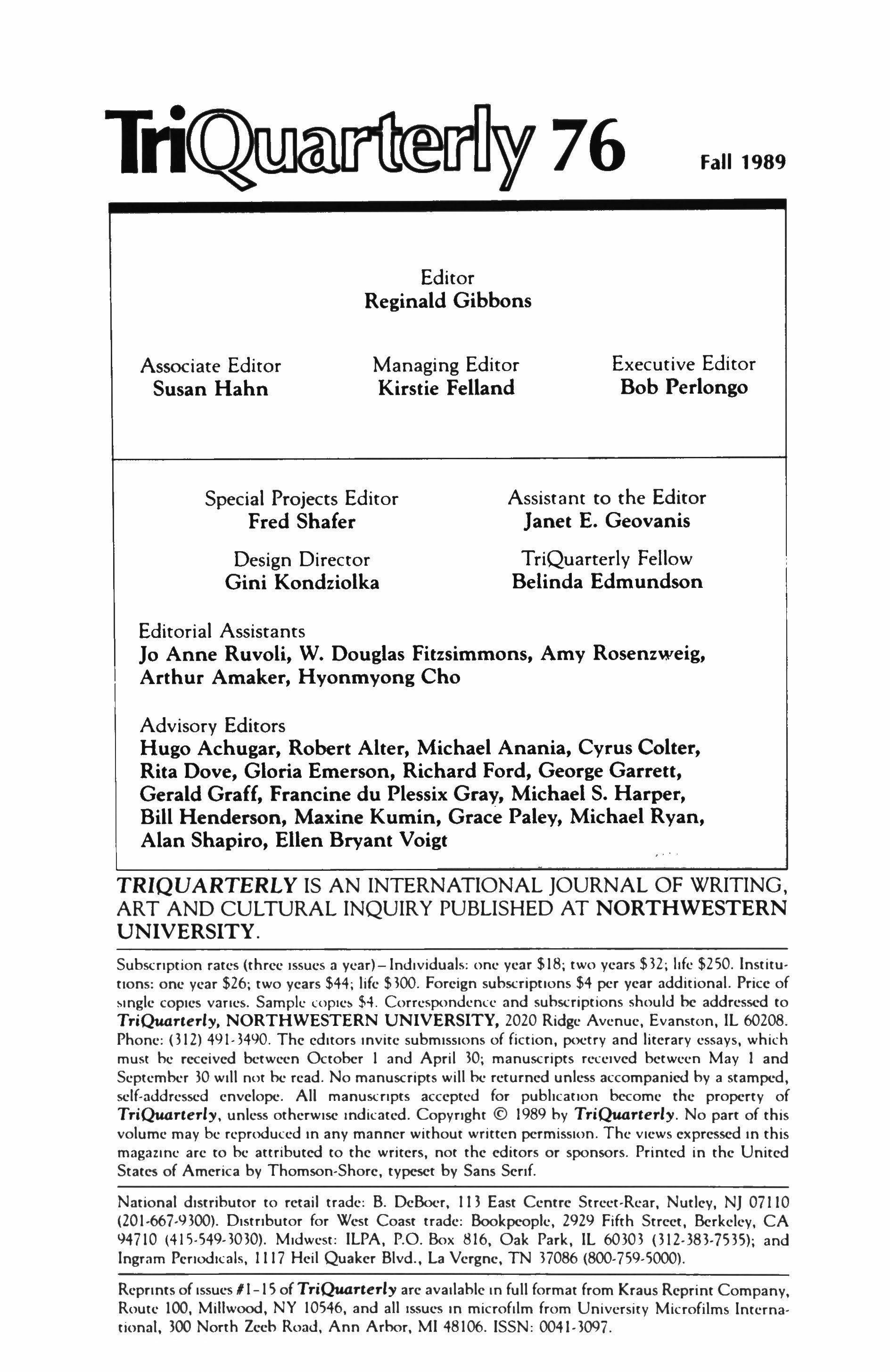
Associate Editor Susan Hahn
Editor Reginald Gibbons
Managing Editor Kirstie Felland
Special Projects Editor Fred Shafer
Design Director Gini Kondziolka
Editorial Assistants
Executive Editor Bob Perlongo
Assistant to the Editor Janet E. Geovanis
TriQuarterly Fellow Belinda Edmundson
Jo Anne Ruvoli, W. Douglas Fitzsimmons, Amy Rosenzweig, Arthur Amaker, Hyonmyong Cho
Advisory Editors
Hugo Achugar, Robert Alter, Michael Anania, Cyrus Colter, Rita Dove, Gloria Emerson, Richard Ford, George Garrett, Gerald Graff, Francine du Plessix Gray, Michael S. Harper, Bill Henderson, Maxine Kumin, Grace Paley, Michael Ryan, Alan Shapiro, Ellen Bryant Voigt
TRIQUARTERLY IS AN INTERNATIONAL JOURNAL OF WRITING, ART AND CULTURAL INQUIRY PUBLISHED AT NORTHWESTERN UNIVERSITY.
Subscription rates (three Issues a year)-Indlviduak one year $18; two years $32; life $250. lnsritunons: one year $26; two years $44; life $ 300. Foreign subscripnons $4 per year additional. Price of 'Ingle copies vanes. Sample copies $4. Correspondence and subscriptions should be addressed to TriQuarlerly, NORTHWESTERN UNIVERSITY, 2020 Ridge Avenue, Evanston, IL 60208. Phone: (12) 491· 34l}0. The editors Invite subrmssrons of fiction, poetry and literary essays, which must be received between October I and April 30; manuscripts received between May I and September 30 WIll not be read. No manuscripts will be returned unless accompanied by a stamped, self-addressed envelope. All manuscripts accepted for publication become the property of TriQuarlerly, unless otherwise indicated. Copvnghr © 1989 by TriQuarlerly. No part of this volume may be reproduced In any manner without written permission. The views expressed In this magazine are to be attributed to the writers, not the editors or sponsors. Printed in the United States of America by Thomson-Shore, typeset by Sans Senf.
National distributor to retail trade: B. DeBoer, 113 East Centre Street-Rear, Nutley, NJ 07110 (201-667·9300). DIstributor for West Coast trade: Bookpeoplc, 2929 Fifth Street, Berkeley, CA 94710 (415·549·3030). MIdwest: ILPA, P.O. Box 816, Oak Park, IL 60303 012·383·7535); and Ingram Pcnodicals. 1117 Heil Quaker Blvd., La Vergne, TN 37086 (800·759·5000).
Reprints of Issues 11-15 of TriQuarlerly are available In full format from Kraus Reprint Company, Route 100, Millwood, NY 10546, and all issues In microfilm from University Microfilms lnrernanonal, 300 North Zeeb Road, Ann Arbor, MI 48106. ISSN: 0041·3097.
76
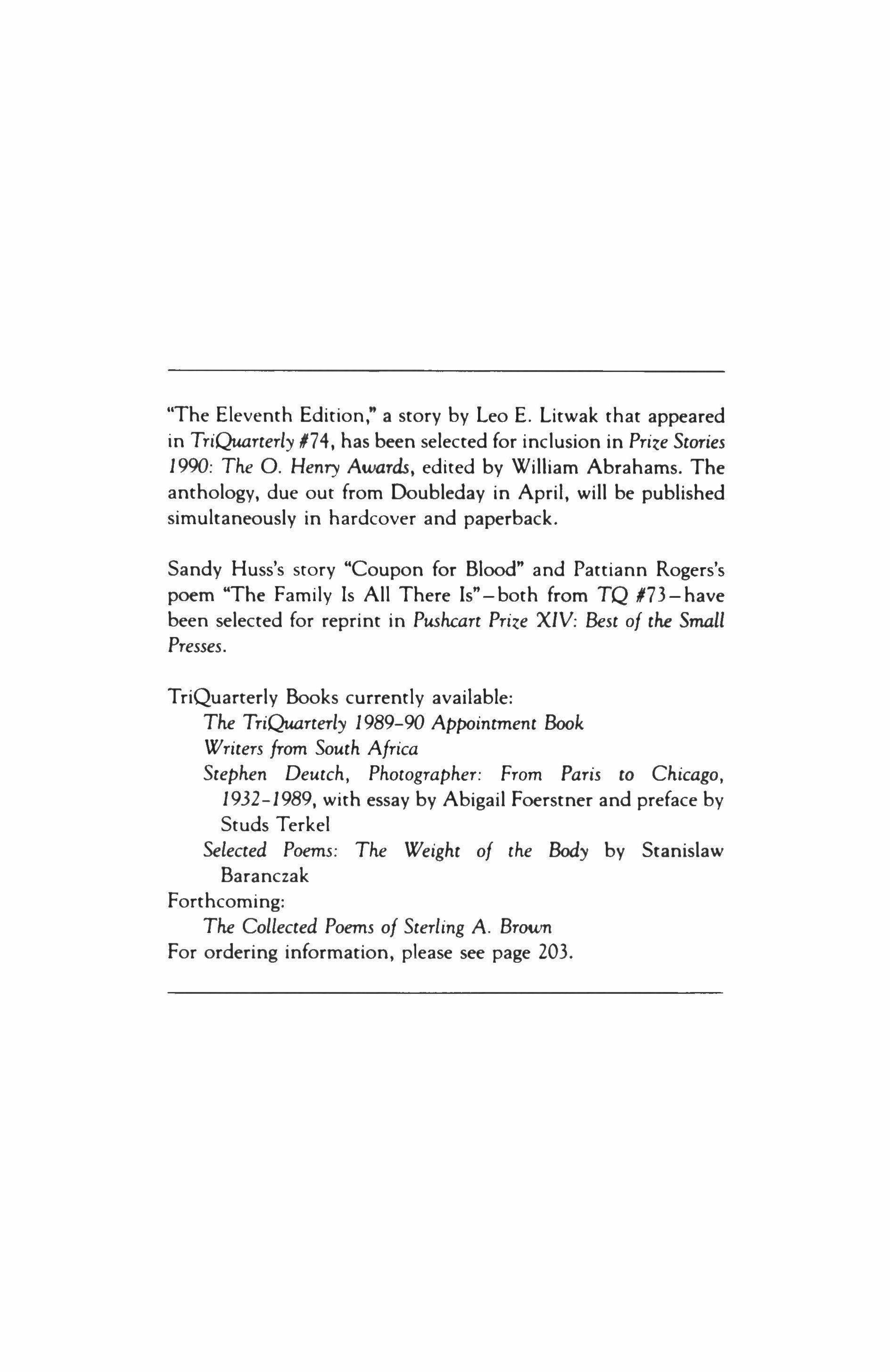
"The Eleventh Edition," a story by Leo E. Litwak that appeared in TriQuarterly 174, has been selected for inclusion in Prize Stories 1990: The 0. Henry Awards, edited by William Abrahams. The anthology, due out from Doubleday in April, will be published simultaneously in hardcover and paperback.
Sandy Huss's story "Coupon for Blood" and Pattiann Rogers's poem "The Family Is All There Is" - both from TQ #73 - have been selected for reprint in Pushcart Prize XIV: Best of the Small Presses.
TriQuarterly Books currently available:
The TriQuarterly 1989-90 Appointment Book Writers !rom South Africa
Stephen Deutch, Photographer: From Paris to Chicago, 1932-1989, with essay by Abigail Foerstner and preface by Studs Terkel
Selected Poems: The Weight of the Body by Stanislaw Baranczak
Forthcoming:
The Collected Poems of Sterling A. Brown For ordering information, please see page 203.

Contents FICTION Love Out of Bounds 5 Ami Sands Brodoff Simplifying 17 Christopher McIlroy Fado 35 Katherine Vaz Amazing............................... 48 Francine Prose Going Out Dan Chaon Taco Mask Steve Fisher 60 74 POETRY The Island Women of Paris; Political; And Counting; In a Neutral City 86 Rita Dove Mysterious-Shape Quilt Top, Anonymous, Oklahoma 90 Sandra McPherson Nursing Home Andrew Glaze Mowing 94 Stuart Dybek 93 Your Man. 96 Patricia Smith Post-Larkin Triste 98 Mary Karr The Children of Mechanics 100 Joseph Gastiger 3

Evensong; Road Overgrown 102 Michael Dennis Browne Life After; Post-Op, January Ice Storm; Waiting Room ................•..•...... 104 Sandra Steingraber Mary; Oral History 107 Lisel Mueller Four Poems from YEA; Two Poems from OF 109 Cid Corman From a Compostella Diptych: Part I: France: The Ways 113 John Matthias MEMOIR Budapest, 1944 Peter Kenez 123 ESSAYS Not a Beautiful Picture: On Robert Frank 146 W. S. t» Piero The Flexible Rule: An Essay on the Ethical Imagination Alan Shapiro 166 A False Mustache, A Frozen Swan: The Holocaust from a Distance 186 Robert Pinsky CONTRIBUTORS 200
by
Phocographs on pages 159 and 163 by Robert Frank 4
COtler design
Gini Kondziolka
Love Out of Bounds
Ami Sands Brodoff
 fOT Michael
fOT Michael
II don't live here anymore but myoid key still jingles on the chain mixed in with all the new ones. The deadbolt slides back without making a sound and I'm inside, feeling like a burglar.
Doren is standing at the top of the stairs, a beam of light touching his hair and beard. He's holding a doll I recognize immediately. That delicate ivory lady is Mom's favorite from her collection of doctor dolls. I wonder how Doren has slipped her from the glass display case since our mother is the only one with the key.
"Hey 0," I call up to him, trying to sound bright and normal. My brother runs down the spiral stairs, his upper body erect and still, just like Dad's when he jogs in place before bed. "Deeb, it's good to see you."
"Hey Sarah." He looks at me expressionlessly.
"I heard you were home and I wanted to come see ."
"See what?"
I look at my older brother. He is all sucked out, whippet-thin. Last time I saw him he was almost stocky like Dad. Now, he borders on emaciation. His eyes are as beautiful as ever: hazel with a dash of yellow in the center, changing color depending on what he wears. Today, they are a startling green that makes me think of traffic lights. His new beard is streaked russet, crusted in places with a dry yellow resembling egg yolk.
"I wanted to see you," I answer, moving to hug him. Doren's body
5

stiffens as though about to be struck, but I embrace him anyway. He mimics my hug, thin arms like a robot's.
"What have you been up to?" I ask.
"Thinking. Just thinking." His eyes stare into blank space, unfocused and glassy.
"That's good. You're better, Deeb, you're home."
"That proves my mind doesn't sound. They disguised those controls but they still snap."
We are both quiet for several moments. "What are you thinking about, Deeb?"
"I have too many thoughts. All sorts of thoughts come to me. Take that ashtray." He lifts the heavy crystal ashtray from the marble elephant whose back is a coffee table. "They put my ashes in there, but there are hundreds of other things I'm connected to simultaneously."
"Like what?"
"I can't get specific." He looks irritated. "North, South, East and West. Thoughts stream in from four different directions." He shrugs. "These thoughts don't mean anything to me. But I get distracted. They forget what I'm saying."
"Who? Mom and Dad?"
Doren's lips work, a gesture between chewing and speaking though he does neither.
"They coming home tonight?" I ask.
"Still shrinking in Vegas."
"Oh yeah. Mom gives her paper tomorrow. 'Boredom and Anxiety: The Ineluctable Link.'" I look to my brother for a smile or a snicker but I've already lost him. He gazes out the bay window toward the spacious, manicured lawn that sprawls away from the house. It is blazingly green, as if lacquered. Late afternoon sun streams in, casting a funnel of light on the hardwood floor. My brother stands in the orange light, rubbing his hands together as if to warm them over a fire.
"Over here," I say, not making much sense, thinking how lonely and unreal it is to miss someone who's right there. Doren comes over to me, tenderly rubs his face against mine, then pats my cheeks with both his hands, chanting.
Ah sista goah, I love you and the pack I give you juice and candy to make them both go back
I join in and we chant and chant and chant. When we were kids, our private language muffled the sounds of Mom and Dad downstairs, their
6

voices sharpened like instruments. Doren caresses the scarlet sleeve of my sweater. "I have one for you, Deeb, in green. Extra tall. Shall 1 get it from my suitcase?"
"No. Stay. Right. Here." His eyes get vacant, then terrified. "Can you see me?"
There's a burning behind my eyes. For a moment, the tears feel like someone else's. "Yes, Deeb, 1 can, even from far away."
My brother smiles. " 'Home is the place where, when you have to go there, they have to take you in,'" he says.
"Was it unbearable at the hospital, Deeb? How did you get out of there?"
"No bolt was necessary. When I'm without, she's gone kidnapping. 1 reimburse that equilibrium. But you," he finishes, "1 love out of bounds."
For me, it's his most lucid sentence all afternoon.
That night, I dream of Doren's car. I see the headlight eyes, hood ornament nose and wide grille mouth approach me on the road. 1 get in, zoom down the highway, Springsteen's "Spirit of the Night" on the radio. Suddenly, the car stops, its motor still running, ragged and guttural. 1 get out, open the hood, tinker with the car's innards. Soon, I'm tangled in a sinewy web of wires: one tube is fastened to a vein at my wrist; another feeds me through the nose; a thick bandage-colored cylinder pumps air in and out of a perfect hole in my throat. A shadowy figure unhinges me from the car. My body writhes and twitches in rhythmic spasms. Ghost-Man stands by transfixed, like he's watching the scene on television.
1 wake up shivering and sweating, the sheets cold, damp towels over my body. Downstairs, 1 make a cup of hot, sweet tea and drink it in a bubble bath, imagining the bliss of pure black space, a deep and dreamless sleep.
II
Morning brings one of those dazzling days of early spring and 1 take my coffee out to our circular driveway. Sun glints off Doren's derelict red Chevy, its body bruised and cratered from a series of crack-ups. Takeout coffee cups, squashed beer cans, piles of clothes for every season, an upended box of kitty litter and butts and ashes from dozens of cigarettes coat the upholstery and carpet. The car looks like an SRO someone hid
7
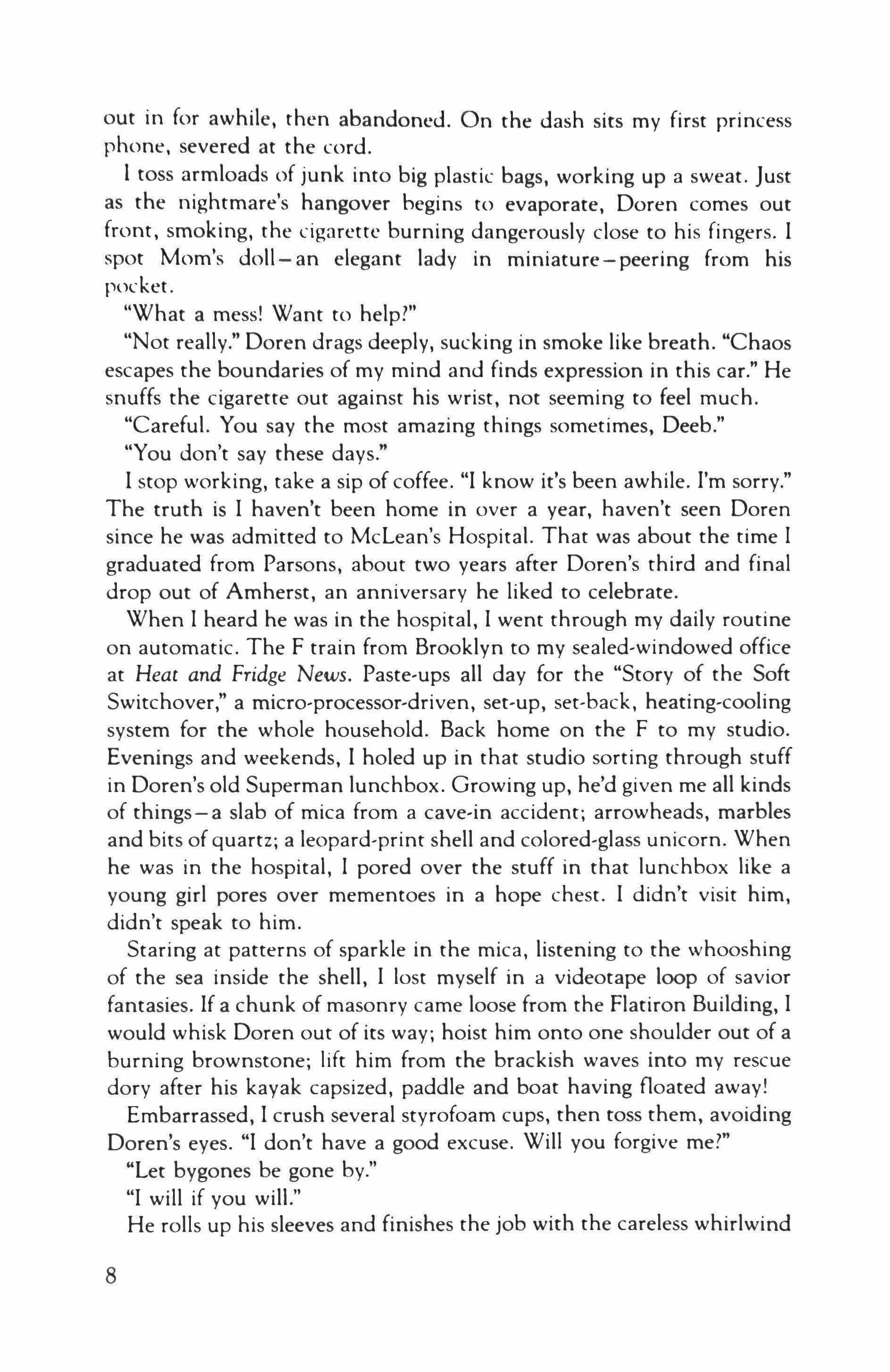
out in for awhile, then abandoned. On the dash sits my first princess phone, severed at the cord.
I toss armloads of junk into big plastic bags, working up a sweat. Just as the nightmare's hangover hegins to evaporate, Doren comes out front, smoking, the cigarette burning dangerously close to his fingers. I spot Mom's doll- an elegant lady in miniature-peering from his pocket.
"What a mess! Want to help?"
"Not really." Doren drags deeply, sucking in smoke like breath. "Chaos escapes the boundaries of my mind and finds expression in this car." He snuffs the cigarette out against his wrist, not seeming to feel much.
"Careful. You say the most amazing things sometimes, Deeb."
"You don't say these days."
I stop working, take a sip of coffee. "I know it's been awhile. I'm sorry." The truth is I haven't been home in over a year, haven't seen Doren since he was admitted to Mcl.ean's Hospital. That was about the time I graduated from Parsons, about two years after Doren's third and final drop out of Amherst, an anniversary he liked to celebrate.
When I heard he was in the hospital, I went through my daily routine on automatic. The F train from Brooklyn to my sealed-windowed office at Heat and Fridge News. Paste-ups all day for the "Story of the Soft Switchover," a micro-processor-driven, set-up, set-back, heating-cooling system for the whole household. Back home on the F to my studio. Evenings and weekends, I holed up in that studio sorting through stuff in Doren's old Superman lunchbox. Growing up, he'd given me all kinds of things-a slab of mica from a cave-in accident; arrowheads, marbles and bits of quartz; a leopard-print shell and colored-glass unicorn. When he was in the hospital, I pored over the stuff in that lunchbox like a young girl pores over mementoes in a hope chest. I didn't visit him, didn't speak to him.
Staring at patterns of sparkle in the mica, listening to the whooshing of the sea inside the shell, I lost myself in a videotape loop of savior fantasies. If a chunk of masonry came loose from the Flatiron Building, I would whisk Doren out of its way; hoist him onto one shoulder out of a burning brownstone; lift him from the brackish waves into my rescue dory after his kayak capsized, paddle and boat having floated away! Embarrassed, I crush several styrofoam cups, then toss them, avoiding Doren's eyes. "I don't have a good excuse. Will you forgive me?"
"Let bygones be gone by."
"I will if you will."
He rolls up his sleeves and finishes the job with the careless whirlwind
8
of motion he reserves for all household chores. After we cart the last garbage bag out to the dump, Doren looks at his wrist, though he has no watch.
"C'mon," he says. "Time to blow this insalubrious locale."
"I'll drive." He tosses me the keys.
We head southwest on the Deegan, cross the G.W. Bridge and continue on the Jersey Turnpike through the flatlands.
"Uglification, next twenty miles," says Doren, and he is right. We're deep into a geometric wilderness of plant-works and manufactory. Oil refineries spew forth continuous eddies of smoke and blue-orange orbs offlame seem to light the grimy sky from within. It's an iridescent play of color you just don't see in Nature. Just as we're beginning to appreciate the surreal beauty, the landscape turns lush, as quick as a scene-change in the movies.
My brother points to a gargantuan billboard that seems to take up our whole visual field. A colorful globe whirls bull's-eye center.

LAND OF FANTASY AND WONDER
2 miles COLOSSAL COSMOS
Doren makes the thumbs-up sign and I follow arrows around several sharp curves.
500 ELECTRIFYING RIDES
FAMILY FUN AT ITS BEST!
COLOSSAL COSMOS-l mile
We hadn't planned a destination but these corny signs have me hooked. When we finally pass through the gilded, curlicued gate, I want trumpets to sound, feeling just like Dorothy entering Oz. We can already hear the low, thunderous rumbling from the killer coasters, long, drawn-out shrieks and cries and disembodied Muzak lilting out of hidden loudspeakers everywhere.
9
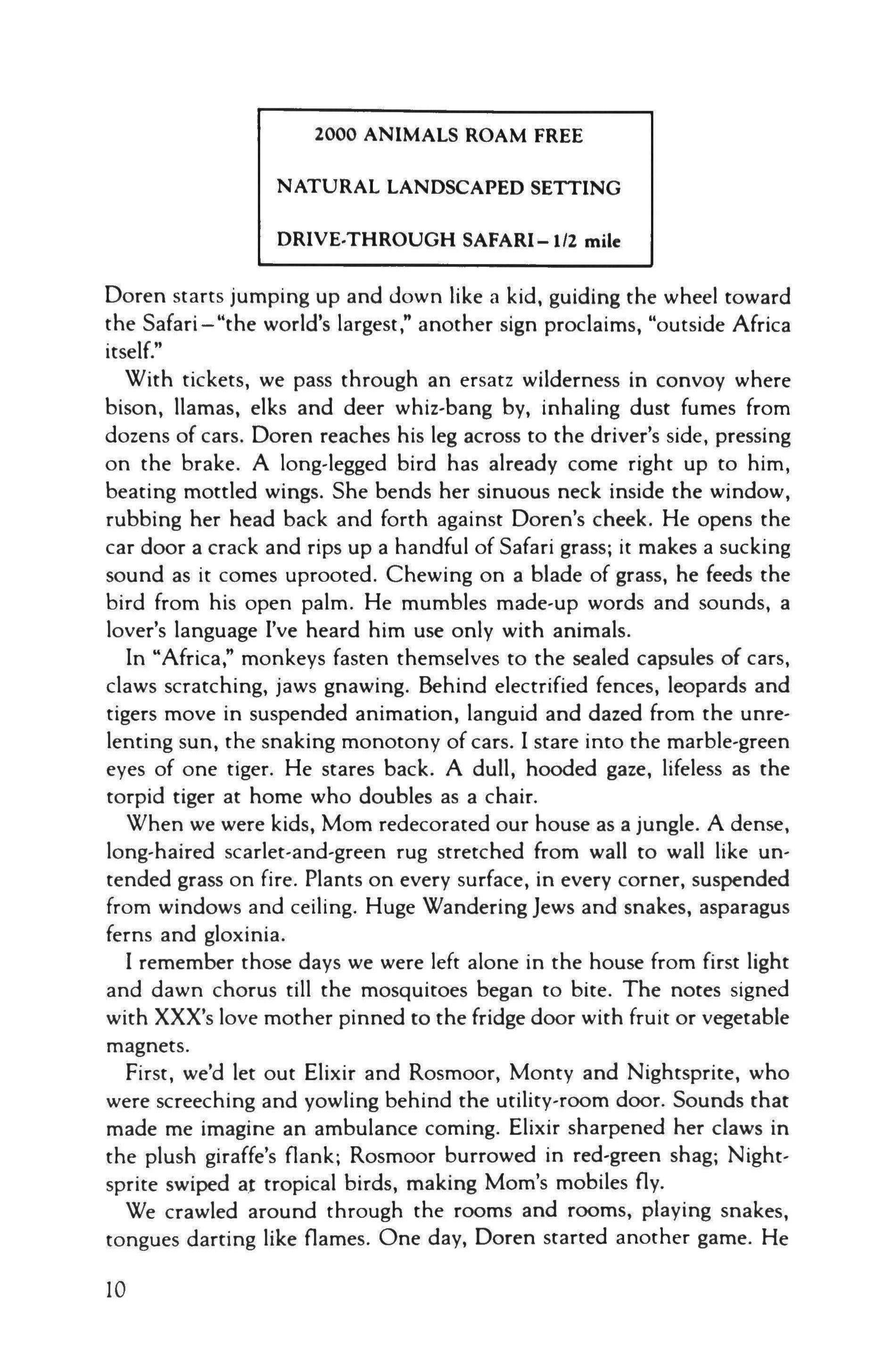
ZOOO ANIMALS ROAM FREE
NATURAL LANDSCAPED SETTING
DRIVE·THROUGH SAFARI-liZ mile
Doren starts jumping up and down like a kid, guiding the wheel toward the Safari - "the world's largest," another sign proclaims, "outside Africa itself."
With tickets, we pass through an ersatz wilderness in convoy where bison, llamas, elks and deer whiz-bang by, inhaling dust fumes from dozens of cars. Doren reaches his leg across to the driver's side, pressing on the brake. A long-legged bird has already come right up to him, beating mottled wings. She bends her sinuous neck inside the window, rubbing her head back and forth against Doren's cheek. He opens the car door a crack and rips up a handful of Safari grass; it makes a sucking sound as it comes uprooted. Chewing on a blade of grass, he feeds the bird from his open palm. He mumbles made-up words and sounds, a lover's language I've heard him use only with animals.
In "Africa," monkeys fasten themselves to the sealed capsules of cars, claws scratching, jaws gnawing. Behind electrified fences, leopards and tigers move in suspended animation, languid and dazed from the unrelenting sun, the snaking monotony of cars. I stare into the marble-green eyes of one tiger. He stares back. A dull, hooded gaze, lifeless as the torpid tiger at home who doubles as a chair.
When we were kids, Mom redecorated our house as a jungle. A dense, long-haired scarlet-and-green rug stretched from wall to wall like untended grass on fire. Plants on every surface, in every corner, suspended from windows and ceiling. Huge Wandering Jews and snakes, asparagus ferns and gloxinia.
I remember those days we were left alone in the house from first light and dawn chorus till the mosquitoes began to bite. The notes signed with XXX's love mother pinned to the fridge door with fruit or vegetable magnets.
First, we'd let out Elixir and Rosmoor, Monty and Nighrsprite, who were screeching and yowling behind the utility-room door. Sounds that made me imagine an ambulance coming. Elixir sharpened her claws in the plush giraffe's flank; Rosmoor burrowed in red-green shag; Nightsprite swiped at tropical birds, making Mom's mobiles fly.
We crawled around through the rooms and rooms, playing snakes, tongues darting like flames. One day, Doren started another game. He
10
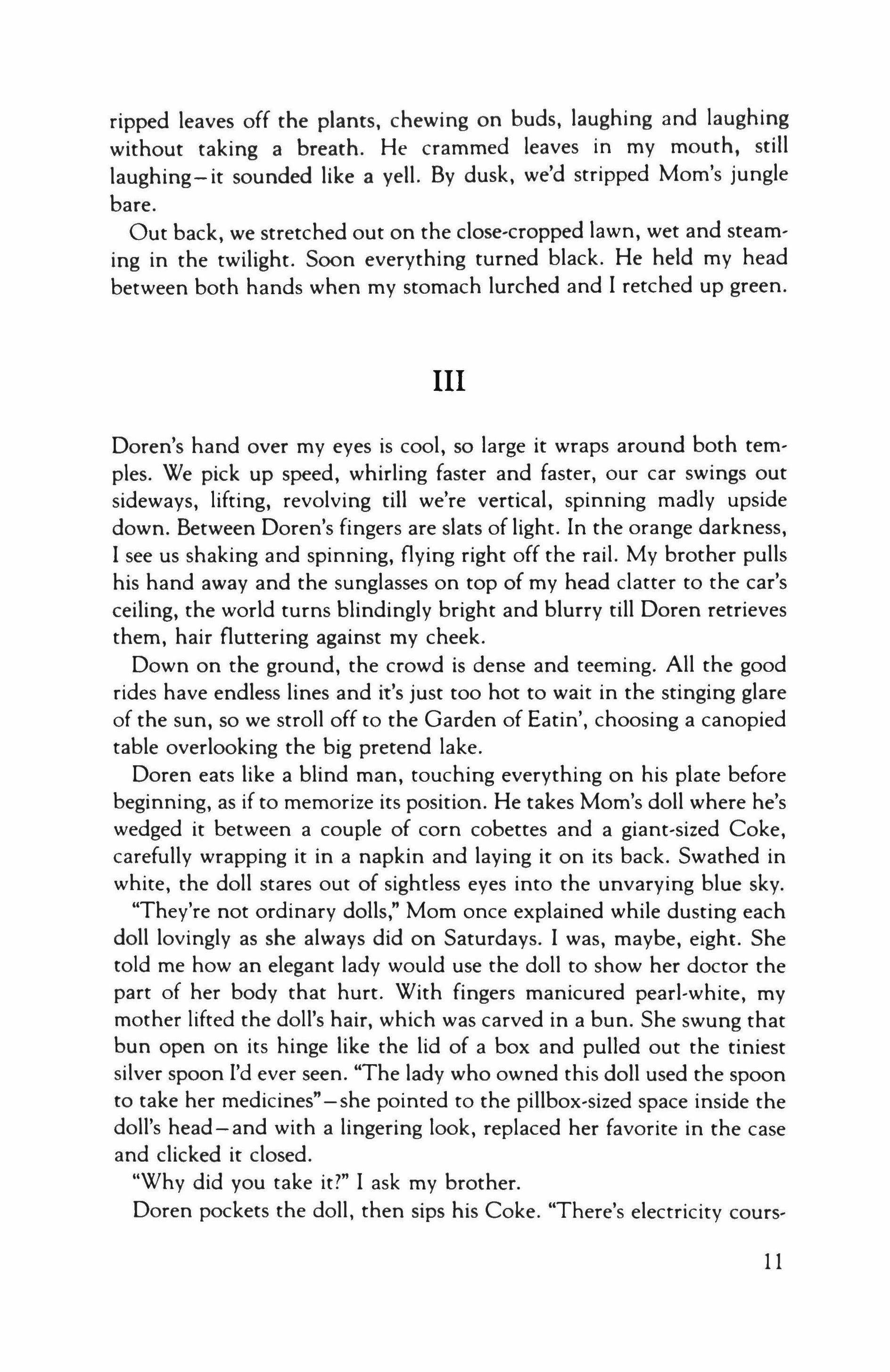
ripped leaves off the plants, chewing on buds, laughing and laughing without taking a breath. He crammed leaves in my mouth, still laughing - it sounded like a yell. By dusk, we'd stripped Morn's jungle bare.
Out back, we stretched out on the close-cropped lawn, wet and steaming in the twilight. Soon everything turned black. He held my head between both hands when my stomach lurched and I retched up green.
III
Doren's hand over my eyes is cool, so large it wraps around both temples. We pick up speed, whirling faster and faster, our car swings out sideways, lifting, revolving till we're vertical, spinning madly upside down. Between Doren's fingers are slats of light. In the orange darkness, I see us shaking and spinning, flying right off the rail. My brother pulls his hand away and the sunglasses on top of my head clatter to the car's ceiling, the world turns blindingly bright and blurry till Doren retrieves them, hair fluttering against my cheek.
Down on the ground, the crowd is dense and teeming. All the good rides have endless lines and it's just too hot to wait in the stinging glare of the sun, so we stroll off to the Garden of Eatin', choosing a canopied table overlooking the big pretend lake.
Doren eats like a blind man, touching everything on his plate before beginning, as if to memorize its position. He takes Morn's doll where he's wedged it between a couple of corn cobettes and a giant-sized Coke, carefully wrapping it in a napkin and laying it on its back. Swathed in white, the doll stares out of sightless eyes into the unvarying blue sky.
"They're not ordinary dolls," Morn once explained while dusting each doll lovingly as she always did on Saturdays. I was, maybe, eight. She told me how an elegant lady would use the doll to show her doctor the part of her body that hurt. With fingers manicured pearl-white, my mother lifted the doll's hair, which was carved in a bun. She swung that bun open on its hinge like the lid of a box and pulled out the tiniest silver spoon I'd ever seen. "The lady who owned this doll used the spoon to take her medicines"-she pointed to the pillbox-sized space inside the doll's head - and with a lingering look, replaced her favorite in the case and clicked it closed.
"Why did you take it?" I ask my brother.
Doren pockets the doll, then sips his Coke. "There's electricity cours-
11

ing through my veins." He is matter-of-fact. "If I.Q. doesn't circuit short, I'll shock people."
I concentrate on figuring I.Q., blocking the rest. Ivory Queen. An easy one. Doren upturns the doll like a saltshaker, spilling the tiny colored pills from inside its head into his palm.
"Wouldn't it be better if you took those?"
He pours them back into the Ivory Queen and smiles. "I already get medicine secretly. She's got a syringe inside her, pumps it right into my bloodstream."
I feel a funny pulsing in my neck. "C'mon, Deeb. You don't have to pull that on me."
Doren sighs deeply.
"Doesn't the medicine help?"
"Yeah sure. If you like being buried thousands of miles below the earth and windowless." Doren double-crosses his legs, wrapping himself into a caduceus.
"That's awful. Maybe the dose is too high?"
Doren unravels his legs. "I forgot," he says, getting up from the table. In five minutes, he's back with coffee and a handful of gem-colored swizzle sticks, their tips molded into tiny figures of Adam, Eve and the Serpent.
"Adam and Eve in the Garden of Eatin'. Can I have those?" It always calms me to collect things for the Superman lunchbox. I reach for the mixers but Doren pulls them away.
"You can't go on saving so many things," he says, snapping them in two. "Now, that's better, isn't it?"
"Sometimes, I can't stand you." Can't stand. Don't want to know. Like in high school at Treemont. I'm waiting by my locker. See Ross coming, Doren just behind. My brother's wearing stuff that doesn't fit or match; he's shaved his head for no apparent reason. He stops, freeze-frame, listening, as to a voice out of earshot or some pressure beneath all the other voices. I link my arm through Ross's. Doren's breath at the back of my neck, that funny pulsing, as if a small animal were trapped there. I want to blast out of there like a bat out of hell or some other creature that hasn't yet been created. I pull Ross down the long, dark hall, turning back before we round the corner. Doren gives me a weird smile, his mouth stretched tight, all his teeth showing. It reminds me of that painting, "The Scream," the woman suspended in the road, she's shutting her ears to something deafening though all around her is silence. Hundreds of kids went to Treemont. At least ten of them were Solomons. Only a few people knew for sure Doren and I were related.
12

I feel my brother's knee tapping restlessly under the table.
"Ready for the mind-bending, brain-blowing, Blockbuster Buccaneer?" he asks, putting an arm around my shoulder.
"You know I'm a wimp about scary rides." But before I can protest further, he's pulling me toward a line so long and labyrinthian, I can't see where it begins or ends.
IV
The ticket-taker rips coupons from our booklets and we're part of the line, enclosed behind velveteen ropes. The queue is as dense and long as any line for a newly-released film, Saturday night, in the Village. Up ahead, an outsized owl consults a Salvador Dali watch. "One hour till you board the Buccaneer."
"This is nuts, Deeb." I consult my watch, as if we're due somewhere soon. "We've got better things to do
Doren shakes his head, gives me a toxic look.
"Patience, patience," he says. "The day is a clock without hands."
A middle-aged woman on her own turns around, stares at Doren, then winks. I catch a glimpse of what she's reading; it's Kafka's short stories.
I see people getting off, lining up again. Incredible. I'm trying to fathom out the pull of this place, a come-on that breaks through all kinds of boundaries. Everybody's dying to relinquish control, to surrender.
"No matter how many times you zoom up and down this thing, you know you'll get to the bottom in one piece," I say to my brother.
"The velocity's the same, the peril's predictable," he answers.
The woman ahead of us turns around again and smiles winningly at Doren. There's some rapport there.
I fall into a trance observing a cool-looking androgynous couple in peekaboo Spandex. They're holding hands, each in separate worlds. She's eating a candy apple layer by layer, picking off the nuts, then chewing on the caramel. He's listening to his Walkman, bopping to the beat. It's turned up so loud, I can hear the tinny rhythm seeping through the phones. "Dontcha want somebody ta love. Dontcha need somebody Watching them makes me lonely as hell but, like picking a scab, once I start, I can't stop.
My worst days these past months, I've lived my life from inside a spacesuit. Everyone's voice sounds metallic and strange, distant, without
13

color and muddled like bees buzzing. It's the background noises-traffic horns beeping, trees rustling, children whispering and weeping-that are deafening. It takes all my concentration to make out what people are saying. My own name-Sarah Solomon-starts to sound strange, too, like I've never heard it before. I repeat it over and over in my head but the name has been cut off from the language by a knife. I can't picture my face, either. I have to reconstruct it the way you do when you've just met someone and want to visualize their features. I pretend I'm in lifedrawing class, with me as the model. First, I draw in one almond-shaped eye, then another; next, the thin straight nose, small mouth, upturned chin and long neck. While I draw, I recite out loud the story of what I'm doing, third-person-journal style, everything happening right now. Just a few minutes of head drawing and third-person journal is usually enough to do the trick. I coalesce.
What's important, I can always function on the outside, even with all this brain cacophony going on. At times, I wonder if this is the only thing that makes me different from Doren. I admit, it's a struggle, like trying to sing a favorite song in your head while another one is playing. But I can do that. It's my gift.
I hear a pealing roar reverberating from the coaster; it sounds like an airplane about to land on our heads. Only ten people are ahead of us now and each car takes two.
A big sign in bold block letters warns that this ride is not recommended for pregnant women, people with heart conditions, people with back or neck ailments, people with disabilities, those subject to motion sickness, and anyone under the influence of alcohol or drugs. I begin to panic.
"You go." I touch Doren's shoulder. "I'll watch, take pictures." I rummage around in my shoulderbag for the portable camera.
"No way, S.O.S. You gotta get dirty with life."
I notice all the cars have headlights, though under the bright glare of the sun they're barely visible. A red car glides up, jolts to a stop. Only one headlight. A cyclops. I want to mention this to the guard but feel stupid. The headlights serve no function.
The watchman puts out his hand to help me in, Doren slides beside me. The safety bar grazes our thighs as it locks into place. Another sharp jolt and we're moving. The car makes a clackety-clacking noise as it rises up the first steep incline.
At the peak, we idle for a split second; I see the pulse-movement of people way below, one amoeba-like organism, moving, spreading in
14
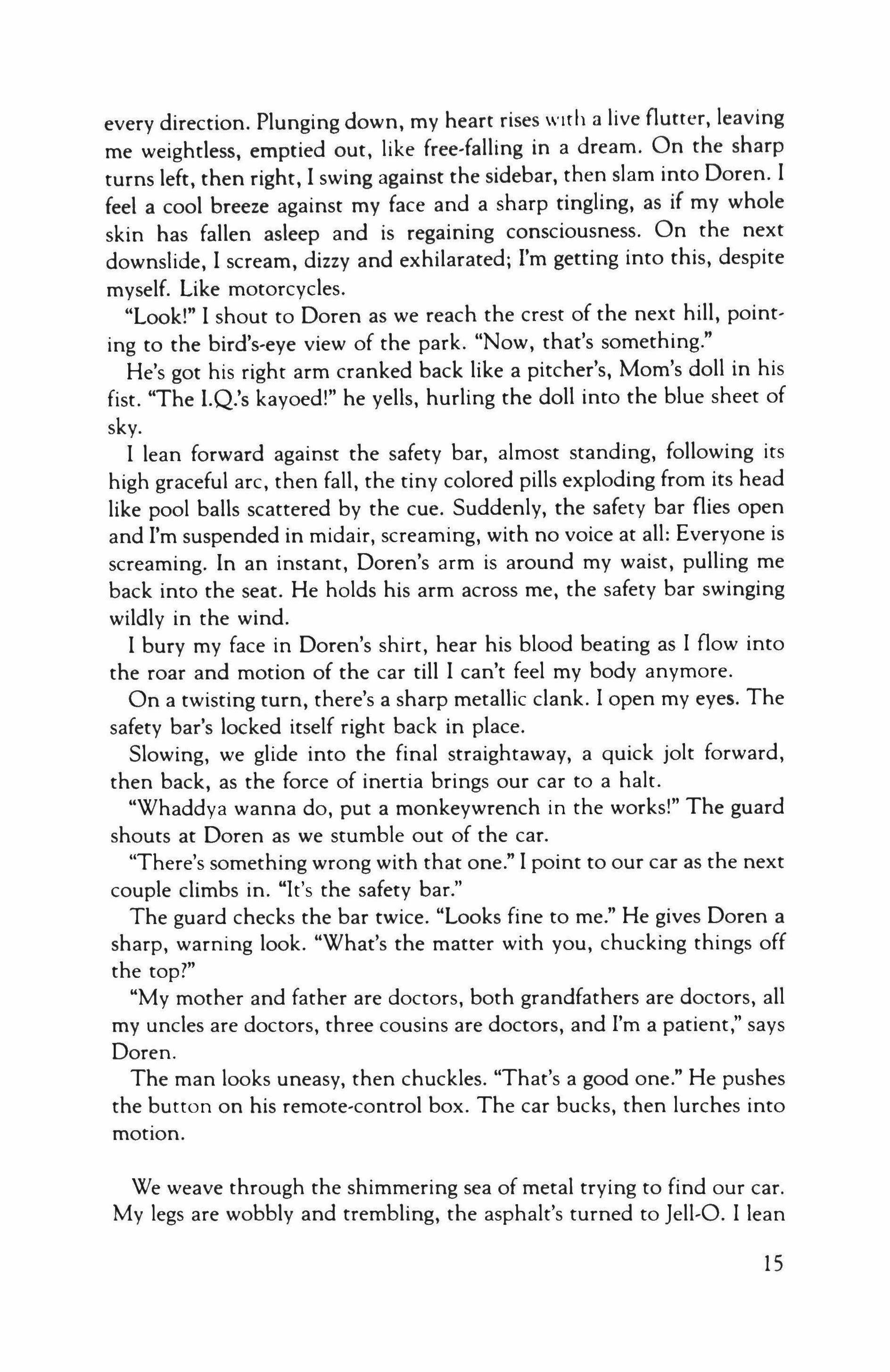
every direction. Plunging down, my heart rises with a live flutter, leaving me weightless, emptied out, like free-falling in a dream. On the sharp turns left, then right, I swing against the sidebar, then slam into Doren. I feel a cool breeze against my face and a sharp tingling, as if my whole skin has fallen asleep and is regaining consciousness. On the next downslide, I scream, dizzy and exhilarated; I'm getting into this, despite myself. Like motorcycles.
"Look!" I shout to Doren as we reach the crest of the next hill, pointing to the bird's-eve view of the park. "Now, that's something."
He's got his right arm cranked back like a pitcher's, Mom's doll in his fist. "The I.Q.'s kayoed!" he yells, hurling the doll into the blue sheet of sky.
I lean forward against the safety bar, almost standing, following its high graceful are, then fall, the tiny colored pills exploding from its head like pool balls scattered by the cue. Suddenly, the safety bar flies open and I'm suspended in midair, screaming, with no voice at all: Everyone is screaming. In an instant, Doren's arm is around my waist, pulling me back into the seat. He holds his arm across me, the safety bar swinging wildly in the wind.
I bury my face in Doren's shirt, hear his blood beating as I flow into the roar and motion of the car till I can't feel my body anymore.
On a twisting turn, there's a sharp metallic clank. I open my eyes. The safety bar's locked itself right back in place.
Slowing, we glide into the final straightaway, a quick jolt forward, then back, as the force of inertia brings our car to a halt.
"Whaddya wanna do, put a monkeywrench in the works!" The guard shouts at Doren as we stumble out of the car.
"There's something wrong with that one." I point to our car as the next couple climbs in. "It's the safety bar."
The guard checks the bar twice. "Looks fine to me." He gives Doren a sharp, warning look. "What's the matter with you, chucking things off the top!"
"My mother and father are doctors, both grandfathers are doctors, all my uncles are doctors, three cousins are doctors, and I'm a patient," says Doren.
The man looks uneasy, then chuckles. "That's a good one." He pushes the button on his remote-control box. The car bucks, then lurches into motion.
We weave through the shimmering sea of metal trying to find our car. My legs are wobbly and trembling, the asphalt's turned to Jell-a. I lean
15

into my brother for balance. A few feet ahead of us, I see a shard of ivory, white against the pavement. I remember all those Saturdays I watched my mother dusting her doll collection. It was easy to imagine the doctor's healing hands palpating the doll as meticulously as a miniaturist might work on a prize painting, while the real woman lay languishing in pain.
"It's like no one noticed, like nothing happened," I say to my brother.
Doren nods. 'Not waving but drowning.'
I stoop to pick up the shattered piece of ivory and hold it in my palm. Nothing in its shape or texture suggests the part of the doll it once formed.
16
Simplifying Christopher
McIlroy

Easter morning Julia was dressed for church, watering her plants, when the air left her, as if her chest, while straining to expand, had flattened. From her knees she dialed 911.
The oxygen mask was a fuzzy lump in her field of vision. Whitejacketed EMTs circled her. At Emergency her gurney flew down the corridor.
Her son Tim stood over the bed, hair awry, shirttail untucked. He squeezed her hand.
After visiting hours the busy noises ceased, replaced by the wheezing of therapeutic machinery, the bellows-like breaths of hospital maintenance systems, punctuated by rhythmic groans of a patient across the hall. Uniform gray light left objects distinct but without relation to each other. Certain her breath would stop if she slept, Julia remained vigilant.
Since the moment was unendurable, she chose another-Tim's first apprehension of her, not as food or warmth, but a person, age four months. She had been swinging him in his canvas pouch. With his every downward swoop she reared back, hands upraised, in open-mouthed astonishment. Tim's laughing shriek squinted his eyes and showed his pink gums. But then he simply stared at her, I know you, you wonderful being. For two or three passes they beamed at each other.
The gray set around her again, like gelatin.
"All this brouhaha for someone who's dying," she said to the nurses and technicians who monitored and tested her the next morning.
No, the doctor insisted. Although bronchitis had degenerated into emphysema, her most acute symptoms were anxiety and fatigue. "You will never lose this disease, and it will shorten your life, but we're talking
17

years," he said. Unless she continued to smoke. "Then you might as well hop under a bus."
"Stay with me tonight," she told Tim. He fussed. "Against hospital regulations, I'm not a watchamacallit, garlic around the neck for vampires, a talisman."
"Make an effort," Julia said
Tim arranged a bed of chairs beside her, and she slept. Within a week prednisone had stabilized respiration, and she was discharged.
When Julia stepped into her townhouse, even the gaudy Persian carpet was stale with her confinement. She had been ill for months before hospitalization. Nothing had changed except she wasn't coughing. She would watch PBS, and attend theater and symphony with her reliable friends. Tim would appear at metronomically-paced intervals. The current agreement was once per three weeks.
Julia tried to organize a routine. Retired two years, she was a zoo docent, but the connection had lapsed. Phoning booked her three days in the zoo's information booth.
Paying for groceries at the supermarket checkout, Julia yearned for a cigarette, that perfect moment when the body relaxed, the smoke jetted through mouth and throat to the lungs, out the nose, a continuity, complete. At even the crinkle of a package in her hand she was swollen with fondness like an escaped balloon. She bought Carltons.
Lighting the cigarette, she hyperventilated, and it burned halfway before she could inhale. She sipped experimentally, drew more deeply. After fifty-three years of a carton a week, she must retrain herself to smoke.
Sunday, when the Unitarian congregation volunteered personal announcements, a man named Philip said, "1 love to cook, but there's no one but myself to enjoy it." He wanted to exchange dinners. A newcomer, he was six-and-a-half feet tall, with a beard like fleece, sooty highlights, to his chest. He wore a gold earring.
To Julia the moment presented itself as a question: am I acting for my life or against it? She felt she existed only through what she did. She stood. "I would like that, too," she said. They agreed on the following Saturday.
Since her husband's death six years before, Julia hadn't "dated," not from deference-they had been divorced sixteen years-but simply believing that whole business was over.
18

Saturday Julia chose a heavy cotton smock, jungle-green threaded with scarlet and yellow. She even brushed on makeup.
Philip's second-floor apartment was one room with bath and kitchenette, walls bare. Though he had lived there two years, stacked books occupied the floor, crowding desk and futon into a corner.
Philip's meal consisted of thin-sliced abalone stir-fried with vegetables, and fat black mushrooms like those unspeakable sea-bottom creatures that one tried to accept as equal living things. The whole was drenched in chili oil.
Crosslegged on a mat, they ate from bowls. The food scalded Julia's mouth and flushed her skin. Their eyes teared, faces dripping sweat. Rocking, they laughed at the ridiculous agony.
"I'll never eat anything like this again," Julia said. "Whoops, no, give me the recipe and I'll cook it for my son. Just kidding."
"He lives with you?"
Julia explained the schedule, one visit every three weeks, that Tim had dictated.
"Grotesque," Philip said. "A crueler deprivation than absence altogether."
"No. At least I have him this much."
Philip was childless. "For my wife and me, making a baby would have implied too much optimism about our future," Philip said.
Tim was an only. "Opportunities for conception in my marriage were rare," Julia said lightly, but again her face burned. She had decided to hold back nothing from Philip. "If we're going to be friends, I don't want to offer myself under false pretenses. I've been through a difficult episode."
"Oh?"
Since childhood Julia's sicknesses inexorably progressed to bronchitis. "I can't sleep with your barking all night," her father had told her. Every winter, for two or three weeks, a month, coughing from a chest cold interrupted conversation, eating and her job as a home visitor for D.E.S. She canceled outings with friends.
The past November a tickle in her throat descended to her lungs. For five months the cough flapped her like a rag. Sleepless at night, Julia fell into afternoon naps on the couch. Without appetite, she drank soup. By Easter catches occurred in her breathing, when the ribcage would lift, diaphragm push-finally, whistling, a shallow expansion of the lungs.
Bent, hacking, Julia felt inescapably herself. Her shame at the noise, helpless jerking, sputum balled in Kleenex, was linked to the profounder
19
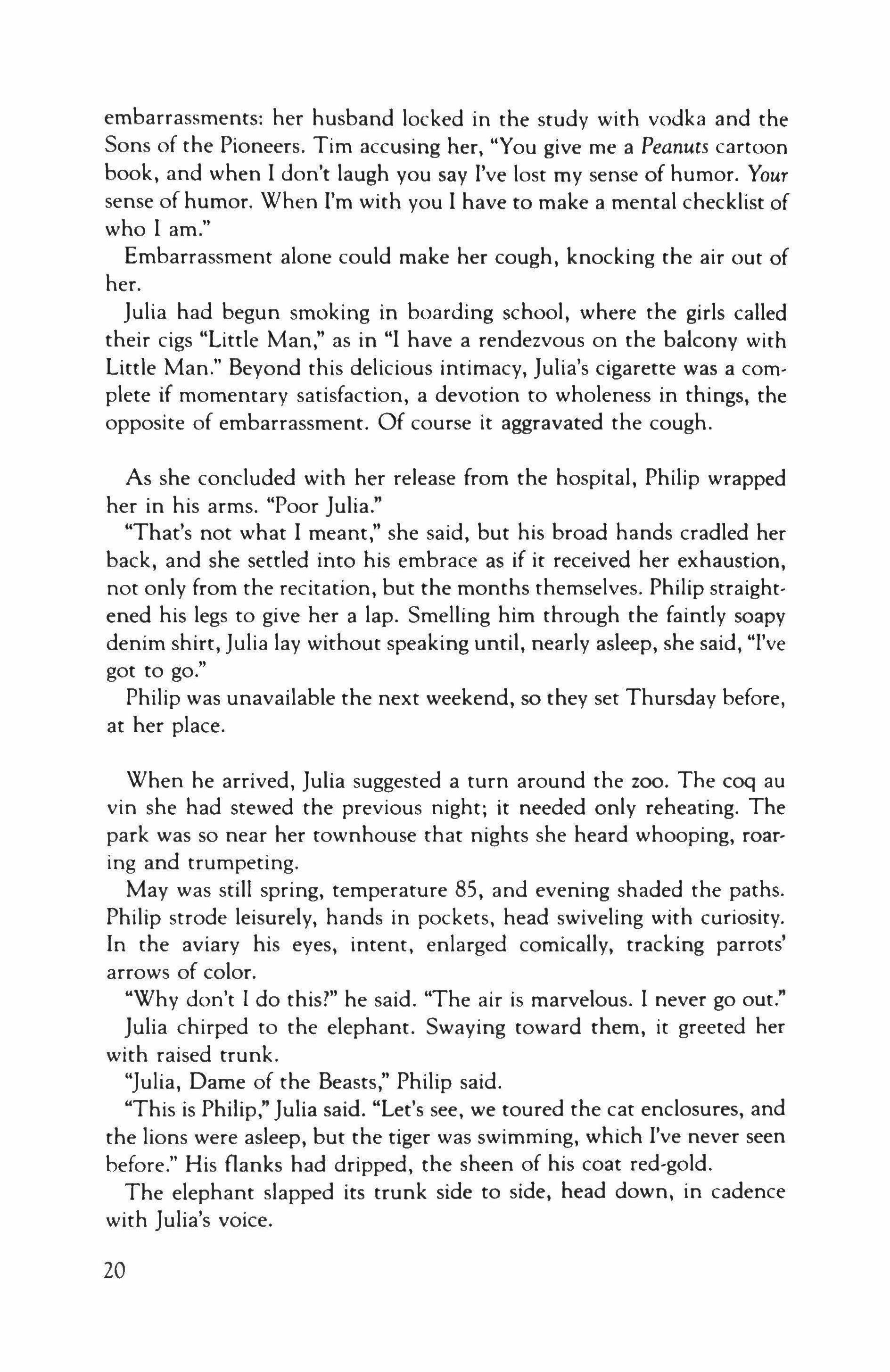
embarrassments: her husband locked in the study with vodka and the Sons of the Pioneers. Tim accusing her, "You give me a Peanuts cartoon book, and when I don't laugh you say I've lost my sense of humor. Your sense of humor. When I'm with you I have to make a mental checklist of who I am."
Embarrassment alone could make her cough, knocking the air out of her.
Julia had begun smoking in boarding school, where the girls called their cigs "Little Man," as in "I have a rendezvous on the balcony with Little Man." Beyond this delicious intimacy, Julia's cigarette was a complete if momentary satisfaction, a devotion to wholeness in things, the opposite of embarrassment. Of course it aggravated the cough.
As she concluded with her release from the hospital, Philip wrapped her in his arms. "Poor Julia."
"That's not what I meant," she said, but his broad hands cradled her back, and she settled into his embrace as if it received her exhaustion, not only from the recitation, but the months themselves. Philip straightened his legs to give her a lap. Smelling him through the faintly soapy denim shirt, Julia lay without speaking until, nearly asleep, she said, "I've got to go."
Philip was unavailable the next weekend, so they set Thursday before, at her place.
When he arrived, Julia suggested a turn around the zoo. The coq au vin she had stewed the previous night; it needed only reheating. The park was so near her townhouse that nights she heard whooping, roaring and trumpeting.
May was still spring, temperature 85, and evening shaded the paths. Philip strode leisurely, hands in pockets, head swiveling with curiosity. In the aviary his eyes, intent, enlarged comically, tracking parrots' arrows of color.
"Why don't I do this?" he said. "The air is marvelous. I never go out."
Julia chirped to the elephant. Swaying toward them, it greeted her with raised trunk.
"Julia, Dame of the Beasts," Philip said.
"This is Philip," Julia said. "Let's see, we toured the cat enclosures, and the lions were asleep, but the tiger was swimming, which I've never seen before." His flanks had dripped, the sheen of his coat red-gold.
The elephant slapped its trunk side to side, head down, in cadence with Julia's voice.
20

"That great head with its ludicrous tweak of hair. The animal is so unselfconscious," Philip said. "What separates them from us," he muttered. "But not you. You don't seem to formulate yourself for the world."
Quickly Julia skirted the sun bears, who, still awaiting their promised habitat, paced the cage, thrusting reproachful noses.
"For all that I love the tiger," Julia said, "and the elephant - and the otters-and the polar bears-and the birds"-she laughed-"I keep coming back to the monkeys." The macaques showed their gums and launched into a dizzying orbit of stump, trapeze and bars.
Leaping for an overhanging mesquite branch, Philip swung onearmed, grinning. His teeth were weathered like piano keys. The plummet of feeling about him, not yet for him, filled Julia with dread.
Though landing softly, Philip winced.
"You're quiet," Julia said presently.
"My feet." His gait became delicate. "According to the doctor, heaving around my bulk all these years has jumbled the bones. Like a paleontological dig, fossils heaped up. I like to think that the burden has left the bones sad, disoriented. Anomie has set in."
"That's the most highly developed thought about anyone's feet that I've heard."
He laughed. "Curse of my life."
Sunset ignited the haze of dust over the veldt herds. In the fullness of the moment Julia opened her purse for a cigarette-she'd kept a halfpack daily limit - but imagined Philip's exclamation, "Emphysema?" Idiotic, she agreed, abashed as if he'd actually spoken, and withdrew her hand.
At the dinner table Julia fork-separated the tender chicken, but Philip ate with his fingers, gray sauce running into his beard, bones protruding like catfish barbels beyond his face.
"You look like an amiable sea monster," she said. "Mmm." He seized her hand and nibbled up her arm. She scrunched back in her chair.
Rising, stooping over her, Philip lifted Julia in his arms until she stood tight against him. His heartbeat accelerated by her ear.
Julia's hands pushed against his chest. "Not yet."
But when?
Julia poised on the deck of the community pool. Since her hospitalization the mere thought of swimming, the labored breaths, had con-
21
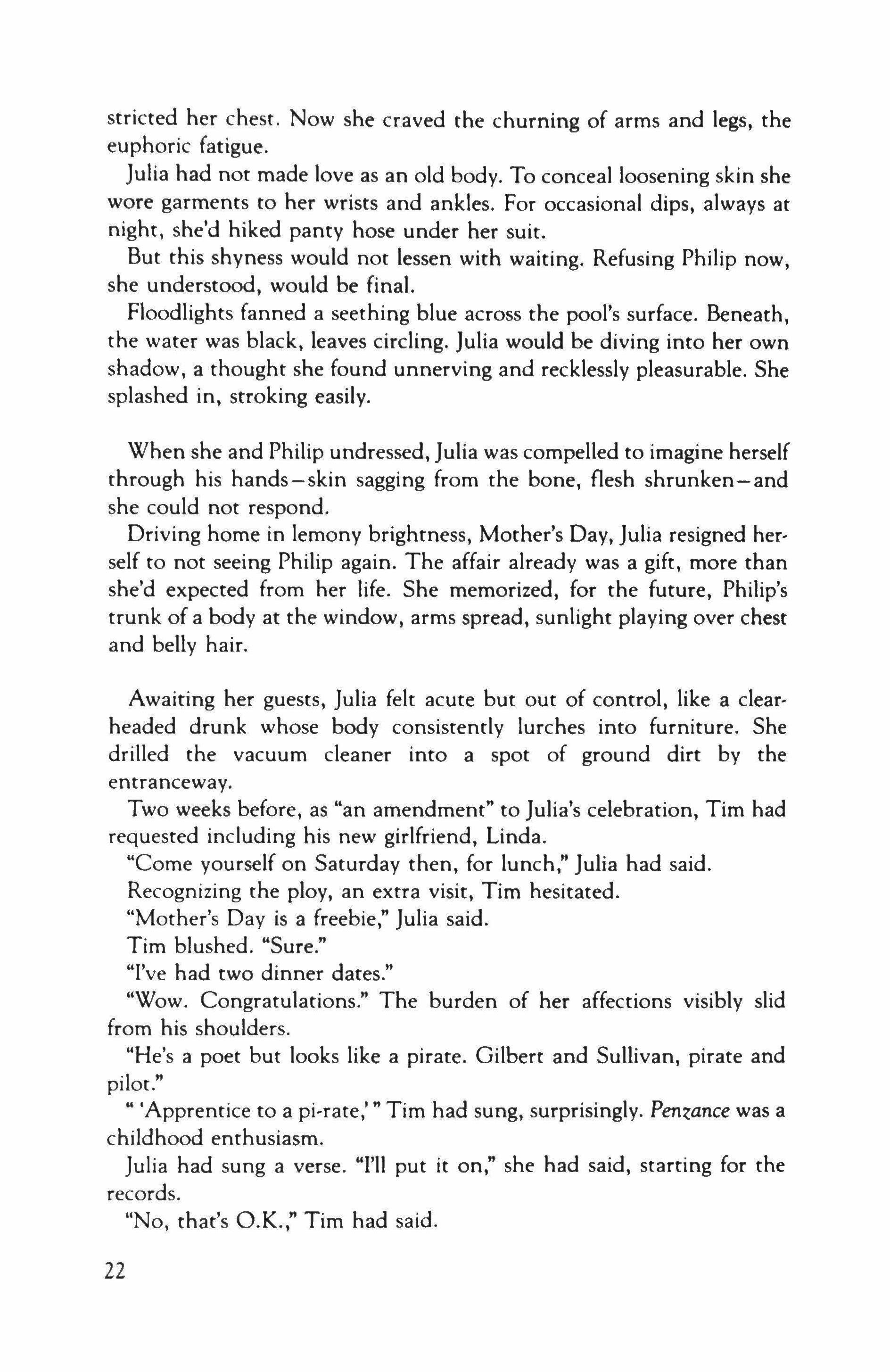
stricted her chest. Now she craved the churning of arms and legs, the euphoric fatigue.
Julia had not made love as an old body. To conceal loosening skin she wore garments to her wrists and ankles. For occasional dips, always at night, she'd hiked panty hose under her suit.
But this shyness would not lessen with waiting. Refusing Philip now, she understood, would be final.
Floodlights fanned a seething blue across the pool's surface. Beneath, the water was black, leaves circling. Julia would be diving into her own shadow, a thought she found unnerving and recklessly pleasurable. She splashed in, stroking easily.
When she and Philip undressed, Julia was compelled to imagine herself through his hands-skin sagging from the bone, flesh shrunken-and she could not respond.
Driving home in lemony brightness, Mother's Day, Julia resigned herself to not seeing Philip again. The affair already was a gift, more than she'd expected from her life. She memorized, for the future, Philip's trunk of a body at the window, arms spread, sunlight playing over chest and belly hair.
Awaiting her guests, Julia felt acute but out of control, like a clearheaded drunk whose body consistently lurches into furniture. She drilled the vacuum cleaner into a spot of ground dirt by the entranceway.
Two weeks before, as "an amendment" to Julia's celebration, Tim had requested including his new girlfriend, Linda.
"Come yourself on Saturday then, for lunch," Julia had said.
Recognizing the ploy, an extra visit, Tim hesitated.
"Mother's Day is a freebie," Julia said.
Tim blushed. "Sure."
"I've had two dinner dates."
"Wow. Congratulations." The burden of her affections visibly slid from his shoulders.
"He's a poet but looks like a pirate. Gilbert and Sullivan, pirate and pilot."
'Apprentice to a pi-rate,'" Tim had sung, surprisingly. Penzance was a childhood enthusiasm.
Julia had sung a verse. "I'll put it on," she had said, starting for the records.
"No, that's O.K.," Tim had said.
22

Julia stuffed the vacuum in the closer just as Tim arrived with steaks and Linda, a woman with flat, functional hands and a stupendous bust restrained by a snug, flowered jumpsuit.
"What a relief," Linda said, admiring the lace-embroidered bodice of Julia's blouse. "I was afraid I'd overdressed." She and Tim were going dancing later, she explained.
"Tim might not remember, but he's always been a dancer," Julia said. The blunder loomed, yet she couldn't fend off the words. "Until he was seven or eight we would dance naked together, Shostakovitch, running up and down with scarves."
"Great." Tim flipped his hands. "Now tell her how I breast-fed until I was twenty."
But Tim, who honored holidays, righted himself, telling amusing work stories. He was Target's store manager.
Through dinner Julia's stomach still clenched from his anger. "Katherine," she said, "could you pour me more wine while you're up?" Katherine was Linda's predecessor, and Julia's favorite, in Tim's succession of women.
"Mom!"
"I'm sorry. Linda. It's habit."
"I understand." Linda smiled as if to gobble the world's unhappiness, bite by bite. "Your vinaigrette was delicious." She complimented each course in detail, wielding praise like an iron over a wrinkled shirt.
The pie was heated. Linda chatted through hers, Julia dawdled, Tim ate silently and quickly. Utensils clicked on the plates. The scrapedclean surfaces gleamed as if the evening had disappeared into them. Pressure built in Julia's chest. She gasped and swallowed air.
"I bought Kahlue," she said.
No, the couple said, the club already would be crowded.
At the doorway Linda kissed Julia thanks, twined her arm around Tim's waist. Solitary, Julia felt conspicuous, as if the others were ignoring a comical deformity-hands sewn on the wrong wrists, maybe. "Tim, I almost forgot," she said. "I've organized my papers in a filing cabinet. insurance, the will, investments, taxes. Alphabetized. It'll only take a minute. You must know, in case anything happens to me. Much as we want to avoid the fact, I am ill."
"Mom, good God, not on Mother's Day."
By 10:30 Julia had smoked her daily quota. The pact with herself was inviolable. Instead she watched a Cary Grant double feature. Cary waltzed and feinted through the heroine's amorous lunges as if waxed. At midnight Julia lit #1 for the following day.
23

Julia awoke with what she thought was a severe hangover, though she had drunk moderately. After phoning in sick to the zoo she returned to bed with the blinds drawn, a shirt over her eyes. She saw Philip turning from the window, approaching, nothing between them but the sheet drawn to her chin. Cigarettes tasted like smoldering chemicals and made her head throb. Julia wasn't aware when night fell. The next day was no better, so, she decided, there was no reason not to work.
"I have something for you," Philip called to say. Julia said fine but didn't fix her hair or change clothes, drawstring pants and a jersey. He arrived empty-handed. "It's a massage. No protests." He covered her mouth. She was clairvoyant, he said; the outfit was perfect. He was unrolling a pad, popping a Bach harpsichord concerto on the stereo. She was face down on the floor.
"Petrified wood," he laughed, fingertips playing over the base of her skull, her neck, back, legs. Indeed, Julia felt all hard grain, indissoluble knots. As his fingers probed she yelped and started to rise.
"Patience. Bear with me," Philip said.
Flowing blood did tingle in unexpected far parts of her body. Philip cautiously gave weight to his hands, then lifted her from beneath, let fall. Julia had the image of a board, clapped to her back, being pried loose. Now Philip could knead her flesh. The circling strokes of his palms were erasing her form. Even the pressure released her further.
"I don't feel anything," Julia mumbled into the cotton. "I mean, 1 do"she laughed - "but I'm disembodied." The music advanced and receded, lacy waves breaking on the beach. She was a bubble, zigzagging from spume into the pure air.
Julia became absorbed in the carpet before her eyes, its thickness, geometry, flagrant colors. She tumbled through the weave, the pile separating, closing over her. "It yields like water," Philip panted, "and the colors stain your skin." Their merging of thought Julia accepted as natural.
Philip rolled her over, kissing. Their stripping altered nothing. She might always have been naked. At Philip's touch nerves opened until she was entirely this fresh, ageless openness. Caresses were partaking and giving in the same movement.
"These are your hands," she exulted.
Julia was swimming powerfully from shore, cutting a straight line through the water. When they finished she floated in a million square miles of sunswept ocean, one with the currents.
"Now we truly are bonded," Philip said.
24
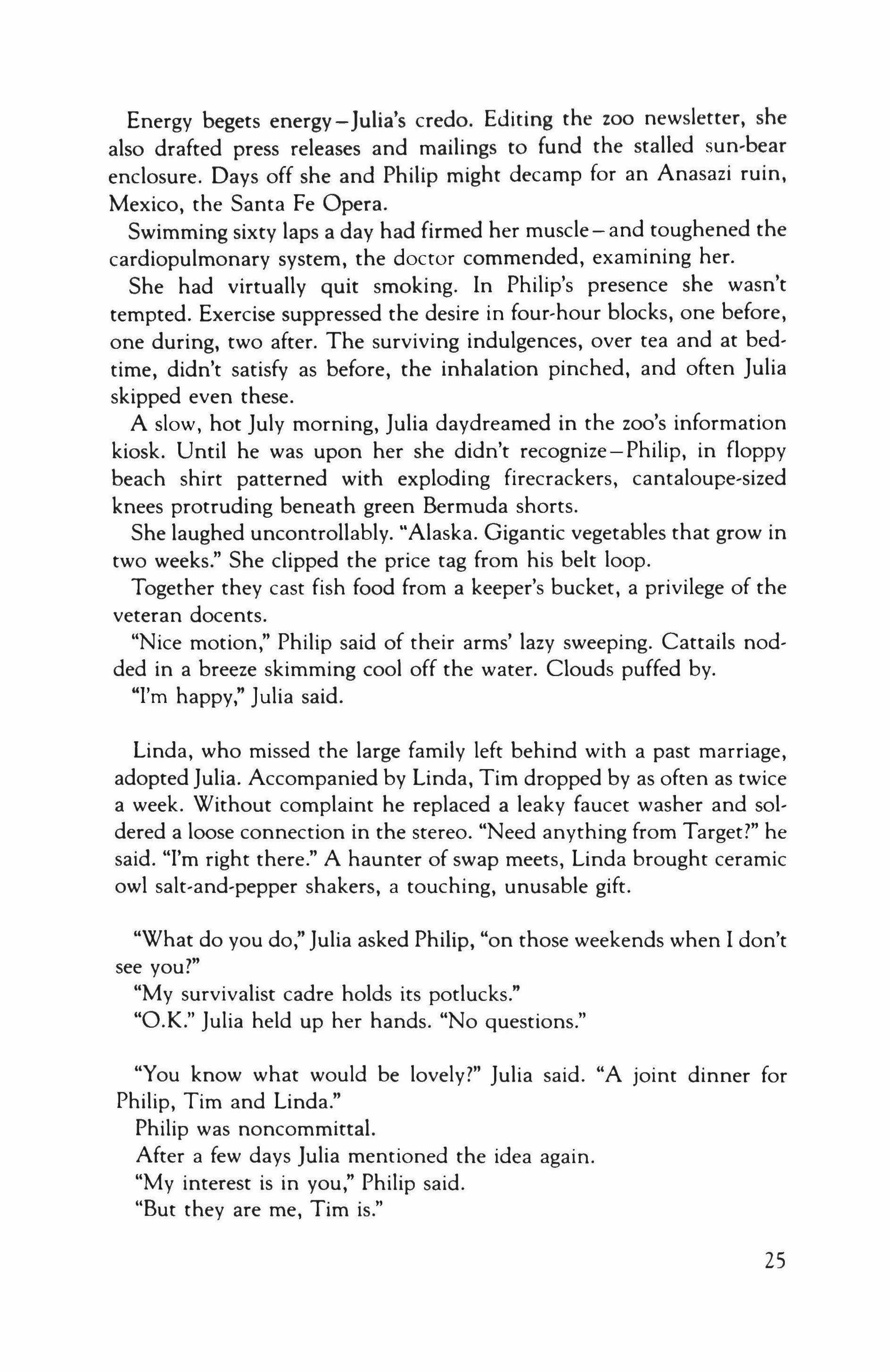
Energy begets energy-Julia's credo. Editing the zoo newsletter, she also drafted press releases and mailings to fund the stalled sun-bear enclosure. Days off she and Philip might decamp for an Anasazi ruin, Mexico, the Santa Fe Opera.
Swimming sixty laps a day had firmed her muscle-and toughened the cardiopulmonary system, the doctor commended, examining her.
She had virtually quit smoking. In Philip's presence she wasn't tempted. Exercise suppressed the desire in four-hour blocks, one before, one during, two after. The surviving indulgences, over tea and at bedtime, didn't satisfy as before, the inhalation pinched, and often Julia skipped even these.
A slow, hot July morning, Julia daydreamed in the zoo's information kiosk. Until he was upon her she didn't recognize-Philip, in floppy beach shirt patterned with exploding firecrackers, cantaloupe-sized knees protruding beneath green Bermuda shorts.
She laughed uncontrollably. "Alaska. Gigantic vegetables that grow in two weeks." She clipped the price tag from his belt loop.
Together they cast fish food from a keeper's bucket, a privilege of the veteran docents.
"Nice motion," Philip said of their arms' lazy sweeping. Cattails nodded in a breeze skimming cool off the water. Clouds puffed by.
"I'm happy," Julia said.
Linda, who missed the large family left behind with a past marriage, adopted Julia. Accompanied by Linda, Tim dropped by as often as twice a week. Without complaint he replaced a leaky faucet washer and soldered a loose connection in the stereo. "Need anything from Target?" he said. "I'm right there." A haunter of swap meets, Linda brought ceramic owl salt-and-pepper shakers, a touching, unusable gift.
"What do you do," Julia asked Philip, "on those weekends when I don't see you?"
"My survivalist cadre holds its potlucks," "O.K." Julia held up her hands. "No questions."
"You know what would be lovely?" Julia said. "A joint dinner for Philip, Tim and Linda."
Philip was noncommittal.
After a few days Julia mentioned the idea again.
"My interest is in you," Philip said.
"But they are me, Tim is."
25
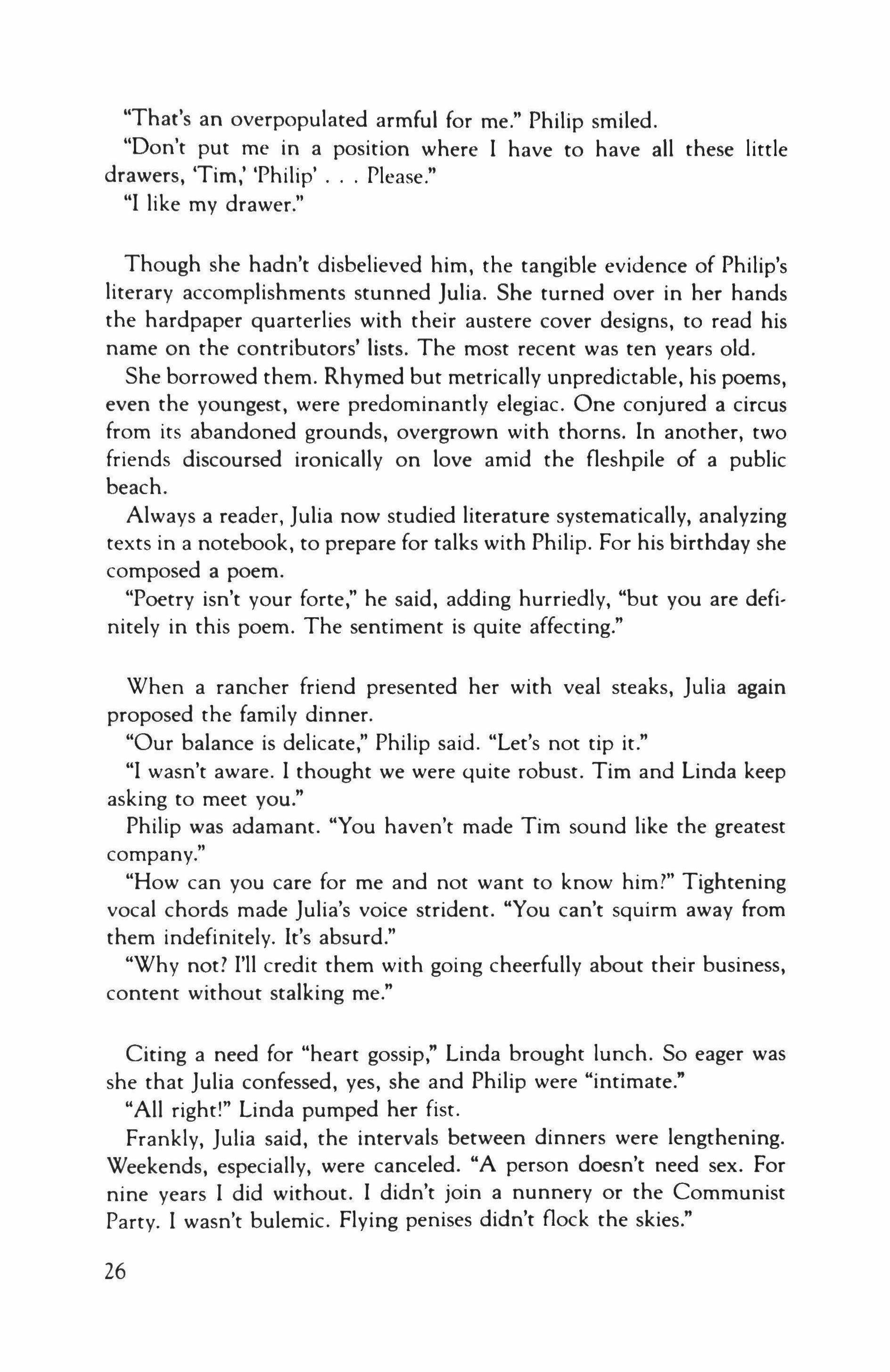
"That's an overpopulated armful for me." Philip smiled.
"Don't put me in a position where I have to have all these little drawers, 'Tim: 'Philip' Please."
"I like my drawer."
Though she hadn't disbelieved him, the tangible evidence of Philip's literary accomplishments stunned Julia. She turned over in her hands the hardpaper quarterlies with their austere cover designs, to read his name on the contributors' lists. The most recent was ten years old.
She borrowed them. Rhymed but metrically unpredictable, his poems, even the youngest, were predominantly elegiac. One conjured a circus from its abandoned grounds, overgrown with thorns. In another, two friends discoursed ironically on love amid the fleshpile of a public beach.
Always a reader, Julia now studied literature systematically, analyzing texts in a notebook, to prepare for talks with Philip. For his birthday she composed a poem.
"Poetry isn't your forte," he said, adding hurriedly, "but you are definitely in this poem. The sentiment is quite affecting."
When a rancher friend presented her with veal steaks, Julia again proposed the family dinner.
"Our balance is delicate," Philip said. "Let's not tip it."
"I wasn't aware. I thought we were quite robust. Tim and Linda keep asking to meet you."
Philip was adamant. "You haven't made Tim sound like the greatest company."
"How can you care for me and not want to know him?" Tightening vocal chords made Julia's voice strident. "You can't squirm away from them indefinitely. It's absurd."
"Why not? I'll credit them with going cheerfully about their business, content without stalking me."
Citing a need for "heart gossip," Linda brought lunch. So eager was she that Julia confessed, yes, she and Philip were "intimate."
"All right!" Linda pumped her fist.
Frankly, Julia said, the intervals between dinners were lengthening. Weekends, especially, were canceled. "A person doesn't need sex. For nine years I did without. I didn't join a nunnery or the Communist Party. I wasn't bulemic. Flying penises didn't flock the skies."
26

Linda rolled onto her back, feet kicking. "You didn't grow a beard. You didn't put ice cubes in your undies."
"How come I feel like I'm going nuts?" She'd awaken fighting to breathe, as if steel bound her chest. The cough, when it came, was a relief.
"I never know when Tim's going to show up, either, two days, a week, three in the morning."
"How do you stand it?"
"Here's me," Linda said, semi-crouching. "I can go this way, that." She pivoted left, right. "I never see Tim again, I'm sad, I'll live. Meanwhile I have a helluva lot of fun. Take it day by day.
"Tim zips me off to a ballgarne, or picnicking in the mountains. One night we made masks and grass skirts from newspaper, and called the house 'Hawaiian Zone.' And then Linda whistled, drumming her fingers.
"Good for you. I don't see that side of Tim."
"I should hope not." Linda laughed.
"My idea of heaven," Julia said, "is two people giving excessively to each other, world without end. Amen."
"Why do I always initiate our lovemaking now?" Julia asked Philip.
"You're the one who holds back sometimes. So I let you choose."
"Don't you think maybe I'd like to be compelled by you, for that to make my choice?"
"I'm not much for coercion."
"It's persuasion I'm asking for. I don't want it to be all the same to you if I say yes or no."
Philip prepared an evening of tantra, "a true yoga, serenity in motionless sexual union."
He positioned himself on the mat, the half lotus. Setting Julia on his lap, hooking her feet around his back, he entered her. Within minutes his breathing had subsided to a dilation of the nostrils, sigh. His eyes shut, the blue-veined lids unclenching. The forehead smoothed.
Julia's skin burst with excitement and frustration. When finally he stirred, Julia choked her limbs around him, mauled his chest with her teeth. Quick-quick-quick she moved, bouncing her rear on his ankles, beating against him.
"I have to beg off tonight," Philip said over the phone. "My feet won't get me down the stairs." He'd been complaining. Julia covered the hot dishes in foil and drove them over. "This place
27
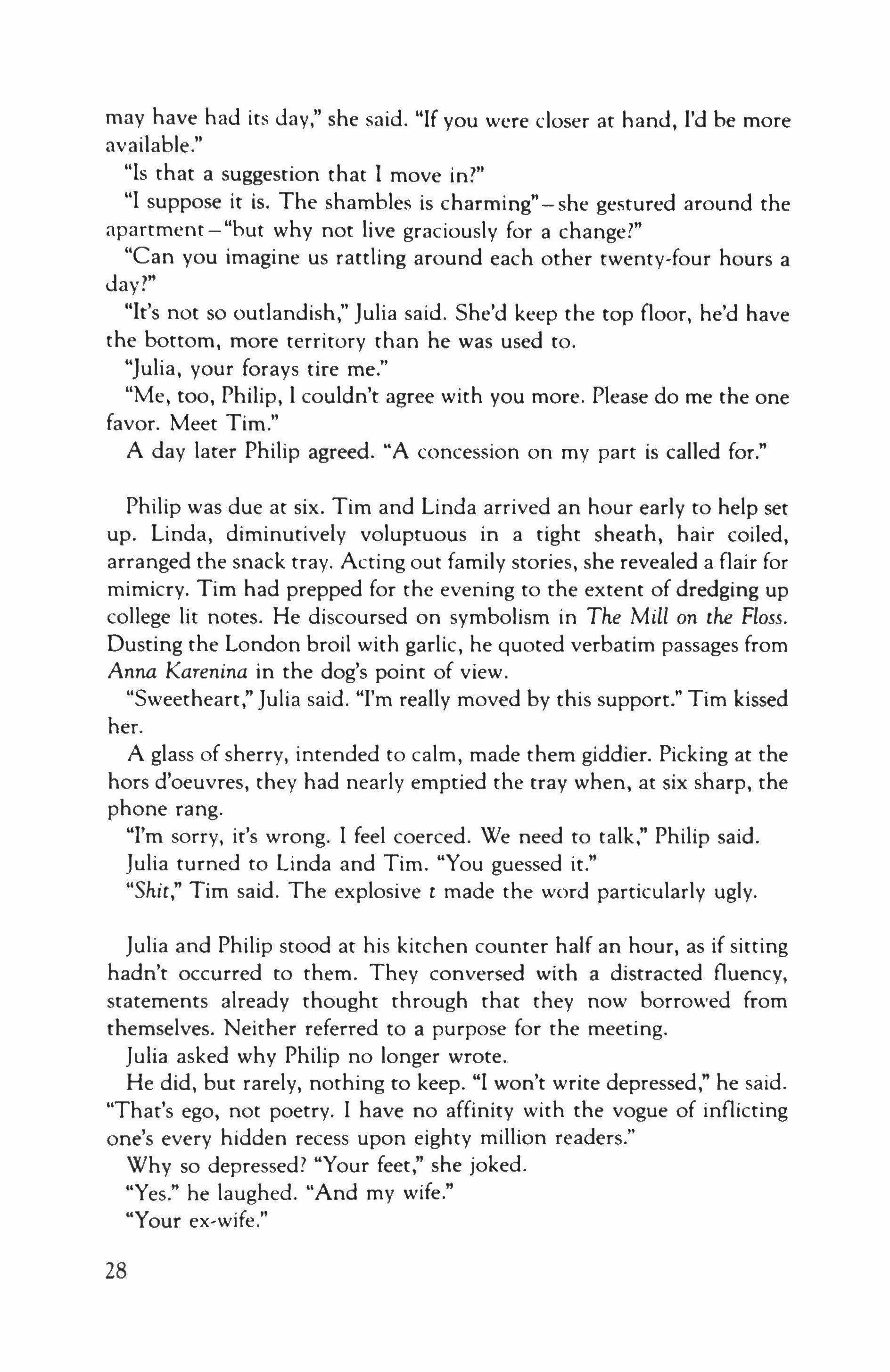
may have had its day," she said. "If you were closer at hand, I'd be more available."
"Is that a suggestion that I move in?"
"I suppose it is. The shambles is charming" - she gestured around the apartment - "hut why not live graciously for a change?"
"Can you imagine us rattling around each other twenty-four hours a day?"
"It's not so outlandish," Julia said. She'd keep the top floor, he'd have the bottom, more territory than he was used to.
"Julia, your forays tire me."
"Me, too, Philip, I couldn't agree with you more. Please do me the one favor. Meet Tim."
A day later Philip agreed. "A concession on my part is called for."
Philip was due at six. Tim and Linda arrived an hour early to help set up. Linda, diminutively voluptuous in a tight sheath, hair coiled, arranged the snack tray. Acting out family stories, she revealed a flair for mimicry. Tim had prepped for the evening to the extent of dredging up college lit notes. He discoursed on symbolism in The Mill on the Floss. Dusting the London broil with garlic, he quoted verbatim passages from Anna Karenina in the dog's point of view.
"Sweetheart," Julia said. "I'm really moved by this support." Tim kissed her.
A glass of sherry, intended to calm, made them giddier. Picking at the hors d'oeuvres, they had nearly emptied the tray when, at six sharp, the phone rang.
"I'm sorry, it's wrong. I feel coerced. We need to talk," Philip said.
Julia turned to Linda and Tim. "You guessed it."
"Shit," Tim said. The explosive t made the word particularly ugly.
Julia and Philip stood at his kitchen counter half an hour, as if sitting hadn't occurred to them. They conversed with a distracted fluency, statements already thought through that they now borrowed from themselves. Neither referred to a purpose for the meeting.
Julia asked why Philip no longer wrote.
He did, but rarely, nothing to keep. "I won't write depressed," he said. "That's ego, not poetry. I have no affinity with the vogue of inflicting one's every hidden recess upon eighty million readers."
Why so depressed? "Your feet," she joked.
"Yes." he laughed. "And my wife."
"Your ex-wife."
28

"My once and current wife. I've decided to pinh my hand in there again."
Julia rejected the attempt to believe she had misheard.
Vera was fifty, Philip said, still beautiful, copper hair and cream skin.
"Where do you go?" Julia asked numbly, as if interviewing.
"Here in town. Unfortunately, she's hopelessly unstable." After leaving him, serving divorce papers, Vera had jumped off a bandshell roof during a rock concert. The decree wasn't finalized. "I compromised," Philip said. "I moved her back in the house, and I left. She's been more at peace there."
Driving home, Julia awaited the inevitable cough. Like the braying of an onager, it came, accompanied by runny nose. She screamed in the closet, muffled by coats.
By phone she broke off with Philip. "I can't think of words to despise you enough," she said.
To expand the newsletter Julia recruited correspondents. The sun-bear drive cracked its goal, and construction began. Member of a YWCA with indoor pool since fall set in, she slogged through laps when the cough allowed. Sunglasses hid the dark circles around her eyes.
The following weeks Tim was so peevish and erratic - most often Julia entertained Linda alone-that Julia considered imposing a once-amonth quota on him. Despite the persistent cough she again bought cigarettes. Linda berated her.
"At a certain age character becomes simplified," she told Linda. "Julia plus Philip equals Tim minus smoking. Julia minus Philip equals smoking minus Tim."
Bundled in a quilt against the damp chill, feet to the electric heater, Julia thought of Easter, herself in the ambulance, a gray stick, tassel of brownish hair, the oxygen mask a malignant flower covering her face. The cough boomed.
Napping, Julia dreamed of Philip in the form of a joke. The prototype she'd actually heard, a series of exchanges, increasingly damning accusations culminating in a punchline that was, as usual, all she could remember.
In the dream the words were enormous stone monuments, unreadable from her perspective. Among the letters Philip scurried, a gnome with hairy rump and tail, mischievously peeking.
Some of the joke's lines, rather than words, were film clips of himstriding naked; leaning back from the table, wiping his beard; among trees, tinted green from their leaves.
29

At the punchline - "Well, nobodv's perfect" - Julia awoke laughing.
Through the church grapevine Julia learned that foot surgery had confined Philip to his apartment, his wheelchair unable to navigate the stairs. She assembled a CARE package of deli items, fresh fruit and a bottle of Dry Sack, along with mundane necessities.
Grinning, Philip held out his arms. Even seated he was huge.
"I've missed you so much," Julia said.
"Moscarpone! Smoked oysters!" He twisted the sherry cork and poured two glasses.
Lit only by a gap in the venetian blinds, the disheveled room showed no sign of outside intervention - a wife's, for instance.
Philip's bandages were cloddy white blocks. "The idea of someone cutting," he said. The wince bared his teeth. "I keep imagining them stepping into an egg slicer." For another two months he mustn't walk.
Julia did some "picking up."
"Today's man on wheels needs room to roll," she said, shoving books against the walls.
Philip beamed, sipping. "You are dear," he said. "Now we have a dance floor." He put on Vivaldi. Grasping Julia's hands, he lilted her to and fro. From behind Julia lumbered him through figure eights. A hub caught books, loosing an avalanche. Deliberately Philip rammed another tower, toppling books and a broom, spilling the wastebasket.
Flouncing her onto his lap with a thick arm, Philip said, "Have you ever made boom-boom with a mechanical centaur?"
"Philip," she said. "I love you, but that aspect of our relationship is past."
"My regret." Stretching for their glasses, he clinked. "And deepest apology."
Leaving, Julia demanded a key, and they fought. "What if you called for help and couldn't get to the door?" Julia said.
M All right." He slapped the key on the counter. "Not because I need it, but because you deserve it."
"Thankvou thankyou." Julia curtseyed. "I shall wear it like a diadem on my forehead."
"I'm an ass," Philip said. "Please take the key."
The morning of Christmas Eve, a dressed goose under her arm, Julia unlocked Philip's apartment and stepped into a glow like played-out neon, candles in red glass chimneys. "Boo," said the black hulk in the corner. "Happy Halloween."
Julia set the bird in the refrigerator and poured herself wine.
30
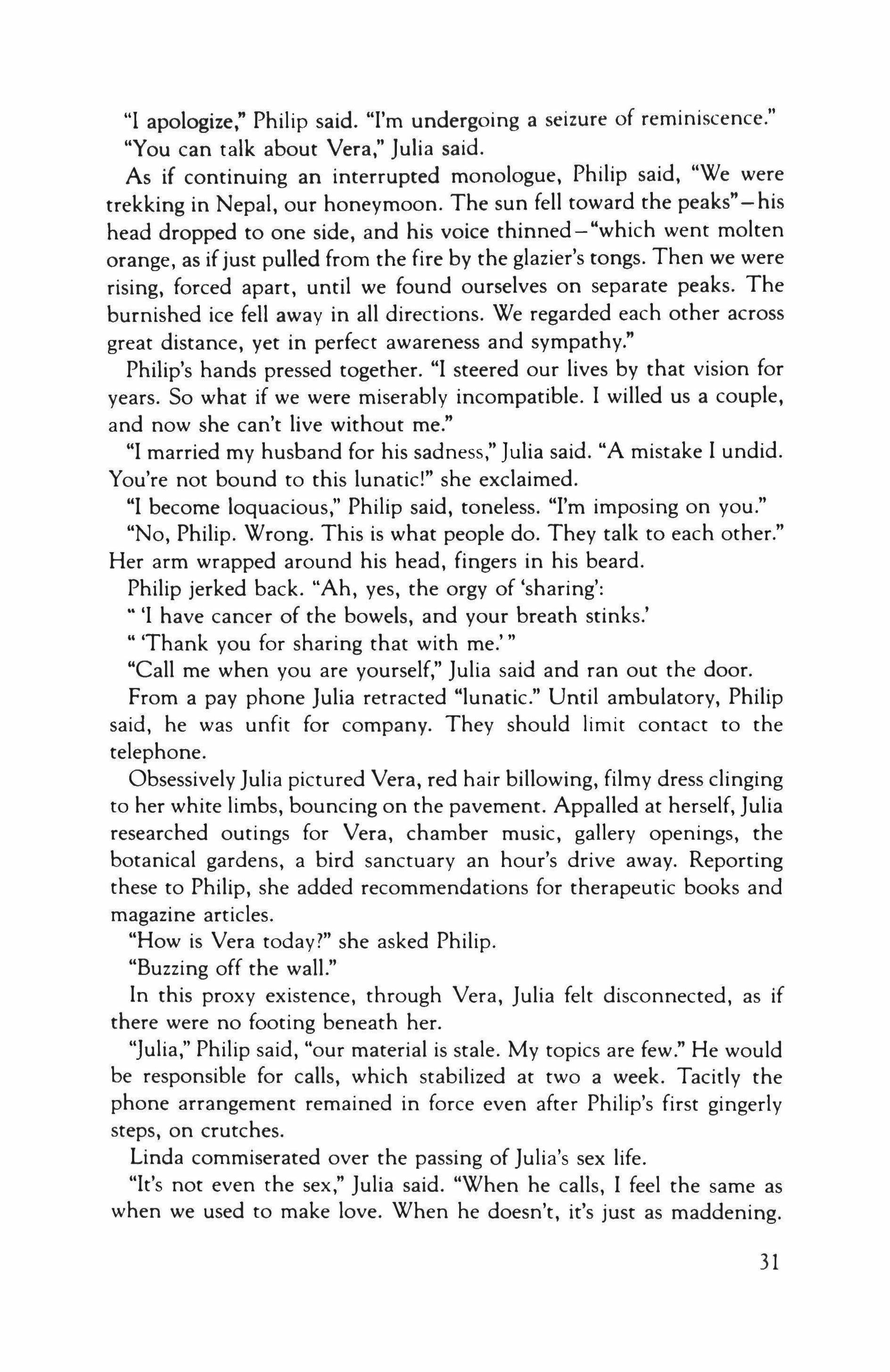
"I apologize," Philip said. "I'm undergoing a seizure of reminiscence."
"You can talk about Vera," Julia said.
As if continuing an interrupted monologue, Philip said, "We were trekking in Nepal, our honeymoon. The sun fell toward the peaks" - his head dropped to one side, and his voice thinned - "which went molten orange, as ifjust pulled from the fire by the glazier's tongs. Then we were rising, forced apart, until we found ourselves on separate peaks. The burnished ice fell away in all directions. We regarded each other across great distance, yet in perfect awareness and sympathy."
Philip's hands pressed together. "I steered our lives by that vision for years. So what if we were miserably incompatible. I willed us a couple, and now she can't live without me."
"I married my husband for his sadness," Julia said. "A mistake I undid. You're not bound to this lunatic!" she exclaimed.
"I become loquacious," Philip said, toneless. "I'm imposing on you."
"No, Philip. Wrong. This is what people do. They talk to each other." Her arm wrapped around his head, fingers in his beard.
Philip jerked back. "Ah, yes, the orgy of 'sharing':
'I have cancer of the bowels, and your breath stinks.'
'Thank you for sharing that with me.'''
"Call me when you are yourself," Julia said and ran out the door.
From a pay phone Julia retracted "lunatic." Until ambulatory, Philip said, he was unfit for company. They should limit contact to the telephone.
Obsessively Julia pictured Vera, red hair billowing, filmy dress clinging to her white limbs, bouncing on the pavement. Appalled at herself, Julia researched outings for Vera, chamber music, gallery openings, the botanical gardens, a bird sanctuary an hour's drive away. Reporting these to Philip, she added recommendations for therapeutic books and magazine articles.
"How is Vera today?" she asked Philip.
"Buzzing off the wall,"
In this proxy existence, through Vera, Julia felt disconnected, as if there were no footing beneath her.
"Julia," Philip said, "our material is stale. My topics are few." He would be responsible for calls, which stabilized at two a week. Tacitly the phone arrangement remained in force even after Philip's first gingerly steps, on crutches.
Linda commiserated over the passing of Julia's sex life.
"It's not even the sex," Julia said. "When he calls, I feel the same as when we used to make love. When he doesn't, it's just as maddening.
31
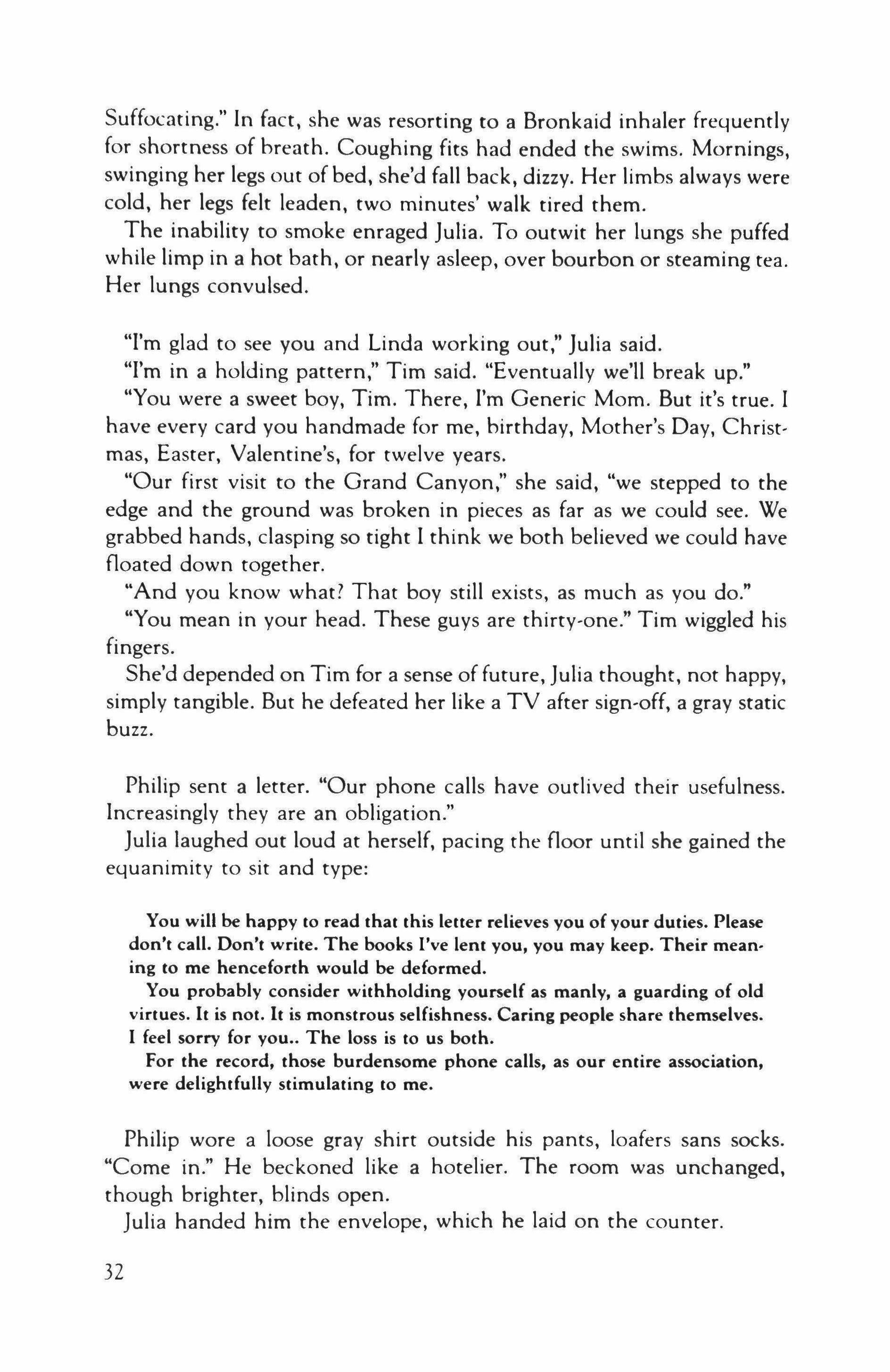
Suffocating." In fact, she was resorting to a Bronkaid inhaler frequently for shortness of breath. Coughing fits had ended the swims. Mornings, swinging her legs out of bed, she'd fall back, dizzy. Her limbs always were cold, her legs felt leaden, two minutes' walk tired them.
The inability to smoke enraged Julia. To outwit her lungs she puffed while limp in a hot bath, or nearly asleep, over bourbon or steaming tea. Her lungs convulsed.
"I'm glad to see you and Linda working out," Julia said.
"I'm in a holding pattern," Tim said. "Eventually we'll break up."
"You were a sweet boy, Tim. There, I'm Generic Mom. But it's true. I have every card you handmade for me, birthday, Mother's Day, Christmas, Easter, Valentine's, for twelve years.
"Our first visit to the Grand Canyon," she said, "we stepped to the edge and the ground was broken in pieces as far as we could see. We grabbed hands, clasping so tight I think we both believed we could have floated down together.
"And you know what? That boy still exists, as much as you do."
"You mean in your head. These guys are thirty-one." Tim wiggled his fingers.
She'd depended on Tim for a sense of future, Julia thought, not happy, simply tangible. But he defeated her like a TV after sign-off, a gray static buzz.
Philip sent a letter. "Our phone calls have outlived their usefulness. Increasingly they are an obligation."
Julia laughed out loud at herself, pacing the floor until she gained the equanimity to sit and type:
You will be happy to read that this letter relieves you of your duties. Please don't call. Don't write. The books I've lent you, you may keep. Their meaning to me henceforth would be deformed.
You probably consider withholding yourself as manly, a guarding of old virtues. It is not. It is monstrous selfishness. Caring people share themselves. I feel sorry for you The loss is to us both.
For the record, those burdensome phone calls, as our entire association, were delightfully stimulating to me.
Philip wore a loose gray shirt outside his pants, loafers sans socks. "Come in." He beckoned like a hotelier. The room was unchanged, though brighter, blinds open.
Julia handed him the envelope, which he laid on the counter.
32
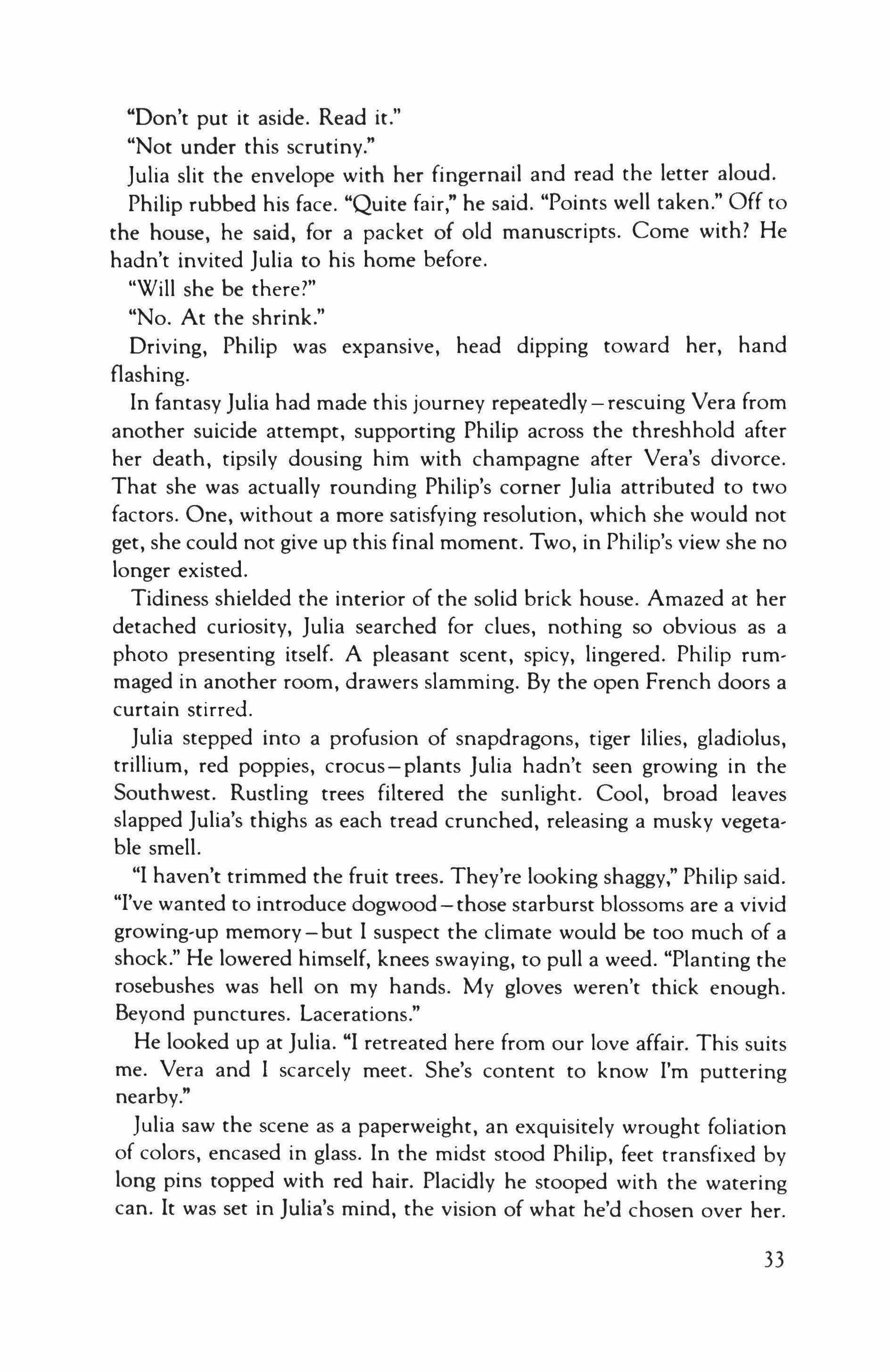
"Don't put it aside. Read it."
"Not under this scrutiny."
Julia slit the envelope with her fingernail and read the letter aloud. Philip rubbed his face. "Quite fair," he said. "Points well taken." Off to the house, he said, for a packet of old manuscripts. Come with? He hadn't invited Julia to his home before.
"Will she be there?"
"No. At the shrink."
Driving, Philip was expansive, head dipping toward her, hand flashing.
In fantasy Julia had made this journey repeatedly - rescuing Vera from another suicide attempt, supporting Philip across the threshhold after her death, tipsily dousing him with champagne after Vera's divorce. That she was actually rounding Philip's corner Julia attributed to two factors. One, without a more satisfying resolution, which she would not get, she could not give up this final moment. Two, in Philip's view she no longer existed.
Tidiness shielded the interior of the solid brick house. Amazed at her detached curiosity, Julia searched for clues, nothing so obvious as a photo presenting itself. A pleasant scent, spicy, lingered. Philip rummaged in another room, drawers slamming. By the open French doors a curtain stirred.
Julia stepped into a profusion of snapdragons, tiger lilies, gladiolus, trillium, red poppies, crocus-plants Julia hadn't seen growing in the Southwest. Rustling trees filtered the sunlight. Cool, broad leaves slapped Julia's thighs as each tread crunched, releasing a musky vegetable smell.
"1 haven't trimmed the fruit trees. They're looking shaggy," Philip said. "I've wanted to introduce dogwood-those starburst blossoms are a vivid growing-up memory - but I suspect the climate would be too much of a shock." He lowered himself, knees swaying, to pull a weed. "Planting the rosebushes was hell on my hands. My gloves weren't thick enough. Beyond punctures. Lacerations."
He looked up at Julia. "1 retreated here from our love affair. This suits me. Vera and I scarcely meet. She's content to know I'm puttering nearby."
Julia saw the scene as a paperweight, an exquisitely wrought foliation of colors, encased in glass. In the midst stood Philip, feet transfixed by long pins topped with red hair. Placidly he stooped with the watering can. It was set in Julia's mind, the vision of what he'd chosen over her.
33
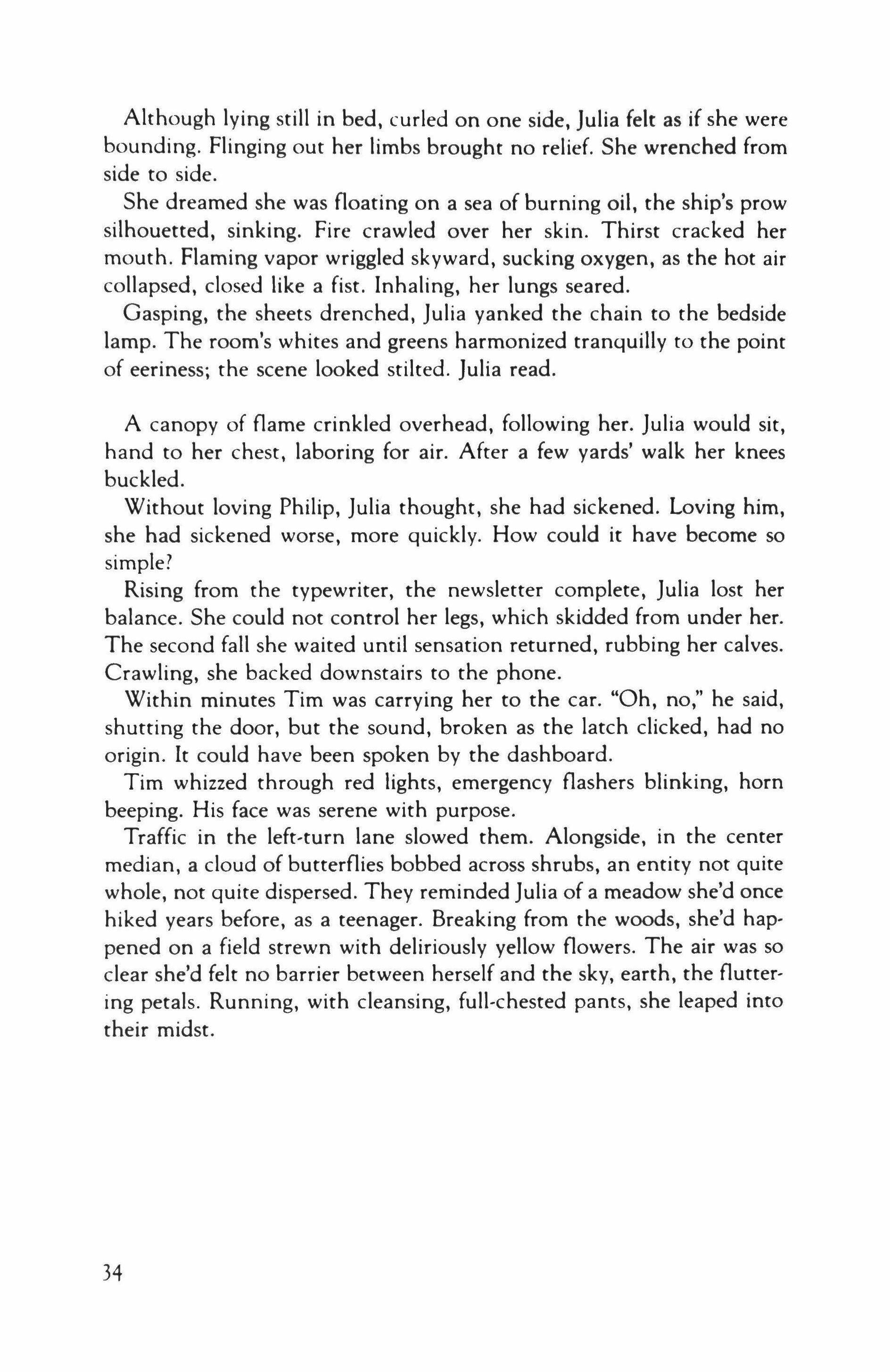
Although lying still in bed, curled on one side, Julia felt as if she were bounding. Flinging out her limbs brought no relief. She wrenched from side to side.
She dreamed she was floating on a sea of burning oil, the ship's prow silhouetted, sinking. Fire crawled over her skin. Thirst cracked her mouth. Flaming vapor wriggled skyward, sucking oxygen, as the hot air collapsed, closed like a fist. Inhaling, her lungs seared.
Gasping, the sheets drenched, Julia yanked the chain to the bedside lamp. The room's whites and greens harmonized tranquilly to the point of eeriness; the scene looked stilted. Julia read.
A canopy of flame crinkled overhead, following her. Julia would sit, hand to her chest, laboring for air. After a few yards' walk her knees buckled.
Without loving Philip, Julia thought, she had sickened. Loving him, she had sickened worse, more quickly. How could it have become so simple?
Rising from the typewriter, the newsletter complete, Julia lost her balance. She could not control her legs, which skidded from under her. The second fall she waited until sensation returned, rubbing her calves. Crawling, she backed downstairs to the phone.
Within minutes Tim was carrying her to the car. "Oh, no," he said, shutting the door, but the sound, broken as the latch clicked, had no origin. It could have been spoken by the dashboard.
Tim whizzed through red lights, emergency flashers blinking, horn beeping. His face was serene with purpose.
Traffic in the left-turn lane slowed them. Alongside, in the center median, a cloud of butterflies bobbed across shrubs, an entity not quite whole, not quite dispersed. They reminded Julia of a meadow she'd once hiked years before, as a teenager. Breaking from the woods, she'd happened on a field strewn with deliriously yellow flowers. The air was so clear she'd felt no barrier between herself and the sky, earth, the fluttering petals. Running, with cleansing, full-chested pants, she leaped into their midst.
34
Fado
Katherine Vaz
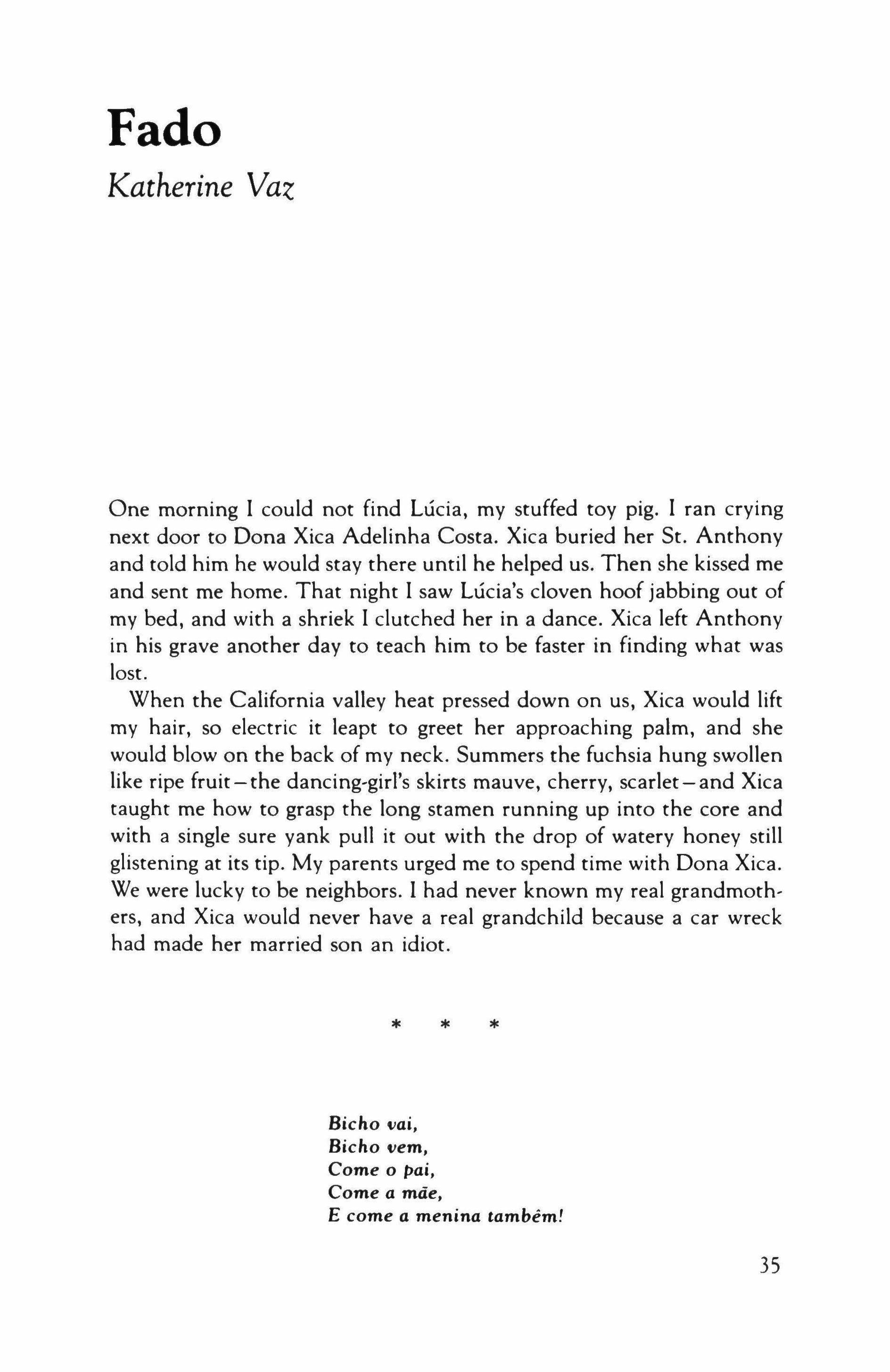
One morning I could not find Lucia, my stuffed toy pig. I ran crying next door to Dona Xica Adelinha Costa. Xica buried her St. Anthony and told him he would stay there until he helped us. Then she kissed me and sent me home. That night I saw Lucia's cloven hoof jabbing out of my bed, and with a shriek I clutched her in a dance. Xica left Anthony in his grave another day to teach him to be faster in finding what was lost.
When the California valley heat pressed down on us, Xica would lift my hair, so electric it leapt to greet her approaching palm, and she would blow on the back of my neck. Summers the fuchsia hung swollen like ripe fruit-the dancing-girl's skirts mauve, cherry, scarlet-and Xica taught me how to grasp the long stamen running up into the core and with a single sure yank pull it out with the drop of watery honey still glistening at its tip. My parents urged me to spend time with Dona Xica. We were lucky to be neighbors. I had never known my real grandmothers, and Xica would never have a real grandchild because a car wreck had made her married son an idiot.
Bicho vci, Bicho "em, Come 0 pai, Come a mae, E come a menina tam bern!
* * *
35

The worm-monster goes, The worm-monster comes, It eats the (ather, It eats the mother, And it eats the baby too!
Marnae walked her fingers up my leg singing this rhyme, and on the final line she attacked my stomach until I squealed with laughter. I would beg her to do it over and over. 0 bicho never got to my throat. I kept him down where it tickled.
I met worse night-things as I grew up. If I stared too long at those red and white pinpricks in my dark room they rolled into constellations that burst alive, into pirates and dogs speaking guttural English. When they came for me I would sign crosses in an invisible picket fence around my bed. The beasts roared but none of them could get me.
One night I finally kicked my sheets over the cross-fence and thought: Climb in with me. Xica is not afraid of you and neither am I. I am more afraid of being alone.
* * *
The old stories said that our Azorean homeland was Atlantis, rising broken from the sea. We all have marks and patches surfacing on our skin. I have a fierce dark animal erupting from my side.
Xica had a wine-colored star in the cove at the base of her throat. When she drowsed in the sleeping net that swung between two trees dividing our yards, I liked to touch the star and the bones of her face. She had a long nose ridge, arcing like a dolphin's spine from between her eyes. Inside her hands and chest more bones floated, like those soft needles that poke unmoored in fish's meat.
My fingers could never drink up the rheum t�, always trickled from beneath her closed eyes. We are so sad, so chemically sad, that it leaks from us. The [ados wailing from our record players remind us that without love we will die, that the oceans are salty because the Portuguese have shed so many tears on their beaches for those they will never hold again.
* * *
Xica Adelinha Costa could faint at will. She would quicken her breath toward that giddy unlatching when the spirit shoots from the body. Then all is cold and black, with a prickle of nausea. One day when I was thirteen I fell with her at the Lodi post office. We were in line to
36
pick up the ribbon do Nosso Senhor do Bonfim sent from her cousin in Brazil, and suddenly Xica could not wait anymore. She shook so much I shook too, and then she collapsed into my arms and drove us both to the floor.
Most townspeople already knew that when Xica could not be without something another moment she hurled herself into the dark. Postmaster Riley did not rush over, but he tossed me Xica's package. I unwrapped the thin blue ribbon do Nosso Senhor and tied it around her wrist. She woke up because now she could make her pact with God. Xica whispered this prayer:
o Nosso Senhor: Heal my child. He has not spoken a single word since his accident.
o Nosso Senhor: You threw my husband off that whaling boat and did not return him when I was young and pretty in Angra-lift the fog from my son.
o Nosso Senhor: Make his wife love him again.
When the knot broke on its own, those wishes would come true. "Rosa," she said, "I can almost hear my boy saying my name." She smiled at the man offering her water and kissed the wrist tie that marked her as a woman of divine desires.
For sprawling in public with charms my parents made me recite all the rosary Mysteries-the Joyful, the Sorrowful and the Glorious-to scrub out my soul.

My father's lavender soap always drew me from sleep. The maleflowering scent came for me before dawn, as he padded around the house until his veins breathed open. He insisted I do his morning exercises with him. Out with the violet bristles protruding from the artichokes, there in the dark-claret light.
"Inhale with me, Rosa," said Papai.
In-let it fill you - out.
Sister Angela, my eighth-grade teacher, explained the heart:
Old tired blood of night and sleep starts out purple. It goes through the heart to wash itself red.
The morning sky is red and purple to remind us that we walk in the air of burst hearts.
* * *
37
I would sit on the porch awhile holding my father's hand. It was the first time I already missed someone I still had, and my first lesson that true joy creates not memory but physical particles. My Lodi mornings hid embers in me that will float upward when I die, to burrow in someone else, because they have nothing to do with dust.
Marnae would bring out mayonnaise-and-tomato sandwiches. We ate together before my father left for his milk route, and then she and I went back to bed. Sometimes it is beyond endurance, the separateness of all our lives.
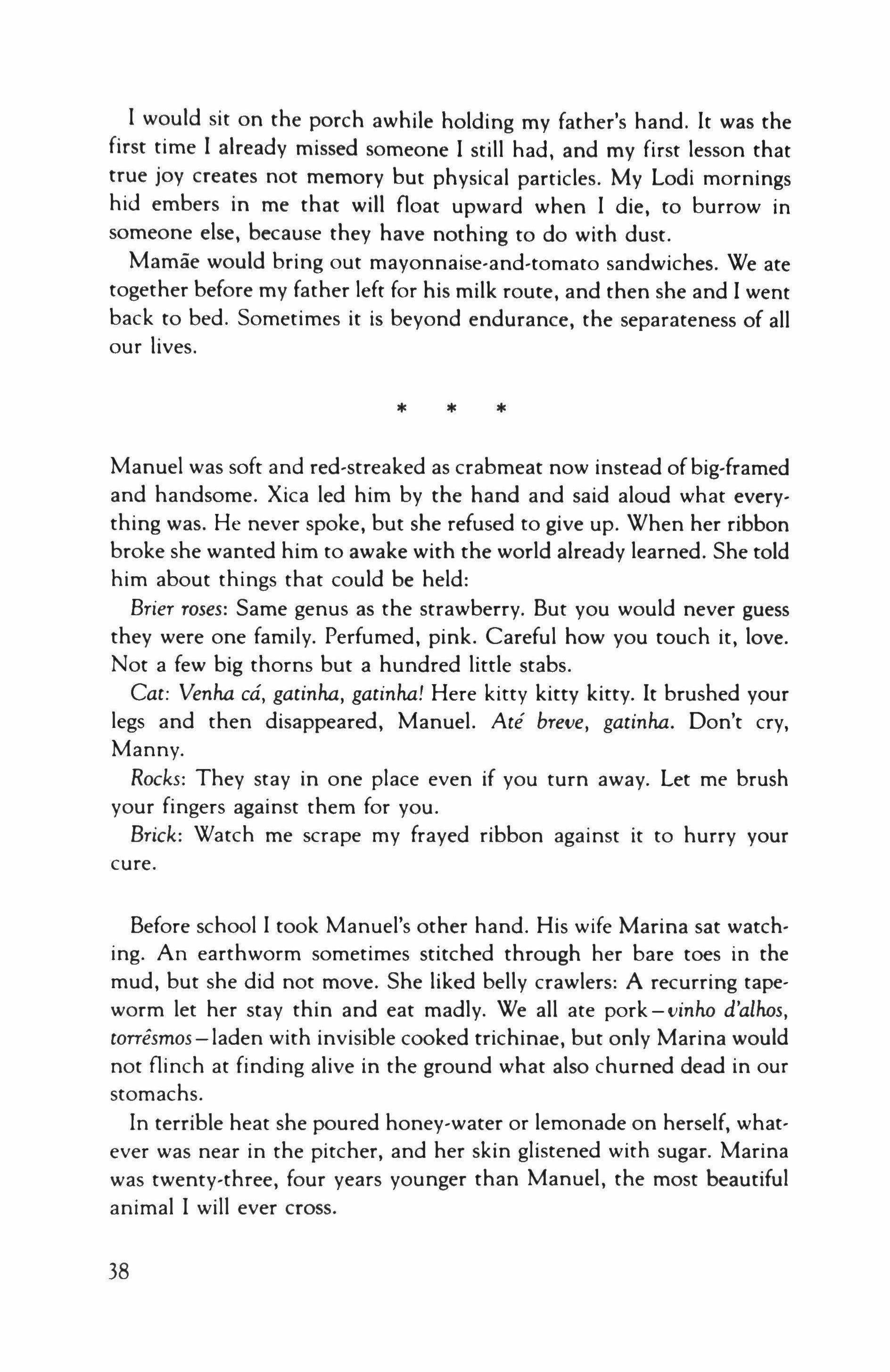
Manuel was soft and red-streaked as crabmeat now instead of big-framed and handsome. Xica led him by the hand and said aloud what everything was. He never spoke, but she refused to give up. When her ribbon broke she wanted him to awake with the world already learned. She told him about things that could be held:
Brier roses: Same genus as the strawberry. But you would never guess they were one family. Perfumed, pink. Careful how you touch it, love. Not a few big thorns but a hundred little stabs.
Cat: Venha cd, gatinha, gatinha! Here kitty kitty kitty. It brushed your legs and then disappeared, Manuel. Ate breve, gatinha. Don't cry, Manny.
Rocks: They stay in one place even if you turn away. Let me brush your fingers against them for you.
Brick: Watch me scrape my frayed ribbon against it to hurry your cure.
Before school I took Manuel's other hand. His wife Marina sat watching. An earthworm sometimes stitched through her bare toes in the mud, but she did not move. She liked belly crawlers: A recurring tapeworm let her stay thin and eat madly. We all ate pork - vinho d'alhos, rorresmos=Iaden with invisible cooked trichinae, but only Marina would not flinch at finding alive in the ground what also churned dead in our stomachs.
In terrible heat she poured honey-water or lemonade on herself, whatever was near in the pitcher, and her skin glistened with sugar. Marina was twenty-three, four years younger than Manuel, the most beautiful animal I will ever cross.
* * *
38
Because Manuel said nothing, Xica's morning lessons often veered off into history stories:
Lace: This at my throat, from my sister Clara. She lost her husband off the same boat that killed your father. She went blind hooking webs the old way, with an open safety pin. Flowers and faces white and matterless as the drone after the hive sucks him dry. The drone is left jelly. The drone is soft quiver.
Rosa Santos: Her blood grandparents are all buried home in the islands. Rosa came here as a baby and does not remember her birthplace. She has no brother or sisters - her birth ruptured her mother's tubes.
Because Manuel still said nothing, Xica sometimes cried untranslatable words, things that could not be held or seen, anything that might unfasten the spirits in him:
Marulho: No single English word describes this roar-sound of waves as they crash on shore, Manuel. I think of the mar in marido filled with barulho, noise: an ocean inside a husband crashing. I watched you pace that night and drive off wildly because you could not stand being without her. She was only having coffee with a friend. She wasn't with another man. Marina can't tell time! She doesn't think!
Desacaco: The purgatory where someone has not yet said goodbye, is playing along with another person's desires, but not out of love.
Saudade: More than longing. More than yearning. The aching person can declare: Come co me. Although you are so much in me that I carry you around, I'll waste away if fate keeps us apart.
Marina: You crashed into a tree and lost your mind over her. Stop fussing, Manuel. Rosa and I will lead you to her. The lazy goat Marina.
At the sound of her name his hand opened.
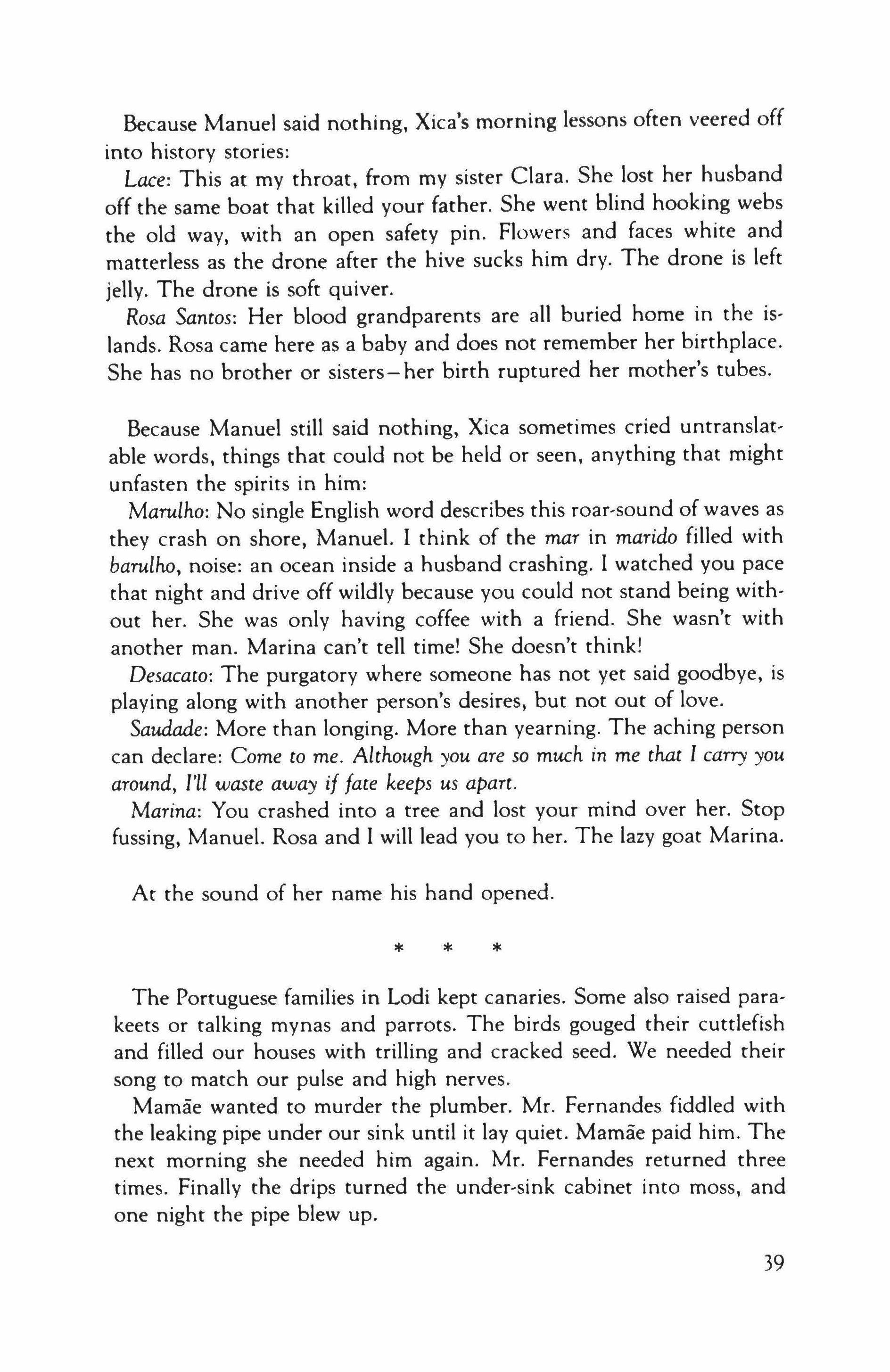
The Portuguese families in Lodi kept canaries. Some also raised parakeets or talking mynas and parrots. The birds gouged their cuttlefish and filled our houses with trilling and cracked seed. We needed their song to match our pulse and high nerves.
Marnae wanted to murder the plumber. Mr. Fernandes fiddled with the leaking pipe under our sink until it lay quiet. Marnae paid him. The next morning she needed him again. Mr. Fernandes returned three times. Finally the drips turned the under-sink cabinet into moss, and one night the pipe blew up.
* * *
39
After shutting off the main, my quiet mother drove our soaked towels to the plumber's house. She nailed them over some windows so that Fernandes would look right into mildew.
When she returned home she sang an aria with our birds.
Two lines from a [ado my father often played: Navegar e precise, Viver ndo e precise.
This song of fate has two translations:
To navigate is precise, To live is not precise.

To navigate is necessary, To live is not necessary.
An old widow in our parish wrote a {ado:
As a child I thought love was (or angels, But (ate says that love is the unbroken horse Dragging us behind its sleek smooth haunches From the moment we taste it To the day we die. * * *
Manuel once loved to comb the great matted snakes out of Marina's long hair. Every day in the sunlit yard he untangled her black knots, fixed a braid and tucked flowers into her hair. She would lean her head back to kiss him with her upside-down face. They laughed when the kissing ruined the braid and Manuel had to do it over again.
Xica would bring out a pitcher of water flavored with cut peaches. She knew the most ageless secrets, my Xiquinha: the peach wedges looked like prawns with fibrous legs dangling, the scarlet legs that had clung to the peachstone's rutted face. She could take plain water and change it into an aquarium.
Xica left me when I still had so much to ask. When she set down her peach water for the lovers quietly, barely looking at them so nothing
* * *
or:
40
would crack the spell, I should have asked the color and shape of the physical particle this love engendered. Maybe it is that blue anchor in the seat of all flames.

During the Lodi heat we called knife-fight weather, Xica decided that Manuel wanted to relearn his wife's hair. We led him to her and used his clay fingers to tug her hair into rough skeins. Finally one morning the pulling made her wrench away and jump to her feet. "Stop it!" she screamed. "It's hurting me! It hurts!" She pushed us aside and ran off.
Manuel's half-closed eyes fluttered. "Marina," he said: his first full word since the accident.
Xica and I grabbed him. "Say it again," we pleaded. "Marina. Say 'Marina.' Say anything."
He could say nothing else and turned to watch her recede in the distance.
Marina's flight became the first entry in Xica's Ofensa ledger. Inscribing sins and proposed punishments in a great book was God's job, but once again He was asleep. Xica opened a large black diary and wrote: # 1. Marina Guimanies Costa, December 10. She abandoned us. Sawdust in her food will slow her. I'll turn her into a tree.
When boys started coming to visit me I saw almost nothing of Xica and her wars. I set the table for my callers and bit my lips hard to make them red and swollen. Milk cartons then had lovely thick wax, and boys would scratch out my name with their fingernails. Tilting the cartons to the light I would read: Rosa Santos loves Cliff. Rosa + Jimmy.
My father told me to sweat my nerves back inside my skin. One day I had to plant scarecrows through our entire field using tin-can lids. The discs had sharp fluted edges, and I cut myself hammering nail-holes into them. I dragged a full trashbag of them through the tomatoes and fava beans and corn. I tied the lids with twine to stakes. The weakest breeze would lift them, teeth glinting, at the crows. No one in Lodi used straw men anymore. We got our scarecrows from cans.
I stopped planting my buzz saws because inside the thicket bordering our land I saw Marina, her clothes tossed onto brambles, colt legs splayed, with a man I did not recognize pressed to her back. She was in a sweat and did not see me. With a terrible moan the man dug into Marina so hard he lifted her into the air.
* * *
* * *
41
I ran home, and the cut metal I had seeded stirred after me.
Marina played with the saucers of glitter and straight pins. The crushed ice was to make the crackled lace candles, but she kept slipping pinches down her dress. She stuck holly into Manuel's hair and splashed the paraffin so that hard cysts cooled on our worktable. I was stenciling angels and wondering why I had come. Ever since Manny stopped working at the dairy, Xica and Marina had earned money doing needlework and raising chickens, and at Christmastime they sold candles. This was the first year I did not want to help. Manny was so peaceful cutting foil stars I wanted to slap him. Xica was bossy, and Marina was all mouth. She stood at the refrigerator finishing a whole jar of olives, and then she drank the black-salt juice. She always needed to drain everything to its bedrock and bone.
Xica went into a rage when she saw Marina eating everything in sight. She hurled paraffin blocks, snowflakes and sequined bells so hard toward the kitchen I knew she had guessed the truth. When Marina escaped through a window, Manuel held out his arms and tried to go after her. We had to restrain him, and he fell down into the Christmas debris and twitched with shock.
Xica and 1 rolled him onto a huge, padded lace tablecloth. We hoisted the ends and rocked him like a child in a hammock to stop his crying. Manuel spoke the last words he would ever say after his accident: Marina. Marina.
"Be quiet, sweetheart. She's here," Xica whispered, nodding toward me.
"I'm here," 1 said.
I doubt we fooled him, but he quieted down. Our arms soon tired and he sagged to the ground, but we kept swaying, ignoring the tearing of our net, until the waves of lulling finally took him. When Manuel was asleep we got on our hands and knees, graying Xica and I, to pick up the trimmings and the stars.

Some entries I read in the Ofensa book of Dona Xica Adelinha Costa: -#15. Mr. Alfred Kearney, Lodi florist, January 20. Fainting not enough anymore. Knocked over ten wreaths when 1 fell: still he wouldn't admit he is after my son's wife. Tomorrow I'll pour honey inside his store and by nightfall black ants will be eating his flowers.
*
* *
* * *
42
-1132. Marina GuimaTlles Costa, March 2. Twice, three times a day I wash her sheets! She comes home with that sin smell. It will travel down the hall to Manuel's room if I do not scrub and bleach it from her cloth. My hands are turning ghost white.
-1148.0 Nosso Senhor, April 17. Why did You make her the one thing he has not forgotten? Untie this ribbon!
-#54. Mrs. Lamont, May 1. Spreading gossip. To teach her silence I'll phone her five times today and say nothing when she answers.
-1156. The Sun, May 5. Too hot. Bug and spider nests in house. Feel poisoned. Hate the Sun.

Xica finally packed Marina's bags and threw her out. Mr. Kearny hid her in his guesthouse and told his ragdoll wife it was the only charitable thing to do.
Father Ribeiro took Xica and Manuel sailing at Lake Tahoe. He meant well. Water calls to us if we avoid it too long, and he thought the Costas needed to answer the water's cry. Water would melt Xica's bile and teach her forgiveness, and it would soothe Manuel's heartbreak. I did not want to go, but Father Ribeiro insisted I was one of the few friends Xica had left in the entire parish.
We were not far from shore. A young woman ran from the lapping water up the sand, tossing her hair as a man chased her. Even on our boat we could see the sparkling curves of their backs. She squealed while leading him farther from us. When he caught her they collapsed together into a single tumbling dot on the horizon.
Manuel stared after them and suddenly threw off his life jacket. Father Ribeiro grabbed for him, but he was already over the edge.
Xica Adelinha Cosa had tried to escape Portuguese fate by moving halfway across the world, to a dry inland patch, but there she was for the second time in her life on a shoreline wailing over the body of a dead man. Father Ribeiro, dripping and gasping, still giving the corpse the kiss of life, could not console Xica.
She grabbed a knife from a nearby picnic table and with one upward slice cut open the useless ribbon on her wrist. The ground was already claiming Manuel: sand, leaves and gravel coated his wet skin and filled his eyes and ears. Xica held him and tried to brush it away with the
* * *
43
lament that convulses newborns, body blind and purple, the lament that told me she had already fallen into another world.

She wanted air to kill her instead of water. The day after she buried her son, she dressed in a long brocade gown and lay in the sleeping net. My parents fed her broth and told her to stop talking nonsense. "I'll be gone before dinnertime," she said simply. She closed her eyes and put her will to work.
Father Ribeiro came by to remind her that Manuel had not actually killed himself-he was a child, and when a child sees what he wants, a flash that speaks to memory, he flings himself toward it. His innocence meant he was in heaven. "So you shouldn't give up heart," Father said.
She did give up heart: She gave it to me. God still owed her a wish, and I was the only one who believed she could hold Him to it. My parents and Father Ribeiro were off discussing which doctors to call when Xica opened her eyes long enough to put my hand on her chest. "Rosa," she said. "My Rosa."
Her heart fluttered like a trapped hummingbird. Perhaps she was drawing all her blood toward it, because it beat harder and faster while her calves drained and her hands, face and neck paled to chalk. Even the star in the cove of her throat dimmed. She was pulling up a winding sheet inside herself.
"Xiquinha," I said. I felt the bird fly up against her ribs, trying to break through and splatter on my palm. She was straining her heart upward as far as she could, loud and furious, directly into my hand. As I bent my face closer to hear the wing beat, the raging bird exploded and then my Xica was gone.
After Marina had a miscarriage, Kearny's wife nursed her briefly and then ordered her out of their lives. Suddenly Marina had no more lover and no more baby. She took over Xica's empty house. Soon after Marina returned, I put a conch shell on her porch. No one can resist sealing the cold pink lip against an ear to hear the water echoing. I knew one widow who carried a conch in her purse to clap to her head like a transistor radio whenever she wanted to induce a good sobbing. Marina was such a glutton I knew she would fill herself with tides. She would probably take the shell to bed.
* * *
* * *
44
At the drugstore a week later I bought wax-candy skeletons. Children bite off the skulls, drink the cherry-water inside and chew the wax until it disappears. I set the skeletons in toy plastic boats around Marina's windows and doors. Before leaving for school that day I heard her bellowing.
I punctured every inch of her garden hose. It spouted water everywhere like a gunned whale.
I hesitated after they found Marina aimlessly wandering the highway. Then I heard two women gossiping: She killed her husband, and now she's queen of the house. The next day I uprooted some plants from my father's aquarium, slapped them on an old doll and left it strangling on Marina's porch.
One morning when Marina left to sell some chickens I took the key from behind her mailbox, entered the house and uncaged her birds. She would return to find them shrieking and pecking the apples on the table. She would never catch them. I hid hardboiled eggs and left a typewritten note: Ten Easter eggs in here. Tear the place up before they rot.

Certain delicacies in our cupboards were meant to last forever-the sulfured apricots, the grosgrain-tied bags of sugared almonds, the port with ashy mold around the cork. I stole them for Michael Paganelli, the boy who had come to work on the Bettencourt ranch. I had just started high school, and after classes he would be waiting for me in his pickup. We ate sweets and drank until I was gut-sick and brave enough to taste Michael's salt by licking his neck. I spanned parts of him: From his left nipple to his sternum was one strained hand stretch. My forefinger and thumb measured him nosetip to chin.
Alone at night I could put him back together. I spread my hand out on my chest and thought: Michael's breastbone is now crushed here. I have captured the size of him. The night breeze lifted my bedclothes as I touched Michael's lengths all over me.
It was worth lying to my parents. It was worth the stealing. My battle with Marina, and even the faces of my beloved dead neighbors, evaporated under the sheer height and weight of my new love.
Sex happens the way a pearl is formed. It begins with a grain or parasitic worm that itches in the soft lining until the entire animal buckles around it. With enough slathering it will relax into a gem.
* * *
* * *
45
The first time I made love was in water. Michael and I dove into the swimming hole outside town. The moon came down to be in the water with us, and in its round ghost center I measured Michael's erection so I would have it again when I was alone: more than my hand's widest stretch. Touch anemones at low tide and watch their tissue shudder and their color deepen. When Michael disappeared in me I cried his name, because this was how I had always thought of love-a jolt of swallowing someone alive. Sometimes we thrashed into deeper water. We submerged below the moon and kicked hard to come up choking on it.
Love had odd unforeseen glories. I came not from what he was doing but from arching against his rough belly. I would never have guessed that his tongue in my ear could cause rapture, or that not knowing how to ask him to speak my name could trigger such sadness. The sheer force of his coming thrust me from the water, and suspended in the chill, with stabbing pains and my blood on his thigh, I knew I was fated to have this ache forever. I kissed his neck, his eyelids. Even when love was slicing me in two I would pitch myself, over and over for the rest of my life, into its tentacles.

They said the stench of rotting eggs drove her crazy. The house was a shambles, and here and there a myna chipped at the bright eggs putrifying on the floor. Mrs. Riley came by one day with an embroidery job and found the wild-haired Marina in a place smelling like a dead animal.
She took Marina to the hospital, where nurses closed her bulging eyes with cool witch hazel. They spoonfed her purees and kept a night-light by her bed. Mrs. Riley called half of Lodi with daily reports. After a week doctors said Marina was not sick enough to keep in the hospital, but she would never fully recover as long as she remained alone.
Michael acted as if he didn't know me. He stopped coming by after school, and when I went to the Bettencourt ranch he looked straight through me.
The next day I returned to the ranch and beat Michael's truck with a plank to chip off half the paint. Rust would set in before he could hammer out all the dents.
When love no longer recognizes us we fall into the strangest outbursts and comas. I had restless sex with the first boy who came along at school, and then I collapsed into shock. I lay in my room until Marnae
* * *
\ * * *
46
tried to rub my shoulders and ask me what hurt. "Leave me alone," I snapped, wrenching away. That is the final curse of dryness: We forget about those closest to us and dwell suspended upon what has been snatched away. We who are robbed should be forgiven everything.
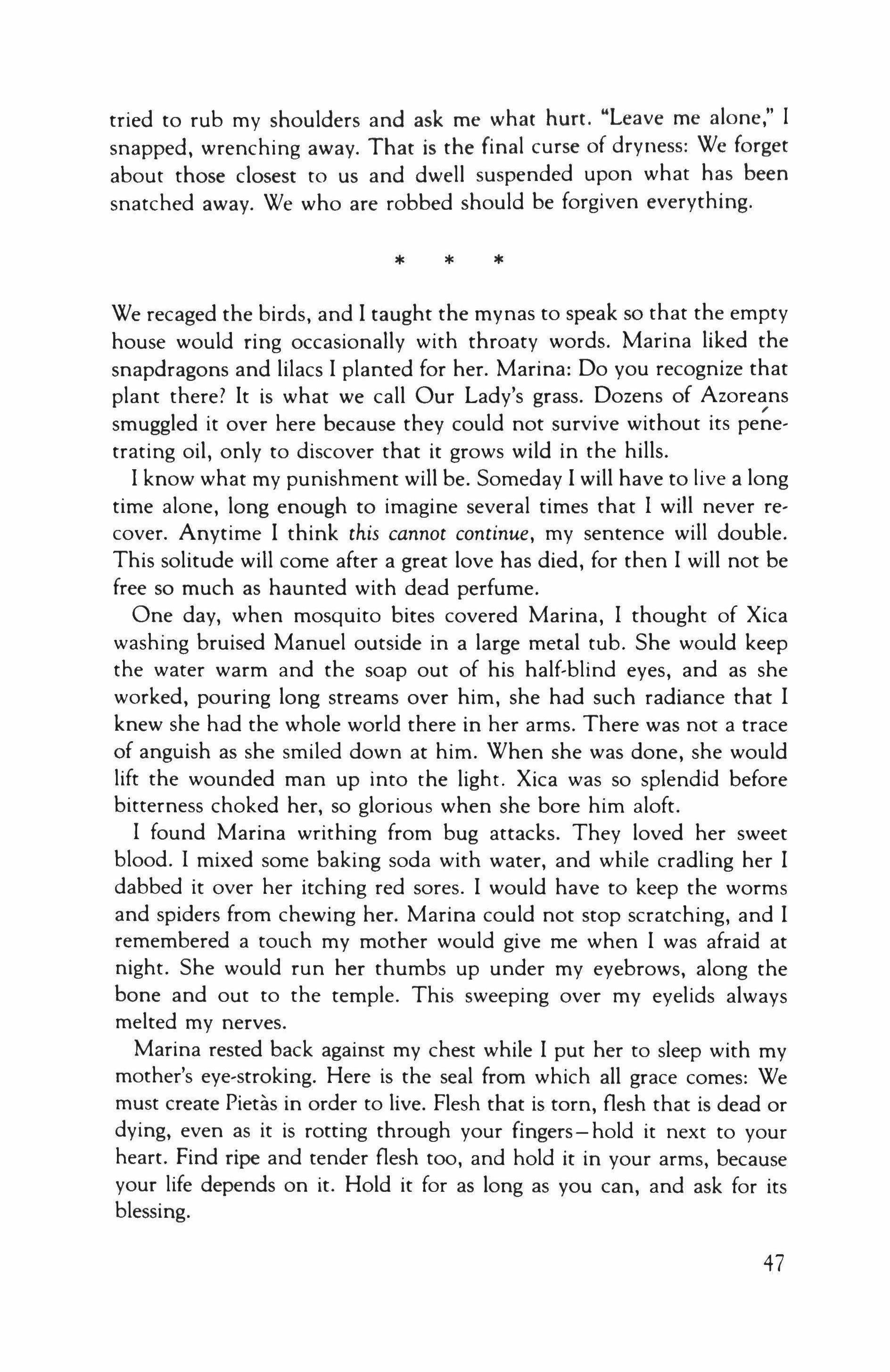
We recaged the birds, and I taught the mynas to speak so that the empty house would ring occasionally with throaty words. Marina liked the snapdragons and lilacs I planted for her. Marina: Do you recognize that plant there? It is what we call Our Lady's grass. Dozens of Azoreans smuggled it over here because they could not survive without its penetrating oil, only to discover that it grows wild in the hills.
I know what my punishment will be. Someday I will have to live a long time alone, long enough to imagine several times that I will never recover. Anytime I think this cannot continue, my sentence will double. This solitude will come after a great love has died, for then I will not be free so much as haunted with dead perfume.
One day, when mosquito bites covered Marina, I thought of Xica washing bruised Manuel outside in a large metal tub. She would keep the water warm and the soap out of his half-blind eyes, and as she worked, pouring long streams over him, she had such radiance that I knew she had the whole world there in her arms. There was not a trace of anguish as she smiled down at him. When she was done, she would lift the wounded man up into the light. Xica was so splendid before bitterness choked her, so glorious when she bore him aloft.
I found Marina writhing from bug attacks. They loved her sweet blood. I mixed some baking soda with water, and while cradling her I dabbed it over her itching red sores. I would have to keep the worms and spiders from chewing her. Marina could not stop scratching, and I remembered a touch my mother would give me when I was afraid at night. She would run her thumbs up under my eyebrows, along the bone and out to the temple. This sweeping over my eyelids always melted my nerves.
Marina rested back against my chest while I put her to sleep with my mother's eye-stroking. Here is the seal from which all grace comes: We must create Pieras in order to live. Flesh that is torn, flesh that is dead or dying, even as it is rotting through your fingers- hold it next to your heart. Find ripe and tender flesh too, and hold it in your arms, because your life depends on it. Hold it for as long as you can, and ask for its blessing.
* * *
47
Amazing
Francine Prose

In the upstairs bedroom, three teenage girls lay on top of a pile of coats, watching Yasir Arafat with the sound turned off. "Neat headscarf," said one. "Too bad he looks like Ringo Starr." The channels flipped past a half dozen images and settled on a baseball player mouthing silently at the camera. "Say no to drugs," said one of the girls.
"That's a Yankee," said another. "The Yankees are drinking and driving. The Mets are Just Say No."
How sweet it would have been to fall back on the bed and stare up at the high white ceiling and listen forever to the liquid murmuring voices of these girls! But Grady couldn't do that, he was working, he was supposed to be giving a puppet show at the children's party downstairs. Also he was anxious about Harry, his six-year-old son, who'd come to the party with him and been sent down to the basement where the other children were.
Three parties were going at once, one on top of the other. The TV teens were upstairs, the children on the bottom, and, sandwiched in the middle, adults. It had taken forever to find this place, out in the woods near Katonah. Grady kept missing the unmarked driveway, which, when he found it, went on so long he gave up in the middle and turned and drove back to the road. Harry had fallen silent. "We are not lost," Grady told him. "We are absolutely not lost." At last they reached a clearing and a perfect Victorian house, so grand Grady felt he should be seeing it from above, in an aerial shot under the titles of some primetime weekly soap.
On his way downstairs he drifted past other bedrooms; everywhere platform beds and pedestal TV's seemed to levitate slightly off the dovegray industrial carpeting. The hall was High Victorian, the bedrooms
48

High Tech, so that crossing a doorsill often meant a hundred-year jump in time. Grady bypassed the grownup party and continued down to the basement - a huge room, dramatically lit through a band of high windows beneath the ceiling. The polished wood floor was covered with Turkish kilims on which a dozen children were greedily helping themselves to the pleasures of Space Age child heaven: video games, a robot, a wall-sized TV showing vintage Betty Boop, a fully digital play kitchen. The noise was unspeakable-volleys of shooting rockets and maddening video tunes. Grady lingered long enough to see that Harry had found an inflated brontosaurus and was gently punching it back and forth with another little boy. Then he went upstairs.
The bar was set out on a carved oak hutch. Grady hovered nearby with a hopeful, doggy expression that eventually drew his hostess-a pretty, blond woman with sparkly girlish eyes that seemed startled to find themselves looking at you from so many spidery lines. A slight tic kept pulling one eye to the side, as if she wanted to wink at you but kept changing her mind.
"I'm Caroline," she said. "Did I say that before? Can I fix you a drink? Would that be all right? What would Miss Manners say?" Grady knew what she meant. Even when they themselves were feverishly drinking away the longueurs of a children's party, the parents who hired him almost never offered him drinks. It was as if he were one of the children, or had been hired to drive them somewhere instead of just entertain them.
Grady smiled. "Miss Manners would say, bourbon, a little ice. Please. Thank you." Caroline laughed and poured him a big glass of bourbon.
"You really shouldn't," she said. "Bourbon has the most toxins." Even as it occurred to Grady that this was her way of flirting, some note in her voice made him realize which of the TV-watching girls was hers. He was thinking of how to say this when he looked past the hutch and saw a photo of Mr. Rogers grinning at him from the wall.
"Gee," Grady said. "I'm finding it a little hard to drink this with Mr. Rogers watching."
"Oh," said Caroline. "I don't think Fred would object." She spoke warningly, as people do when you are about to slander someone and they signal you: Careful. This is a friend.
"Do you mind if I ask," Grady said, "why you have a framed photo of Mr. Rogers on your wall?"
"I don't know if you know," said Caroline, "but we have two sets of kids." She gestured up at the ceiling and down at the floor. "The girls are from previous marriages, but Walt is our joint production. I used to
49

watch Mr. Rogers with my first family, then I started watching him again with Walt. And there Fred Rogers was, still hanging in there. I wrote him a fan letter, and he sent me a very nice note."
"That's wonderful," Grady mumbled. Barbara used to say that Mr. Rogers was the last guy in the world she would leave Harry alone in a room with. But he couldn't tell Caroline that. It was a year since Barbara left - a year and two months, exactly. A year before that, a car had rear-ended her at a stop sign and left her in constant intractable pain from a headache nothing could touch. They'd seen a dozen doctors and at some point, amazingly, half the doctors asked: What happened to the car? It was embarrassing to have to say: Only one taillight got smashed.
Last Christmas Eve, Barbara sent Grady and Harry out for whipping cream for the eggnog. She'd been so specific - they'd driven around for ages till they found the only cream in the county that wasn't ultrapasteurized - and by the time they got back she had packed and left. Christmas Eve: they will always know precisely how long she's been gone. Now she called Harry weekly and sent postcards from Berkeley where she was in herbal therapy with a homeopath from Bombay; her handwriting was unrecognizable, sloppy and round as a child's. In nearly every card, she advised Grady to put sunscreen on Harry, as if she had forgotten they lived in a place with seasons. The longer Grady thought about this, the harder it became to let Caroline know that his silence was not a judgment on her warm feelings for Fred Rogers. Finally Caroline said, "Let's go find my husband. Do you need any help setting up?"
Actually Grady didn't; he'd designed the show that way. Still he followed Caroline, who was, he sensed, bringing him not for help but to be checked out. She led him through a cathedral-like addition, its rough beams and glass walls suggesting an Alpine ski lodge with guests who had nothing to do but wait for the clouds to part for their personal glimpse of the Matterhorn. The afternoon light made everything look glittery and expensive - the snowy field outside, the tinsel, the candles floating in glass bowls, the gleaming metallic thread shot through the women's sweaters.
The man whose forearm Caroline touched was talking to a pale girl with a greased, lacquer-black DA and wine-red raccoony eye shadow. She smiled once and vanished when Caroline said, "Eliot, this is Grady. Grady's doing Walter's puppets." The man who shook Grady's hand had the serious good looks of certain anchormen who Grady was always shocked to learn were around his own age.
"Eli," he said, with an odd overemphasis that made it hard to tell if he was being friendly or just contradicting his wife. "Good to meet you.
50

Can 1 get you another drink?" Eli's eyes had a swimmy, unfocused gaze that couldn't quite locate Grady's.
"Puppets," said Eli, refilling Grady's bourbon. "That's amazing." Often guys like Eli said that what Grady did was amazing, mostly in the onequarter admiring, three-quarters patronizing way people say: It's amazing women survive staying home with the kids. How many of the doctors he'd gone to with Barbara had paused, pen poised above the prescription blank, to tell him how much they wished they had talent in the arts.
Grady said, "I've been doing it for five years." He took a big gulp of bourbon. They were leaning against the hutch.
"I know what you mean," Eli said. "Nothing stays amazing for very long. Then other things become amazing. You know what amazes me? 1 don't know half of these people's names." They both stared into the room. Eli said, "This is embarrassing. Forget you heard this. 1 sound like the middle-aged yuppie Great Gatsby." Suddenly it struck Grady that Eli was really stewed.
Grady put down his glass. He liked having his wits about him. Barbara's leaving had left him feeling a need for extra vigilance about Harry. He kept telling himself that, despite everything, Harry would be all right; that morning Harry had woken him in great excitement to see on TV what looked like the Balinese equivalent of the Rose Bowl parade.
"I've got my puppet stuff in the hall," Grady said. His stage was a rectangular frame, surrounded by curtains he hung at waist level from shoulder straps and put his hands up underneath. His puppets fit in one large suitcase.
"Is that it?" said Eli. "Amazing." As Grady followed Eli down the basement stairs, a stocky child flew into them with such force that Eli stumbled. "Walt, this is Grady," Eli said. "Grady, my son, Walt. Grady's the puppet man."
The boy was dark-haired and glossily pretty, but with a peculiar, passive-aggressive slump you rarely saw in a child. "Are we having a pinata?" he said.
"No," Grady said. "No pinatas."
"Good," said Eli, "I can't stand pinatas. I've never seen it go down where some kid didn't nearly get brained."
"I want a pinata," Walt said.
"Excuse me," Eli said. "I need to check on something upstairs." Stunned, Grady and the birthday boy watched him leave. The child recovered first, lost interest and drifted off. Grady hoped Eli would come back. He could, if he had to, do his show marooned with kids on a
51
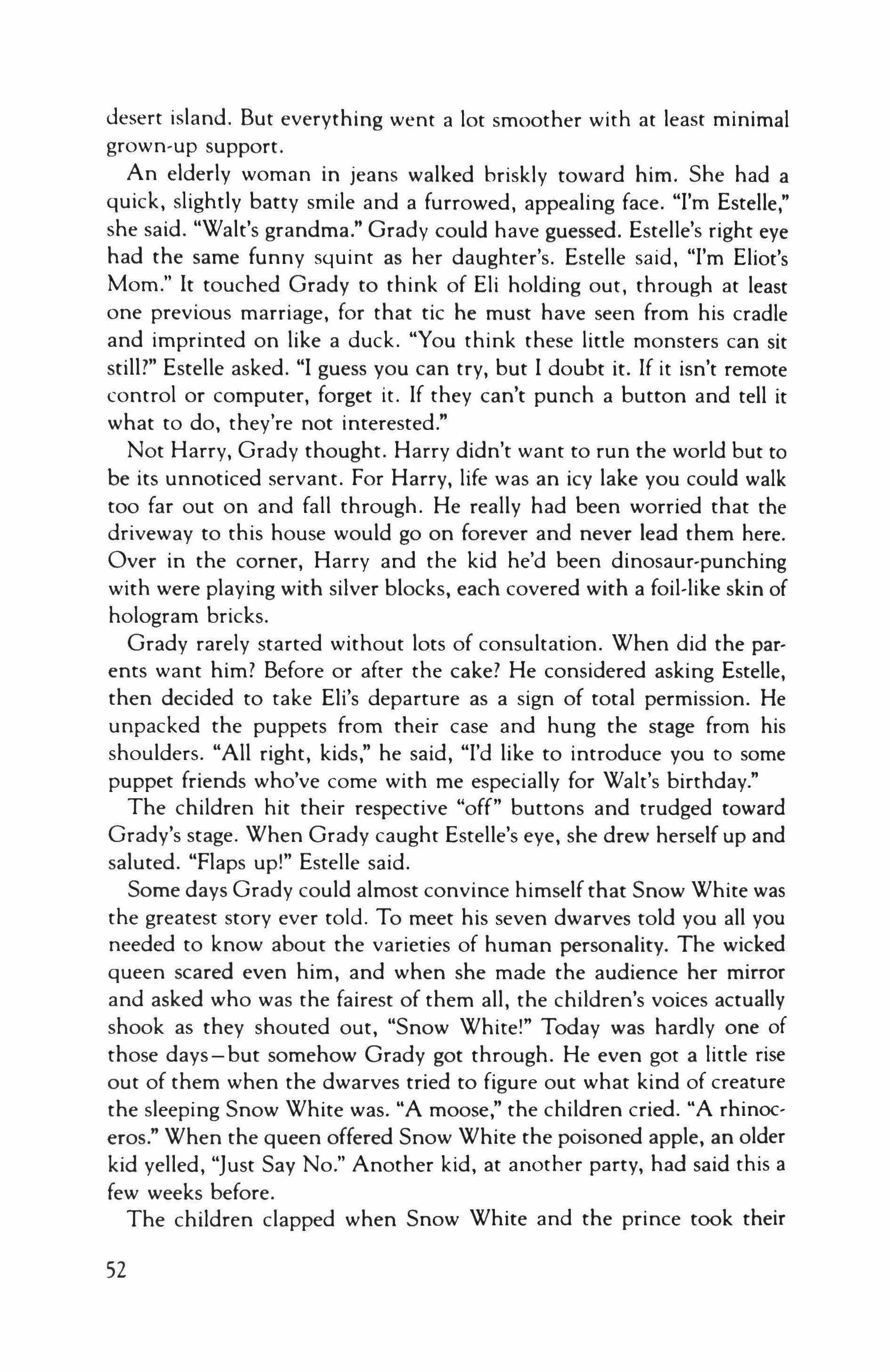
desert island. But everything went a lot smoother with at least minimal grown-up support.
An elderly woman in jeans walked briskly toward him. She had a quick, slightly batty smile and a furrowed, appealing face. "I'm Estelle," she said. "Walt's grandma." Grady could have guessed. Estelle's right eye had the same funny squint as her daughter's. Estelle said, "I'm Eliot's Mom." It touched Grady to think of Eli holding out, through at least one previous marriage, for that tic he must have seen from his cradle and imprinted on like a duck. "You think these little monsters can sit still?" Estelle asked. "I guess you can try, but I doubt it. If it isn't remote control or computer, forget it. If they can't punch a button and tell it what to do, they're not interested."
Not Harry, Grady thought. Harry didn't want to run the world but to be its unnoticed servant. For Harry, life was an icy lake you could walk too far out on and fall through. He really had been worried that the driveway to this house would go on forever and never lead them here. Over in the corner, Harry and the kid he'd been dinosaur-punching with were playing with silver blocks, each covered with a foil-like skin of hologram bricks.
Grady rarely started without lots of consultation. When did the parents want him? Before or after the cake? He considered asking Estelle, then decided to take Eli's departure as a sign of total permission. He unpacked the puppets from their case and hung the stage from his shoulders. "All right, kids," he said, "I'd like to introduce you to some puppet friends who've come with me especially for Walt's birthday."
The children hit their respective "off" buttons and trudged toward Grady's stage. When Grady caught Estelle's eye, she drew herself up and saluted. "Flaps up!" Estelle said.
Some days Grady could almost convince himself that Snow White was the greatest story ever told. To meet his seven dwarves told you all you needed to know about the varieties of human personality. The wicked queen scared even him, and when she made the audience her mirror and asked who was the fairest of them all, the children's voices actually shook as they shouted out, "Snow White!" Today was hardly one of those days-but somehow Grady got through. He even got a little rise out of them when the dwarves tried to figure out what kind of creature the sleeping Snow White was. "A moose," the children cried. "A rhinoceros." When the queen offered Snow White the poisoned apple, an older kid yelled, "Just Say No." Another kid, at another party, had said this a few weeks before.
The children clapped when Snow White and the prince took their
52
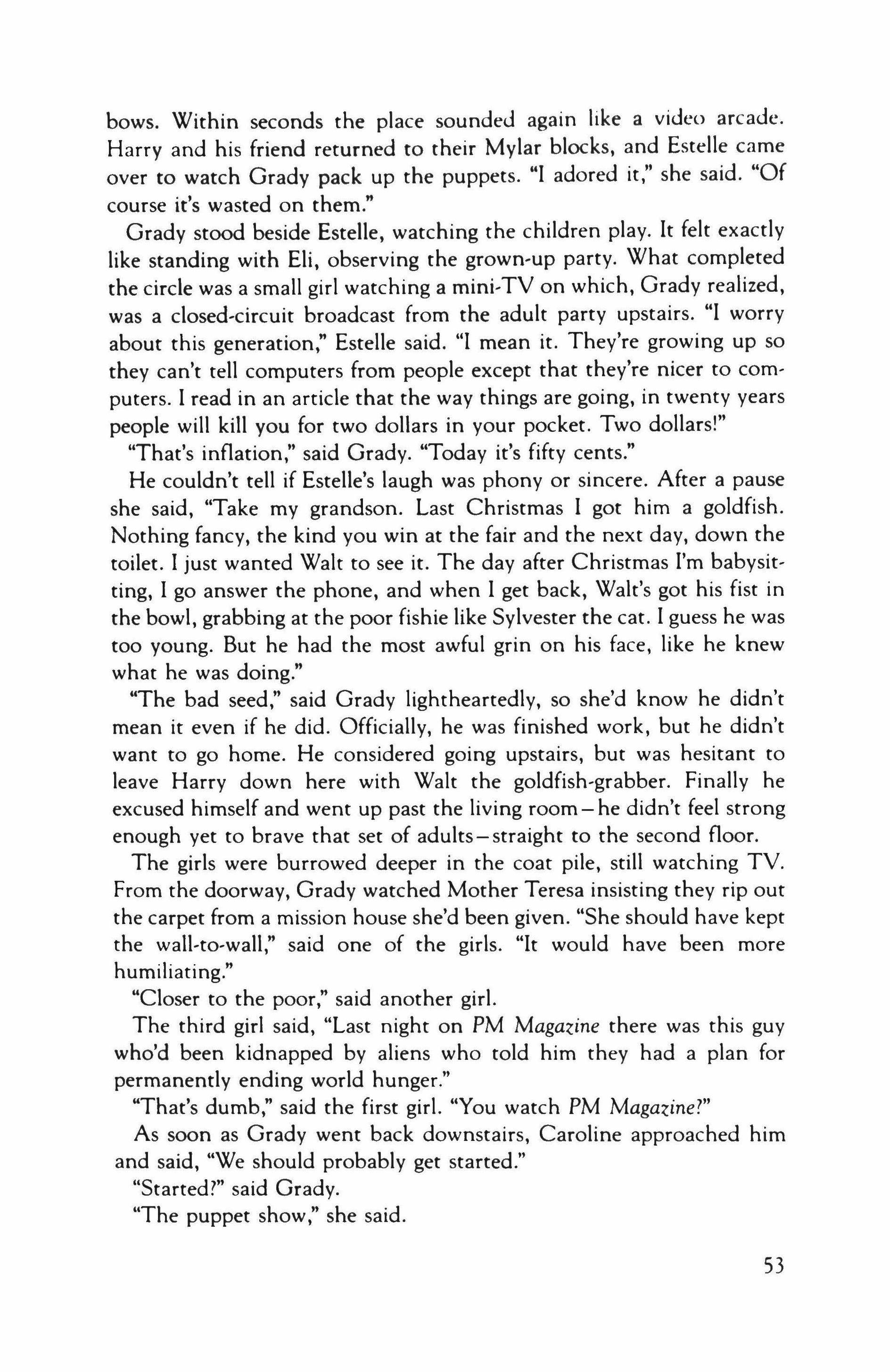
bows. Within seconds the place sounded again like a video arcade. Harry and his friend returned to their Mylar blocks, and Estelle came over to watch Grady pack up the puppets. "I adored it," she said. "Of course it's wasted on them."
Grady stood beside Estelle, watching the children play. It felt exactly like standing with Eli, observing the grown-up party. What completed the circle was a small girl watching a mini-T'v on which, Grady realized, was a closed-circuit broadcast from the adult party upstairs. "I worry about this generation," Estelle said. "I mean it. They're growing up so they can't tell computers from people except that they're nicer to computers. I read in an article that the way things are going, in twenty years people will kill you for two dollars in your pocket. Two dollars!"
"That's inflation," said Grady. "Today it's fifty cents."
He couldn't tell if Estelle's laugh was phony or sincere. After a pause she said, "Take my grandson. Last Christmas I got him a goldfish. Nothing fancy, the kind you win at the fair and the next day, down the toilet. I just wanted Walt to see it. The day after Christmas I'm babysit, ting, I go answer the phone, and when I get back, Walt's got his fist in the bowl, grabbing at the poor fishie like Sylvester the cat. I guess he was too young. But he had the most awful grin on his face, like he knew what he was doing."
"The bad seed," said Grady lightheartedly, so she'd know he didn't mean it even if he did. Officially, he was finished work, but he didn't want to go home. He considered going upstairs, but was hesitant to leave Harry down here with Walt the goldfish-grabber. Finally he excused himself and went up past the living room - he didn't feel strong enough yet to brave that set of adults - straight to the second floor.
The girls were burrowed deeper in the coat pile, still watching TV. From the doorway, Grady watched Mother Teresa insisting they rip out the carpet from a mission house she'd been given. "She should have kept the wall-to-wall," said one of the girls. "It would have been more humiliating."
"Closer to the poor," said another girl.
The third girl said, "Last night on PM Magazine there was this guy who'd been kidnapped by aliens who told him they had a plan for permanently ending world hunger."
"That's dumb," said the first girl. "You watch PM Magazine?"
As soon as Grady went back downstairs, Caroline approached him and said, "We should probably get started."
"Started?" said Grady.
"The puppet show," she said.
53

"Ended," Grady said. "It only takes half an hour."
"Where was n" Caroline looked so crumple-faced with disappointment that for a second Grady almost offered to repeat the whole show. The moment passed quickly, replaced by the thought that if it had been Mr. Rogers downstairs, she would have been down there watching.
"I'm sorry," she said. "I really am. It's all too much at once. We thought we could get it all over with in one shot. My first husband was a painter and in my first marriage we were always having parties. Afterwards we always fought."
"Parties are work," Grady said.
"It wasn't that," she said. "It was that we felt like each party was a window through which the guests could see our lives, and afterwards we would wonder what they saw, and try to see what they saw, until we would wind up not liking what we saw."
Grady's face felt stiff; he was dimly aware of a smile sitting stupidly on his mouth. He didn't know what to say. What if his life was dead-ending here, leaving him stuck forever, unable to either continue this conversation or move? Just then Grady felt a tug on his pants. My little savior! he thought. "How did you find me?" he said, and sank straight to his knees. It was crowded and the people standing nearest him gave him peculiar looks until they saw that he was consoling a child. Then, of course, they smiled. Harry was sobbing so hard he was choking. "Calm down," Grady whispered. "What happened?"
It took Harry a while to talk. "Walt hit me," he said. "Where?" Grady said. "Hit you where?"
Harry solemnly lifted his shirt. Diagonally across his right shoulder was an ugly welt. "How did he do that?" Grady said.
"A sword," Harry said.
"A stooTd?" repeated Grady, this time for Caroline's benefit.
"Oh, God," she said. "His plastic He-Man sword. He's been whacking the shit out of everything with it, and Eliot lets him get away with it."
"What seems to be the problem?" asked Eli.
Grady stood up. "The kids were fighting," he said. He longed to tell Eli to fuck off and grab Harry and get the hell out. But such was modern parenthood: Grady had to be nice. Also he felt he owed it to Harry not to make too much of this-to make him seem like a regular guy who could handle some rough-and-tumble.
"Walt hit me with a sword," Harry said.
"That little monster," Eli said. "Well, he's younger than you. You think you can forgive Walt if he says he's sorry?" Harry nodded tearfully. -An right," said Eli. "Let's go talk to him."
54

"I don't know," Grady said. "We should really be leaving."
"Not before the cake," Eli said to Harry. "Not before the ice cream and cake." Harry seemed to agree.
"O.K., we'll stay for some cake," Grady said, and the three of them trooped downstairs. The racket of the video games rose up to meet them. Grady felt suddenly tired; he couldn't remember how many times he'd been led up and down these steps. He thought: I went to a children's party and wound up in Dante's hell.
Walt was jabbing his sword at two little girls he had screaming in a corner. Eli gently disarmed him in a scene with echoes of every killer/ hostage movie Grady had ever watched. "Where's Grandma?" Grady asked Eli.
"Oh, Mom?" said Eliot. "Did you meet Estelle? Kids, where's Estelle?" he called out, but no one answered. "Oh, I don't know," he told Grady. "The kids probably killed and ate her. One thing about Mom: Dad was a fighter pilot, and now whenever the going gets rough, Mom just parachutes out."
Eli loomed over Walt. He said, "Did you hit this kid?" Only after Walt nodded did Eli kneel. "Say you're sorry," he said.
"I'm sorry," Walt said. Grady knelt, too, and the four of them huddled like some sort of midget scrimmage. "All right!" shouted Eli. "Cake time!"
In a small kitchen adjoining the playroom refreshments were set out on a rolling cart. On the top tier was the cake, actually a cake system, a series of rectangles iced like a choo-choo train. On the lower tiers were paper plates and forks. Eli wheeled the whole thing in. "Goddamn it," he said. "I should have lit the candles before I made my grand entrance."
Where was Caroline? wondered Grady. If she'd been upset about missing his show, what about missing this? Shouldn't someone go get her? And what about the teen half-sisters up on the second floor? Didn't they want to be here?
"Matches?" Eli said. Grady patted his pockets, though it was years since he'd smoked.
"Wait. I've got the perfect item." Eli took a pistol down from the wall. He aimed at the cake and pulled the trigger.
"I haven't seen one of those in years," Grady said. Eli smiled. "Not since your fifties finished basement, right? Well, this is my finished basement." He lit the birthday candles with the lighter-gun. "And one for good luck. Can you sing?"
After two dispirited verses of "Happy Birthday," Walt took four tries to
55

blow out the candles. "Gross," said one of the older kids. "You're spitting on the cake."
The cake and ice cream were served buffer style; each child was given a plate. Harry put his plate on the floor by his Mylar blocks. One girl set hers in the outstretched arms of the remote-control robot. "Bad day for the rugs," Grady said.
"Those kilims are tough," Eli said. "Camels have been pissing on them for two thousand years. Come on. I want to show you something."
If Grady had known that Eli meant to lead him upstairs again, he wouldn't have gone. But once they'd set off it was hard to balk and risk revealing that Grady was scared to leave his son with Eli's bad-seed child. Grady took a quick look-round for Harry, and, silently promising to be right back, followed Eli up two flights of stairs.
Eli paused at the door of the room where the girls were watching TV. "My daughter," he said. "Can you believe it?" But he didn't say which daughter was his, and none of the girls turned around. On the screen, a bearded scientist was displaying some red tomatoes he'd cloned from a single cell. "That guy is such a squid," one girl said.
Down the hall, Eli stopped and unlocked a door. It seemed odd, a locked room in your own house, and Grady instantly imagined some Bluebeard scenario, eight former wives stacked against the wall. Instead they entered a white Victorian room, one wall given over to about twenty built-in TV's. "Fabulous," said Grady. "The man who fell to earth."
"You got it," said Eli, and flicked a switch. Twenty tomatoes, one per screen, came up like a slot machine. "Magic," said Eli. "Clones upon clones." The tomatoes blinked off and twenty images of the scientistsquid took their place. Eli flipped another switch and every screen was different. He waited for Grady to say something. Finally Eli said, "Hey, well, it's tax-deductible." He picked up a glossy magazine and handed it to Grady. On the cover was a photo of Howdy Doody and Buffalo Bob, shot in black-and-white with a dirty, Helmut Newton edge. The name of the magazine was Television World. "The family cottage industry," Eli said.
"That's your magazine?" Grady said.
"The first twelve issues paid for this house," Eli said. "It was your textbook business cliche. Find a need and fill it. Plug that hole in the wall of commerce and the dollars pile up. What struck me was that people our age grew up on TV, we learned about girls on TV, we learned how to dance, we fought a whole war watching the six o'clock news. So I thought: Why not get some really good writers to write about TV? John
56
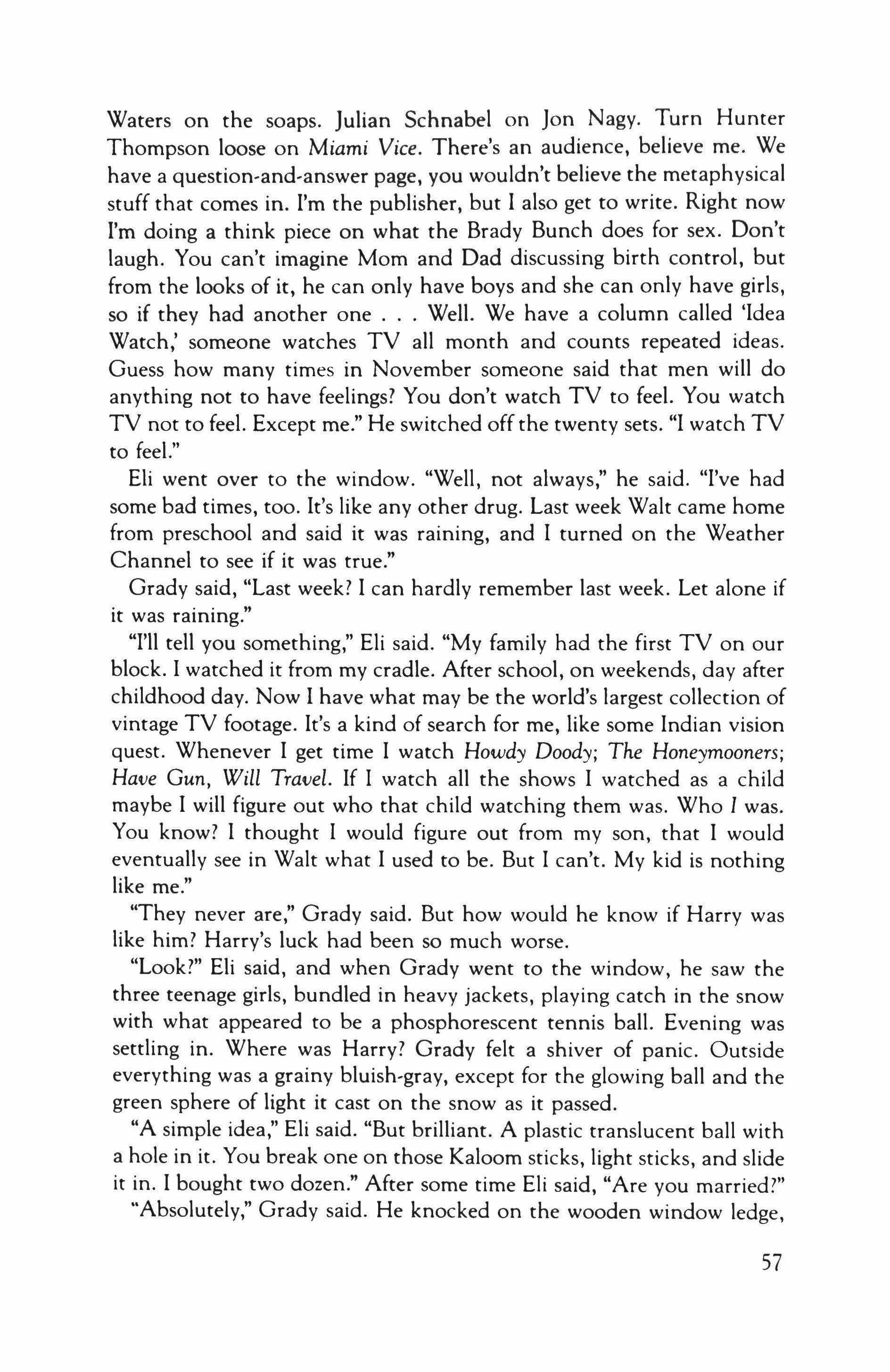
Waters on the soaps. Julian Schnabel on Jon Nagy. Turn Hunter Thompson loose on Miami Vice. There's an audience, believe me. We have a question-and-answer page, you wouldn't believe the metaphysical stuff that comes in. I'm the publisher, but I also get to write. Right now I'm doing a think piece on what the Brady Bunch does for sex. Don't laugh. You can't imagine Mom and Dad discussing birth control, but from the looks of it, he can only have boys and she can only have girls, so if they had another one Well. We have a column called 'Idea Watch,' someone watches TV all month and counts repeated ideas. Guess how many times in November someone said that men will do anything not to have feelings? You don't watch TV to fee!' You watch TV not to fee!' Except me." He switched off the twenty sets. "I watch TV to fee!."
Eli went over to the window. "Well, not always," he said. "I've had some bad times, too. It's like any other drug. Last week Walt came home from preschool and said it was raining, and I turned on the Weather Channel to see if it was true."
Grady said, "Last week? I can hardly remember last week. Let alone if it was raining."
"I'll tell you something," Eli said. "My family had the first TV on our block. I watched it from my cradle. After school, on weekends, day after childhood day. Now I have what may be the world's largest collection of vintage TV footage. It's a kind of search for me, like some Indian vision quest. Whenever I get time I watch Howdy Doody; The Honeymooners; Have Gun, Will Travel. If I watch all the shows I watched as a child maybe I will figure out who that child watching them was. Who 1 was. You know? I thought I would figure out from my son, that I would eventually see in Walt what I used to be. But I can't. My kid is nothing like me."
"They never are," Grady said. But how would he know if Harry was like him? Harry's luck had been so much worse.
"Look?" Eli said, and when Grady went to the window, he saw the three teenage girls, bundled in heavy jackets, playing catch in the snow with what appeared to be a phosphorescent tennis ball. Evening was settling in. Where was Harry? Grady felt a shiver of panic. Outside everything was a grainy bluish-gray, except for the glowing ball and the green sphere of light it cast on the snow as it passed.
"A simple idea," Eli said. "But brilliant. A plastic translucent ball with a hole in it. You break one on those Kaloom sticks, light sticks, and slide it in. I bought two dozen." After some time Eli said, "Are you married?" "Absolutely," Grady said. He knocked on the wooden window ledge,
57
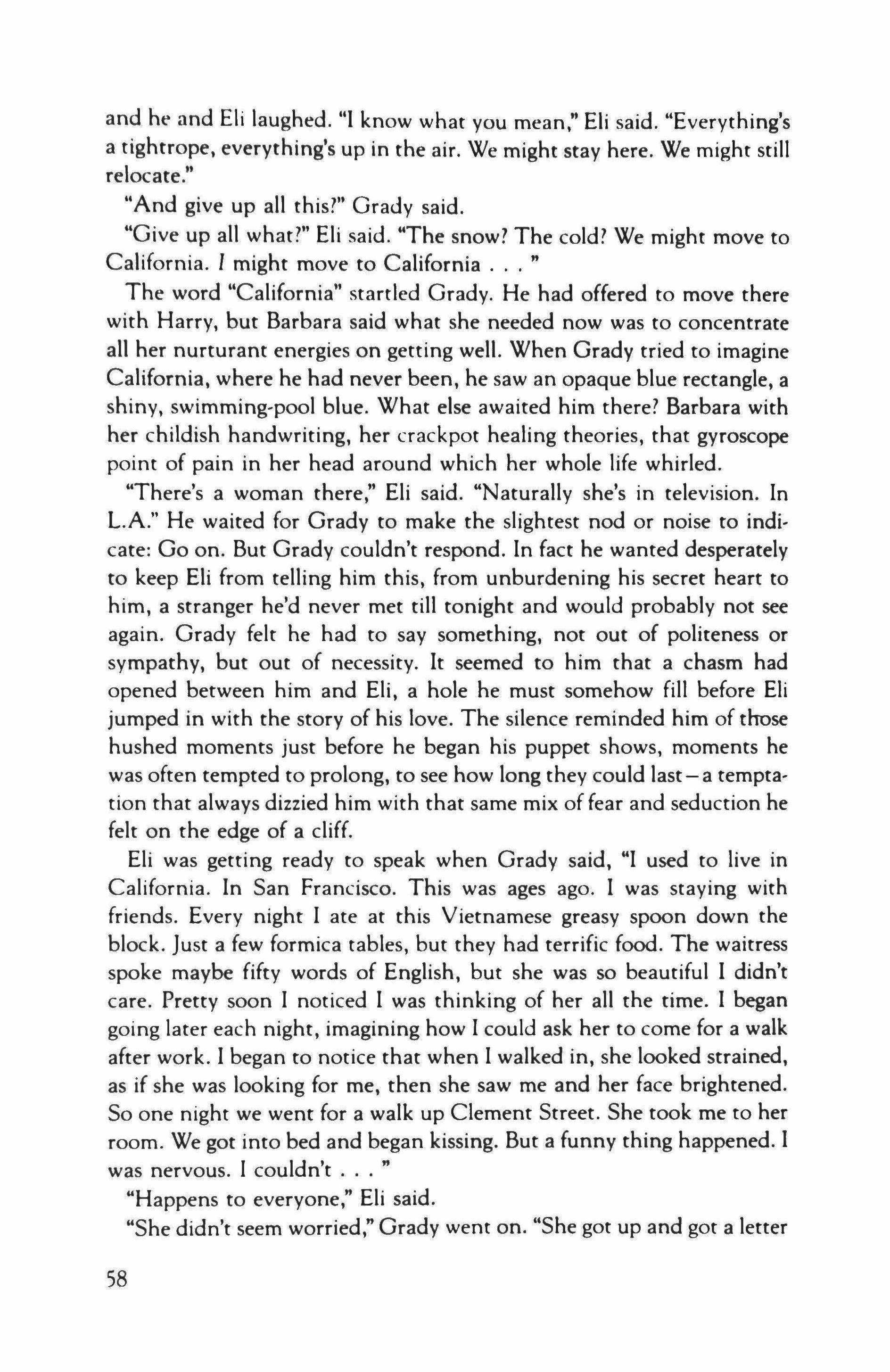
and he and Eli laughed. "I know what you mean," Eli said. "Everything's a tightrope, everything's up in the air. We might stay here. We might still relocate."
"And give up all this!" Grady said.
"Give up all what!" Eli said. "The snow! The cold! We might move to California. I might move to California "
The word "California" startled Grady. He had offered to move there with Harry, but Barbara said what she needed now was to concentrate all her nurturant energies on getting well. When Grady tried to imagine California, where he had never been, he saw an opaque blue rectangle, a shiny, swimming-pool blue. What else awaited him there! Barbara with her childish handwriting, her crackpot healing theories, that gyroscope point of pain in her head around which her whole life whirled.
"There's a woman there," Eli said. "Naturally she's in television. In L.A." He waited for Grady to make the slightest nod or noise to indicate: Go on. But Grady couldn't respond. In fact he wanted desperately to keep Eli from telling him this, from unburdening his secret heart to him, a stranger he'd never met till tonight and would probably not see again. Grady felt he had to say something, not out of politeness or sympathy, but out of necessity. It seemed to him that a chasm had opened between him and Eli, a hole he must somehow fill before Eli jumped in with the story of his love. The silence reminded him of those hushed moments just before he began his puppet shows, moments he was often tempted to prolong, to see how long they could last - a temptation that always dizzied him with that same mix of fear and seduction he felt on the edge of a cliff.
Eli was getting ready to speak when Grady said, "I used to live in California. In San Francisco. This was ages ago. I was staying with friends. Every night I ate at this Vietnamese greasy spoon down the block. Just a few formica tables, but they had terrific food. The waitress spoke maybe fifty words of English, but she was so beautiful I didn't care. Pretty soon I noticed I was thinking of her all the time. I began going later each night, imagining how I could ask her to come for a walk after work. I began to notice that when I walked in, she looked strained, as if she was looking for me, then she saw me and her face brightened. So one night we went for a walk up Clement Street. She took me to her room. We got into bed and began kissing. But a funny thing happened. I was nervous. I couldn't
"Happens to everyone," Eli said.
"She didn't seem worried," Grady went on. "She got up and got a letter
58
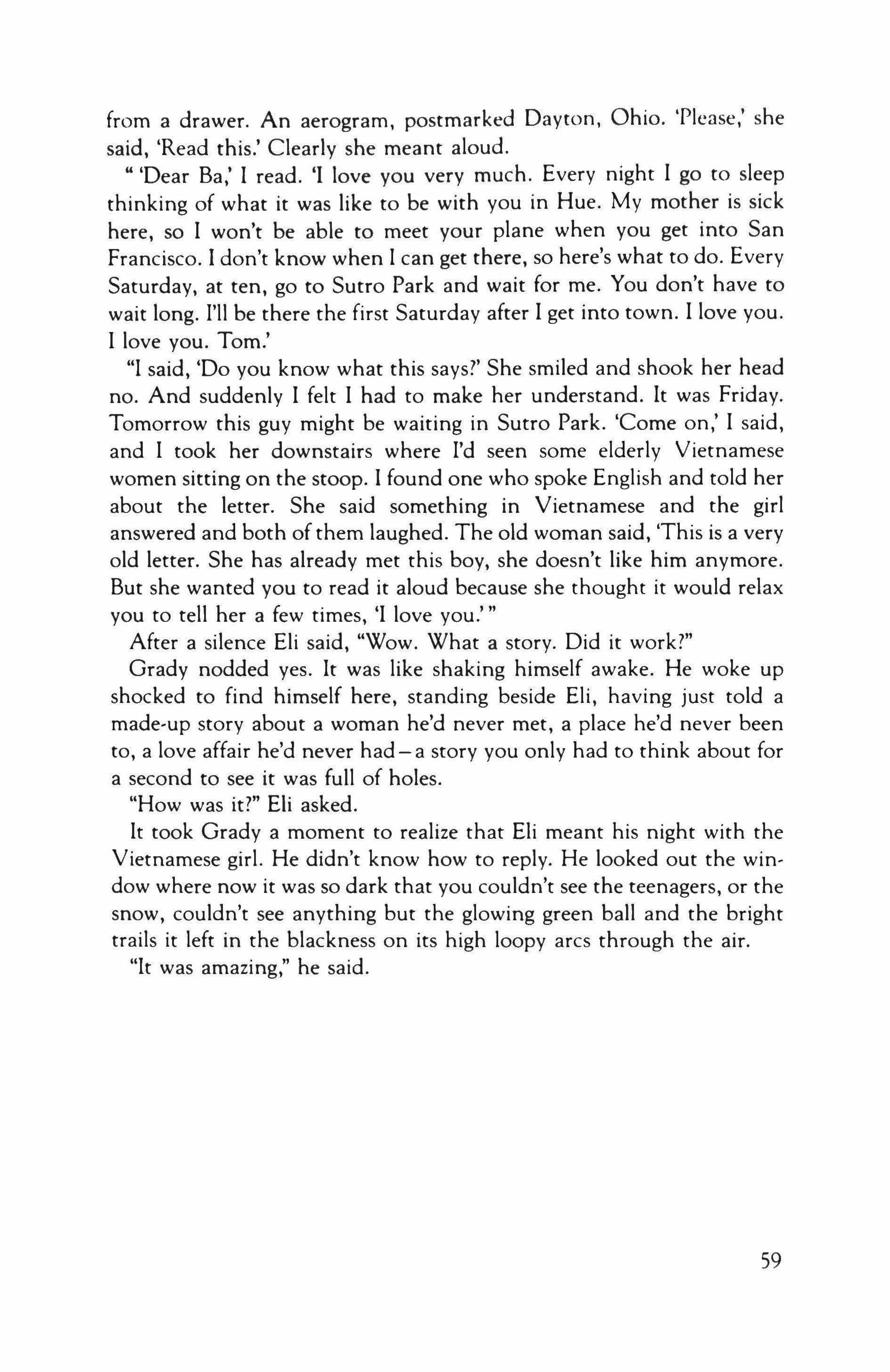
from a drawer. An aerogram, postmarked Dayton, Ohio. 'Please,' she said, 'Read this.' Clearly she meant aloud.
'Dear Ba,' I read. 'I love you very much. Every night I go to sleep thinking of what it was like to be with you in Hue. My mother is sick here, so I won't be able to meet your plane when you get into San Francisco. I don't know when I can get there, so here's what to do. Every Saturday, at ten, go to Sutro Park and wait for me. You don't have to wait long. I'll be there the first Saturday after I get into town. I love you. I love you. Tom.'
"I said, 'Do you know what this says?' She smiled and shook her head no. And suddenly I felt I had to make her understand. It was Friday. Tomorrow this guy might be waiting in Sutro Park. 'Come on,' I said, and I took her downstairs where I'd seen some elderly Vietnamese women sitting on the stoop. I found one who spoke English and told her about the letter. She said something in Vietnamese and the girl answered and both of them laughed. The old woman said, This is a very old letter. She has already met this boy, she doesn't like him anymore. But she wanted you to read it aloud because she thought it would relax you to tell her a few times, 'I love you.'"
After a silence Eli said, "Wow. What a story. Did it work?"
Grady nodded yes. It was like shaking himself awake. He woke up shocked to find himself here, standing beside Eli, having just told a made-up story about a woman he'd never met, a place he'd never been to, a love affair he'd never had - a story you only had to think about for a second to see it was full of holes.
"How was it?" Eli asked.
It took Grady a moment to realize that Eli meant his night with the Vietnamese girl. He didn't know how to reply. He looked out the window where now it was so dark that you couldn't see the teenagers, or the snow, couldn't see anything but the glowing green ball and the bright trails it left in the blackness on its high loopy arcs through the air.
"It was amazing," he said.
59
Going Out
Dan Chaon

My father and I have been attending Alcoholics Anonymous meetings on Thursday evenings for several weeks now, and I'm beginning to find it hard to pay attention. My father sits, hands folded in his lap, head cocked as if he's at a symphony. He nods and writes in a small spiral notebook, and I watch his face surreptitiously. As always, I can't help noticing the eye.
My father has a glass eye. He used to be a welder, and once, when he was drunk and not wearing goggles, a hot spark flew up and put his eye out. It always terrified me. I remember being about five or six and staying at his place, and waking up to go to the bathroom. The eye was lying there by the sink in a tiny box of white cotton. I imagined that it could see me. I pictured him stretched out on his bed, and I thought of the empty socket. Whenever he looked at me, the glass eye remained fixed. When he was drunk, or hadn't showered, it would become encrusted with a dull gold mucus. Sometimes he embellished the story of the welding spark hy telling me that his eye had been turned to a jelly, that the doctors had dug it out with a spoon.
Even now I find myself unnerved by it-it's a token of how he used to be, and when he catches me staring I look down quickly. In his notebook he has printed: "I'm O.K., You're O.K.!"
The speaker has written these words on the chalkboard and underlined them. I copy it down too.
As we are driving back to my father's trailer on the outskirts of town, my father weeps. He often cries after these meetings, though not openly. I can only see the tears if a car goes by in the other direction, lighting his face in a brief flash, like a snapshot. I'm completely still. I never ask him,
60

but I suspect he's crying over me, blaming himself for how my life has turned out, ashamed that I ended up an alcoholic even before I turned twenty. That's what I imagine, though I know it's self-centered. I've always had a weak spot for easy excuses. I tried to believe all along that my father drank because my mother left him, though in truth she divorced him long after his problem had become apparent. I try to tell myself that I became a drunk because my mother died, but in my more honest moments, I have my doubts. Not to say I wasn't upset. She died in the winter of my freshman year in college, and for months and months afterward, I wandered the campus like I was underwater. I couldn't hear people when they talked to me. Secretly, though, I admit that I drank because it was wonderful-the numb freedom that allowed me to walk across the fraternity rooftop, three stories above ground, or kiss a pretty girl at a party out of nowhere, with no fear of retribution, or catcall the big, square-jawed guys outside the next fraternity house. It was only when, on a dare, I chugged half a bottle of ouzo and ended up in a coma for three days that I began to blame it all on my mother's death.
For as long as I can remember, my father has lived in a two-bedroom trailer house in the country. I used to spend a month there every summer until I was fourteen, and his drinking got so out of hand that even overnight visits weren't possible anymore. But the memory of the place has stuck with me: the smell of sweat and leftovers, the dirty clothes and overflowing ashtrays; girlie magazines and detective paperbacks scattered on the floor, piled on the furniture. My father taught me to play poker. When he got up in the morning, he would sit in his underwear at the kitchen table and I'd sit across from him. We'd play cards all afternoon, into the evening, and my father smoked cigarette after cigarette, drinking beer and later Jack Daniels, not wanting to eat or get dressed or even raise the shade. Whenever we played, he gave me fifty dollars, and proceeded to win it all back. By dusk I'd have lost all the money and he'd be drunk enough to begin giving me beers. I took them nervously, sipping at them until they grew warm and flat, grimacing at the bitter taste. I never thought he was a monster, no matter what my mother said. For me, there was something conspiratorial and grown-up about staying with him: gambling, drinking, looking at nude ladies in his magazines, never going to bed until I wanted. I didn't even hate him when he grew frightening, late at night. He'd talk about old bosses he'd had, punching the air with his fists, or describe the bodies of women he'd known, grinning langorously, looming over me and gesturing. I
61
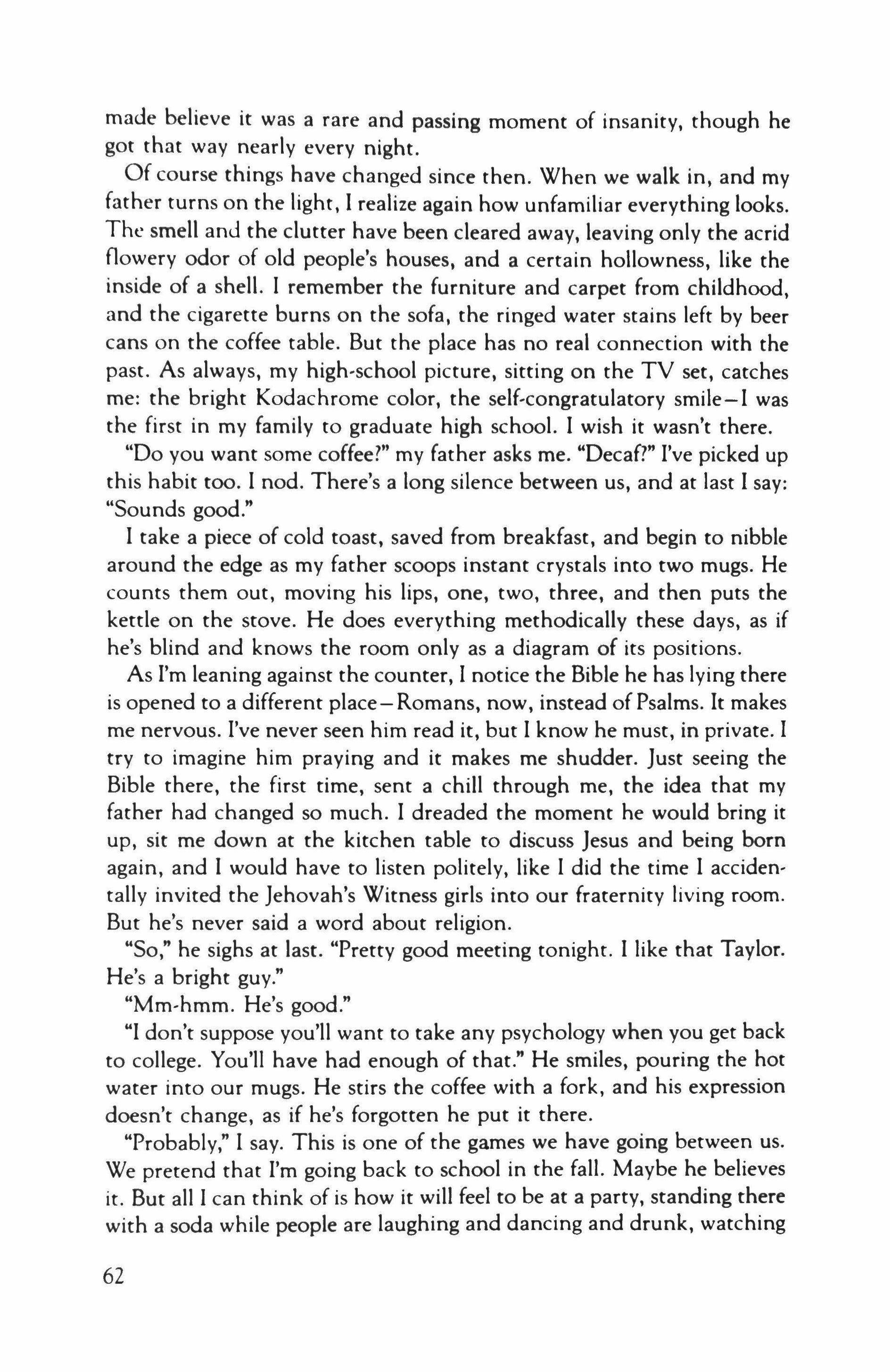
made believe it was a rare and passing moment of insanity, though he got that way nearly every night.
Of course things have changed since then. When we walk in, and my father turns on the light, I realize again how unfamiliar everything looks. The smell and the clutter have been cleared away, leaving only the acrid flowery odor of old people's houses, and a certain hollowness, like the inside of a shell. I remember the furniture and carpet from childhood, and the cigarette burns on the sofa, the ringed water stains left by beer cans on the coffee table. But the place has no real connection with the past. As always, my high-school picture, sitting on the TV set, catches me: the bright Kodachrome color, the self-congratulatory smile-I was the first in my family to graduate high school. I wish it wasn't there.
"Do you want some coffee?" my father asks me. "Decaf]" I've picked up this habit too. I nod. There's a long silence between us, and at last I say: "Sounds good."
I take a piece of cold toast, saved from breakfast, and begin to nibble around the edge as my father scoops instant crystals into two mugs. He counts them out, moving his lips, one, two, three, and then puts the kettle on the stove. He does everything methodically these days, as if he's blind and knows the room only as a diagram of its positions.
As I'm leaning against the counter, I notice the Bible he has lying there is opened to a different place - Romans, now, instead of Psalms. It makes me nervous. I've never seen him read it, but I know he must, in private. I try to imagine him praying and it makes me shudder. Just seeing the Bible there, the first time, sent a chill through me, the idea that my father had changed so much. I dreaded the moment he would bring it up, sit me down at the kitchen table to discuss Jesus and being born again, and I would have to listen politely, like I did the time I accidentally invited the Jehovah's Witness girls into our fraternity living room. But he's never said a word about religion.
"So," he sighs at last. "Pretty good meeting tonight. 1 like that Taylor. He's a bright guy."
"Mrn-hrnrn. He's good."
"I don't suppose you'll want to take any psychology when you get back to college. You'll have had enough of that." He smiles, pouring the hot water into our mugs. He stirs the coffee with a fork, and his expression doesn't change, as if he's forgotten he put it there.
"Probably," 1 say. This is one of the games we have going between us. We pretend that I'm going back to school in the fall. Maybe he believes it. But all 1 can think of is how it will feel to be at a party, standing there with a soda while people are laughing and dancing and drunk, watching
62

them passing out cups of beer at the bar. I imagine my friends saying guarded, polite things: "How are you doing!" and trying not to let their eyes drift down to the drinks on their hands, shifting their weight. I couldn't stand it for a minute, though I can't bring myself to admit it to him. September is still months away.
"I don't think you'll have any trouble getting your scholarship back, do you!" He keeps at this point, meticulously as at everything else.
"Probably not," 1 say. He sighs, sips coffee. We blink at one another in the sharp fluorescent light.
Even now, after all that has happened, 1 still find myself longing for a drink. One of the first things 1 learned in detox was that for me, sleep and alcohol were intertwined. After the coffee and cigarettes it takes to get me through a day, 1 lie down and the soft hush hush of my heart starts to pump in my ears. It seems like only a drink could muffle the sound. There are times, during the day, that I'm sure there's nothing wrong with me. 1 say to myself that everybody overindulges when they're young, that all people wanted, really, was to give me a good scare. But then my hands will start to shake, or my head will hum, and I'll wonder whether 1 belong back in the psych ward. I'll feel like I've become as tired and used-up as he has.
It doesn't help to be here, at his place in rural Nebraska. To see the fields and untraveled dirt roads stretching out in every direction, barren and dusty as a moonscape. To hear the soft static buzz of locusts and the cows lowing in the pasture across the road and the slow thud of a distant irrigation pump hovering in the air as I try to close my eyes.
My father is a short, dark-haired man with a heavy brow and leathery, sun-wrinkled skin. People are afraid of his looks, not just because of his eye, but also because there is a kind of inborn intensity to his expression that is even apparent in baby pictures.
He never used to have any hobbies, except drinking and reading detective novels that featured screaming, half-dressed women on their covers. But these days he spends his time off in the shed behind the trailer, making things out of scrap metal. Maybe he finds it therapeutic. Maybe, since he's no longer a welder by trade, he does it out of nostalgia, or to keep in practice. He works with old automobile parts and barbed wire, nails and brass pipes, making things like candlestick holders, picture frames, bookends. He made me a belt buckle out of thin slices of copper tubing, welded together like a honeycomb. The stuff isn't that bad. It has a kind of beauty to it, like something from another planet.
63

Four days a week, my father works at a feedlot. He tells me they are looking for people, and he thinks a little hard work would be good for me. We're standing in his workshop when he suggests this, surrounded by bits of metal and junk, and when I don't answer it seems like the old engines and bedsprings close in a little. He tells me that he doesn't think it's good for me to just sit around all day, brooding. He has a flat piece of metal in a vise and he's slowly pounding it into a helix. He grits his teeth.
"Or," he says, grunting, "you could try to get a job somewhere else if you want. But I've always said that it's the physical work that keeps your mind off your troubles." He looks up at me, sweating. He cocks his head slightly, in order to fix his good eye on me.
"Sure," I say. I edge my foot along the ground, scattering bolts, spark plugs, washers. I shrug.
On Monday, I go into the office to fill out an application. Cowboys and old sixties-types with scruffy beards are milling around, and some of them turn to look at me as I pass. I had long hair and two week's growth on my face when I went to detox, but they insisted I cut my hair and shave daily. Now I look clean-cut, like someone who folds their hands in their lap when they sit down, someone who constantly smooths the creases of their pants.
The man behind the desk is wearing a western shirt and a string tie, and his hair is slicked across his balding head. He rubs his knuckles as he looks at the application. "We don't get many college kids out here." He frowns. "This is hard work-physical work."
"I know," I say. I look at my feet, trying to shift my leg so my argyle socks aren't visible to the men passing behind me. My father was the one who told me to dress up.
"Where did you learn of this position?"
"My dad works here," I say. I glance across the room, to where he's punching his time card. "larry Reed."
"Mmm." The man's eyes narrow, and he writes a quick scrawl across my application. "We'll get back to you."
When I get outside, my father is standing by the door, waiting for me. I tell him I don't think I'll get the job, but he just smiles. He suggests that maybe I want to ride around with him for a while and look the place over. As we walk by a parked pickup, I notice two paunchy cowboys leaned up against it, trading what looks like a joint back and forth. I can't think of an excuse to get out of staying. "I guess so," I say, and follow him, keeping pace with his slow, regretful walk.
The truck my father drives is an old ten-ton, the kind I used to see
64
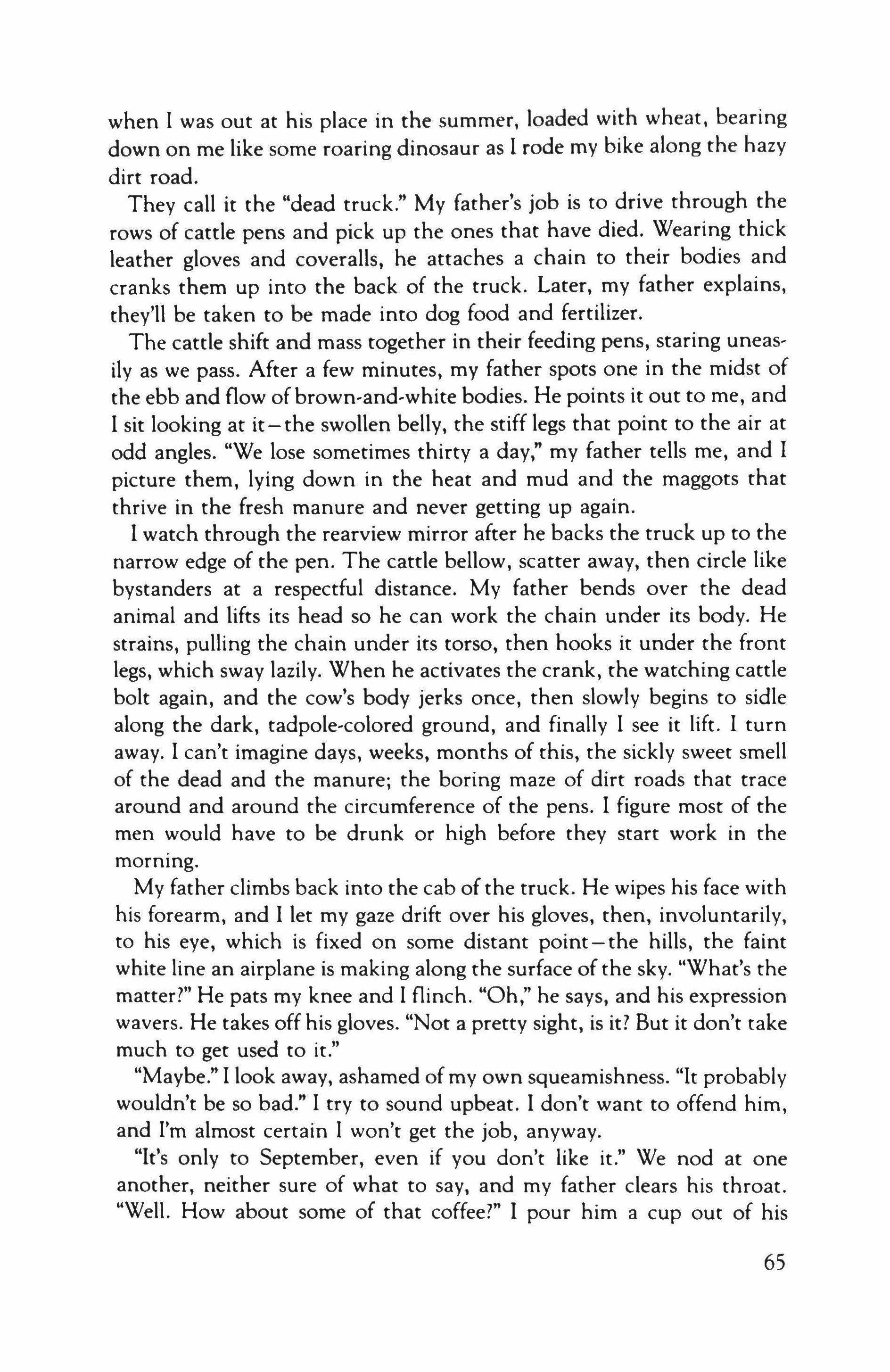
when I was out at his place in the summer, loaded with wheat, bearing down on me like some roaring dinosaur as I rode my bike along the hazy dirt road.
They call it the "dead truck." My father's job is to drive through the rows of cattle pens and pick up the ones that have died. Wearing thick leather gloves and coveralls, he attaches a chain to their bodies and cranks them up into the back of the truck. Later, my father explains, they'll be taken to be made into dog food and fertilizer.
The cattle shift and mass together in their feeding pens, staring uneasily as we pass. After a few minutes, my father spots one in the midst of the ebb and flow of brown-and-white bodies. He points it out to me, and I sit looking at it-the swollen belly, the stiff legs that point to the air at odd angles. "We lose sometimes thirty a day," my father tells me, and I picture them, lying down in the heat and mud and the maggots that thrive in the fresh manure and never getting up again.
I watch through the rearview mirror after he backs the truck up to the narrow edge of the pen. The cattle bellow, scatter away, then circle like bystanders at a respectful distance. My father bends over the dead animal and lifts its head so he can work the chain under its body. He strains, pulling the chain under its torso, then hooks it under the front legs, which sway lazily. When he activates the crank, the watching cattle bolt again, and the cow's body jerks once, then slowly begins to sidle along the dark, tadpole-colored ground, and finally I see it lift. I turn away. I can't imagine days, weeks, months of this, the sickly sweet smell of the dead and the manure; the boring maze of dirt roads that trace around and around the circumference of the pens. I figure most of the men would have to be drunk or high before they start work in the morning.
My father climbs back into the cab of the truck. He wipes his face with his forearm, and I let my gaze drift over his gloves, then, involuntarily, to his eye, which is fixed on some distant point - the hills, the faint white line an airplane is making along the surface of the sky. "What's the matter?" He pats my knee and I flinch. "Oh," he says, and his expression wavers. He takes off his gloves. "Not a pretty sight, is it? But it don't take much to get used to it."
"Maybe." I look away, ashamed of my own squeamishness. "It probably wouldn't be so bad." I try to sound upbeat. I don't want to offend him, and I'm almost certain I won't get the job, anyway.
"It's only to September, even if you don't like it." We nod at one another, neither sure of what to say, and my father clears his throat. "Well. How about some of that coffee?" I pour him a cup out of his
65

thermos, balancing as the truck jogs forward. I concentrate on believing there will be a time when my life is back in order, when I'm back at the university, walking through the quad with a load of books, or looking out my window at night and seeing the bright dominoes of city lights in the distance. I can remember how, once, when I was little, my father and I stood on the hill at night, watching the cars passing on the interstate, imagining the person that a certain headlight represented, guessing where he was going. College seems at least that distant to me now.
"Don't look so down-in-the-mouth," my father says. "You should've seen me when I came back from the cure. You're tougher than I was. All you need is something to keep your hands busy."
Out the window, the white faces of Hereford cattle are ghostly in the waves of heat-pale, skull-like masks, staring as we drive by. "Yeah?" I'm playing with the neck of my shirt, crumpling it, and I smooth it out when I realize what I'm doing. We nod again.
A few hours later, my father parks the truck for lunch, and we pass a sandwich back and forth, trading bites. "I guess my life is pretty good these days," my father says, chewing thoughtfully. "Things are calmer now. More peaceful. I fiddle around in the shop. Go fishing. I'm getting older, you know, all I want is the easy life. You're lucky. This thing didn't drag on and ruin your life." His eye searches my face, but I remain blank. "Things will turn out fine for you, just you watch."
I don't say anything. But what I'm thinking is how it would be to go back to school, the way it would feel to move my things out of my fraternity, looking up to see my friends' stares shift quickly away; the way it would feel to stand in the doorway of an empty dorm room and see the nights ahead buzzing endlessly, like a fly around a lighrbulb. It makes me feel cold.
"Don't you think so?" my father asks.
"Yeah," I say. "I'm sure things will work out fine."
On days that my father is at work, I try to think of at least one thing I can do so when he comes home and asks: "What have you been up to today?" I can prove I haven't just been sitting at the kitchen table, drinking coffee and brooding. I'll mow the ragged patch of lawn, and put out sprinklers, or I'll clean in his shop, sweeping the tiny dollops of melted metal into a pile, re-baiting the mousetraps he's hidden behind a stack of old pipes, picking through the coffee cans full of nuts and bolts and nails and separating them into individual cans. Mostly, I do these things in the afternoon, so that I won't finish too soon and have hours and hours left to kill. If I start late enough, I'll still be busy when he
66
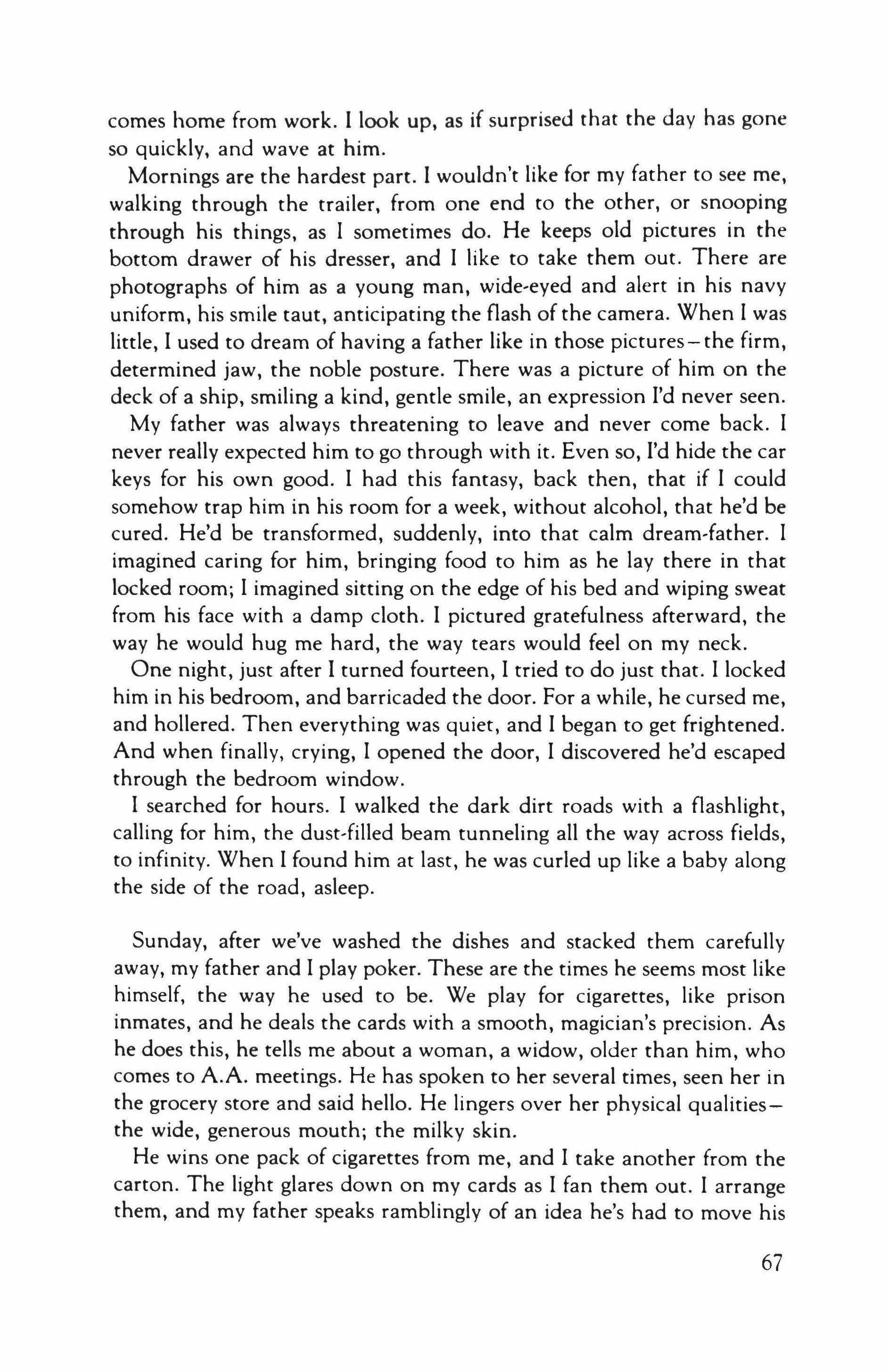
comes home from work. I look up, as if surprised that the day has gone so quickly, and wave at him.
Mornings are the hardest part. I wouldn't like for my father to see me, walking through the trailer, from one end to the other, or snooping through his things, as I sometimes do. He keeps old pictures in the bottom drawer of his dresser, and I like to take them out. There are photographs of him as a young man, wide-eyed and alert in his navy uniform, his smile taut, anticipating the flash of the camera. When I was little, I used to dream of having a father like in those pictures- the firm, determined jaw, the noble posture. There was a picture of him on the deck of a ship, smiling a kind, gentle smile, an expression I'd never seen.
My father was always threatening to leave and never come back. I never really expected him to go through with it. Even so, I'd hide the car keys for his own good. I had this fantasy, back then, that if I could somehow trap him in his room for a week, without alcohol, that he'd be cured. He'd be transformed, suddenly, into that calm dream-father. I imagined caring for him, bringing food to him as he lay there in that locked room; I imagined sitting on the edge of his bed and wiping sweat from his face with a damp cloth. I pictured gratefulness afterward, the way he would hug me hard, the way tears would feel on my neck.
One night, just after I turned fourteen, I tried to do just that. I locked him in his bedroom, and barricaded the door. For a while, he cursed me, and hollered. Then everything was quiet, and I began to get frightened. And when finally, crying, I opened the door, I discovered he'd escaped through the bedroom window.
I searched for hours. I walked the dark dirt roads with a flashlight, calling for him, the dust-filled beam tunneling all the way across fields, to infinity. When I found him at last, he was curled up like a baby along the side of the road, asleep.
Sunday, after we've washed the dishes and stacked them carefully away, my father and I play poker. These are the times he seems most like himself, the way he used to be. We play for cigarettes, like prison inmates, and he deals the cards with a smooth, magician's precision. As he does this, he tells me about a woman, a widow, older than him, who comes to A.A. meetings. He has spoken to her several times, seen her in the grocery store and said hello. He lingers over her physical qualitiesthe wide, generous mouth; the milky skin.
He wins one pack of cigarettes from me, and I take another from the carton. The light glares down on my cards as I fan them out. I arrange them, and my father speaks ramblingly of an idea he's had to move his
67

trailer out near a lake. "They say there's plots in Lewellen that don't cost too much. Couple years down the road, who knows?"
"Who knows?" I echo. Most of the time, I forget the bad times with my father. I think about being seven or eight, and going with my father to Lake McConaughy, fishing. We'd rented a boat, and I remember being out on the water, my father telling me that the lake had been made by a dam, and that at the deepest point, which at one time had been a valley, there had been a little town. And sometimes, my father told me, when the lake was very calm and clear, boats passing over could see the steeple of an old church down there under the water. I'd sat there, staring over the edge of the boat, listening to the sound of a radio far away across the shore.
I lay down my cards, frowning at the memory. He taps the table briskly, because he wins again, and sweeps the cigarettes in the center to his side.
"Just like the old days," I say, and begin to shuffle. "I used to get such a kick out of you giving me a fifty-dollar bill." He looks up as if accused, as if someone mentioned in passing some long-hidden, terrible secret he didn't realize everyone knew. His brow furrows.
"You know," he says, "I'd give anything to have those days back to live over again. I'd give anything to make it up to you."
"I didn't mind. Things were fun for me."
My father shakes his head grimly. "No they weren't."
It has been an unspoken rule between us that we don't mention the past. The only things he will say are abstractions of some sort, phrases he has obviously picked up in a clinic: "I just had to learn to turn my actions into reactions," he will say, or: "I was looking for approval, and I lost my identity in the process." His words hang in the air like smoke after he has spoken, and it is hard to believe he has said them.
Personally, I can't forget or ignore things like he does. I'll think of the time this girl, Tracy Lord, and two of my fraternity brothers and I sat up late playing quarters-the easy jokes; the talk of stupid things that connected our childhoods, like pop songs and brands of candy; the way Tracy's hand kept bumping mine; the way, much later, we slid loosely into a kiss. Or I'll remember the way I stood on a chair in front of a room of dancing people and raised a cup of beer above my head, shouting a toast: "To Life! To I-Don't Know-What!" And everyone cheered. I was happy then. There aren't so many nights I regret. I never did the kinds of things people spoke of at the clinic: wrecking cars, beating their wives, tearing through their life's work as if there would never be an end to it.
68

Listening to their stories, I felt ashamed to have such fond memories, and so little desire to start over.
In the middle of the week the feedlot calls me. They would like me to start on Friday, and they will train me to drive one of the feed trucks. I want to say no right away, but then I think that maybe my father has pleaded with them to offer me the job. I imagine them snorting as he comes in the office to punch out: "Larry, your boy turned the job down." I don't know how I would explain myself. I tell them I will be there, but when I hang up my whole body feels hollow.
When my father gets home from work, I am sitting in front of the TV eating dry saltines from the box. He walks in and tosses his work clothes lightly into the closet. "I hear you got some good news today," he says.
We go out for a walk, my father and I, after supper, down the long dirt road that leads away from the trailer. I can tell how pleased he is from the way he walks, his springing step, as if he's trying on a new pair of shoes. He picks up the larger pebbles he finds in his path and throws them over the sunflowers in the ditch, out into the pasture. "I got a pair of coveralls you can use," he tells me. "They're too big for me. And you can take the car. I won't need it; I got Fridays off, you know, and I'm just going to work in the shop."
"Great," I say. The air is almost electric with things I consider saying, then don't. I think of friends who have parted on bad terms, meeting under falling leaves, under a drizzle of rain. I want to tell him: "I really don't think this job is right for me," or even, "Dad, will you help me, please?" But then, when I look at his face, all I can see is the glass eye which is blank as the dark bead of a bird's. I face him, turning words over in my mind, and then discarding them.
He smiles at me quizzically. "What's wrong?"
"I don't know." I shrug, bending down to pick up a rock. I throw it across the ditch. "Nothing."
When I wake up Friday, my father is still in bed. I dress in the dark and, when I go to the car, the sun is barely staining the rim of the sky. Once I'm driving, my head starts to throb, and I can't help but feel this day will mark an ending place for me. I stare ahead and I can almost see my future in the distance, bearing down on me like dark weather. I let my foot off the accelerator, watch the speedometer drift down, slower, as I head up into the gray foothills. I try to tell myself that lots of people are worse off than I am. I think of someone my own age, with the same
69

problems, back in the world, going to work, content. I imagine men who lived hundreds of years ago, enduring all sorts of tragedies. But as I curve up to the top of the hill, and look down to where the feedlot is, where thousands of cattle cluster like a brand against the pale fields, I stop the car. I sit there, until the time I am supposed to start has blinked by on the digital clock on the dashboard. Then I turn the key. I drift past the feedlot, puttering as a heavy truck roars past me, my hands clutching the steering wheel like an old man, drifting toward the highway, toward town.
I drive through St. Bonaventure for hours. My car moves slowly down the street where my mother and I used to live, and I pause a minute in front of the old house. There is a For Sale sign in the front yard. In the corner is the tree I used to stand by when I was waiting for my father to come to pick me up. He'd never come to the door, so I would lean there, sometimes for hours because he was always late, gazing expectantly at the street, as eager as if I were going out to a party. Beyond that is the place that seems most like my mother, a small fenced-in garden, where I see a bright flash - a rag, perhaps, tied to a post. I continue on, past my old grade school, past a row of unchanged storefronts, and I almost expect my mother to come out of one of them, holding a package, rummaging through her purse for the keys that were always lost there, her light-sensitive glasses darkening as the sun hits them. My hands feel brittle on the steering wheel. I turn the car around and around familiar blocks.
I am almost surprised, in the late afternoon, to find myselfpulling into a liquor store. I step out of the car, wobbly on my feet, and when I walk through the door the electronic chime that announces my presence sends a slow trickle of ice through me. I set a cheap bottle of vodka on the counter. The saleswoman looks up and her long turquoise earrings swing sleepily.
"Party tonight?" she smiles. She has three gold teeth.
"Yes," I say, and push a crumpled bill toward her.
"Four ninety-three," she says firmly, merrily. "And seven cents is your change."
I am not going to drink it. That is what I tell myself as I crumple the bag and push it under the front seat. It was just a mistake that I bought it, I think. I look at the clock and I realize that I would just be getting off work about now, had I gone. And then suddenly I wonder if maybe they didn't call my father when I didn't show up for work. I can see him, pacing, thinking I have been in an accident-calling the police. Or rushing out of the house to search for me on foot, since I have the car,
70
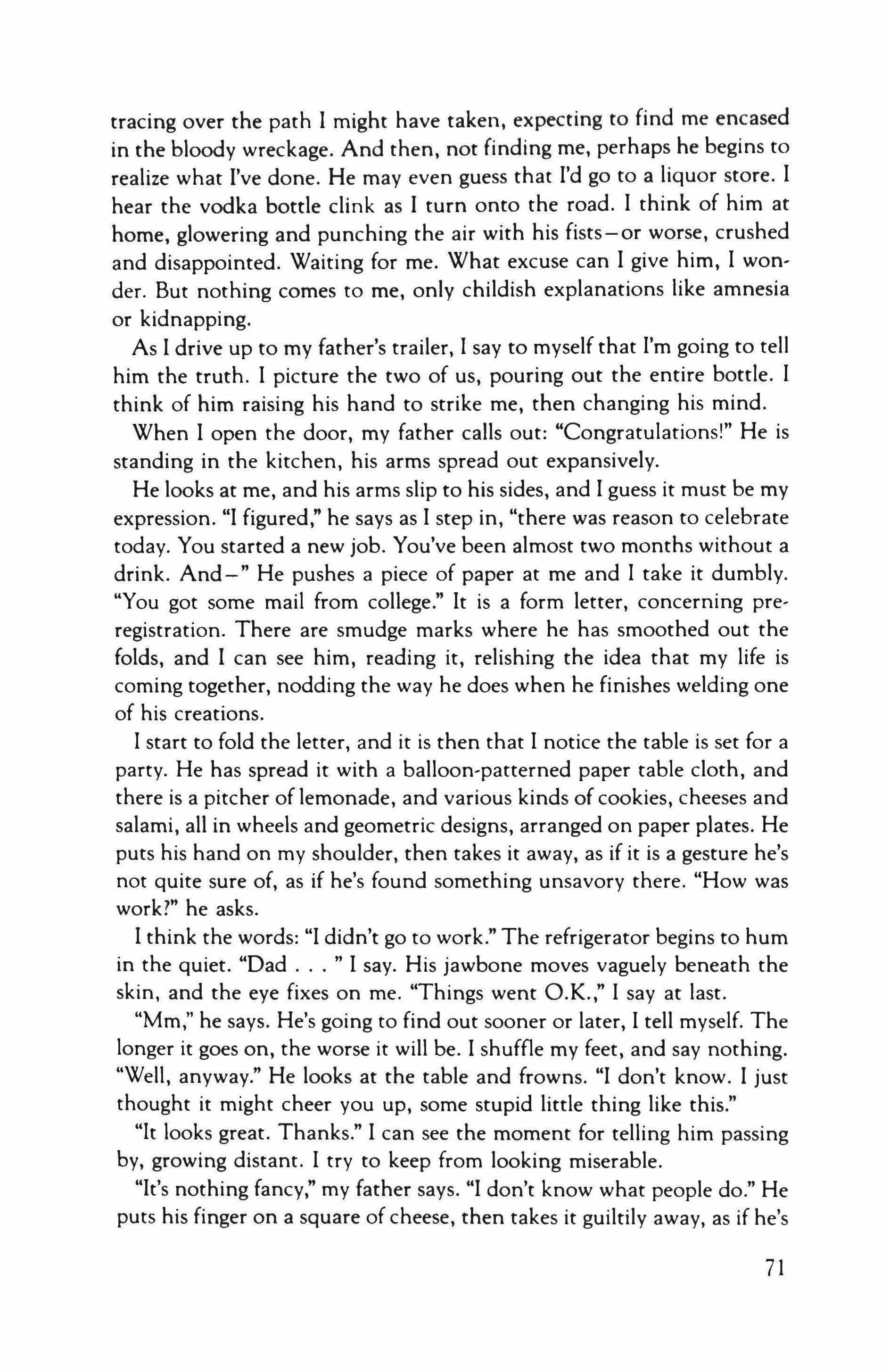
tracing over the path 1 might have taken, expecting to find me encased in the bloody wreckage. And then, not finding me, perhaps he begins to realize what I've done. He may even guess that I'd go to a liquor store. 1 hear the vodka bottle clink as 1 turn onto the road. 1 think of him at home, glowering and punching the air with his fists-or worse, crushed and disappointed. Waiting for me. What excuse can 1 give him, 1 wonder. But nothing comes to me, only childish explanations like amnesia or kidnapping.
As 1 drive up to my father's trailer, 1 say to myself that I'm going to tell him the truth. 1 picture the two of us, pouring out the entire bottle. 1 think of him raising his hand to strike me, then changing his mind. When 1 open the door, my father calls out: "Congratulations!" He is standing in the kitchen, his arms spread out expansively.
He looks at me, and his arms slip to his sides, and 1 guess it must be my expression. "I figured," he says as 1 step in, "there was reason to celebrate today. You started a new job. You've been almost two months without a drink. And-" He pushes a piece of paper at me and 1 take it dumbly. "You got some mail from college." It is a form letter, concerning preregistration. There are smudge marks where he has smoothed out the folds, and 1 can see him, reading it, relishing the idea that my life is coming together, nodding the way he does when he finishes welding one of his creations.
1 start to fold the letter, and it is then that 1 notice the table is set for a party. He has spread it with a balloon-patterned paper table cloth, and there is a pitcher of lemonade, and various kinds of cookies, cheeses and salami, all in wheels and geometric designs, arranged on paper plates. He puts his hand on my shoulder, then takes it away, as if it is a gesture he's not quite sure of, as if he's found something unsavory there. "How was work?" he asks.
1 think the words: "1 didn't go to work." The refrigerator begins to hum in the quiet. "Dad 1 say. His jawbone moves vaguely beneath the skin, and the eye fixes on me. "Things went O.K.," I say at last.
"Mm," he says. He's going to find out sooner or later, 1 tell myself. The longer it goes on, the worse it will be. 1 shuffle my feet, and say nothing. "Well, anyway." He looks at the table and frowns. "I don't know. 1 just thought it might cheer you up, some stupid little thing like this."
"It looks great. Thanks." 1 can see the moment for telling him passing by, growing distant. 1 try to keep from looking miserable.
"It's nothing fancy," my father says. "1 don't know what people do." He puts his finger on a square of cheese, then takes it guiltily away, as if he's
71
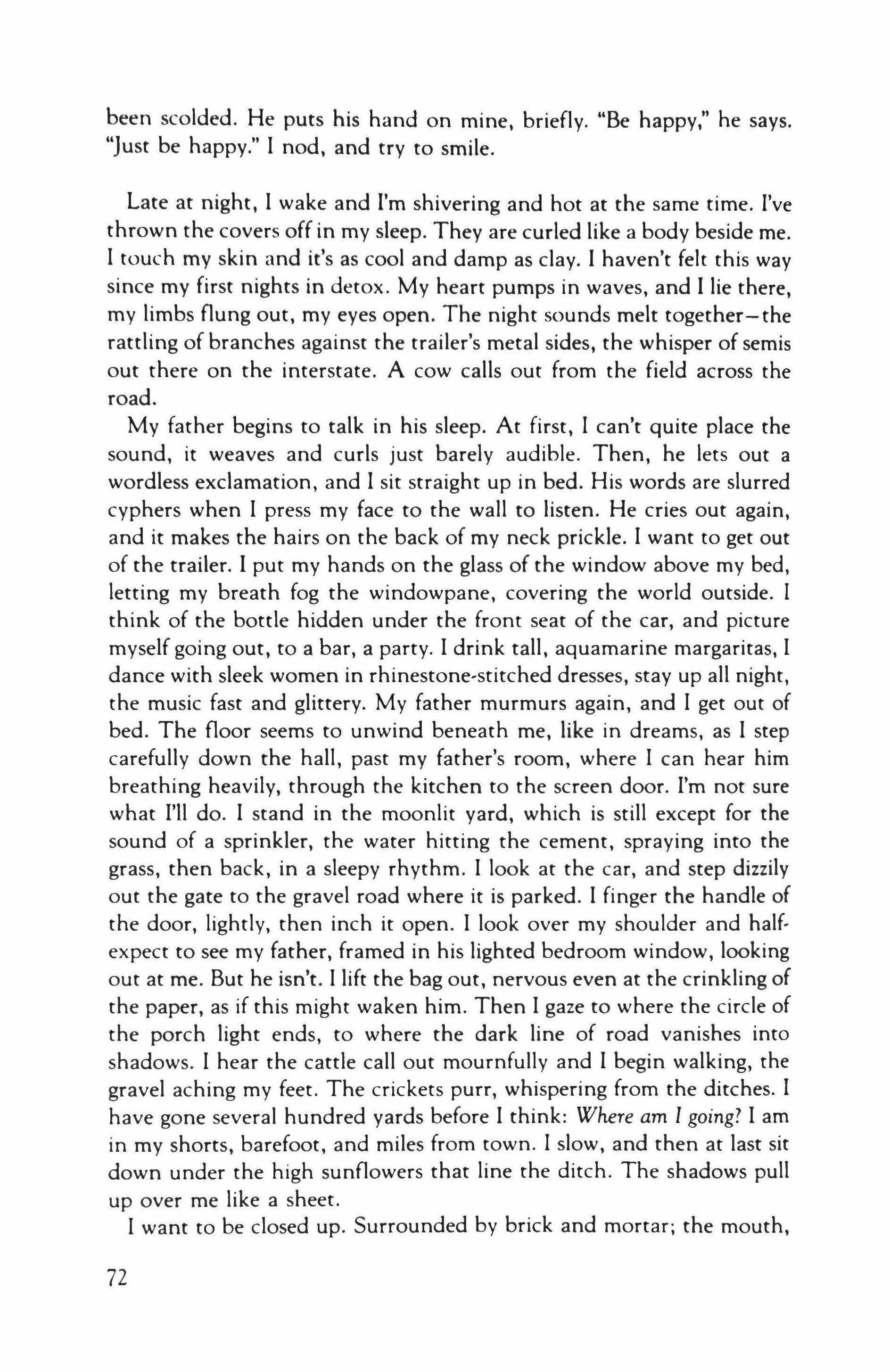
been scolded. He puts his hand on mine, briefly. "Be happy," he says. "Just be happy." I nod, and try to smile.
Late at night, I wake and I'm shivering and hot at the same time. I've thrown the covers off in my sleep. They are curled like a body beside me. I touch my skin and it's as cool and damp as clay. I haven't felt this way since my first nights in detox. My heart pumps in waves, and I lie there, my limbs flung out, my eyes open. The night sounds melt together-the rattling of branches against the trailer's metal sides, the whisper of semis out there on the interstate. A cow calls out from the field across the road.
My father begins to talk in his sleep. At first, I can't quite place the sound, it weaves and curls just barely audible. Then, he lets out a wordless exclamation, and I sit straight up in bed. His words are slurred cyphers when I press my face to the wall to listen. He cries out again, and it makes the hairs on the back of my neck prickle. I want to get out of the trailer. I put my hands on the glass of the window above my bed, letting my breath fog the windowpane, covering the world outside. I think of the bottle hidden under the front seat of the car, and picture myself going out, to a bar, a party. I drink tall, aquamarine margaritas, I dance with sleek women in rhinestone-stitched dresses, stay up all night, the music fast and glittery. My father murmurs again, and I get out of bed. The floor seems to unwind beneath me, like in dreams, as I step carefully down the hall, past my father's room, where I can hear him breathing heavily, through the kitchen to the screen door. I'm not sure what I'll do. I stand in the moonlit yard, which is still except for the sound of a sprinkler, the water hitting the cement, spraying into the grass, then back, in a sleepy rhythm. I look at the car, and step dizzily out the gate to the gravel road where it is parked. I finger the handle of the door, lightly, then inch it open. I look over my shoulder and halfexpect to see my father, framed in his lighted bedroom window, looking out at me. But he isn't. I lift the bag out, nervous even at the crinkling of the paper, as if this might waken him. Then I gaze to where the circle of the porch light ends, to where the dark line of road vanishes into shadows. I hear the cattle call out mournfully and I begin walking, the gravel aching my feet. The crickets purr, whispering from the ditches. I have gone several hundred yards before I think: Where am I going? I am in my shorts, barefoot, and miles from town. I slow, and then at last sit down under the high sunflowers that line the ditch. The shadows pull up over me like a sheet. I want to be closed up. Surrounded by brick and mortar; the mouth,
72

the ears, the eyes, stuffed with sawdust. I lie back and it is then, through the stems of weeds and sunflowers, that I see a bone-white face, bobbing in the dark, floating there, gazing with hollow eyes. I make a low sound in my throat, and the face nods expectantly. I scramble in the weeds. Then I realize that it's a cow. The cattle, having noticed me, have come to the edge of the fence. I hear one low curiously, then snuffle. They're hungry. Kneeling there in the wet grass, I clutch the paper bag in my hand, and they press closer to the fence. The cattle raise their voices again, in a deep chorus, and I can feel my hands shaking. I sink down. Everything seems to press toward me, and I'm submerging, until the dim porch light and the trailer and even the pale masks of the cattle recede, like the wobbling figures a drowning person sees above the surface.
73
Taco Mask
Steve Fisher

There was trade off the alley, and the cars moved slowly in the street, inching into the all-night market. It was a short little utility street in downtown Phoenix that dead-ended about fifty yards from the DOG run in Alhambra, which was the main classification prison in the state, the one everybody was sent to once they finally picked up their time from the judge. It was about midnight, on a Sunday in July, and Willie watched them from his upper bunk, mostly as a distraction from the ten others in his cell. The five years he had received for "attempted possession of narcotics" was nothing to think about, except in legal terms, which he would do once he was moved to a camp, so he rather drifted away from the stories for a while, rolled Republic institutional, watching his fingertips stain yellow as he smoked. Through the grating and scratched glass he saw the people drink freely from their bottles and cans. Oh yeah? he thought passively. Well, somebodv's certain. But it was more than a simple street party, he was beginning to realize, and started feeling the weight off the road as if it were a movie he was in. He could tell what was going on. It came easy, and to most city people before any first fix. Floyd, on the other side of the walls, also knew as much. He was a matter of transaction, balking at the gauntlet which Willie laid idly into his dome
Even though the temperature was still around 100 degrees out, the only ones who seemed to be nervous or sweating were those who hadn't yet scored: heroin, mainly; that black Mexican chit/a. The lot was crawling with it, this lone Circle K, and Floyd knew he'd have to make the trip down there soon: his heart beat hard and wild to one side, above his weight, as his central impulses skittered upon wires of flesh. His head felt
74
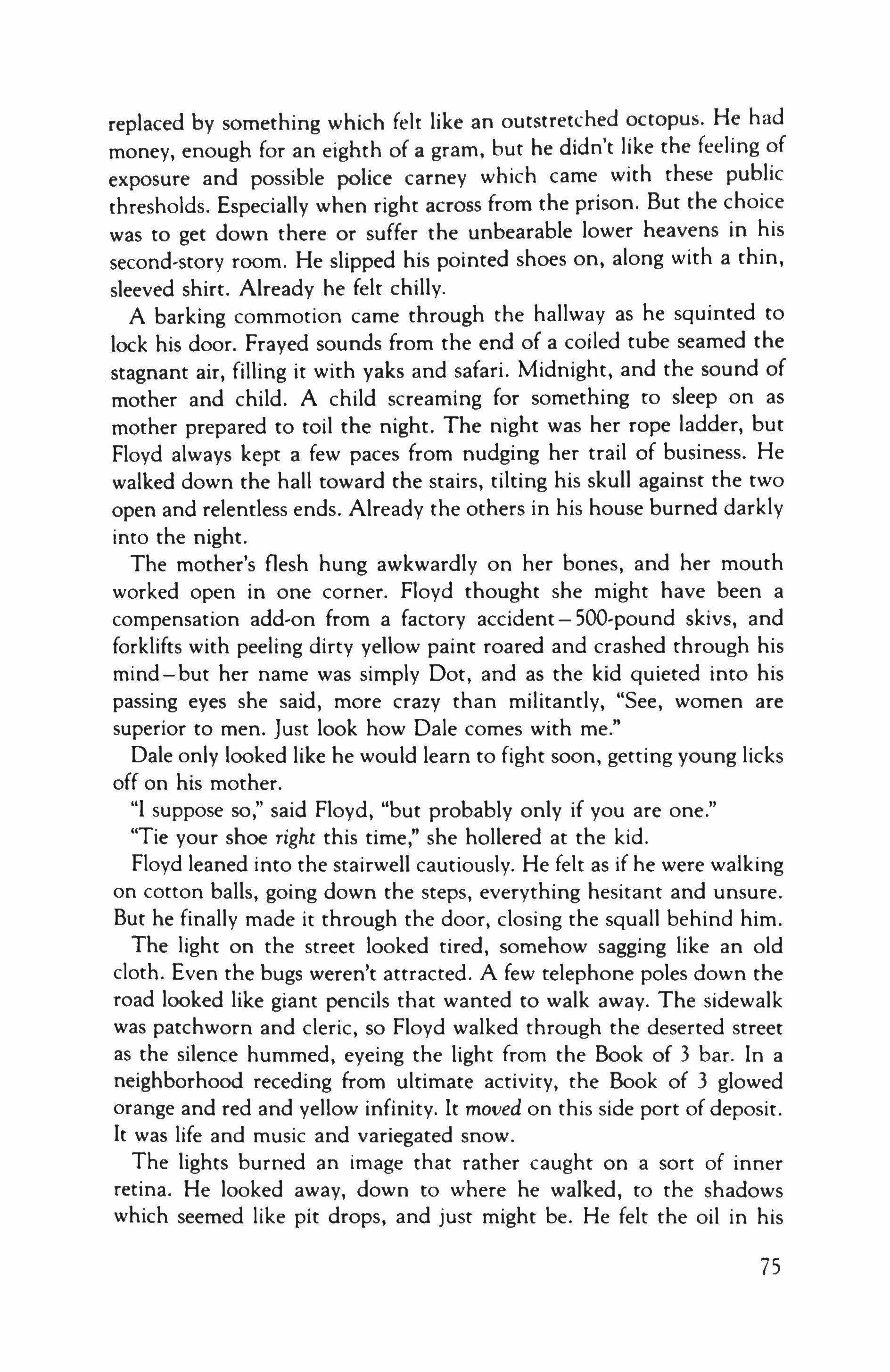
replaced by something which felt like an outstretched octopus. He had money, enough for an eighth of a gram, but he didn't like the feeling of exposure and possible police carney which came with these public thresholds. Especially when right across from the prison. But the choice was to get down there or suffer the unbearable lower heavens in his second-story room. He slipped his pointed shoes on, along with a thin, sleeved shirt. Already he felt chilly.
A barking commotion came through the hallway as he squinted to lock his door. Frayed sounds from the end of a coiled tube seamed the stagnant air, filling it with yaks and safari. Midnight, and the sound of mother and child. A child screaming for something to sleep on as mother prepared to toil the night. The night was her rope ladder, but Floyd always kept a few paces from nudging her trail of business. He walked down the hall toward the stairs, tilting his skull against the two open and relentless ends. Already the others in his house burned darkly into the night.
The mother's flesh hung awkwardly on her bones, and her mouth worked open in one corner. Floyd thought she might have been a compensation add-on from a factory accident - 500-pound skivs, and forklifts with peeling dirty yellow paint roared and crashed through his mind-but her name was simply Dot, and as the kid quieted into his passing eyes she said, more crazy than militantly, "See, women are superior to men. Just look how Dale comes with me."
Dale only looked like he would learn to fight soon, getting young licks off on his mother.
"I suppose so," said Floyd, "but probably only if you are one."
"Tie your shoe right this time," she hollered at the kid.
Floyd leaned into the stairwell cautiously. He felt as if he were walking on cotton balls, going down the steps, everything hesitant and unsure. But he finally made it through the door, closing the squall behind him.
The light on the street looked tired, somehow sagging like an old cloth. Even the bugs weren't attracted. A few telephone poles down the road looked like giant pencils that wanted to walk away. The sidewalk was patchworn and cleric, so Floyd walked through the deserted street as the silence hummed, eyeing the light from the Book of 3 bar. In a neighborhood receding from ultimate activity, the Book of 3 glowed orange and red and yellow infinity. It moved on this side port of deposit. It was life and music and variegated snow.
The lights burned an image that rather caught on a sort of inner retina. He looked away, down to where he walked, to the shadows which seemed like pit drops, and just might be. He felt the oil in his
75

short, thin hair, then slowly ran a hand up his forearm as his head sprinkled coolly with impulses. He clipped along, anxious of pulse, his lungs full of batter. It had been a long twelve hours since his last shot, but he was only a few thankful minutes from the K.
And it was a sudden sight, a gloss, welcomed with a cold length. The people mingled in huddles for a while, then broke into packs and teamed with the night. Ten or twelve groups formed continuously, while the drunk and aimless circled with laughter, snorting lines from cutboards they brought in. Around the hem of the lot stood party fragments: pocked faces and broken teeth in gravel-coated neon, lightly stepping to the movement of rap. which apparently was a thrust downward, starting with the chin. Glass and rags ringed the area, along with a stinking pile of oily parts that terraced a section to their deep side, just next to a three-story building which crumbled on the adjacent plot. They were robbers, boosters, hold-up and quick-scarnrning men, women, working the variable con. With dealers, dope fiends, half-heads and 3-for-l markdowns of one total fashion: physical futures who hustled an advantage, checking into the Kingdom while the wind laid low. A rather beachfront Christian even wove through the mob, speaking of sin, of redemption, of conversion to hysterics. And all but the beachfront were quick to react with one single opinion: the jobs they were working were temporary. They were simply part of a well-planned national statistic, prospering tonight through low-negotiation.
Floyd was at the edge of his skin, working his way through the crowd. He looked around until he saw an obvious contact, a tall black guy in a dark red T-shirt, taking money from a shorter, black woman, her skin an orange underdress. Floyd was white. It made no difference. What did make a difference was the looming prison across the street, and the cringing flow of open dealing. And the Phoenix police, with tactics that frequently overlooked the laws they were supposed to enforce. This wasn't New York, and it just seemed preposterous to do business this way, to be set in such shallow margins with no outs. He thought a demented cartoonist could probably draw it and get the caption right. But it made him tighten and wince, thinking next time Bermudez, his main source, was going on a Tucson run, he'd cover his ass and avoid it all. Maybe even clean out a bit, if necessary and possible, but most likely just stockpile, or shoot low.
As he walked up the man turned slightly, as if expecting him.
"You lookin' to get high, my man?"
"Tar," said Floyd, "I need a piece of Tootsie Roll."
"How much you need?"
76

"Can you do an eight-ball?"
"Whatever you want," he said, handing Floyd the dope and eyeing him.
Floyd peeled the foil off, looked at it, then felt for thickness in the cellophane. It felt something like two matches, pressed together, and almost as long. It was black and shined like glass. He put it under his nose and breathed slowly, slowly through the corkboard and mucus, and picked up a light floral opium. Yes, he thought, this would do fine, and right off the street. If I have to do junk now, at least I'm close enough to Sonora to get good stuff.
"How much?" he asked. The price was almost always sixty bucks on the street. But it would get him through the night, and open his eyes in the morning.
"Sixty," said the dealer. "You want it?"
"You have some clean works? With sealed caps?"
"I got some new ones. Only been used once."
"No way," he said. "AIDS. I can give you fifty-five."
"It's sixty, and you can bleach the 'fit."
Floyd tried a quick response, lost, paid the sixty and stuck the dope in his change pocket. His eye caught the enamel sheen of the Circle K, and he noticed business being conducted through a small window. The whole of it glared like a paste-up to him, like something artificial taught in kindergarten with a pointer stick: an illuminated cutout on a black easel. It made him sick to think about it, and he wanted to split, but as he moved in that direction there stood the street Jesus, book open, Bible lame. A thick, puffy, five-inch scar that ran down one side of his skull, lit like a pig's pink ass, told Floyd this guy would be dangerous with intent. The Jesus stepped just a hair to the right, locking into Floyd's path. Goddamn, he thought, now this fucker's gonna try and mat me with a prayer.
"God WILL redeem you, brother! Open your soul to Jesus now and HE WILL HAVE YOU!"
"LORD, NO!" said Floyd, and a number of horns began honking as if they were pipe-neck birds. Screams and yelling; the flash of lights and the heavy musk of exhaust flagging over. A lone, brute-piercing wail of womanhood, followed with a masculine "YOU'LL FIND THAT GAP BETWEEN YOUR TEETH PACKED WITH DIRT!" and then a window being smashed in a car. People looked over, moving, to see if there was something to get in on. That's simply the way it worked. Floyd felt his gut flush hollow with nerves, and saw the $ sign from an oldfashioned cash register as he looked out of reflex.
77

"AND YOU AIN'T NEVER TO COME BACK! NEVER TO COME BACK BUT TO SOME OTHER DAMN FOOLl"
"STOP IT!" she yelled. "LEAVE OFF THIS MINUTE 'Fa YO' FACE FILL WITH GLASS!!!"
The tires screamed rubber but the car merely bobbled. You could hear fists pounding on the roof, strong hands, before it finally caught pavement and sped off. It was amazing there wasn't an accident. But Floyd wasn't thinking about that. The streak that bore through him would have said: I know too well what's happening down here. It's rough enough just answering the phone, without having to circulate and watch people do it.
"Now, there's a couple who make sense."
It was Blossom, a sort of ex-hippie who had drifted around for years, not wanting anything, not needing very much, who landed in Phoenix when he found how difficult it was to simply live as himself without the common American ornaments. He still wore tie-dyes and lived light, hitting the streets as a matter of course. Floyd knew him from somewhere: maybe his friend Risa, the pouchmaker? They stood together, watching the high-fives, elbow butts and so forth at curbside, but Floyd only wanted to get going. His head was like a can of pineapple rings that were separating.
"What happened to your thing about love?" Floyd asked, but he could barely think straight, much less put himself, or others, into workable terms.
"That might have been an example of it," said Blossom. He then added, "I'm starting to open up a little more."
"I'm starting to open up as well," said Floyd. "I'm getting the hell out of here."
He didn't really even look at Blossom. His eyes just darted around, fixing abstract forms into a loose mold of darkness.
"I'm on my way to the B-3," said Blossom, as they both began moving off. "I've got to meet Holly. Have a beer or something with us. She may have some dilaudid."
"All right," said Floyd, stepping around a shank, evil-looking bastard, fairly dreading the Book of 3 at this point, but thinking of Holly and the dilaudid. He didn't like the idea of slamming junk in the 8-3 head, but like all addicts he couldn't refuse a free fix - if Holly had it. But it had worked out before with her, so Floyd was attracted to the lure.
"You got a smoke?" asked Blossom.
He pulled out a couple of Camel filters and gave one to Blossom. His lips were dry; wrinkled like cigarette paper. When he lit up and inhaled,
78
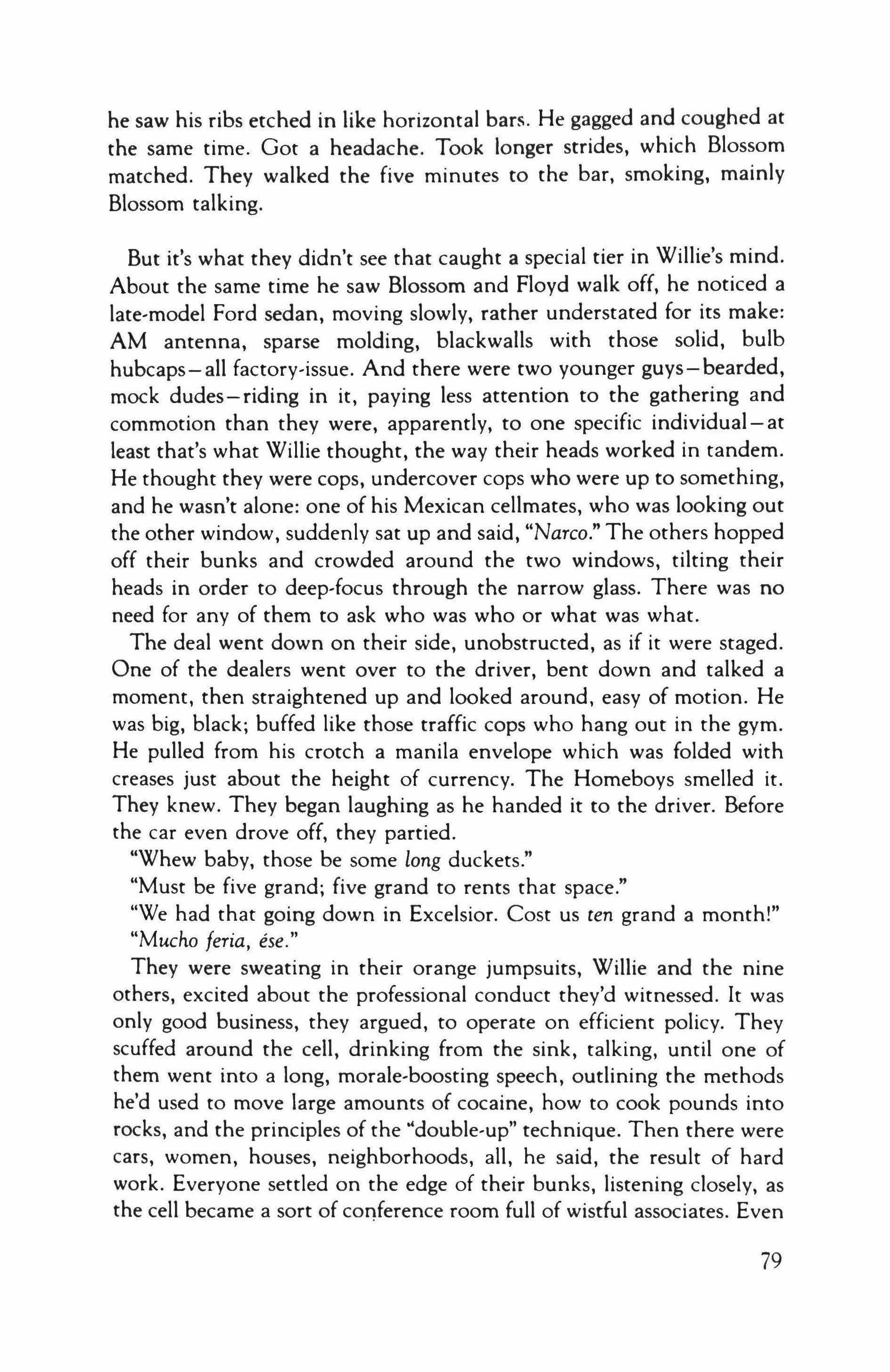
he saw his ribs etched in like horizontal bars. He gagged and coughed at the same time. Got a headache. Took longer strides, which Blossom matched. They walked the five minutes to the bar, smoking, mainly Blossom talking.
But it's what they didn't see that caught a special tier in Willie's mind. About the same time he saw Blossom and Floyd walk off, he noticed a late-model Ford sedan, moving slowly, rather understated for its make: AM antenna, sparse molding, blackwalls with those solid, bulb hubcaps-all factory-issue. And there were two younger guys-bearded, mock dudes-riding in it, paying less attention to the gathering and commotion than they were, apparently, to one specific individual-at least that's what Willie thought, the way their heads worked in tandem. He thought they were cops, undercover cops who were up to something, and he wasn't alone: one of his Mexican cellmates, who was looking out the other window, suddenly sat up and said, "Narco." The others hopped off their bunks and crowded around the two windows, tilting their heads in order to deep-focus through the narrow glass. There was no need for any of them to ask who was who or what was what.
The deal went down on their side, unobstructed, as if it were staged. One of the dealers went over to the driver, bent down and talked a moment, then straightened up and looked around, easy of motion. He was big, black; buffed like those traffic cops who hang out in the gym. He pulled from his crotch a manila envelope which was folded with creases just about the height of currency. The Homeboys smelled it. They knew. They began laughing as he handed it to the driver. Before the car even drove off, they partied.
"Whew baby, those be some long duckers."
"Must be five grand; five grand to rents that space."
"We had that going down in Excelsior. Cost us ten grand a month!"
"Mucho feria, ese,"
They were sweating in their orange jumpsuits, Willie and the nine others, excited about the professional conduct they'd witnessed. It was only good business, they argued, to operate on efficient policy. They scuffed around the cell, drinking from the sink, talking, until one of them went into a long, morale-boosting speech, outlining the methods he'd used to move large amounts of cocaine, how to cook pounds into rocks, and the principles of the "double-up" technique. Then there were cars, women, houses, neighborhoods, all, he said, the result of hard work. Everyone settled on the edge of their bunks, listening closely, as the cell became a sort of conference room full of wistful associates. Even
79

a few street cigarettes - tailors, they were called - were lit up and passed around. Willie listened along, glancing from the window to laugh, going with the flow of energy-which was a sort of bulkhead release, but not really too bad. It was a needed lift for all: a respite from the smell, the overhead asbestos, the dull swampy lighting and initial prison uncertainties. They kicked it like that, as individuals rather than slateboard, burning the reserve from the filament in their bones. Just what the hell is the rest of America, in the middle of a Sunday night? thought Willie.
Right away there was further contraction. Not that the bar was particularly hostile or restricting - it was about as open as bars get, for that matter- it was simply Floyd's reaction while horribly sick to a confined space of public gathering. His shirt was touched with sweat. His eyes were bloodshot, hanging from veins like fried eggs in their sockets. His sense of balance modulated, refusing to focus or center. And, worst of all, he thought that everybody knew what the problem was and would somehow turn it against him-right then, before he could do anything about it. Then he told himself that they all probably came in sick-sick, hung-over, trembling and limb-taut from alcohol poisoning. It didn't help much, since it was hardly a matter of psyching up, but it gave him something to play with while Blossom found Holly, while he made it to the bathroom without spilling into the waitress and customers. He was somewhat surprised to make it. Groaning into those peaks of drunken noise, he thought, had really helped to do the trick.
But they only had a small restroom, and the door was locked. He stood under a very yellow bulb which lit up the storage hall he waited in, listening to more than watching a game of pool just in front of him. God, those balls cracked so loud he thought a fan was blowing out his ear, whipping the sound through his head like that. The jukebox sang, the old oak register tallied and the ice machine dropped a load. Madness madness who's this fucker in the head? His works and the rest of this kit itched in his sock. When the door finally opened and the fucker stepped out, walking away, he felt a great sense of relief in the overall downbearing upon him.
He got in and worked quickly, running the water and spreading his things out. There was a short ledge behind him, which he laid his spoon and syringe on. The place was small, but he finally had a sense of being alone. It was a good feeling, and it worked with the anticipation he had when he pulled out the chitJa. He smelled it again, then cut it in half, pressed it into the spoon and yanked. There was a soap dispenser. He washed up good, got the point, then palmed a handful of water. He drew
80

the water up and eased it into the spoon. When he got it into the plunger, he pushed the commode door open and sat on the john. He heard the jukebox bass beating into the stall like a wrecking ball against the hull of an ocean liner.
He put it in a vein on the side of his wrist, booting it once. His eyes staggered, then warmed up and closed gently. Windows opened all around him, in him, to pastoral pockets of space. He saw it bleaching his body-coloring-like tracer fluid through an illuminated man. He felt his toes, his kneecaps, his shoulder blades. He moved his arm and felt his shirt touch lightly. His thoughts returned to steady cadence, blessedly ethereal as they were at the moment. He began to feel whole, reconnected, and totally on top of his game. He wanted to laugh at the insanity of circumstances, but he simply smiled and rubbed his nose. One hell of a life, he'd often thought, and he was glad at the moment to be part of it. If he stopped to consider the scheme of things, what was coming besides the next shot, he wouldn't have felt too bad because he could only be in one spot with one brain, thinking. That usually worked the magic for him, when given an opening. What a fine place earth could be, if you only went with the spin of the throw! Even in the men's crapper of a neighborhood bar.
He rinsed his works out and packed up, listening through the wall and the air vent to Stevie Nicks. She reached into him, touching points of his body that were beyond explanation, never sounding better. Oh yeah, he thought, bending in half to shake his hair out like a wet dog. Then somebody began pulling and knocking on the door. Before he opened it and went out, he paused to feel himself, all in one piece, directly in line with the spheres.
Blossom was with Holly, at a small booth away from the door. A picture of Boojum Shorty and a saguaro growing out of the dust were painted on the wall behind them. A hanging lamp made from cactus ribs hung above the table, barely lighting up Holly's girlish, freckled face. Ah, she looks sweet, thought Floyd-how'd she ever become a dope fiend? Their eyes met between dancers and she smiled-good sign, good sign! He flashed a finger to say he'd be right over, then stepped up to the bar for something sweet. He grabbed an open stool at mid-rail, next to an older gutty man with a white whisk-cut. A knickering. There was a bowl of salsa and some chips. The guy motioned to them.
"Eat up, partner. Wha'cha drinking?"
Floyd didn't really want any chips, so he just looked ahead and said, "Ginger ale and milk, with an egg blended in."
81

The old gut was drunk and couldn't understand, and became somewhat incredulous.
"Ginger ale and milk? Play's at first! Play's at first!"
Floyd felt a shorter, second rush flow through. God, how sweetly our earth grows! Why must this be illegal?
Then he said, "Well, my gut's been on the thin side lately. Thought I oughta stoke it, rather than stretch it."
"You're in the honor seat, partner, whar'chu want's on me tonight. This being the anniversary of Sally's departure an' all. Go ahead and have a chip. Say it's great for a bum stove."
Well fuck, thought Floyd, dipping one anyway-"To Sally," he said.
"To Sally!" said the old gut. "Best horse I ever rode, back in my ranching days."
"And now you've retired to bar whiskey?" asked Floyd.
"Naw, I'm just here on a little business."
The salsa was incredibly hot, and Floyd spun around and spit it out. But the fumes bled through his face anyway, fitting him, he thought, like a taco mask. He looked up to see the bartender.
"Bring him a beer," said the gut, "one of your best. Old Milwaukee on draft!"
"That's the best?" asked Floyd.
"Sir, I stand at the front of my race on that. Go ahead-for Sally?
To hell with fantasy, thought Floyd, if it means his train of thought, even though he was slightly amused. He then told the barkeep, "Ginger ale and milk, with a little nutmeg blended in."
hAw shit," said the gut, disgusted because he'd have to drink alone. "Bring me another beer, an'a shota that scotch."
"Coming up, gentlemen," said the bartender, walking off to make them. Floyd pulled out a smoke, feeling calm, feeling the worlds between them and the differences in addictions. He wished neither on anyone, but felt glad he could inject his, rather than sit around the bar like that, drinking it. But he'd also reached the conclusion, from earlier, heavy turns of wine, that drinking only tightened his environment. At least during this stretch, he'd try and leave it alone.
The bartender returned with the drinks, set them down and collected his money. Floyd left a small tip as he got up.
"So you really are gonna drink that?"
"And maybe for breakfast, too."
"Play's at first!" he growled again.
Floyd laughed this time as he crossed the floor, skirting the flare of dancers. He straightened his back and inhaled deeply, his nose free of
82
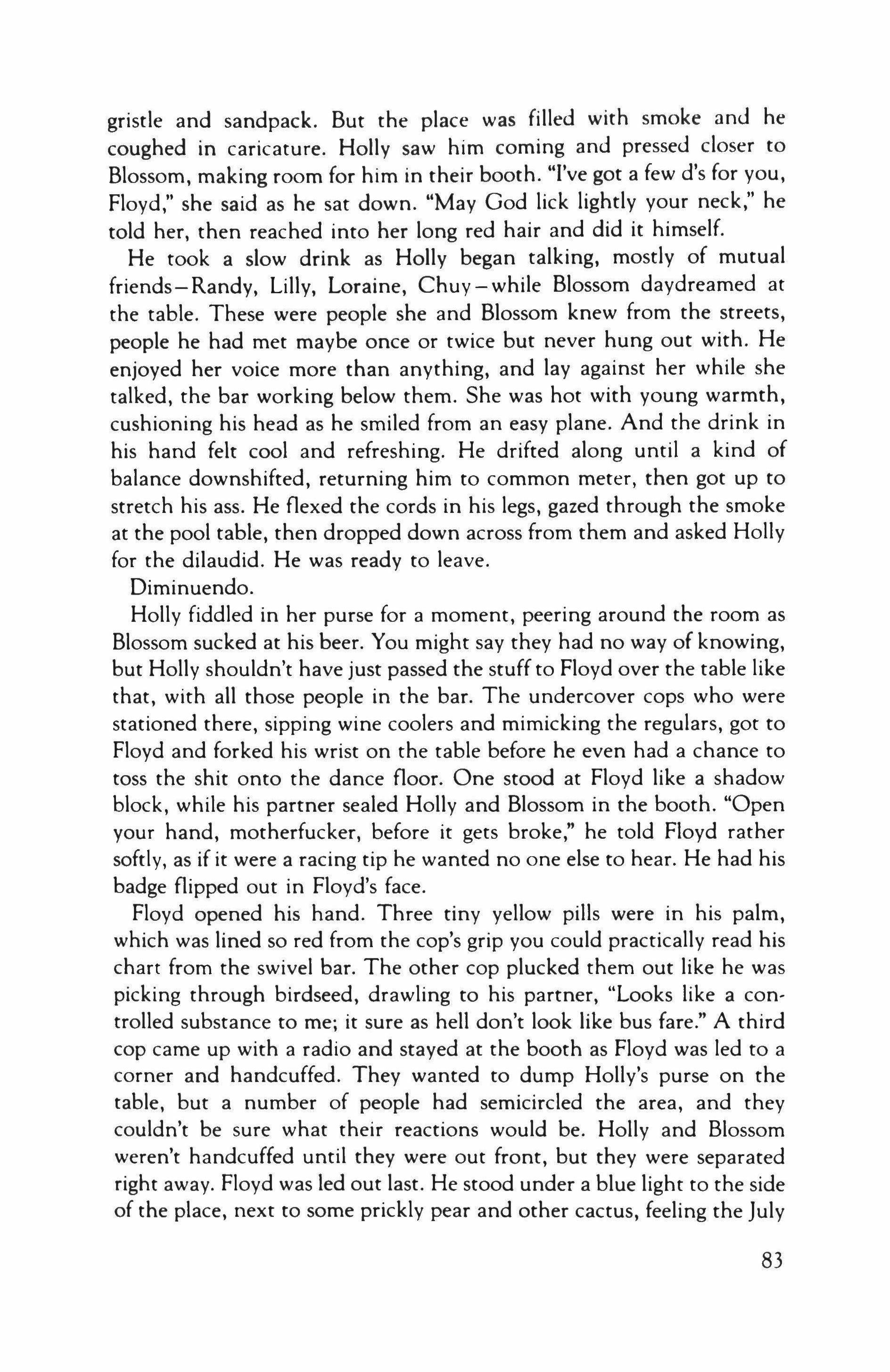
gristle and sandpack. But the place was filled with smoke and he coughed in caricature. Holly saw him coming and pressed closer to Blossom, making room for him in their booth. "I've got a few d's for you, Floyd," she said as he sat down. "May God lick lightly your neck," he told her, then reached into her long red hair and did it himself.
He took a slow drink as Holly began talking, mostly of mutual friends-Randy, Lilly, Loraine, Chuy-while Blossom daydreamed at the table. These were people she and Blossom knew from the streets, people he had met maybe once or twice but never hung out with. He enjoyed her voice more than anything, and lay against her while she talked, the bar working below them. She was hot with young warmth, cushioning his head as he smiled from an easy plane. And the drink in his hand felt cool and refreshing. He drifted along until a kind of balance downshifted, returning him to common meter, then got up to stretch his ass. He flexed the cords in his legs, gazed through the smoke at the pool table, then dropped down across from them and asked Holly for the dilaudid. He was ready to leave.
Diminuendo.
Holly fiddled in her purse for a moment, peering around the room as Blossom sucked at his beer. You might say they had no way of knowing, but Holly shouldn't have just passed the stuff to Floyd over the table like that, with all those people in the bar. The undercover cops who were stationed there, sipping wine coolers and mimicking the regulars, got to Floyd and forked his wrist on the table before he even had a chance to toss the shit onto the dance floor. One stood at Floyd like a shadow block, while his partner sealed Holly and Blossom in the booth. "Open your hand, motherfucker, before it gets broke," he told Floyd rather softly, as if it were a racing tip he wanted no one else to hear. He had his badge flipped out in Floyd's face.
Floyd opened his hand. Three tiny yellow pills were in his palm, which was lined so red from the cop's grip you could practically read his chart from the swivel bar. The other cop plucked them out like he was picking through birdseed, drawling to his partner, "Looks like a controlled substance to me; it sure as hell don't look like bus fare." A third cop came up with a radio and stayed at the booth as Floyd was led to a corner and handcuffed. They wanted to dump Holly's purse on the table, but a number of people had semicircled the area, and they couldn't be sure what their reactions would be. Holly and Blossom weren't handcuffed until they were out front, but they were separated right away. Floyd was led out last. He stood under a blue light to the side of the place, next to some prickly pear and other cactus, feeling the July
83
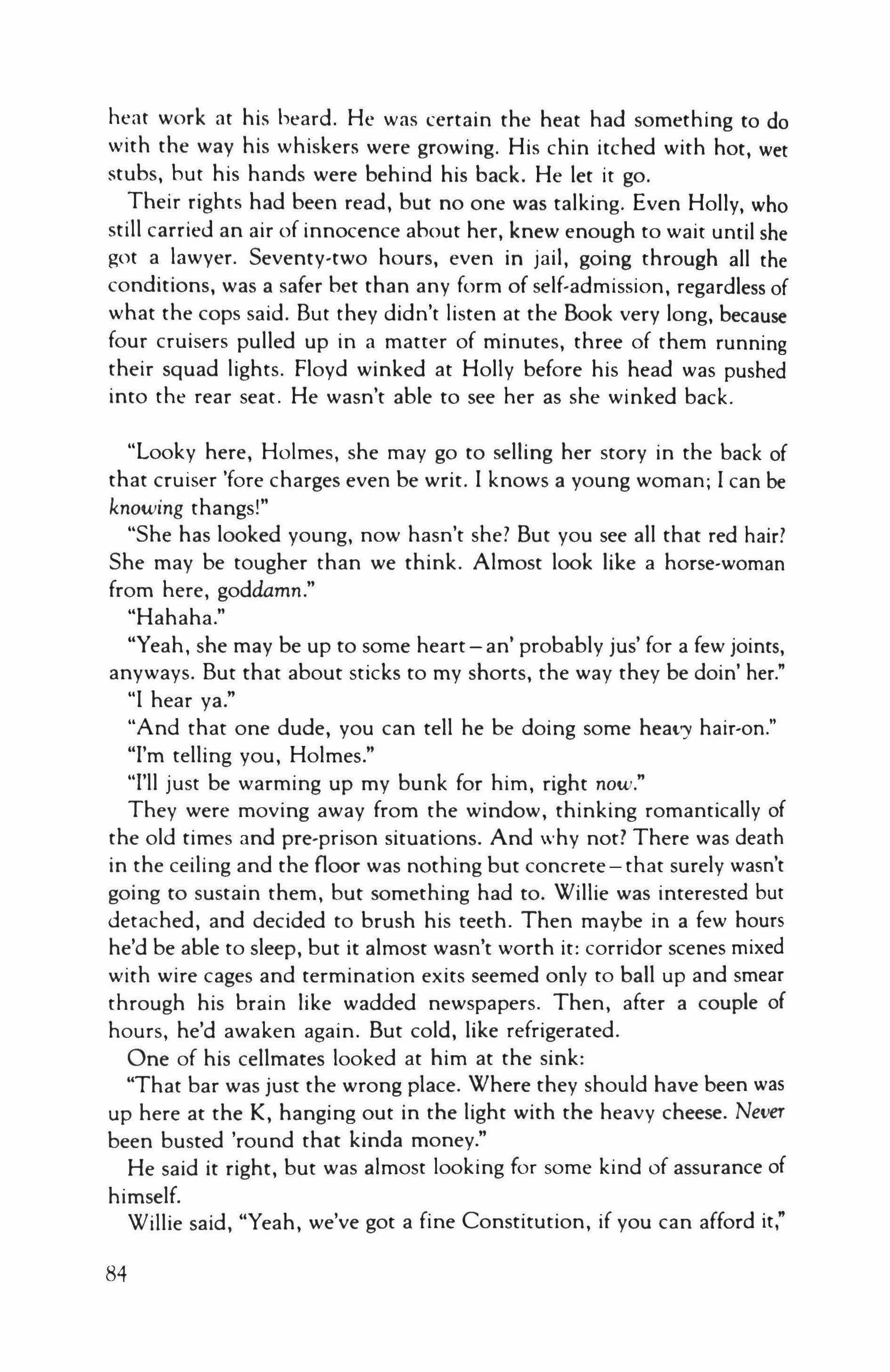
heat work at his heard. He was certain the heat had something to do with the way his whiskers were growing. His chin itched with hot, wet stubs, hut his hands were behind his back. He let it go.
Their rights had been read, but no one was talking. Even Holly, who still carried an air of innocence about her, knew enough to wait until she got a lawyer. Seventy-two hours, even in jail, going through all the conditions, was a safer bet than any form of self-admission, regardless of what the cops said. But they didn't listen at the Book very long, because four cruisers pulled up in a matter of minutes, three of them running their squad lights. Floyd winked at Holly before his head was pushed into the rear seat. He wasn't able to see her as she winked back.
"Lookv here, Holmes, she may go to selling her story in the back of that cruiser 'fore charges even be writ. 1 knows a young woman; 1 can be knowing thangs!"
"She has looked young, now hasn't she? But you see all that red hair? She may be tougher than we think. Almost look like a horse-woman from here, goddamn."
"Hahaha,"
"Yeah, she may be up to some heart-an' probably jus' for a few joints, anyways. But that about sticks to my shorts, the way they be doin' her."
"I hear ya."
"And that one dude, you can tell he be doing some heavy hair-on."
"I'm telling you, Holmes."
"I'll just be warming up my bunk for him, right now."
They were moving away from the window, thinking romantically of the old times and pre-prison situations. And why not? There was death in the ceiling and the floor was nothing but concrete - that surely wasn't going to sustain them, but something had to. Willie was interested but detached, and decided to brush his teeth. Then maybe in a few hours he'd be able to sleep, but it almost wasn't worth it: corridor scenes mixed with wire cages and termination exits seemed only to ball up and smear through his brain like wadded newspapers. Then, after a couple of hours, he'd awaken again. But cold, like refrigerated.
One of his cellmates looked at him at the sink:
"That bar was just the wrong place. Where they should have been was up here at the K, hanging out in the light with the heavy cheese. Never been busted 'round that kinda money."
He said it right, but was almost looking for some kind of assurance of himself.
Willie said, "Yeah, we've got a fine Constitution, if you can afford it,"
84

then listened to the laughter as he worked on his teeth. He wasn't going to let them get his teeth as well. "Anybody know what's for breakfast?"
The air went plump for a moment, then noise rolled like normal from down the row. He looked into the mirror by mistake, and squinted at his reflection.
"Tomorrow's country gravy over biscuits," he heard someone say.
85
Four Poems
Rita Dove

The Island Women of Paris
skim from curb to curb like regatta, from Pont Neuf to the Quai de la Rappe in cool negotiation with traffic, each a country to herself transposed to this city by a fluke called "imperial courtesy."
The island women glide past held aloft by a wire running straight to heaven. Who can ignore their ornamental bearing, turbans haughty as parrots, or deft braids carved into airy cages transfixed on their manifest brows?
The island women move through Paris as if they had just finished inventing their destinations. It's better not to get in their way. And better not look an island woman in the eyeunless you like feeling unnecessary.
86
Political
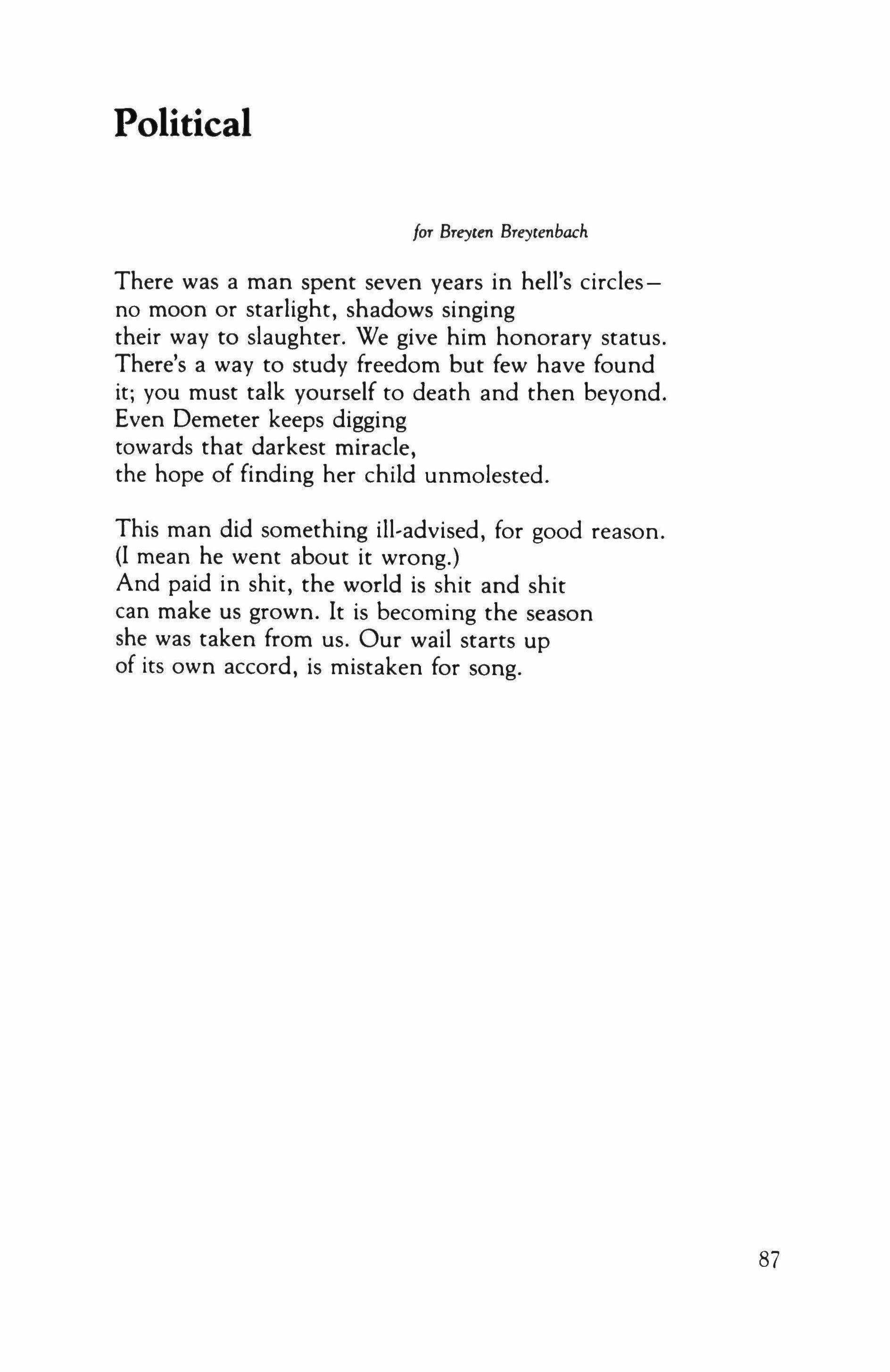 for Breyten Brfycfnbach
for Breyten Brfycfnbach
There was a man spent seven years in hell's circlesno moon or starlight, shadows singing their way to slaughter. We give him honorary status. There's a way to study freedom but few have found it; you must talk yourself to death and then beyond. Even Demeter keeps digging towards that darkest miracle, the hope of finding her child unmolested.
This man did something ill-advised, for good reason. (1 mean he went about it wrong.) And paid in shit, the world is shit and shit can make us grown. It is becoming the season she was taken from us. Our wail starts up of its own accord, is mistaken for song.
87
And Counting

Bellagio. Italy
Well of course I'm not worth it but neither is the Taj Majal for that matter so who's counting? Someone's got to listen to the fountain; someone is due to catch the nymphaea tuberosa closing promptly five till five. Opulence breathes on its own a little better if there's a gardener raking or a scholar primed to record its suscitation. I came here
to write, knock a few poems off the ledger of accounts payable-only to discover pasta put me under just as neatly as sambuca would catapult me into telepathic communication. So I took a few day trips, sprained an ankle on the courts, fell asleep of Catullus-cum-Zukofskv in
short, nothing happened that wasn't unexceptional, but that's the crux of moral implication, is it not?
Mother Mary, ingenue with the golden womb, you would not comprehend how cruel a modern game of tennis is: you only had one phosphorescent ball. Here's a riddle for Our Age: when the sky's the limit, how can you tell you've gone too far?
88
In a Neutral City

Someday we'll talk about the day lily, the puff dandelion aloof on its milky stalk, wild birds defying notation. Someday the last sad trickle in a toilet stall will recall fountains sighing into themselves and ant-freckled stones swept clean with a breath. In rain
over lunch we will search for a topic only to remember a hill, a path hushed in the waxen shade of magnolias. Someday we'll talk because there'll be little else to say: and then the cheese and pears will arrive, and then the worms.
89
Mysterious-Shape Quilt
Top, Anonymous, Oklahoma
Sandra McPherson

Then a shape appeared to her, which she could not slight, so that she repeated it, each time petitioning different colors to carry it, the light load of this bubble with points and turrets, prismatic with surface tension.
It is summer in the heart of the country. No birds resemble this twirled shape. If a fish, it would have to be a fish without a tail or any eye. Yet its outline is like a eat's eye, tipped up like that. The eat's eye floats in a square she stitches onto yesterday's news, THE MARLOW REVIEW, THURS * * * 1944.
A canoeshape floating and turning in the heat. She doesn't even have thread; she has a needle big enough for string. Has string, white, red. The forms are spindle-shaped, bright-banded, full. Short-pointed boat shuttles, bay leaves. She wants to make the shape ninety-six times, in the heat, on her lap.
90

What is it to her? - banded like ellipses she'll never see: shark coprolite, Lunar Dove Snail. Yet, she will see themshe will make them. Shapes for whirling, figures that spin or dive. And on the back of one-
DRESS SHOES, patents, turf tans $2.98 Now is the time to select a gift for the boy in Service and holding together anotherhope that the worms will leave you the lower half of the ear at least and behind one boat-
Rock Island Gasoline car disappointments and behind one eye-
CABLE FROM GEORGE DOUGLAS IDLETT TELLS HE IS WELL IN JAPANESE MILITARY PRISON and behind another eyeThe Victory six jars of pickl and behind one eve-spindle= preaching the and power. He every night,
91

positions. He and sing and behind one sea-snail shapeMrs. Walter Pounds served refreshments and behind one laurel leafthe underground to Lond the Nazi begins to suspect true love, the Commando, is her little Norwegian village and behind another leaf-eye soul-shapethe amazing -dispatches from the world she didn't create.
But the world she fashionedblouse-print sewn against skirt-print like women in a crowded place, a depot, a wedge of wives heading for the gate. Or mothers and babies bumped from planes, a war's priorities.
Like what remains of Sappho, the Marlow Review jumps word to syllable, seeming to speak full. And the reconstructed cloth of the mysterious piecer stretches on the reverse, tells all it can on the wordless, every-colorin-the-book top-side.
92
Nursing Home
Andrew Glaze

Poor Banderlog of mischievous monkeys, adversely creeping down on the gates of hell, hand clasped in hand, they glitter like tortoiseshell. Their murmur of gods is only to lull the young-.
No, fierce of dreams, they are full of scornwant it no more, though stamped with its parts, and therefore they gamble-betting against their hearts.
Watch their shadows dance as lonely as bones in Plato's cave they throw back ragged kisses to what they were, wildly miss- by galaxieslost times misremembered, half-hopes misplaced.
What do you need, we ask. They snicker. We own the gift no more than a star or a fly. Still, they wink us well with one remaining crooked, yellow, amused eye.
93
Mowing
Stuart Dybek

He doesn't mind breathing dust; he knows it's a boy's job to mow. Sun centered on his shirtless back, he shoves even while being lugged along as the squealing blade bites into hummocks and chokes out earth. He's mowing down weeds and cornflowers in an overgrown valley behind a billboard. At three-fiftv an hour, if they want him to devour what small wilderness still sprouts in the open, he will because he's sure they don't remember where one can still find a real snake in this city. They don't recall, if they ever knew, the secret location of the junked back-counrrv boyhood explores, where sanctuaries of jackrabbits and songbirds survive along rusted tracks, and the twittering prairie, in broad view of downtown's hazy range of spires, basks in summer behind bankrupt factories. There, once, down by the Drainage Canal, the blaze of a red fox flashed across his incredulous eyesa fox, like a four-legged fire, trotting the edge of a marsh
94
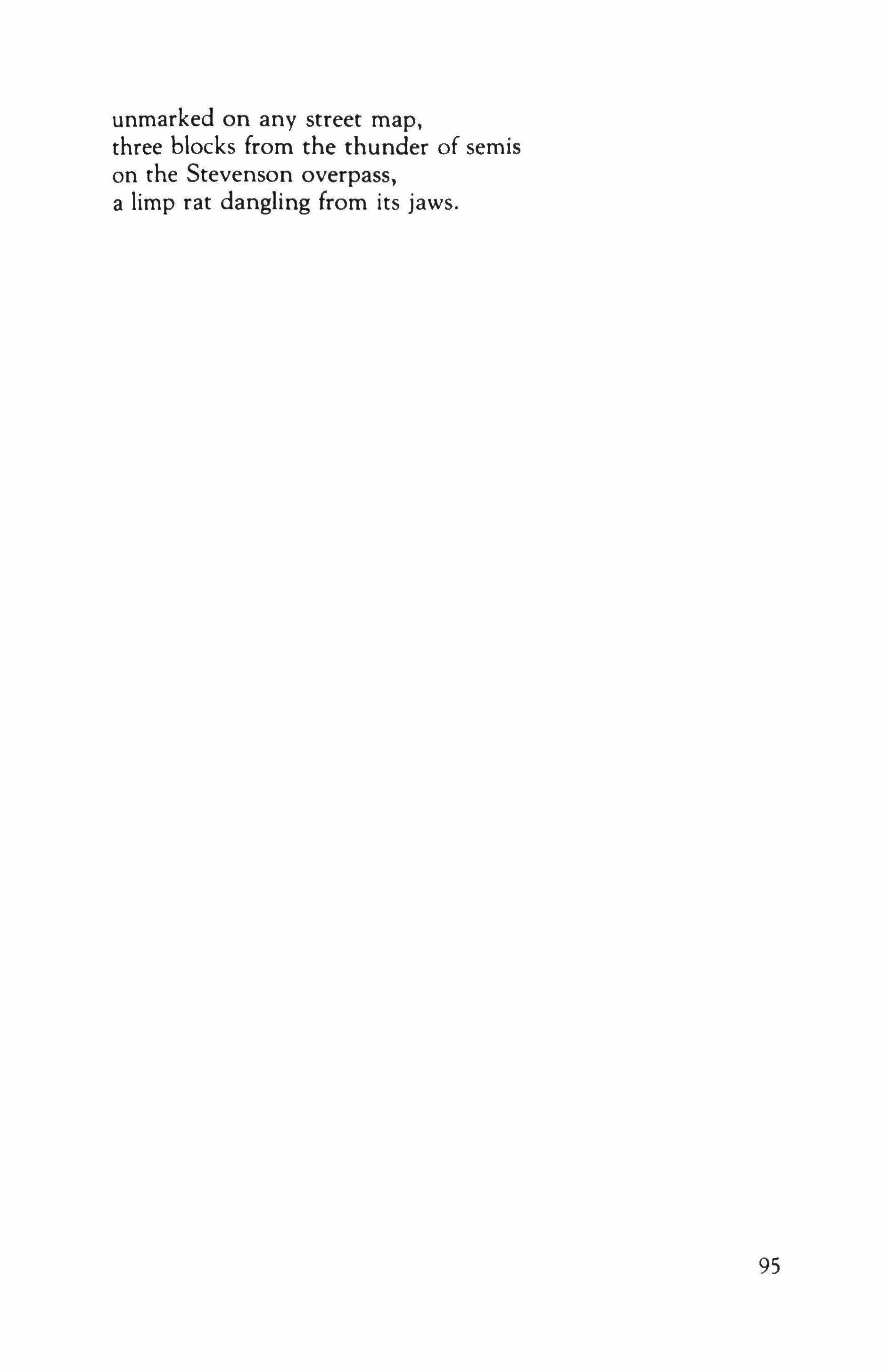
unmarked on any street map, three blocks from the thunder of semis on the Stevenson overpass, a limp rat dangling from its jaws.
95
Your Man
Patricia Smith
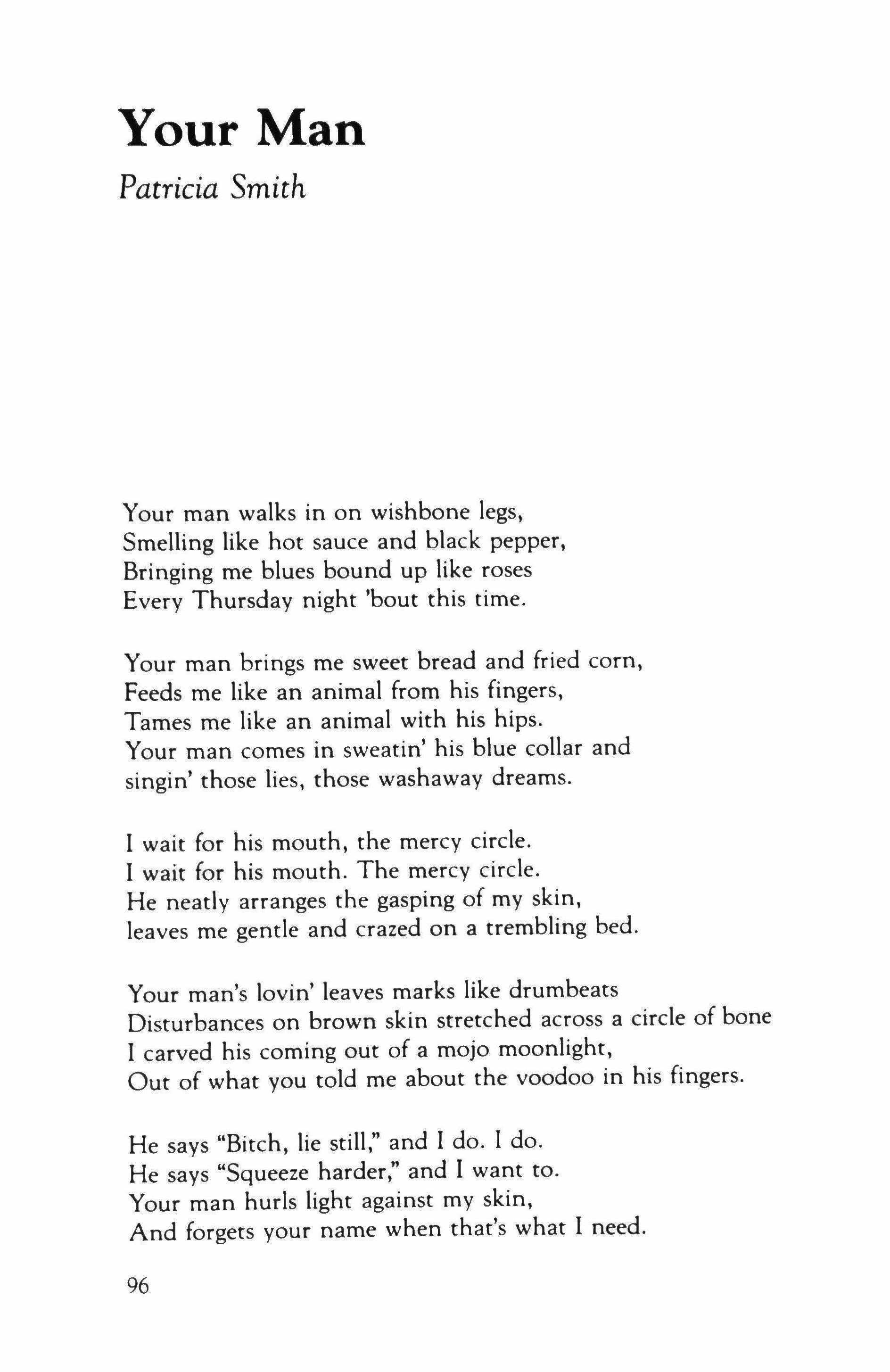
Your man walks in on wishbone legs, Smelling like hot sauce and black pepper, Bringing me blues bound up like roses Every Thursday night 'bout this time.
Your man brings me sweet bread and fried corn, Feeds me like an animal from his fingers, Tames me like an animal with his hips. Your man comes in sweatin' his blue collar and singin' those lies, those washaway dreams.
I wait for his mouth, the mercy circle. I wait for his mouth. The mercy circle. He neatly arranges the gasping of my skin, leaves me gentle and crazed on a trembling bed.
Your man's lovin' leaves marks like drumbeats Disturbances on brown skin stretched across a circle of bone I carved his coming out of a mojo moonlight, Out of what you told me about the voodoo in his fingers.
He says "Bitch, lie stili," and I do. I do. He says "Squeeze harder," and I want to. Your man hurls light against my skin, And forgets your name when that's what I need.
96
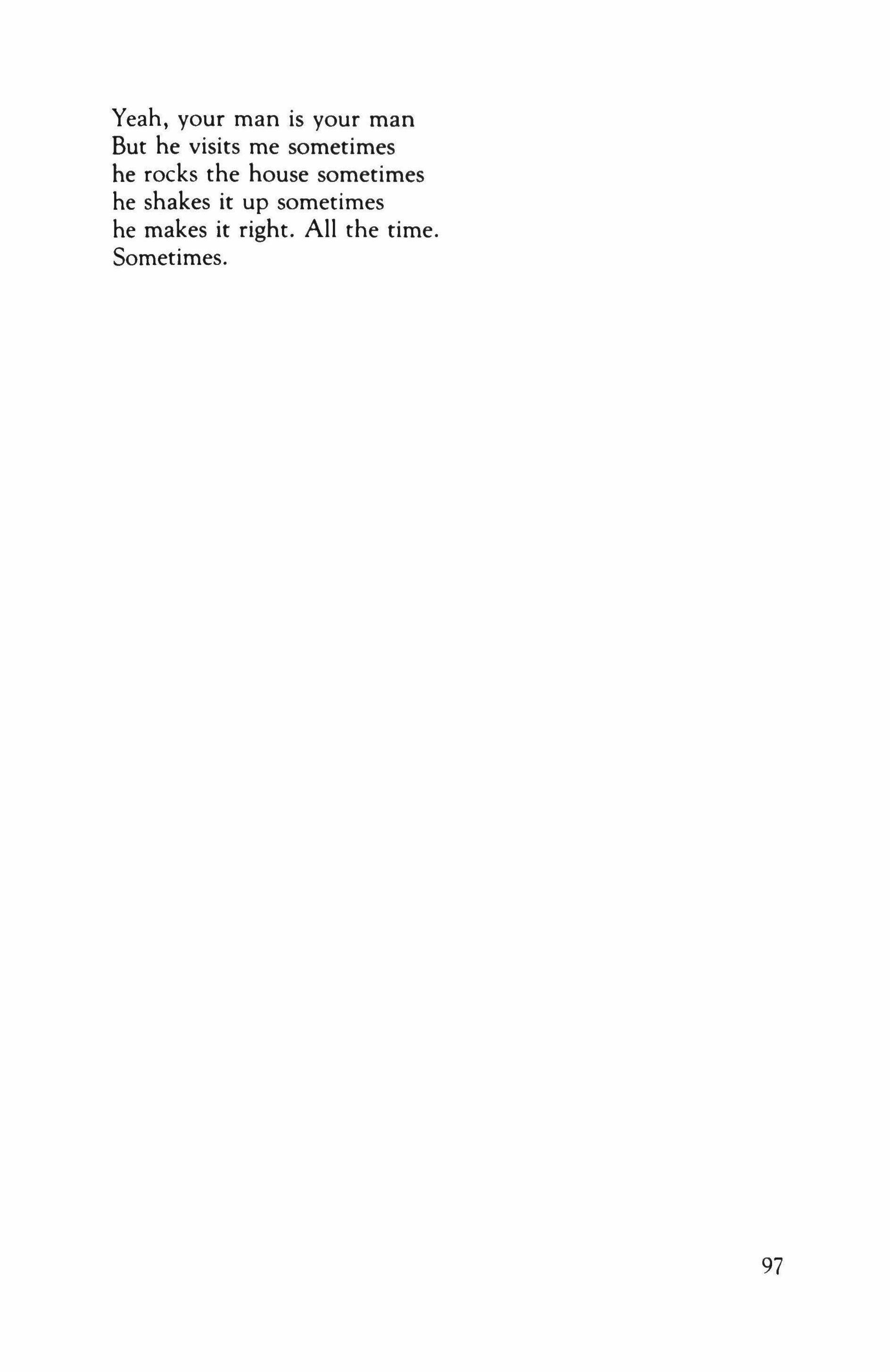
Yeah, your man is your man But he visits me sometimes he rocks the house sometimes he shakes it up sometimes he makes it right. All the time. Sometimes.
97
Post-Larkin Triste
Mary Karr

The day you died a cold New England wind stung the air I breathed, and on the street faces erased themselves as I approached. For several blocks, I shadowed a big round-shouldered man built like a pear, plaid scarf and tweedy overcoat.
SiT, I almost said a hundred times, but he escaped as you escaped:
my one, careful fan letter returned unopened; the night I'd hitched the length of England under thunderheads your window glowed pure rose.
There you stood wiping off a plate, the last romantic, a blade of fire flickering in your eye. I didn't knock or climb your stair. When you carried
your milk bottles to the stoop, you briefly stared my way as if you knew I crouched there in the mud, my vision starry with the sleet,
your old sad music streaming through my head. The stepping through the door,
98

you sank from view, and later from our lives. What might I have said to you?
That you were loved perhaps; that love's a cure. I wanted to hold your large white hands in mine and say I understood until you yielded all your pent-up hurt and wept as you once said you did alone safe in the bubble of your car hearing Wordsworth read on the radio.
Instead, I watched you glower at the night. The cloudy, dread-locked moon reflected in your spectacles was a face I didn't dare to meet, the face of someone
rushing to tell us something terrifying, true.
99
The Children of Mechanics
Joseph Gastiger

The father is in things that have been broken off or wrenched, or lain unused. It is the brake shoe in the sandy road that makes me think of father, and the blackened, heavy tools shiny with grease on the workbench, those jars of bolts and screws on the cellar windowsill. A workboot, flecked with paint along the rails, has made me sad for the father, and the drill bit in the sawdust of the garage, a wheatback penny on a plate beneath the geranium, have made me grieve for him an hour. The crooked wheel rim in the field, the yellow grass beneath its weight, have made me quiet in mid-sentence, have made me catch myself before I went on walking, and turn contrite on the verge of anger, because I hear the inner man swear and turn away, as though he had raised his hand to a child and become ashamed. There is the father in the hospital with magazines and bathrobe for his father, and the father on his back who doesn't know what to say, and the two look at the television over the bed. And there is the work that scrapes and bruises hands, that burns the tips of fingers, and throws filings into the air the father breathes. It is not true that the axle fits easily, that the iron forgives the welder, that the shovel takes up its load without some price. And there is my own old father in New York, who is sometimes, and almost, my father, who speaks for a moment about the snowfall, then passes the phone, confused and impatient, to my mother. The father has gasped for breath, and has felt his arms become stone because one night on his walk he has seen a terrible secret, and thereafter he cannot walk straight. And he hurries to sleep before his children; he dresses and eats and shuts the door and starts the car while they are all 100

asleep, so that they will not ask him. And I must join the line of fathers who have waited for the father to come, who shall not help them.
101
Two Poems
Michael Dennis Browne

Evensong
"There he is" he learns to say when we glimpse the great sun burning down toward the hill, and "There she is" when we spot the pale enormous moon floating low above the pines; and over and over, swiveling his head, he says it as I drive them both, daughter and son, around the roads until they sleep, so I can have dinner and an hour alone with their mother.
Ahead in the shadows, two deer. A little further, metal abandoned in somebody's yard, auto parts and ancient appliances, that later the moon will make into something, that same skilled stranger keeping us company beyond the branches.
He wants to know why they share the sky, and all I can tell him is it's a secret we have to guess at as we go; and "There he is" he says once more as the hill prepares to swallow fire, and "There she is" as she climbs the air, and murmurs and murmurs until he sleeps (and she already is sleeping).
102
Road Overgrown
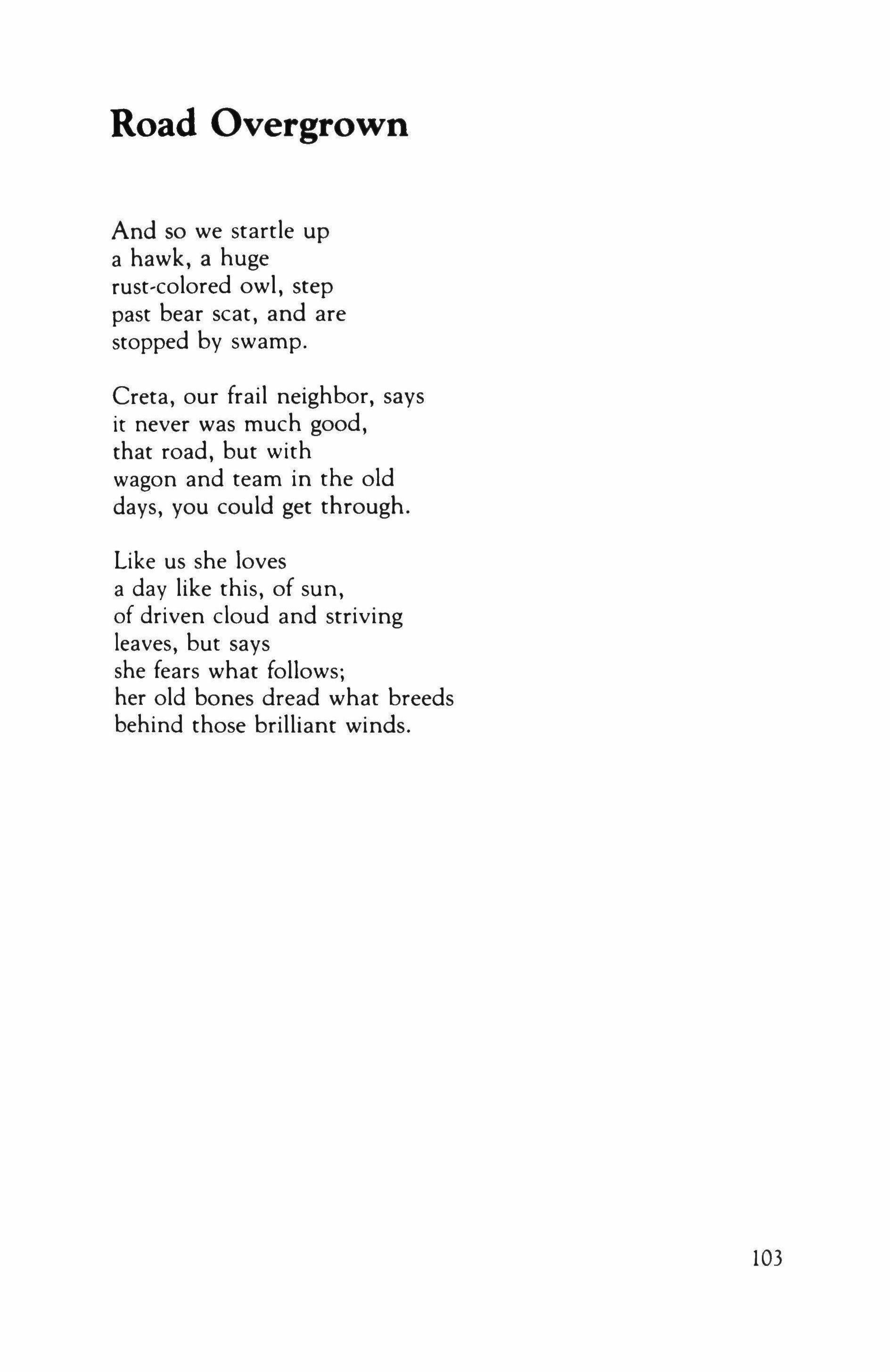
And so we startle up a hawk, a huge rust-colored owl, step past bear scat, and are stopped by swamp.
Creta, our frail neighbor, says it never was much good, that road, but with wagon and team in the old days, you could get through.
Like us she loves a day like this, of sun, of driven cloud and striving leaves, but says she fears what follows; her old bones dread what breeds behind those brilliant winds.
103
Three Poems
Sandra Steingraber
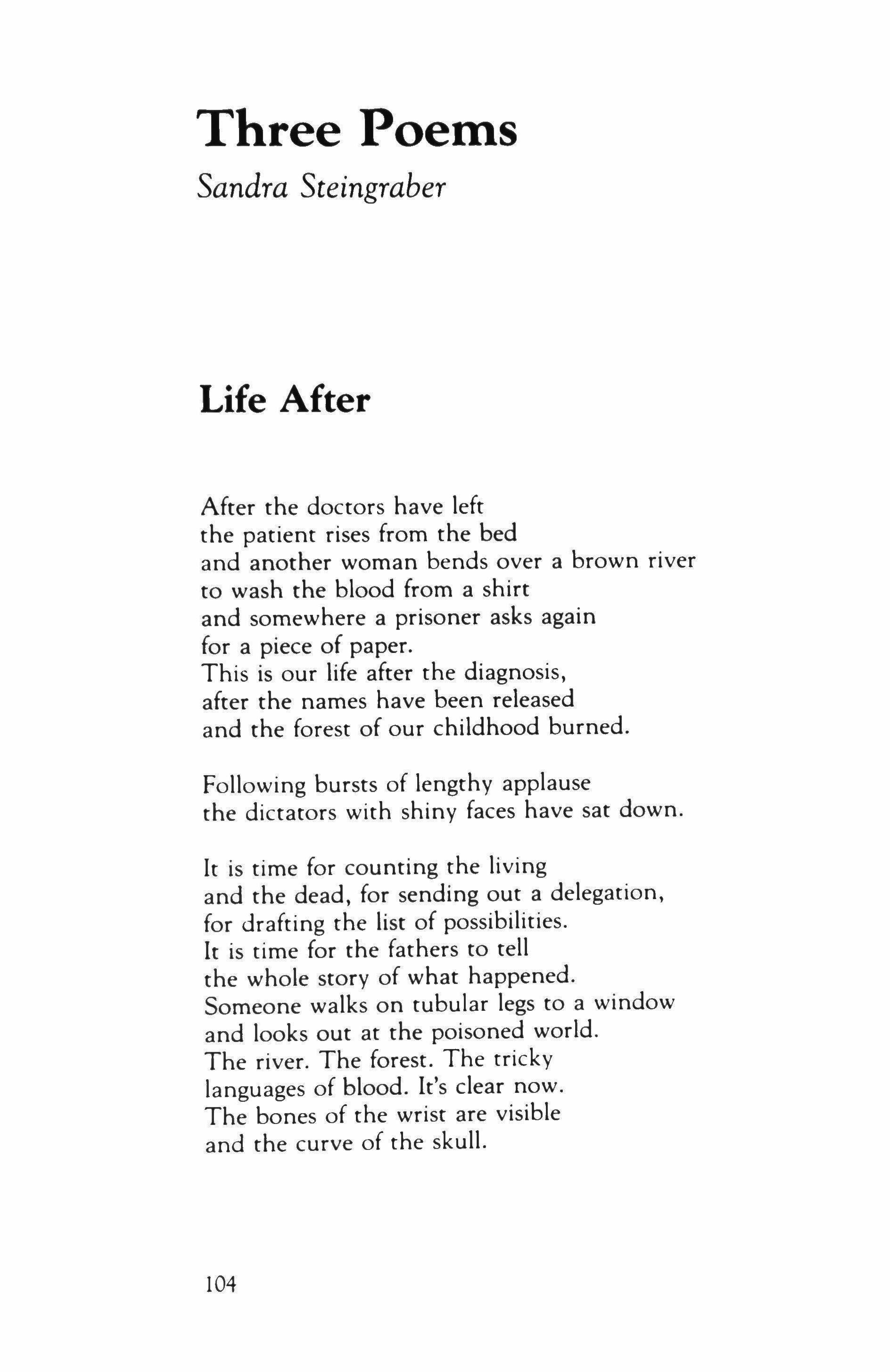
Life After
After the doctors have left the patient rises from the bed and another woman bends over a brown river to wash the blood from a shirt and somewhere a prisoner asks again for a piece of paper. This is our life after the diagnosis, after the names have been released and the forest of our childhood burned.
Following bursts of lengthy applause the dictators with shiny faces have sat down.
It is time for counting the living and the dead, for sending out a delegation, for drafting the list of possibilities. It is time for the fathers to tell the whole story of what happened. Someone walks on tubular legs to a window and looks out at the poisoned world. The river. The forest. The tricky languages of blood. It's clear now. The bones of the wrist are visible and the curve of the skull.
104
Post Op, January Ice Storm

There is this burden as when rain falls and freezes the weight of water twisting cedars to the ground
A kind of great difficulty when to move means to break apart like a cedar sheeted in ice when the wind begins
Or maybe it is just the uselessness of splendor in the window the sun shimmering in the cedars waxwings blinking by the glass berries.
105
Waiting Room

Seeing large men weeping disturbs me the way pictures of this planet taken from the moon do.
I mean the ones that show the globe all blue and quivering in its filmy skin of atmosphere.
I mean the sight of the robust physician sobbing MY GOD MY GOD into a telephone when I stumbled into the wrong examination room.
I mean that man over there.
I mean last night, your shoulders trembling in the doorway the moon following the path your tears made down the skin of your hands.
106
Two Poems
Lisel Mueller

Mary
Mary points to a fellow patient in the dining room and says, "She's always crying." The woman is weeping bitterly.
I'm shocked because there's no hint of compassion in Mary's face.
"The callousness of the old," I think. But then I realize that's not it.
Mary, deaf and in a wheelchair, claims no more sympathy for herself, accepts the world's indifference as the natural order of things, though her eyes still recognize kindness. Death won't let anyone off the hook, whether we rage or go gentle.
Mary's way is to let go, little by little, of anger and love, the self's constituents. She moves toward death the way a swimmer eases into freezing water: ankles, knees, hips, shivering ribcage, collarbone.
107
Oral History
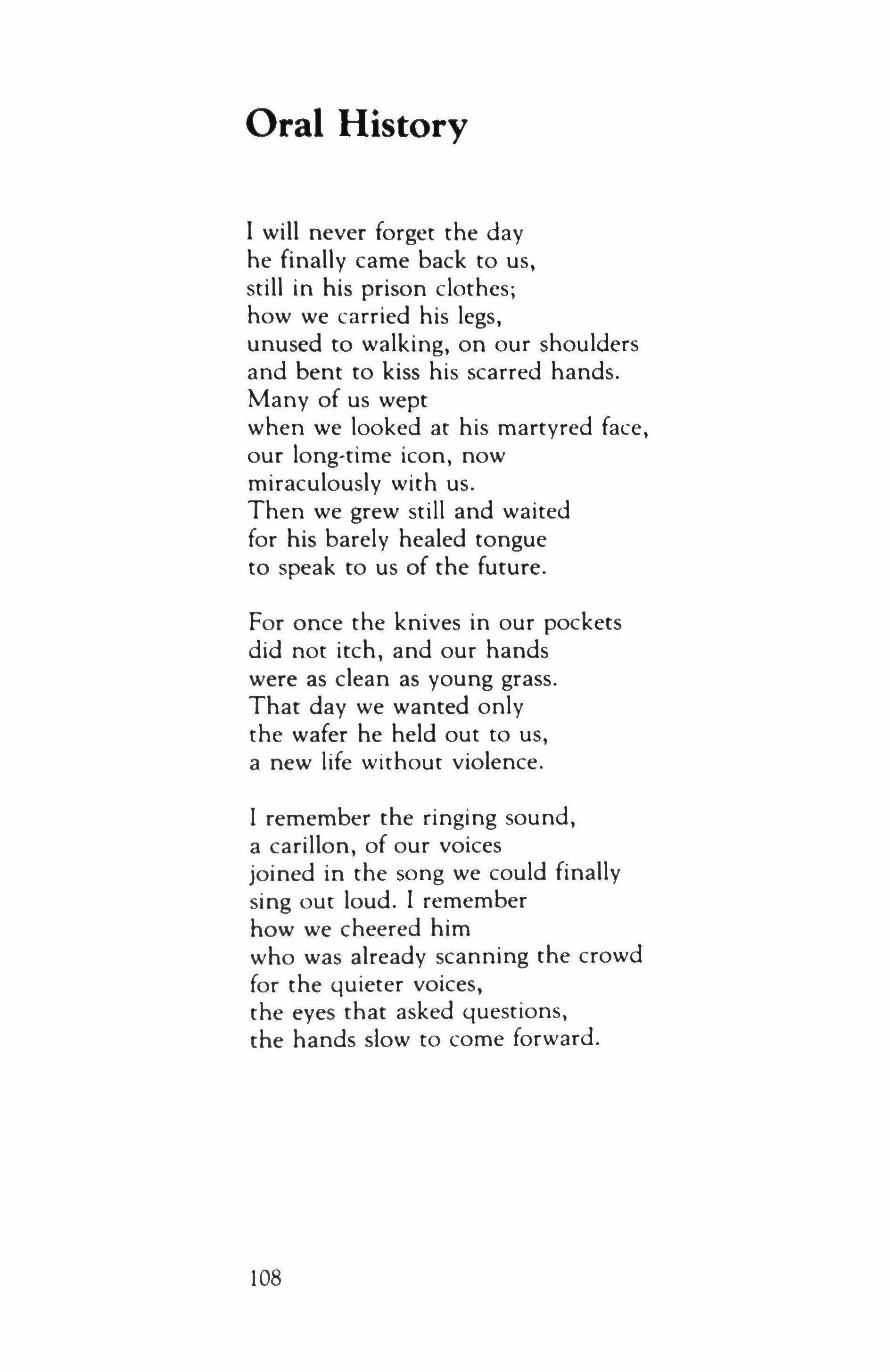
I will never forget the day he finally came back to us, still in his prison clothes; how we carried his legs, unused to walking, on our shoulders and bent to kiss his scarred hands.
Many of us wept when we looked at his martyred face, our long-time icon, now miraculously with us. Then we grew still and waited for his barely healed tongue to speak to us of the future.
For once the knives in our pockets did not itch, and our hands were as clean as young grass. That day we wanted only the wafer he held out to us, a new life without violence.
I remember the ringing sound, a carillon, of our voices joined in the song we could finally sing out loud. I remember how we cheered him who was already scanning the crowd for the quieter voices, the eyes that asked questions, the hands slow to come forward.
108
Six Poems
Cid Corman

Four Poems from YEA
Why should I think of her now? But then she was my mother. She thought of me.
* The child smiles at me and I smile at its motherSunday and Monday.
109

Beholden
Suddenly over your eyes hands blinding binding you-Guess who! And all at once you know
for the first time it doesn't matter who but that there are those hands there to be held by.
*
How long have you been waiting out there? I know you know the door is open. But you wanted to meet menot just words. I know:
I don't like the words any more than you. But what else is there?
110
Two Poems from OF
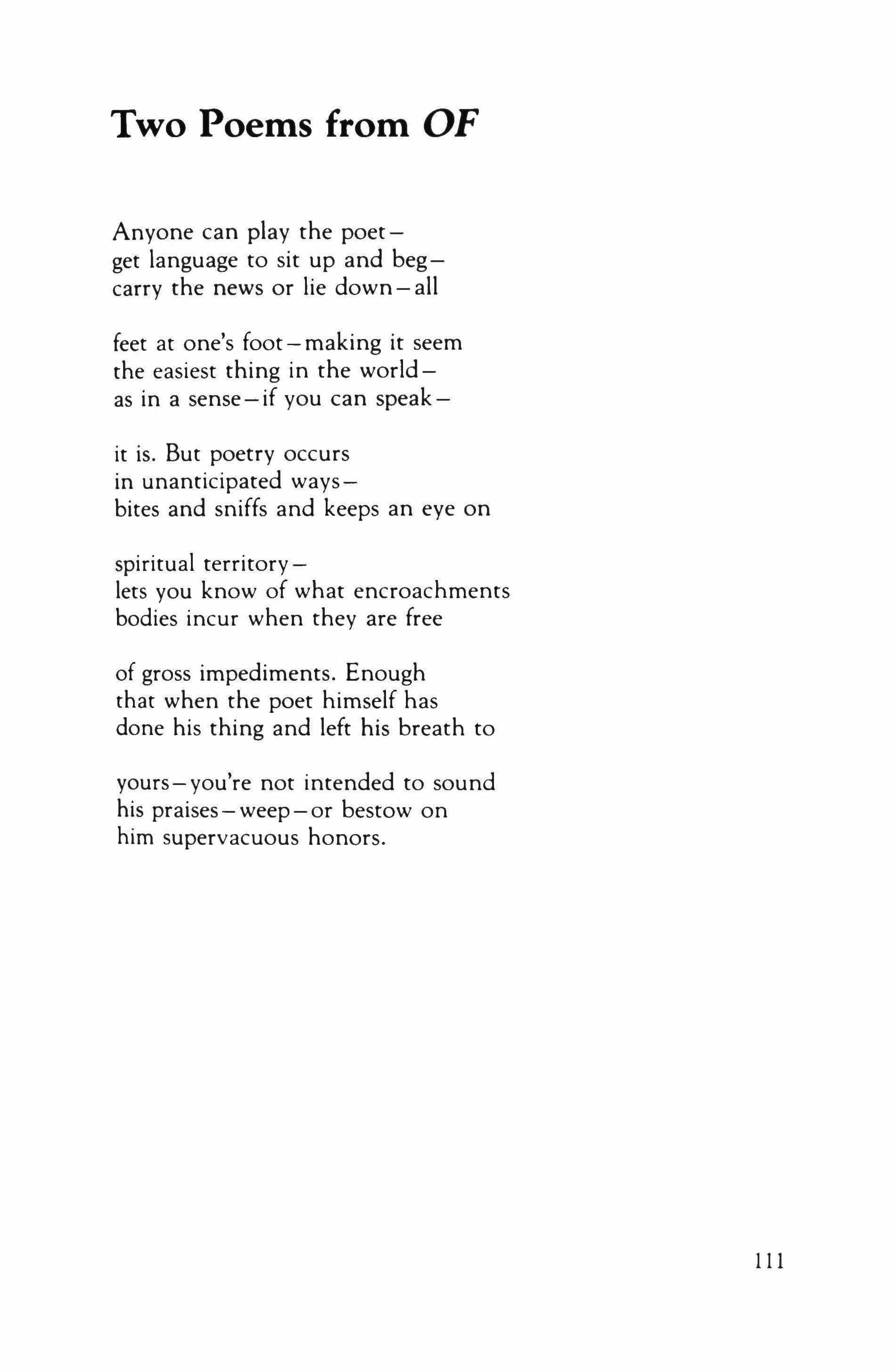
Anyone can play the poetget language to sit up and begcarry the news or lie down - all
feet at one's foot - making it seem the easiest thing in the worldas in a sense-if you can speakit is. But poetry occurs in unanticipated waysbites and sniffs and keeps an eye on spiritual territorylets you know of what encroachments bodies incur when they are free of gross impediments. Enough that when the poet himself has done his thing and left his breath to
yours-you're not intended to sound his praisesweep - or bestow on him supervacuous honors.
III
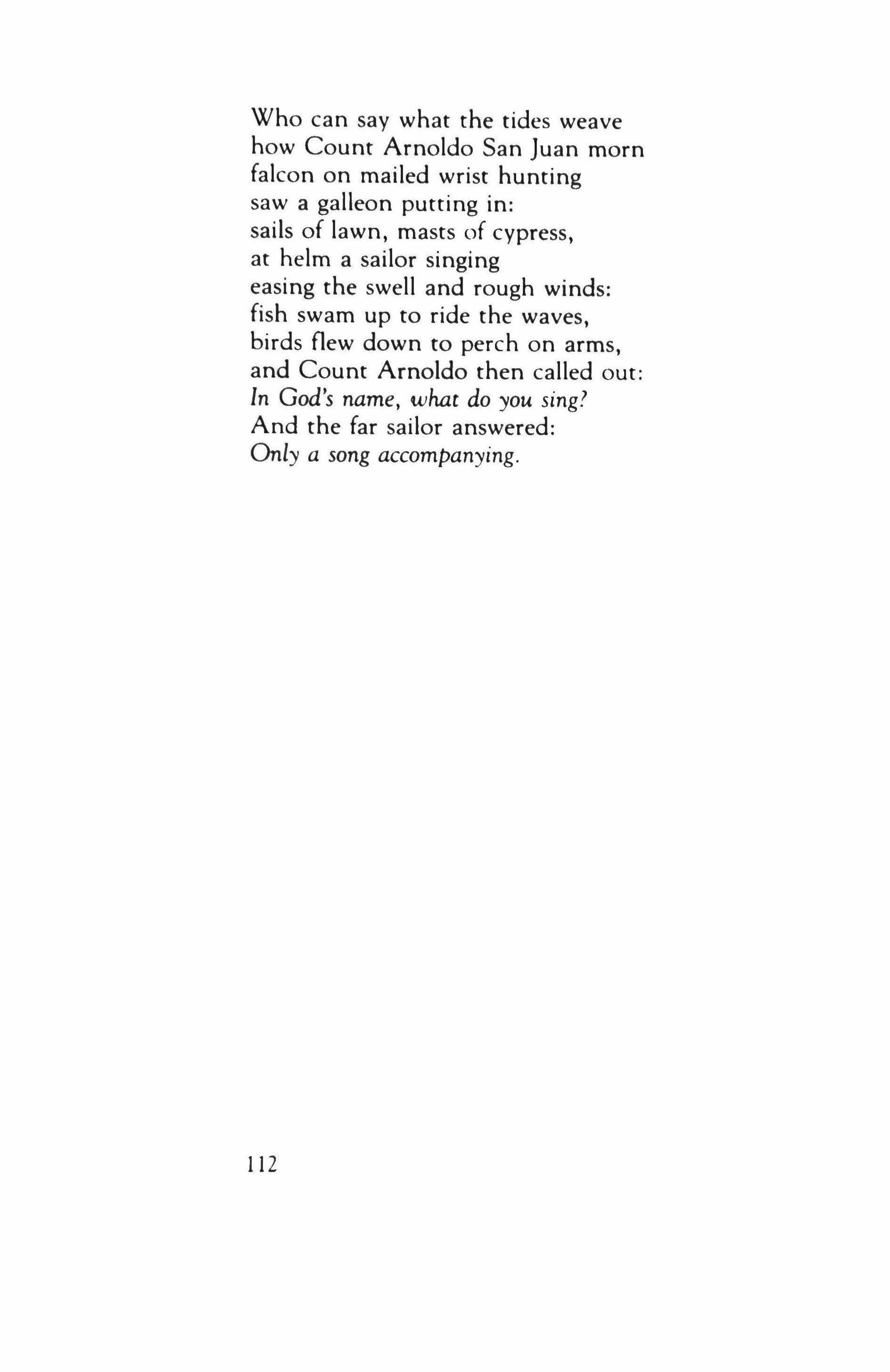
Who can say what the tides weave how Count Arnoldo San Juan morn falcon on mailed wrist hunting saw a galleon putting in: sails of lawn, masts of cypress, at helm a sailor singing easing the swell and rough winds: fish swam up to ride the waves, birds flew down to perch on arms, and Count Arnoldo then called out: In God's name, what do you sing? And the far sailor answered: Only a song accompanying.
112
From a Compostella Diptych: Part I: France: The Ways
John Matthias
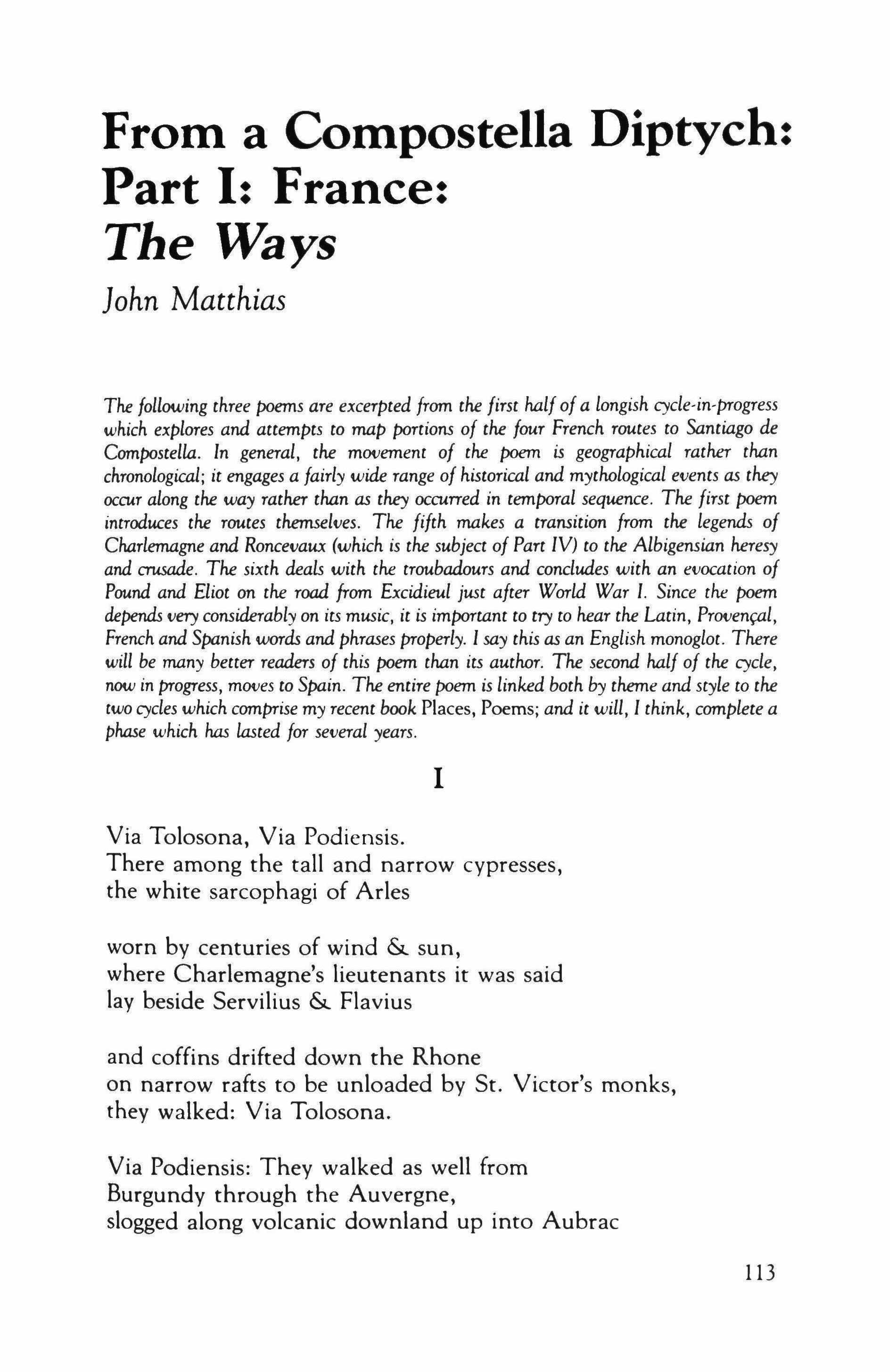
The following three poems are excerpted from the first halfof a longish cycle-in-progress which explores and attempts to map portions of the four French routes to Santiago de Compostella. In general, the movement of the poem is geographical rather than chronological; it engages a fairly wide range of historical and mythological events as they occur along the way rather than as they occurred in temporal sequence. The first poem introduces the routes themselves. The fifth makes a transition from the legends of Charlemagne and Roncevaux (which is the subject of Part IV) to the Albigensian heresy and crusade. The sixth deals with the troubadours and concludes with an evocation of Pound and Eliot on the road from Excidieul just after World War I. Since the poem depends very considerably on its music, it is important to try to hear the Latin, Provenfill, French and Spanish words and phrases properly. I say this as an English monoglot. There will be many better readers of this poem than its author. The second half of the cycle, now in progress, moves to Spain. The entire poem is linked both by theme and style to the two cycles which comprise my recent book Places, Poems; and it will, 1 think, complete a phase which has lasted for several years.
IVia Tolosona, Via Podiensis.
There among the tall and narrow cypresses, the white sarcophagi of Arles
worn by centuries of wind & sun, where Charlemagne's lieutenants it was said lay beside Servilius & Flavius and coffins drifted down the Rhone on narrow rafts to be unloaded by St. Victor's monks, they walked: Via Tolosona.
Via Podiensis: They walked as well from Burgundy through the Auvergne, slogged along volcanic downland up into Aubrac
113
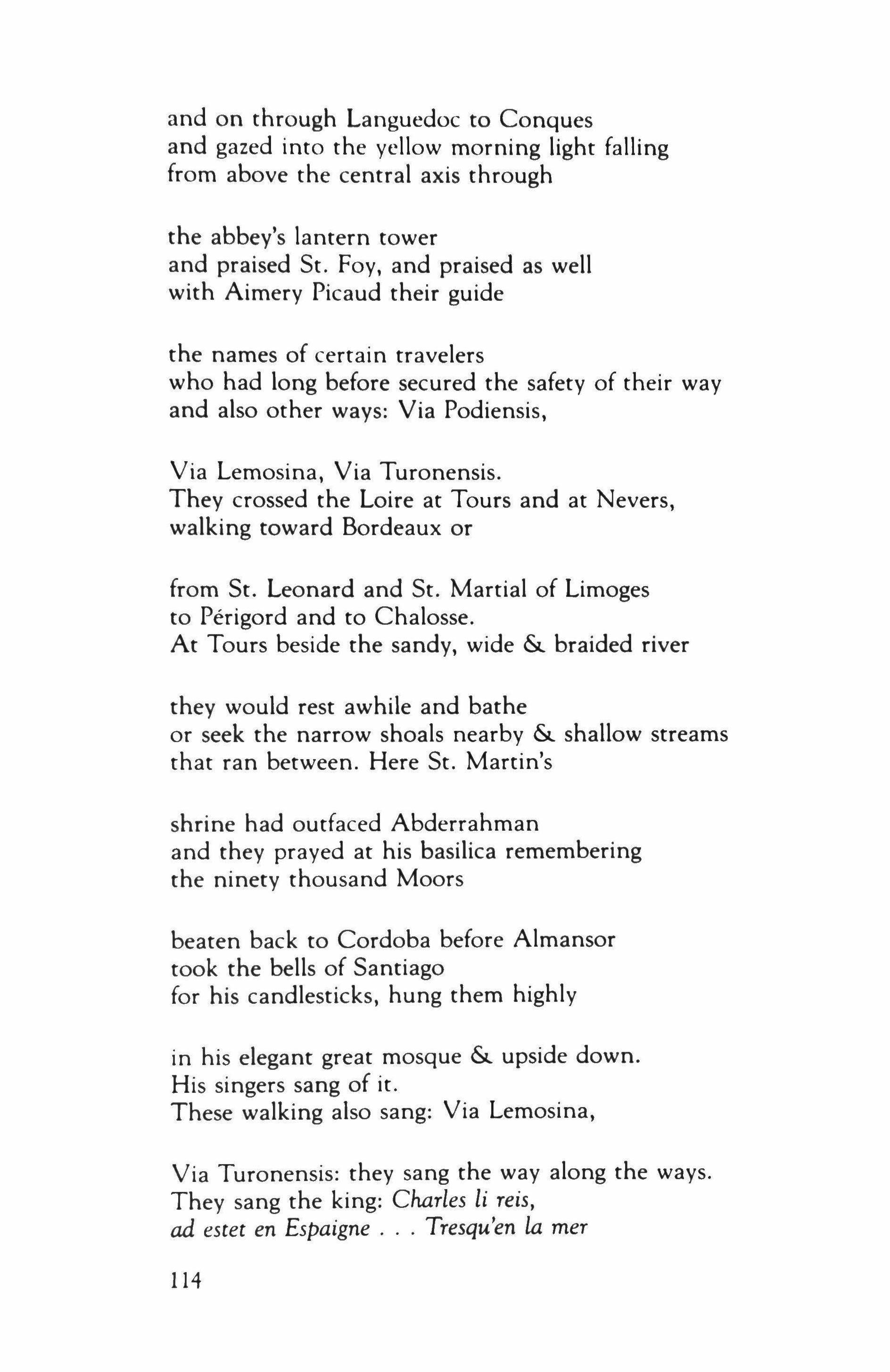
and on through Languedoc to Conques and gazed into the yellow morning light falling from above the central axis through the abbey's lantern tower and praised St. Foy, and praised as well with Aimery Picaud their guide
the names of certain travelers who had long before secured the safety of their way and also other ways: Via Podiensis, Via Lemosina, Via Turonensis. They crossed the Loire at Tours and at Nevers, walking toward Bordeaux or
from St. Leonard and St. Martial of Limoges to Perigord and to Chalosse. At Tours beside the sandy, wide & braided river
they would rest awhile and bathe or seek the narrow shoals nearby & shallow streams that ran between. Here St. Martin's
shrine had outfaced Abderrahman and they prayed at his basilica remembering the ninety thousand Moors
beaten back to Cordoba before Almansor rook the bells of Santiago for his candlesticks, hung them highly
in his elegant great mosque & upside down. His singers sang of it. These walking also sang: Via Lemosina,
Via Turonensis: they sang the way along the ways. They sang the king: Charles li reis, ad ester en Espaigne Tresqu'en la mer
114
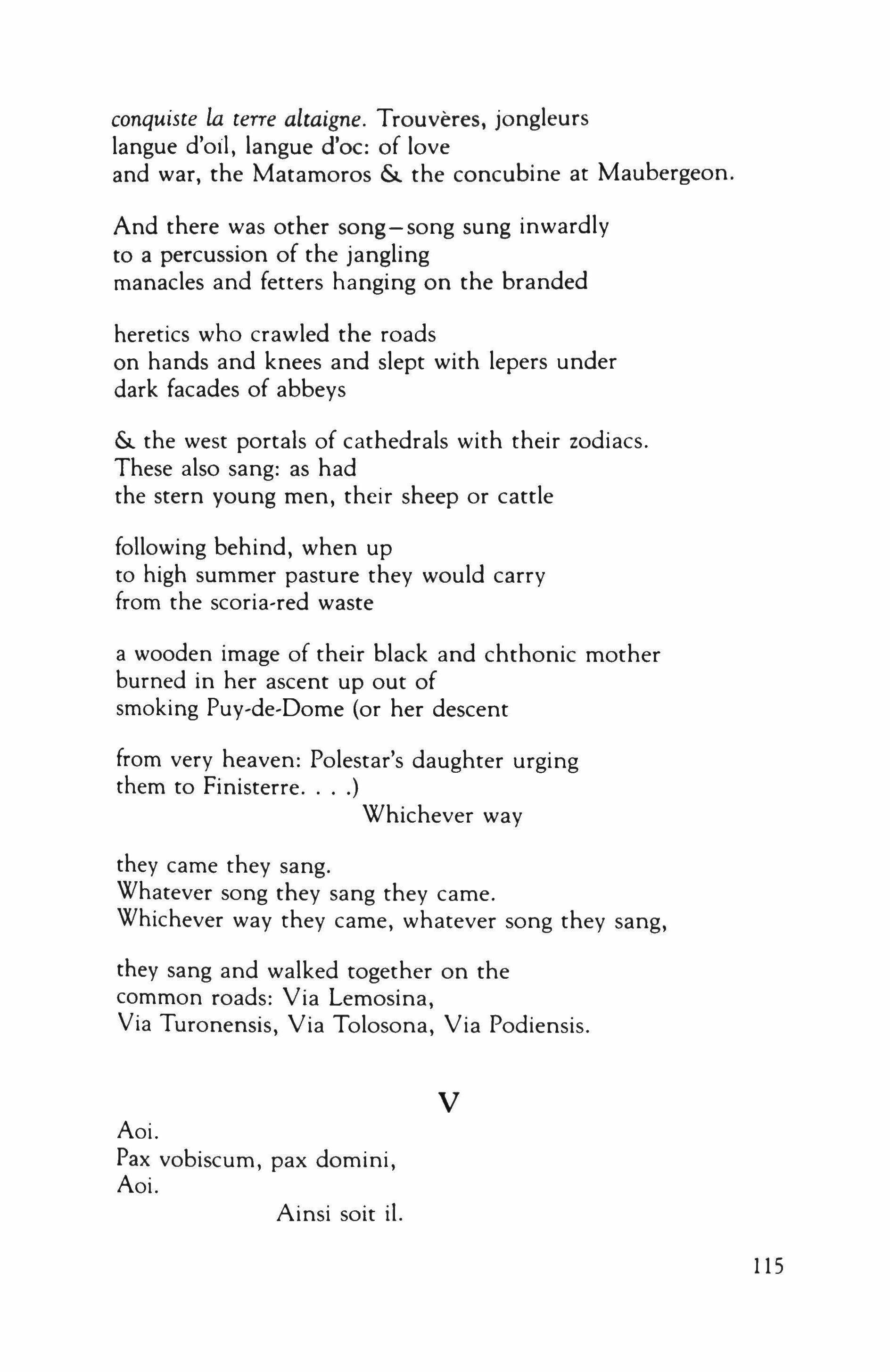
conquiste la terre altaigne. Trouveres, jongleurs langue d'oil, langue d'oc: of love and war, the Matamoros & the concubine at Maubergeon.
And there was other song-song sung inwardly to a percussion of the jangling manacles and fetters hanging on the branded heretics who crawled the roads on hands and knees and slept with lepers under dark facades of abbeys & the west portals of cathedrals with their zodiacs. These also sang: as had the stern young men, their sheep or cattle following behind, when up to high summer pasture they would carry from the scoria-red waste a wooden image of their black and chthonic mother burned in her ascent up out of smoking Puy-de-Dome (or her descent from very heaven: Polestar's daughter urging them to Finisterre ) Whichever way
they came they sang. Whatever song they sang they came. Whichever way they came, whatever song they sang,
they sang and walked together on the common roads: Via Lemosina, Via Turonensis, Via Tolosona, Via Podiensis.
v Aoi.
Pax vobiscum, pax domini, Aoi.
Ainsi soit il.
115
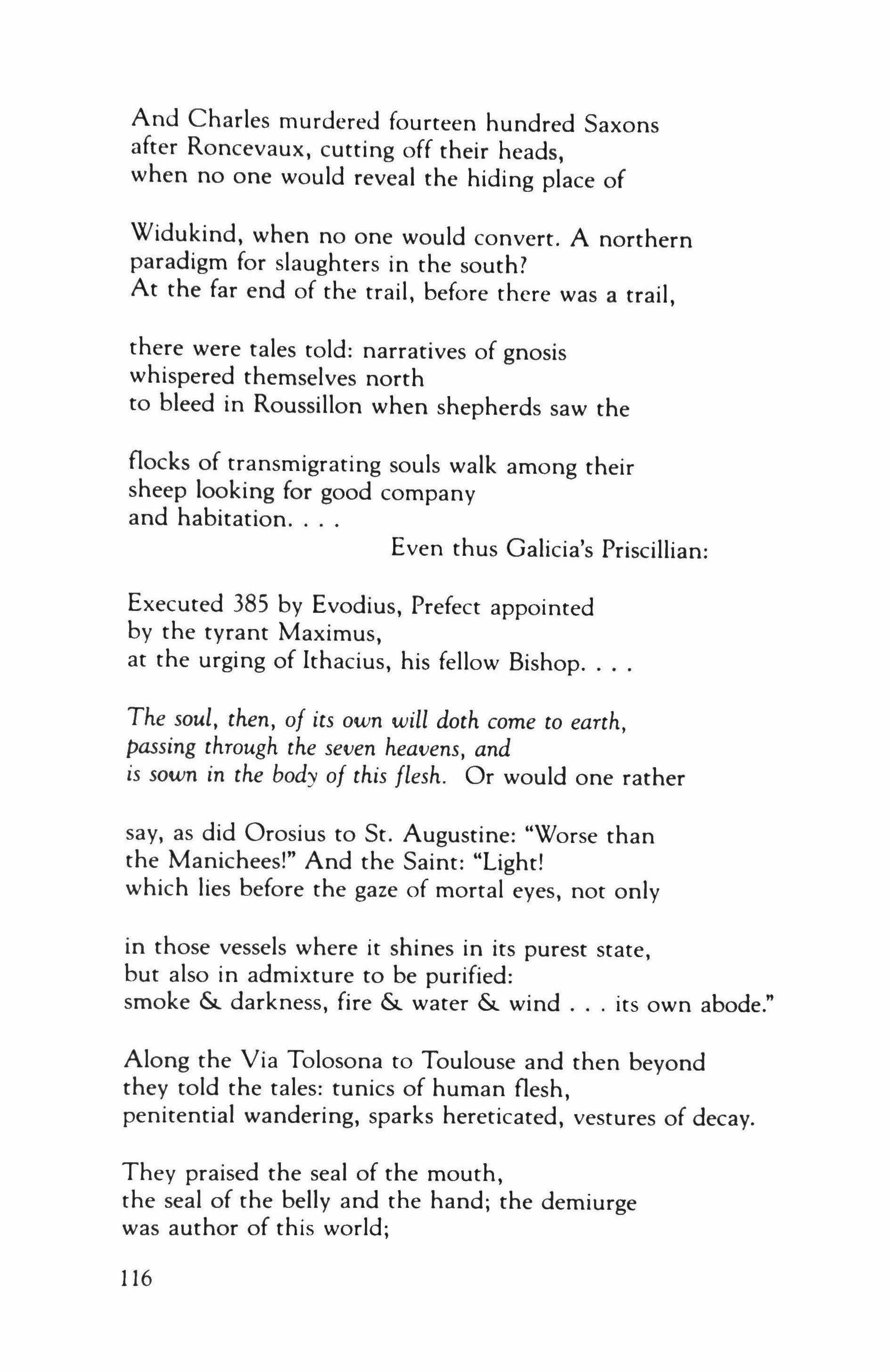
And Charles murdered fourteen hundred Saxons after Roncevaux, cutting off their heads, when no one would reveal the hiding place of Widukind, when no one would convert. A northern paradigm for slaughters in the south? At the far end of the trail, before there was a trail, there were tales told: narratives of gnosis whispered themselves north to bleed in Roussillon when shepherds saw the flocks of transmigrating souls walk among their sheep looking for good company and habitation
Even thus Galicia's Priscillian:
Executed 385 by Evodius, Prefect appointed by the tyrant Maximus, at the urging of Ithacius, his fellow Bishop
The soul, then, of its own will doth come to earth, passing through the seven heavens, and is sown in the body of this flesh. Or would one rather say, as did Orosius to St. Augustine: "Worse than the Manichees!" And the Saint: "Light! which lies before the gaze of mortal eyes, not only in those vessels where it shines in its purest state, but also in admixture to be purified: smoke & darkness, fire & water & wind its own abode."
Along the Via Tolosona to Toulouse and then beyond they told the tales: tunics of human flesh, penitential wandering, sparks hereticated, vestures of decay.
They praised the seal of the mouth, the seal of the belly and the hand; the demiurge was author of this world;
116
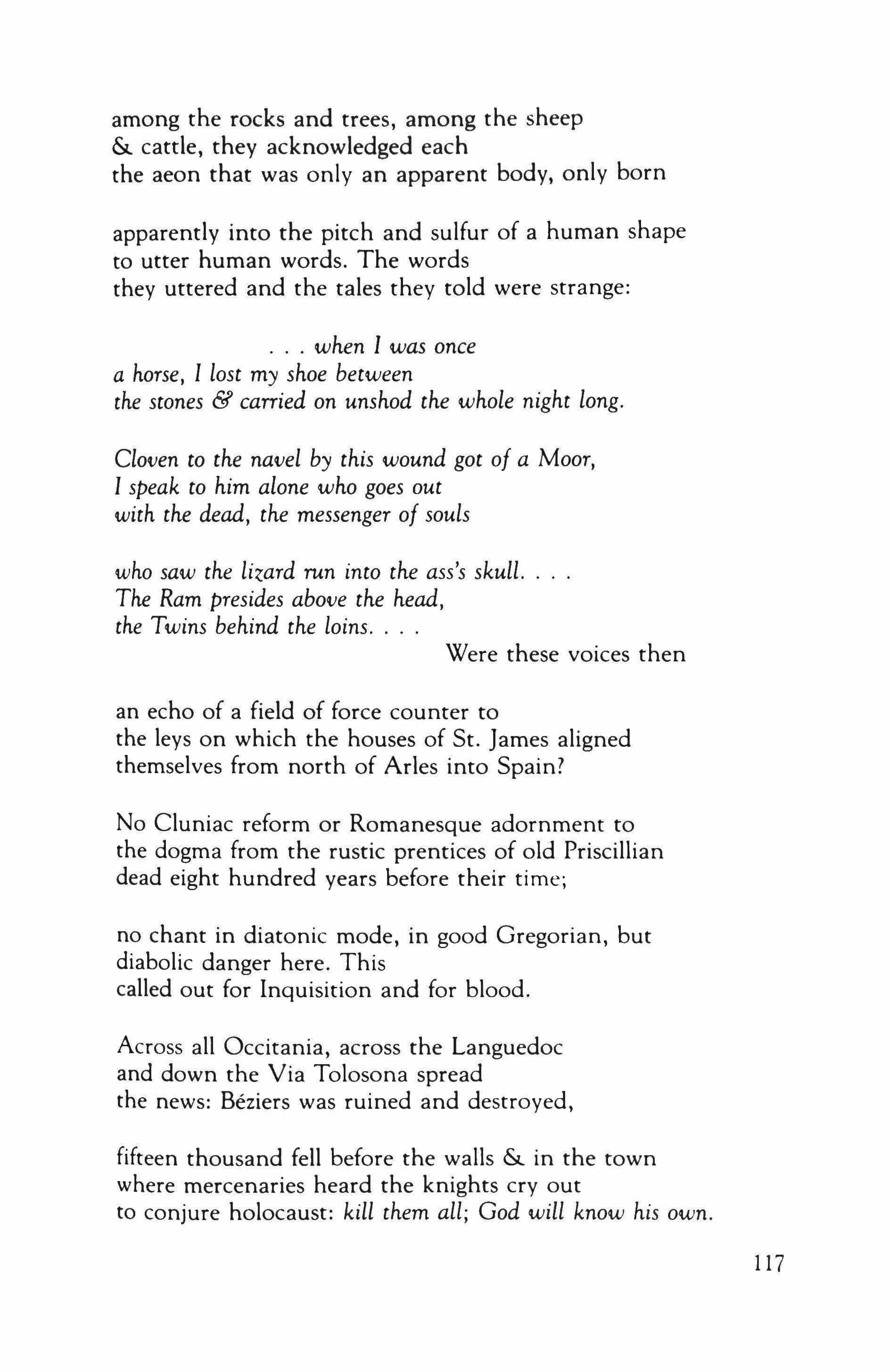
among the rocks and trees, among the sheep & cattle, they acknowledged each the aeon that was only an apparent body, only born apparently into the pitch and sulfur of a human shape to utter human words. The words they uttered and the tales they told were strange: when 1 was once a horse, 1 lost my shoe between the stones & carried on unshod the whole night long.
Cloven to the navel by this wound got of a Moor, 1 speak to him alone who goes out with the dead, the messenger of souls who saw the lizard run into the ass's skull. The Ram presides above the head, the Twins behind the loins
Were these voices then
an echo of a field of force counter to the leys on which the houses of St. James aligned themselves from north of Aries into Spain?
No Cluniac reform or Romanesque adornment to the dogma from the rustic prentices of old Priscillian dead eight hundred years before their time;
no chant in diatonic mode, in good Gregorian, but diabolic danger here. This called out for Inquisition and for blood.
Across all Occitania, across the Languedoc and down the Via Tolosona spread the news: Beziers was ruined and destroyed, fifteen thousand fell before the walls & in the town where mercenaries heard the knights cry out to conjure holocaust: kill them all; God will know his own.
117
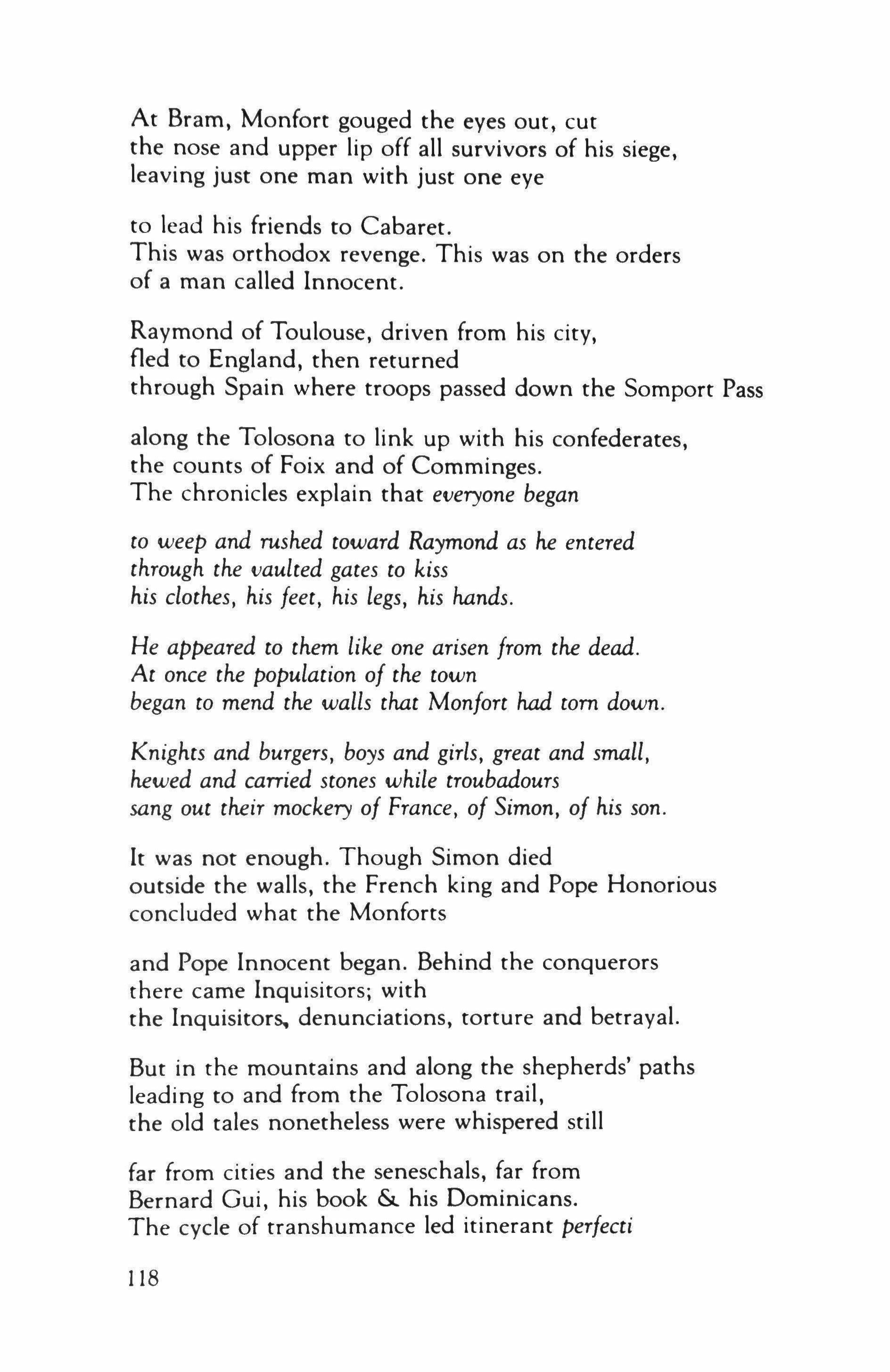
At Bram, Monfort gouged the eyes out, cut the nose and upper lip off all survivors of his siege, leaving just one man with just one eye to lead his friends to Cabaret. This was orthodox revenge. This was on the orders of a man called Innocent.
Raymond of Toulouse, driven from his city, fled to England, then returned through Spain where troops passed down the Somport Pass along the Tolosona to link up with his confederates, the counts of Foix and of Comminges. The chronicles explain that everyone began to weep and rushed toward Raymond as he entered through the vaulted gates to kiss his clothes, his feet, his legs, his hands.
He appeared to them like one arisen from the dead. At once the population of the town began to mend the walls that Monfort had tom down.
Knights and burgers, boys and girls, great and small, hewed and carried stones while troubadours sang out their mockery of France, of Simon, of his son.
It was not enough. Though Simon died outside the walls, the French king and Pope Honorious concluded what the Monforts and Pope Innocent began. Behind the conquerors there came Inquisitors; with the Inquisitors. denunciations, torture and betrayal.
But in the mountains and along the shepherds' paths leading to and from the Tolosona trail, the old tales nonetheless were whispered still far from cities and the seneschals, far from Bernard Gui, his book & his Dominicans. The cycle of transhumance led itinerant perfecti
118

there among gavaches as far from their own ostals as the Ariege is from Morella, the wide Garonne from Ebro's northern bank & winter camp
tunics of human flesh, penitential wandering, sparks hereticated, vestures of decay
Among the rocks and trees, among the sheep and cattle, they acknowledged each the aeon that was only an apparent body, only born apparently into the pitch & sulfur of a human shape to utter human words. And in Galicia, beneath the nave, restless with the centuries, the east-facing tombs out of all alignment with the Roman mausoleum & supporting walls take up proximity below the bones in Santiago's vault
to something holy. The martyred heretic of Trier? Aoi.
Pax vobiscum, pax domini.
Aoi. Ainsi soit il.
VI
But was it this that found the floriations in the columns, found in capitals the dance that found the music of the cloister & the choir, the song that found the south for Eleanor of Aquitaine? Trobar, they said: to find. To find one's way, one's path, to find the song, to find the music for the song, to find through stands of walnut, poplar, chestnut, through meadows full of buttercups
119

and orchids, over or beside the banks of many rivers from above Uzerche to well below the Lot- Vezere, Correze, Couze, Dordogne, Vers-
along the paths of sandstone, rust red & pink, the way through Limousin, through Perigord, all along the Via Lemosina to a small road leading to a castle gate, to find a woman in that place who finds herself in song, to find a friend, a fellow singer there or on the road.
Or to the north and west, at Poitiers, along the Touronensis after Orleans and Tours, to find before the heaths of Gascony the pine forests and the plat pays of Poitevins who speak the language sung by William, Lord of Aquitaine, or the Lemosin of singers who found comfort who found welcome at his son's court, his who died at Santiago, and the court of Eleanor his heir whose lineage from Charlemagne found Angevin Bordeaux. They came from Albi and Toulouse, the town of Cahors and the county of Quercy, but did they find for her and sing the Deus non fecit of the heretic perjeai of Provence or the light from Eleusis
bathing trail and keep and column in its warmth?
Beneath the limestone cliffs of the Dordogne, past the verges bright with honeysuckle, thyme and juniper, quarried stone and timber floated toward the sea on barges by the dark ores of the causse, while salt, fish, and news of Angevin ambition & desire came on inland from Bordeaux and from Libourne. From Hautefort, Riberek: from nearby Ventadorn , singers found their way to Poitiers.
120

The sun rains, they sang: 10 soleil plut'il, while pilgrims in Rocamadour climbed toward what they sought, singing without benefit
of trobar ric or trobar elus: midonz, midonz in a dazed vision of the lady there, hunched & black upon a stick fallen from the sky.
To sing, to pray: to find behind them, south of Ventedorn, of Haurefort, of Cahors & Toulouse, alignments in the temple of the sun
at Montsegur measuring the solstice, measuring the equinox, dawn light raining through the eastern portholes of a ship
riding its great wave, counting down the year, counting down the years, sign by sign from Aires to The Fish, not to brighten only that
new morning in Provence but latterly to bend also onto any path of any who would follow, singing
at the gates of abbeys or below the castle walls in any language found where every song was fond
and yet forbidding, forensic as the night. Did those who sang, do those who sing, care at all that at the ending of their song,
as at the start, William of Aquiraine, son of the troubadour, father of the child they would hail in Poitiers
kneels crying midonz to the stars but finds in Santiago's tomb not the bones of James but those of the heretic Priscillian?
121

I am Arnaut who gathers the wind. I am Arnaut who hunts the hare with the ox. I am Arnaut who swims against the tide. *
Near Excidieul, long long after Aquitaine was France, after the end of what was Angevin, and after the end of the end,
two lone walkers slogged along the road and spoke of vortices and things to be reborn
after Europe's latest conflagration. Was it spring? Was it 1920? The older of the two, trying to remember after fifty years, could not be sure. It was he who had crept over rafters, peering down at the Dronne, once before. He knew that Aubeterre was to the east, that one could find three keeps outside Mareuil, a pleached arbor at Chalais. He knew the roads in this place. He had walked into Perigord, had seen Narbonne, Cahors, Chalus, and now was once again walking with his friend near Excidieul. In certain ways he much resembled the old finders of song, and sang their songs in his own way and tried fo make them new. He called the other one, his friend, Arnaut, though that was not his name, and stopped with him beside a castle wall. He saw above them both, and wrote down in his book, the wave pattern cut in the stone, spire-top alevel the well curb, and then heard this other say, the sun shining, the birds singing, I am afraid of the life after death. Of a sudden. Out of the calm and clarity of morning.
He stored the loved places in his memory - the roads, the keeps beside the rivers, the arbor at Chalais- and walked in Eleusinian light and through the years to Rirnini and Rome, in darkness on to Pisa in another war. And after fifty years, and from the silence of his great old age, he said: Rucksacked, we walked from Excidieul. When he told me what he feared, he paused, and then he added: "Now, at last, I have shocked him
Who was Amaut to gather the wind?
122
Budapest, 1944
a memoir
Peter Kenez

I lived in an age when there was much to be afraid of. For a long time, however, I was not very good at distinguishing between genuine dangers and the petty terrors of childhood. In 1942-43 there were very few air raids. These did not particularly frighten me. I just hated the ugly noise of the sirens. On one summer evening, rather late, we were walking home from the Pauntzes when the air raid started. There was full moon. It was one of those nights when it is so bright that you think you could read a newspaper. The houses were dark and there was not a soul on the street, but the sky was well lit by searchlights. I could see the airplanes. The bombs fell not too far from us, judging from the explosions. I understood that we could be killed, but since my parents were with me I was only slightly afraid. In fact my fear was mixed with a sense of exhilaration. In the course of the following years this exhilaration would come back again and again on the strangest occasions. It was a feeling of being taken out of the ordinary. The rules of daily life were now suspended; anything could happen and the world would never be the same again.
It was an altogether different situation when an air raid came during broad daylight when I happened to be alone. I do not know why my mother went across the street to the grocery store without me on that day. I cannot recall another time when I was left alone in the house. It was a bright sunny morning when I heard the piercingly loud noise of the air-raid siren. It made me hysterical. I remember kneeling in front of the divan on which I slept and bawling uncontrollably. It took my mother a long time on her return to calm and console me.
1
123
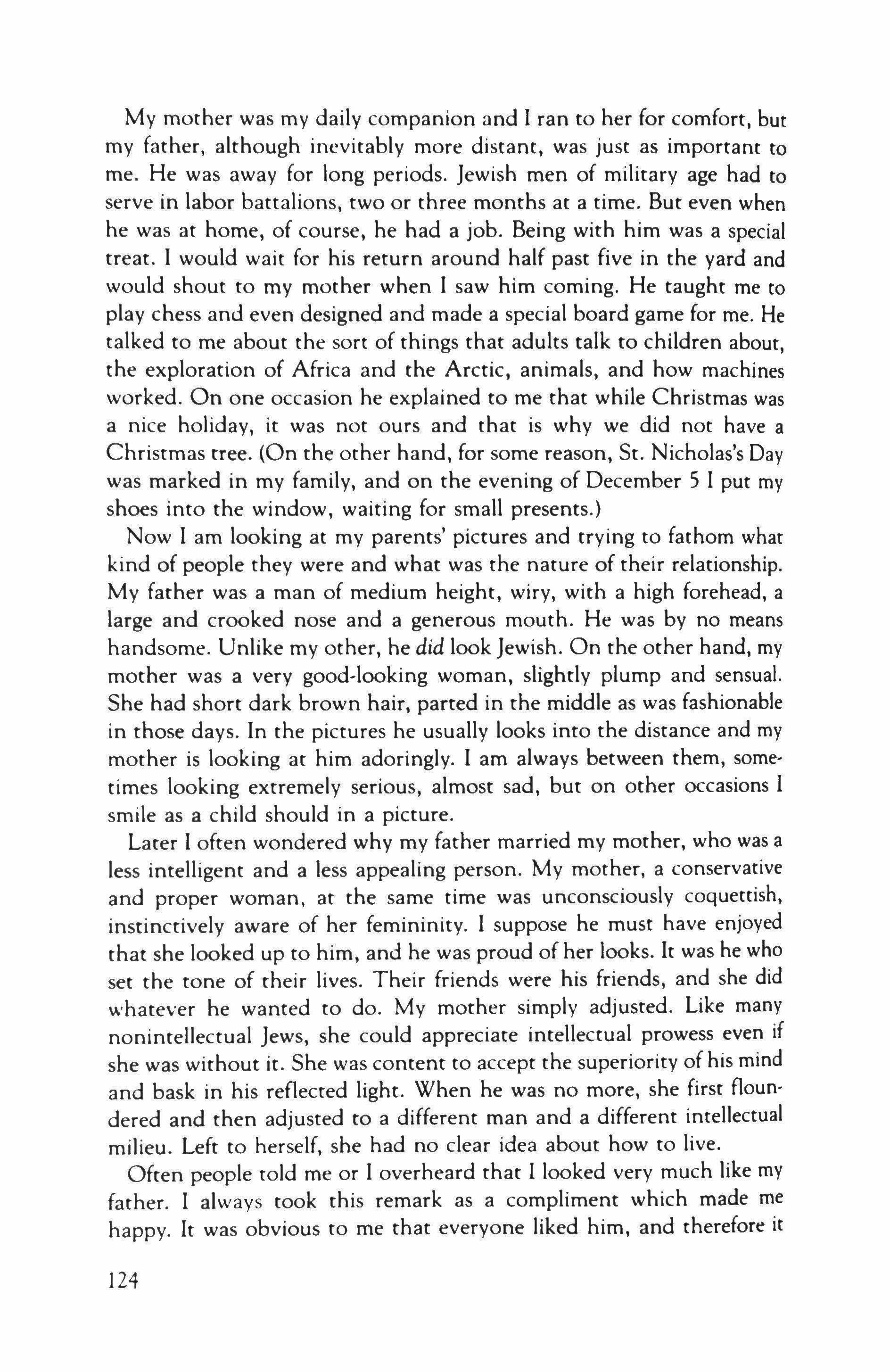
My mother was my daily companion and I ran to her for comfort, but my father, although inevitably more distant, was just as important to me. He was away for long periods. Jewish men of military age had to serve in labor battalions, two or three months at a time. But even when he was at home, of course, he had a job. Being with him was a special treat. I would wait for his return around half past five in the yard and would shout to my mother when I saw him coming. He taught me to play chess and even designed and made a special board game for me. He talked to me about the sort of things that adults talk to children about, the exploration of Africa and the Arctic, animals, and how machines worked. On one occasion he explained to me that while Christmas was a nice holiday, it was not ours and that is why we did not have a Christmas tree. (On the other hand, for some reason, St. Nicholas's Day was marked in my family, and on the evening of December 5 I put my shoes into the window, waiting for small presents.)
Now I am looking at my parents' pictures and trying to fathom what kind of people they were and what was the nature of their relationship. My father was a man of medium height, wiry, with a high forehead, a large and crooked nose and a generous mouth. He was by no means handsome. Unlike my other, he did look Jewish. On the other hand, my mother was a very good-looking woman, slightly plump and sensual. She had short dark brown hair, parted in the middle as was fashionable in those days. In the pictures he usually looks into the distance and my mother is looking at him adoringly. I am always between them, sometimes looking extremely serious, almost sad, but on other occasions I smile as a child should in a picture.
Later I often wondered why my father married my mother, who was a less intelligent and a less appealing person. My mother, a conservative and proper woman, at the same time was unconsciously coquettish, instinctively aware of her femininity. I suppose he must have enjoyed that she looked up to him, and he was proud of her looks. It was he who set the tone of their lives. Their friends were his friends, and she did whatever he wanted to do. My mother simply adjusted. Like many nonintellectual Jews, she could appreciate intellectual prowess even if she was without it. She was content to accept the superiority of his mind and bask in his reflected light. When he was no more, she first floundered and then adjusted to a different man and a different intellectual milieu. Left to herself, she had no clear idea about how to live.
Often people told me or I overheard that I looked very much like my father. I always took this remark as a compliment which made me happy. It was obvious to me that everyone liked him, and therefore it
124

conferred status on me that I was his son. I wanted to be like my father. I tried to imitate him in a childish fashion. I believed that I liked the food which he liked and refused to eat what he did not like. Our favorites were wiener schnitzel and chestnut puree and neither of us ate anything sour.
The great sorrow of my father's life was that he could not become a doctor. He had been an excellent student and when he graduated from gymnasium his parents were well-to-do and willing to finance his further education. He matriculated in 1922. At that time a numerus clausus law was in effect, which severely restricted the number of Jews in universities. As a result he could not enroll. He spent a year in the medical school in Vienna, but for some reason was then compelled to return. During the economically hard times of the early thirties his father lost his wealth. Father became a bookkeeper. He earned 200 pengoes a month, which was a very modest salary. My parents got along on this salary, because my mother economized. In fact she was extremely stingy. She had an extraordinary ability to fill the kettle with exactly the right amount of water; she would waste nothing, not even water. She turned on the lights only when she absolutely needed to. She was always interested in bargains, bought the cheapest cut of meat and would not throw out anything. She would walk a half a mile in order to save on tram fare. She would put aside money from the small sum that had been assigned for food. She hid the money, though it was unclear from whom. Her father, who was a generous man and well-off at this time, would have gladly given them money, but my parents were too proud to accept help. I did not feel that we were poor. I could see that my parents' friends lived in nicer houses, and I knew that my cousin Robi had many more toys, but since my father was very much respected by everyone, I felt no humiliation of poverty.
Until 1943 father worked for Heinrich and Company, a firm which supplied hardware stores in Budapest. At that time pressure was put on the company to remove Jewish employees and my father was fired. The separation was amicable. His superiors expressed their regret and my father understood that there was nothing that they could do. He was such a valued and good worker that for a couple of months the firm could not get along without him and the work was delivered to our house where my father continued to keep the books and train his replacement. He was paid secretly for his efforts. Afterwards, however, he could not find another job and so he was compelled to work at my maternal grandfather's small printing firm. In less than a year he learned the trade and he was expected to become a partner.
125
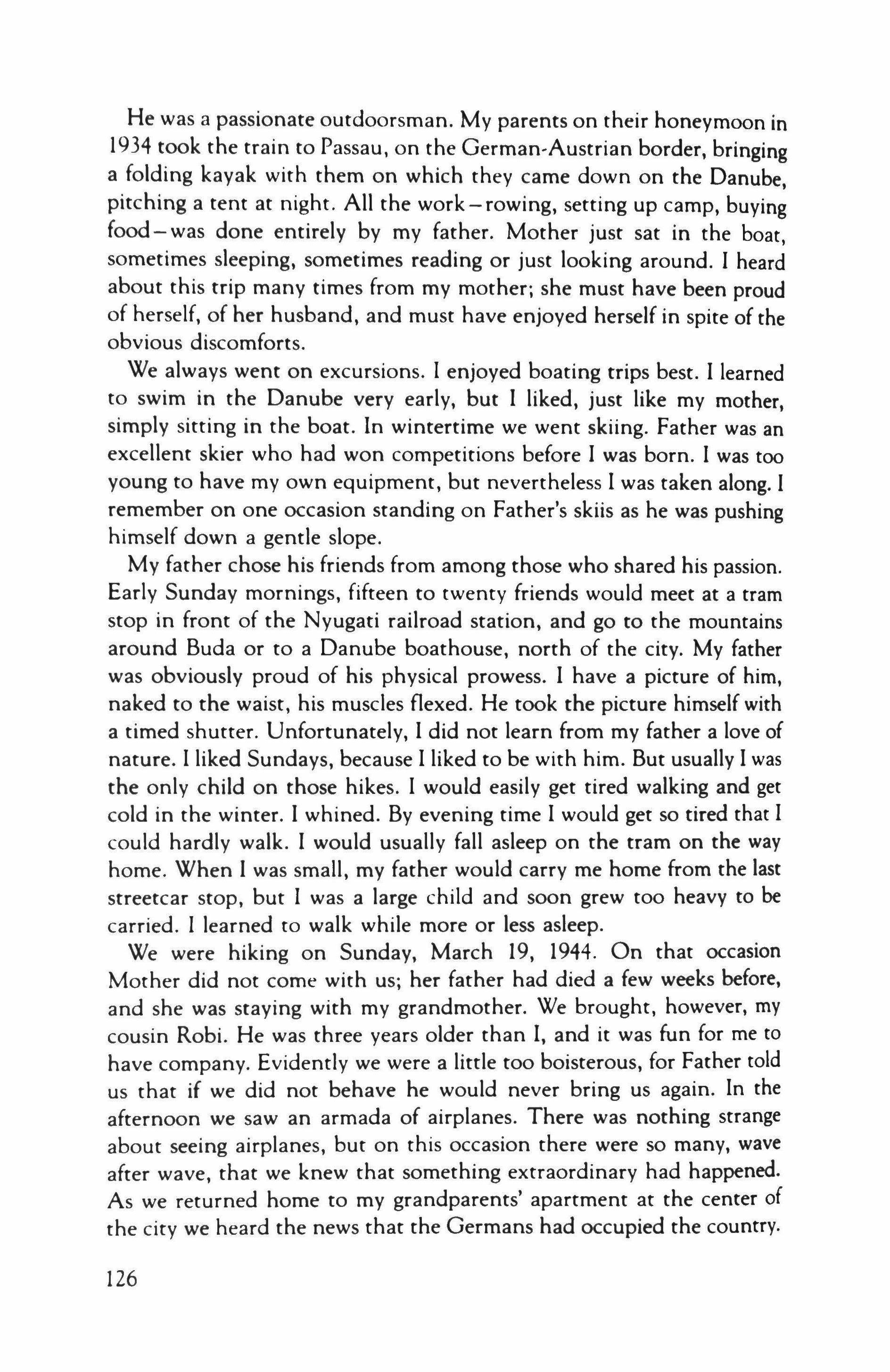
He was a passionate outdoorsman. My parents on their honeymoon in 1934 took the train to Passau, on the German-Austrian border, bringing a folding kayak with them on which they came down on the Danube, pitching a tent at night. All the work-rowing, setting up camp, buying food-was done entirely by my father. Mother just sat in the boat, sometimes sleeping, sometimes reading or just looking around. I heard about this trip many times from my mother; she must have been proud of herself, of her husband, and must have enjoyed herself in spite of the obvious discomforts.
We always went on excursions. I enjoyed boating trips best. I learned to swim in the Danube very early, but I liked, just like my mother, simply sitting in the boat. In wintertime we went skiing. Father was an excellent skier who had won competitions before I was born. I was too young to have my own equipment, but nevertheless I was taken along. I remember on one occasion standing on Father's skiis as he was pushing himself down a gentle slope.
My father chose his friends from among those who shared his passion. Early Sunday mornings, fifteen to twenty friends would meet at a tram stop in front of the Nvugati railroad station, and go to the mountains around Buda or to a Danube boathouse, north of the city. My father was obviously proud of his physical prowess. I have a picture of him, naked to the waist, his muscles flexed. He took the picture himself with a timed shutter. Unfortunately, I did not learn from my father a love of nature. I liked Sundays, because I liked to be with him. But usually I was the only child on those hikes. I would easily get tired walking and get cold in the winter. I whined. By evening time I would get so tired that I could hardly walk. I would usually fall asleep on the tram on the way home. When I was small, my father would carry me home from the last streetcar stop, but I was a large child and soon grew too heavy to be carried. I learned to walk while more or less asleep.
We were hiking on Sunday, March 19, 1944. On that occasion Mother did not come with us; her father had died a few weeks before, and she was staying with my grandmother. We brought, however, my cousin Robi. He was three years older than I, and it was fun for me to have company. Evidently we were a little too boisterous, for Father told us that if we did not behave he would never bring us again. In the afternoon we saw an armada of airplanes. There was nothing strange about seeing airplanes, but on this occasion there were so many, wave after wave, that we knew that something extraordinary had happened. As we returned home to my grandparents' apartment at the center of the city we heard the news that the Germans had occupied the country.
126

We spent the night at my grandparents'. This way my father could walk to work next morning. Early Monday morning mother and I had to go home to Pesterzsebet; I had to go to school. The elevator was under repair and so we walked down the stairs. As we reached the first floor, my mother remembered that she had left her keys upstairs and so had to go back for them. She was a superstitious woman. She muttered to herself, "To go back on a Monday morning brings bad luck."
The morning was cloudy and gloomy, but by afternoon the sun was shining. I came home from school. I did my homework on the diningroom table, turning up the heavy tablecloth. My mother was not satisfied with my handwriting and demanded that I rewrite my lesson. I appealed to my father's authority and we agreed to abide by his decision. My mother was sewing on her Singer sewing machine, which stood next to my bed, near the window. Our house was small and the living room crowded with heavy, dark, old-fashioned furniture. The dining-room table was large and so I was sitting almost next to her. She was making corsets and in this way made a little extra money. At 5:30 my father did not arrive. Mother stopped working. Time passed. It was getting dark, but we did not turn on the lights. We knew that something terrible had happened.
At seven o'clock we walked to a bar a few blocks away from us at the tram stop. We had no telephone, and we wanted to find out what might have happened. Father had worked all day and left his job at the regular hour. Next mother called the brother-in-law of my grandmother, a lawyer. She wanted to know whether there was anything she could do. Of course there was not. Uncle Lajos told her that there was nothing to do but wait. Next to the bar was a movie theater in which "[ud Suss" was playing. My mother was terrified that the audience after such a movie would attack Jews. It was an irrational fear. After all, how were those strangers to know that we were Jewish? Mother was in the habit of thinking aloud and talking to me as if I were an adult. But now we walked home in silence in that mild and lovely spring evening. Her thoughts must have been too terrifying. I was also afraid; her fear communicated itself to me.
At home mother cooked rice in milk for me and put cocoa on top, but she would eat nothing. She asked our neighbor, Kozma neni, to come over. (In Hungary children respectfully call all adults "uncle," bacsi, or "aunt," neni.) Our neighbor was a woman ten to fifteen years older than my mother and her mentor. When Mother had been newly married and just learning to cook, her older friend often helped her. Kozma neni lived with her adolescent daughter, Hedi, since her husband had left her
127

not long ago. They were good neighbors. I liked Hedi in particular. She was pretty and she was nice to me. When I was four or five, I planned to marry her. My parents and the Kozrnas frequently exchanged neighborly help: my father tutored Hedi for her matriculation from gymnasium, and on very rare occasions Kozma neni or Hedi would take care of me when my mother was briefly away. In spite of my protests, I was put to bed at nine. When I woke up next morning I found Mother and Kozma neni sitting in their chairs, dressed. They had not gone to bed.
I gathered my clothes; we were going to Budapest. Mother did not want to remain alone in the house for even one day. But she was also afraid to travel with me under the circumstances, and prevailed on our neighbor to accompany us. My mother was good at soliciting help; she was never embarrassed to ask. As if a middle-aged woman could offer her protection from the Nazis!
I did not return to Pesterzsebet before the end of the war. In May the Kozmas and Pauntzes with the other Jews of Pesterzsebet were put in a ghetto and in the beginning of July deported to Auschwitz. Hedi alone survived. In the camp, however, she went out of her mind. She died within a few weeks of her return. 2
My grandparents had a nice apartment on Erzsebet korut, one of the major boulevards of the city. It was in a large, five-story building, with about forty apartments, built at the end of the nineteenth century. Although not every tenant was Jewish, most of them were. This district of the CIty was dominated by the Jewish middle class. Our next-door neighbor was Dr. Richtrnan, a professor at the Jewish Theological Seminary. The Szemeres, who owned the best-known and most fashionable furrier shop in the city, were good friends and lived just one floor below us. Among the other tenants of Erzsebet korut 26 were the president of Chevra Kadisha (the Jewish Funeral Society), and the owner of a large piano store. There were also lawyers and doctors.
My grandparents had moved into this building in the mid-thirties because my grandmother, who had a heart problem, needed a "modern" building with an elevator. Also, they wanted to live in a large apartment that they could share with their eldest daughter, Manci, who had just gotten married. In normal times four adults, a child (Robi), and a maid shared five rooms. The apartment was on the fourth floor and it had three rooms with windows opening on the boulevard. I often enjoyed
128

doing nothing, just looking out the window and watching the trams, the trucks and cars and the many pedestrians below. There was life below day and night. The apartment was nicely furnished with all the conveniences that people expected from upper-middle-class life. My grandfather's press, which employed fifteen to twenty workers, flourished and so he could provide a comfortable life for his wife.
Manci's husband, Bela, was drafted into a labor battalion sometime at the end of 1943 and Grandfather died in February 1944. In the following months my grandmother would often say that her husband was lucky to die just at the right time, and therefore did not have to see the Nazis. He did not live to see the collapse of his comfortable world. My mother's family was a very close-knit one, and now the three women, suddenly and at the same time, were left on their own. For my mother, therefore, it was natural to want to return home at a time of emergency. There was plenty of room for us. We had often visited my grandparents and when my parents went to see their friends in the city, or went to the theater, I was left with them. To be sure, I had not liked to be left, but nevertheless I had always regarded Erzsebet korut 26 as a second home.
The two sisters looked remarkably alike-they wore each other's clothes and sometimes acquaintances confused them-yet they were utterly different. My mother was timid and conservative, and preferred to manipulate people rather than assert herself openly. Manci, on the other hand, was a woman with an adventurous spirit. She had a wonderfully warm and mischievous smile. She was bright, strong-willed and accustomed to having matters her way. Her movements were quick and decisive. She had engaged in a stormy sex life for those days and for that social circle. Judging from pictures she was less attractive than my mother, but she had had dozens of admirers, and even some broken engagements. Finally she married a pleasant, soft-spoken and completely insignificant man. Soon she got bored with him and embarked on a discreet but long-running affair with her employer, a well-to-do lawyer. In the following months she held the family together. She made all the decisions. Although Manci was only two years older-thirty-five in 1944-mother unquestioningly accepted her authority. She was happy to do what she was told. The relationship of the two sisters was based on a pattern established in early childhood.
The third woman in the house was my grandmother. She was fiftyeight at the time and somewhat sickly and frail. Her doctor, Rosner Richard, had been coming to the house so often that he became a family friend, and played cards with Grandfather regularly. Grandmother had a lovely voice and as a young girl had wanted to be a singer. Sometimes
129
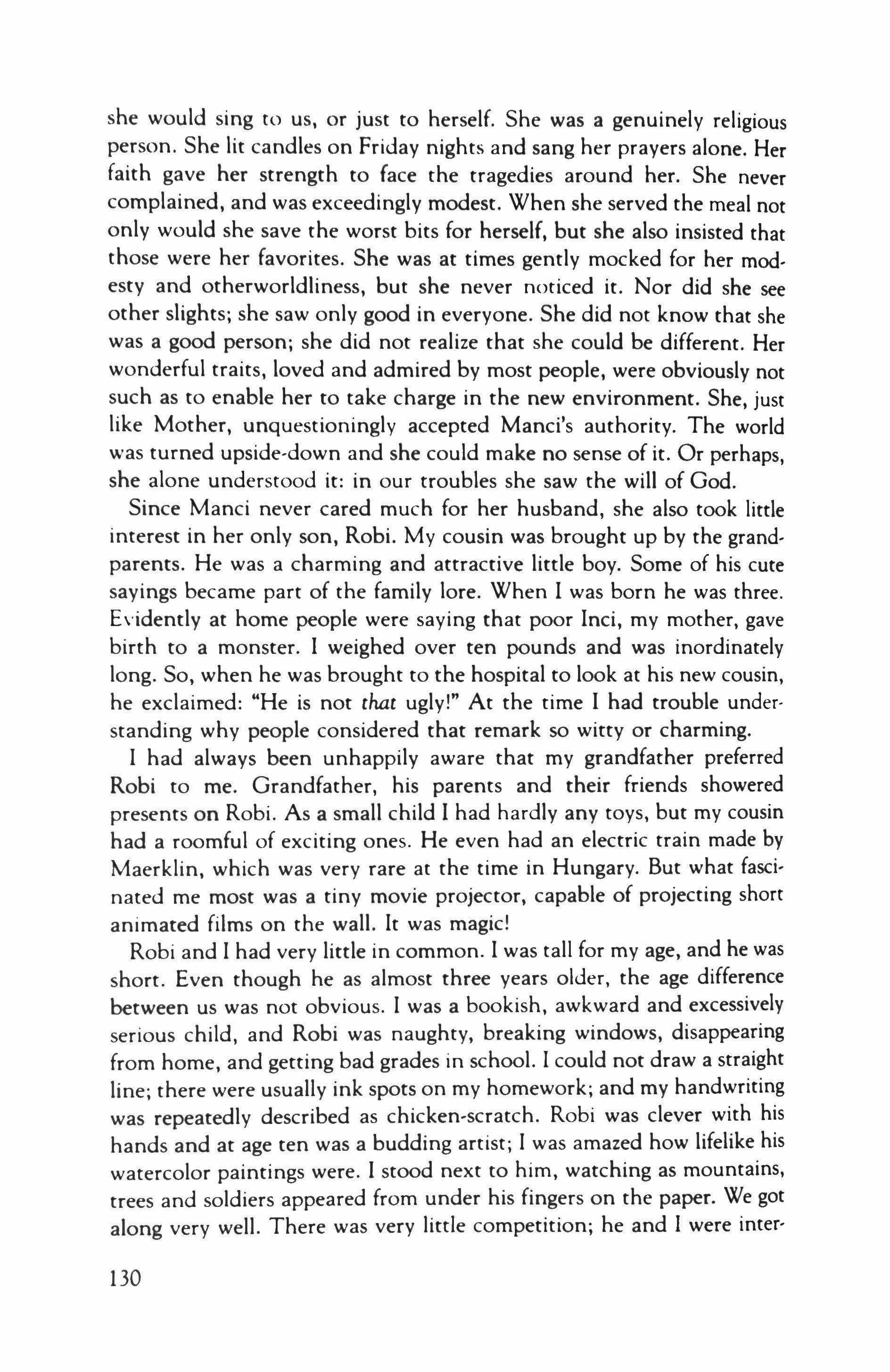
she would sing to us, or just to herself. She was a genuinely religious person. She lit candles on Friday nights and sang her prayers alone. Her faith gave her strength to face the tragedies around her. She never complained, and was exceedingly modest. When she served the meal not only would she save the worst bits for herself, but she also insisted that those were her favorites. She was at times gently mocked for her modesty and otherworldliness, but she never noticed it. Nor did she see other slights; she saw only good in everyone. She did not know that she was a good person; she did not realize that she could be different. Her wonderful traits, loved and admired by most people, were obviously not such as to enable her to take charge in the new environment. She, just like Mother, unquestioningly accepted Manci's authority. The world was turned upside-down and she could make no sense of it. Or perhaps, she alone understood it: in our troubles she saw the will of God.
Since Manci never cared much for her husband, she also took little interest in her only son, Robi. My cousin was brought up by the grandparents. He was a charming and attractive little boy. Some of his cute sayings became part of the family lore. When I was born he was three. Evidently at home people were saying that poor Inci, my mother, gave birth to a monster. I weighed over ten pounds and was inordinately long. So, when he was brought to the hospital to look at his new cousin, he exclaimed: "He is not that ugly!" At the time I had trouble understanding why people considered that remark so witty or charming.
I had always been unhappily aware that my grandfather preferred Robi to me. Grandfather, his parents and their friends showered presents on Robi. As a small child I had hardly any toys, but my cousin had a roomful of exciting ones. He even had an electric train made by Maerklin, which was very rare at the time in Hungary. But what fascinated me most was a tiny movie projector, capable of projecting short animated films on the wall. It was magic!
Robi and I had very little in common. I was tall for my age, and he was short. Even though he as almost three years older, the age difference between us was not obvious. I was a bookish, awkward and excessively serious child, and Robi was naughty, breaking windows, disappearing from home, and getting bad grades in school. I could not draw a straight line; there were usually ink spots on my homework; and my handwriting was repeatedly described as chicken-scratch. Robi was clever with his hands and at age ten was a budding artist; I was amazed how lifelike his watercolor paintings were. I stood next to him, watching as mountains, trees and soldiers appeared from under his fingers on the paper. We got along very well. There was very little competition; he and I were inter-
130
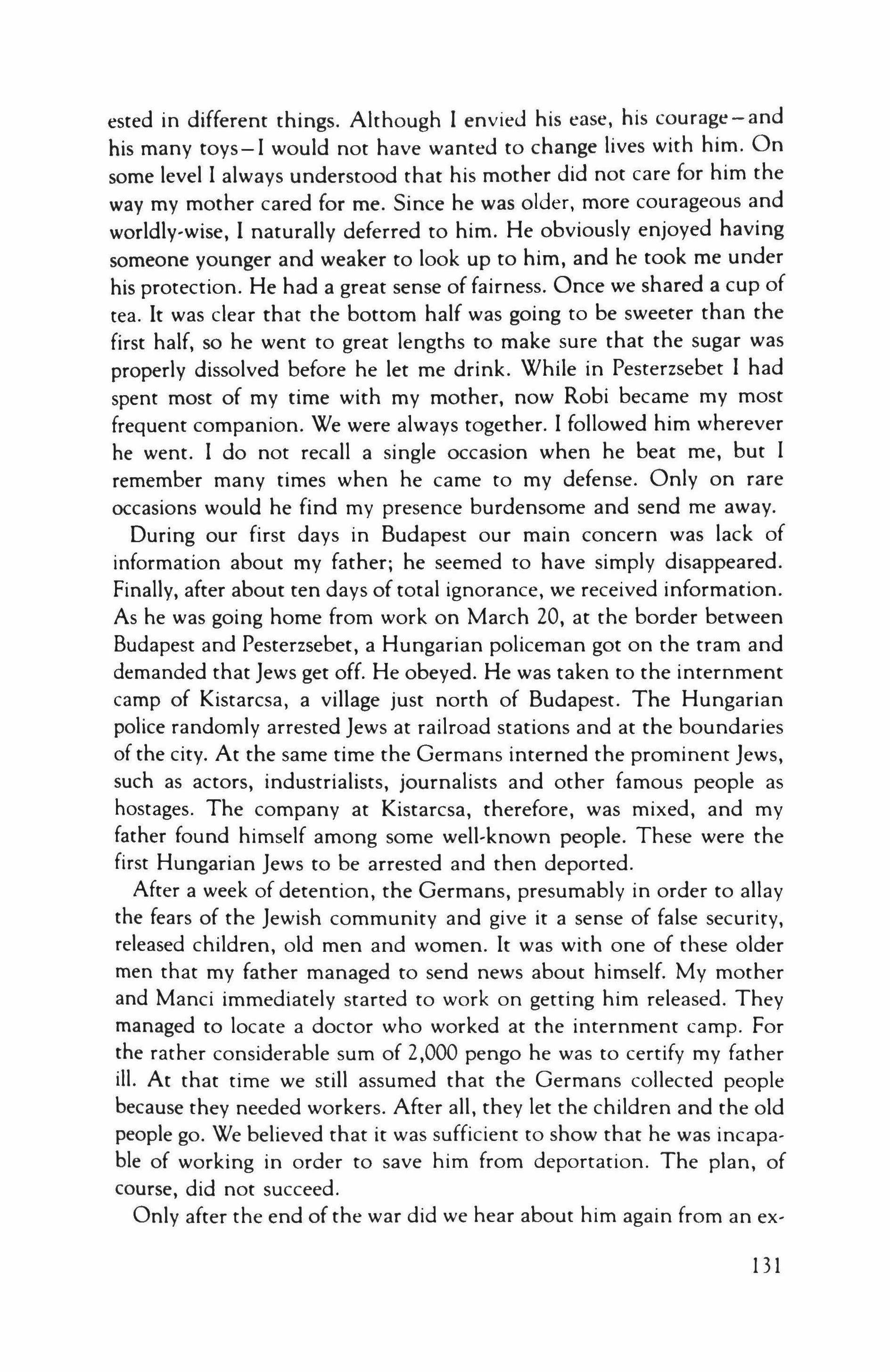
ested in different things. Although I envied his ease, his courage-and his many toys-I would not have wanted to change lives with him. On some level I always understood that his mother did not care for him the way my mother cared for me. Since he was older, more courageous and worldly-wise, I naturally deferred to him. He obviously enjoyed having someone younger and weaker to look up to him, and he took me under his protection. He had a great sense of fairness. Once we shared a cup of tea. It was clear that the bottom half was going to be sweeter than the first half, so he went to great lengths to make sure that the sugar was properly dissolved before he let me drink. While in Pesterzsebet I had spent most of my time with my mother, now Robi became my most frequent companion. We were always together. I followed him wherever he went. I do not recall a single occasion when he beat me, but I remember many times when he came to my defense. Only on rare occasions would he find my presence burdensome and send me away. During our first days in Budapest our main concern was lack of information about my father; he seemed to have simply disappeared. Finally, after about ten days of total ignorance, we received information. As he was going home from work on March 20, at the border between Budapest and Pesterzsebet, a Hungarian policeman got on the tram and demanded that Jews get off. He obeyed. He was taken to the internment camp of Kisrarcsa, a village just north of Budapest. The Hungarian police randomly arrested Jews at railroad stations and at the boundaries of the city. At the same time the Germans interned the prominent Jews, such as actors, industrialists, journalists and other famous people as hostages. The company at Kistarcsa, therefore, was mixed, and my father found himself among some well-known people. These were the first Hungarian Jews to be arrested and then deported.
After a week of detention, the Germans, presumably in order to allay the fears of the Jewish community and give it a sense of false security, released children, old men and women. It was with one of these older men that my father managed to send news about himself. My mother and Manci immediately started to work on getting him released. They managed to locate a doctor who worked at the internment camp. For the rather considerable sum of 2,000 pengo he was to certify my father ill. At that time we still assumed that the Germans collected people because they needed workers. After all, they let the children and the old people go. We believed that it was sufficient to show that he was incapable of working in order to save him from deportation. The plan, of course, did not succeed.
Only after the end of the war did we hear about him again from an ex-
131

inmate who returned. This man was Janos Vazsonyi, the son of a famous Jewish Hungarian minister of justice, and himself a prominent member of the parliament, who had for years fought against the ever-increasing anti-Semitic legislation. Vazsonyi and my father became friends. He told us that they had been deported from Kistarcsa to Auschwitz on April 28. They were among those who were selected for work. My father's strong constitution turned out to he an advantage in the competition for survival. He survived several months of labor, the closing of the Auschwitz camp, and was still alive in January 1945. At that time Vazsonyi was ill and was left behind. Those still capable of walking were taken further, and as Vazsonyi had heard, at the approach of the Allied troops, shot. Although Vazsonyi was able to return to Budapest, he was a very sick man and died within a few weeks of his return.
Learning about Father's deportation from Kistarcsa in the beginning of May, we did not understand that the deportation was almost the equivalent of a death sentence. We fully expected him to return. Nevertheless, Mother collapsed at receiving the news. I found her lving on her bed and crying uncontrollably. I had never seen her in such a state before. I silently stood at the foot of her bed, wanting to console her, but did not find words. It was not so much the loss of my father, which I only dimly understood, but the collapse of my mother which frightened me. Seeing her in this almost hysterical state convinced me that a tragedy had occurred. I also vaguely sensed that in this new world I could no longer count on that broken, hesitant and frightened woman who was my mother. In the course of the following months this understanding became clearer and clearer. I, who had always hid behind my mother's skirt and cried when she left me alone for a minute, would gradually learn to emancipate myself. Alas, it was a premature emancipation.
In Pesterzsebet a firm routine governed life. Now I badly missed the safe predictability. We could not settle down to a new routine, however, for a hostile outside world constantly intruded: the authorities imposed changes and ever-stricter limitations on us. I stopped going to school. Mother talked to my teacher on the telephone, and that decent woman expressed understanding and consoled her by saying that I was missing very little, and that later I would have no trouble making up what I lost. We all naively assumed that we were dealing with temporary inconveniences.
Gradually we came to be cut off from the outside world. The telephone was removed almost immediately, and later we had to give up our radio. Since Jews were not allowed to employ Christians in their house-
132

holds, Erzsi, the maid who had served my grandparents for more than a decade, had to be fired. As we were obliged to declare valuables in preparation to their confiscation, Erzsi, at my grandmother's encouragement, took with herself some of the family silver and porcelain. (After the war she returned to service and brought back everything.) My mother took over the cooking. From the 5th of April we were compelled to wear yellow stars. I remember the day so clearly, because it was my birthday. Someone joked that this was the Germans' present to me. (Mother gave me a book as a birthday present, writing in it "from father and mother," an inscription which I found very poignant. The book was, quite inappropriately under the circumstances, about the glorious victories of Hungarians against the dastardly Russians during the First World War.)
Grandmother became the manufacturer of yellow stars and she sewed them on our clothes. I, a painfully self-conscious child under the best of circumstances, believed that everyone was looking at me on the street. In any case, soon after the introduction of yellow stars, we were allowed to be on the streets for only a couple of hours a day. Getting out of the house seemed almost illicit. Budapest, or at least our district, was a brash, bustling and to me an infinitely exciting city. Nothing much had changed: the great bulk of the war damage would occur only during the siege. Life seemed the same as before: the streets were crowded and stores still had merchandise to sell. People ate ice cream and stood in line to go to movies. I looked on the world in the course of my occasional outing as if through a shopwindow. I was excluded and envious.
Our lives turned inward. More and more people came to live in our apartment. Allied bombing raids increased following the German occupation of the country, and the Hungarian authorities dealt with the homeless problem by evicting Jews from their apartments. The Nazis considered but rejected the idea of setting up a ghetto because they labored under the naive belief that concentrating the Jews at one place would expose the rest of the city to greater danger by Allied bombing. People tend to believe their own propaganda, however stupid that might be. The Allies, dominated by Jewish money, of course would spare their coreligionists, or so the silly reasoning went. The Nazi-dominated Hungarian government concentrated Jews in scattered houses around the city. Our building, with its large percentage of Jews, was one of these designated houses. A large yellow star against a black background was placed at the gate of our building. Except for the concierge and the janitor, who were Christians and decided to stay, from this time on there were only Jews left in the building. Kornyei, the concierge, was a
133

nice man, and we liked and trusted him. But we feared the janitor, who lived in a dingy apartment by the backstairs, which usually smelled of garbage. His son was a member of the Arrow Cross Party (Nvilas), the Hungarian Nazi organization. That young man lived among Jews, wearing his green shirt and Nazi armband.
Between April and June, five or six different families moved in with us. At the time when we were most crowded there were forty-two of us in the five-room apartment. The new people were mostly relatives: my grandmother's sister and her husband, Nusi neni and Lajcsi bacsi, the daughter of another sister of Grandmother, and my mother's nieces and cousins. The Weiners, lren neni, [eno bacsi and their children, Robi and their twenty-year-old daughter, Lili, were old family friends. It would have been impossible, under the circumstances, to provide everyone with a bed. We slept on the floor on mattresses and rugs. During the summer two people died: Lajos bacsi, my grandmother's brother-in-law, and the fraternal grandfather of Robi, Pinkas bacsi. We learned to take deaths in stride. Seeing dead bodies made less and less of an impression.
Aside from the dreadful crowding, and the complete lack of privacy, the material circumstances in which we lived were not yet horrendously bad. The ration cards given to Jews would not have provided us with enough food. However, although my dead grandfather's business had been "aryanized" - that is, taken over by a distant Christian relative-we continued to receive money at least until late summer. The accumulated wealth of decades also made life easier. Manci, through her friends and acquaintances, managed to exchange clothes for flour, lard and sugar, and we even had meat at times. When for the first time in the summer we had nothing to eat but bean soup, I was very upset. I understood that hard times were coming. Now we were poor.
I had never played as much with other children as during my first weeks in Budapest. There were more and more children in that large apartment house. Robi organized us into gangs. I was among the younger ones; I did not design the games, I just participated when I was allowed. On the ground floor of the building there was a small medicalsupply firm. From it we got hold of small ampules-whether these were spoiled and could not be used, or whether we just took good ones, I am not sure. Our silly game consisted of filling these ampules with water and then throwing them at each other in such a way as to break the glass and make the victim wer. Needless to say, the broken glass also produced cuts. We would run through the enormous building on the inside balconies and on the staircases up and down, making a lot of noise. We could not play indoors; there were simply too many people. IH
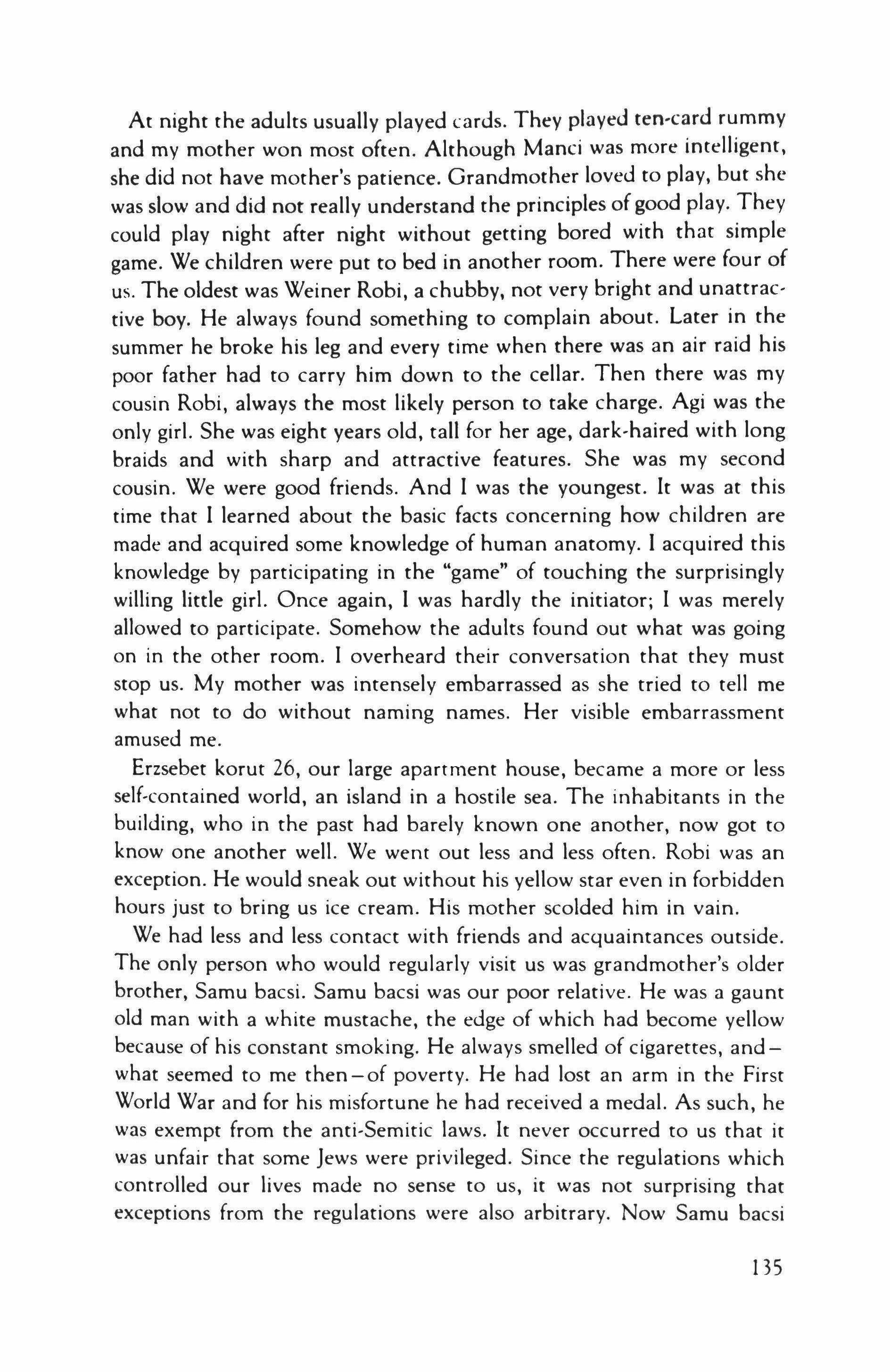
At night the adults usually played cards. They played ten-card rummy and my mother won most often. Although Manci was more intelligent, she did not have mother's patience. Grandmother loved to play, but she was slow and did not really understand the principles of good play. They could play night after night without getting bored with that simple game. We children were put to bed in another room. There were four of us. The oldest was Weiner Robi, a chubby, not very bright and unattractive boy. He always found something to complain about. Later in the summer he broke his leg and every time when there was an air raid his poor father had to carry him down to the cellar. Then there was my cousin Robi, always the most likely person to take charge. Agi was the only girl. She was eight years old, tall for her age, dark-haired with long braids and with sharp and attractive features. She was my second cousin. We were good friends. And I was the youngest. It was at this time that I learned about the basic facts concerning how children are made and acquired some knowledge of human anatomy. I acquired this knowledge by participating in the "game" of touching the surprisingly willing little girl. Once again, I was hardly the initiator; I was merely allowed to participate. Somehow the adults found out what was going on in the other room. I overheard their conversation that they must stop us. My mother was intensely embarrassed as she tried to tell me what not to do without naming names. Her visible embarrassment amused me.
Erzsebet korut 26, our large apartment house, became a more or less self-contained world, an island in a hostile sea. The inhabitants in the building, who in the past had barely known one another, now got to know one another well. We went out less and less often. Robi was an exception. He would sneak out without his yellow star even in forbidden hours just to bring us ice cream. His mother scolded him in vain. We had less and less contact with friends and acquaintances outside. The only person who would regularly visit us was grandmother's older brother, Samu bacsi. Samu bacsi was our poor relative. He was a gaunt old man with a white mustache, the edge of which had become yellow because of his constant smoking. He always smelled of cigarettes, andwhat seemed to me then -of poverty. He had lost an arm in the First World War and for his misfortune he had received a medal. As such, he was exempt from the anti-Semitic laws. It never occurred to us that it was unfair that some Jews were privileged. Since the regulations which controlled our lives made no sense to us, it was not surprising that exceptions from the regulations were also arbitrary. Now Samu bacsi
135

became our benefactor: periodically he brought us food. I -uspect that in a part of his mind he enjoyed the reversal of fortunes.
I still felt lonely, very different from others, and was convinced that if people (Quid look inside me they would see the difference. At the same time I felt closer to the children in the building than I had ever felt before to other children. It was at this time that I became a more or less socialized being and learned to share. The common threat to life was an obvious bond. Considering our lack of privacy, our fears and misery, it is remarkable how little the adults or even we, children, quarreled.
Our lives were punctuated by moments of terror. Among these, air raids were the least frightening. They became more and more frequent and took place during daylight, but occurred more frequently at night. At the sound of the sirens we went down to the common air-raid shelter in the cellar. I was a very good sleeper and the siren did not always wake me. As a seven-year-old, I was too heavy to be carried by my mother. She would half waken me, hold my hand and mutter into my ean''Step, step" - and this way I would go four floors down to the cellar, and there continued to sleep. Sometimes the next morning I did not even realize that I had been in the cellar during the night.
The Allies bombed the gasworks at the outskirts of the city. Although these were some kilometers away from us, the entire sky was ablaze for hours. I thought that the fire was very beautiful and exciting. I clearly understood that this was bad for the Germans and consequently it was good for us. I always knew that the airplanes which were bombing us were on our side. During a night raid the building across the street from us was hit. On the ground floor there had been a large furniture store, and perhaps because of that the entire building was gutted. We came up from the cellar to watch. The fire was so near that we could feel the heat on our skins. The yellow flames reached high in the sky. Sparks flew everywhere. Walls collapsed with deafening noise. I was frightened and enthralled. My mother could hardly pull me away.
More frightening than air raids were demonstrations by the Hungarian Nazis, the Nvilases. They marched in green shirts in front of our house, shouting "Zsido mentes hazat! [Jew-free fatherland']" On occasion they marched at night carrying torches, which was particularly sinister. I saw a march, or even a crowd gathered somewhere, as something inherently hostile and dangerous. We felt exposed and utterly defenseless. Seeing so many people brought together by a common hatred of us was terrifying. These marchers, mostly young men, were my enemies. The Germans were remote, and I saw them rarely. They represented an abstract evil. The Hungarian Nazis, hy contrast, I perceived as people
136
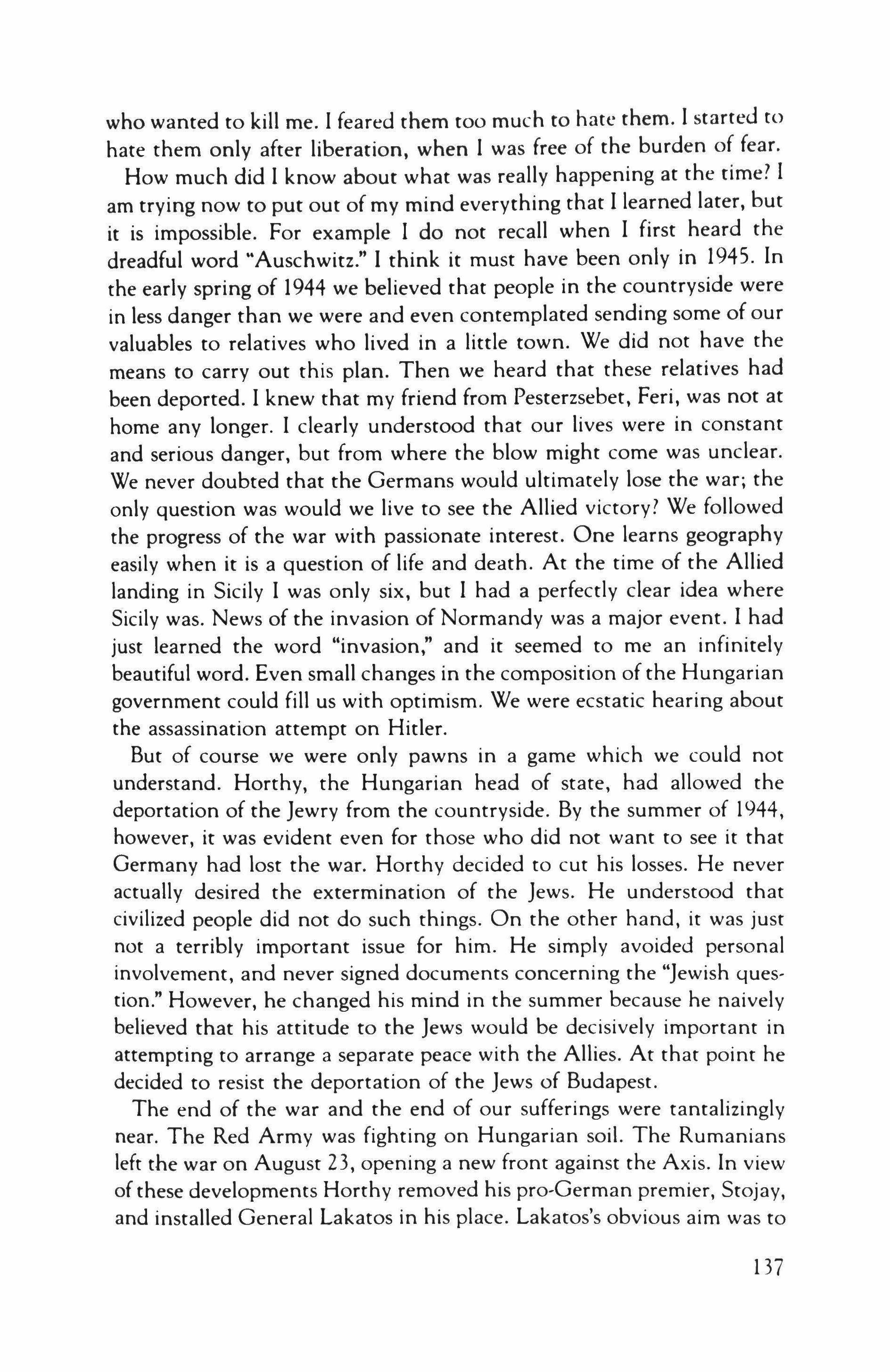
who wanted to kill me. I feared them too much to hate them. I started to hate them only after liberation, when I was free of the burden of fear.
How much did I know about what was really happening at the time? I am trying now to put out of my mind everything that I learned later, but it is impossible. For example I do not recall when I first heard the dreadful word "Auschwitz." I think it must have been only in 1945. In the early spring of 1944 we believed that people in the countryside were in less danger than we were and even contemplated sending some of our valuables to relatives who lived in a little town. We did not have the means to carry out this plan. Then we heard that these relatives had been deported. I knew that my friend from Pesterzsebet, Feri, was not at home any longer. I clearly understood that our lives were in constant and serious danger, but from where the blow might come was unclear. We never doubted that the Germans would ultimately lose the war; the only question was would we live to see the Allied victory? We followed the progress of the war with passionate interest. One learns geography easily when it is a question of life and death. At the time of the Allied landing in Sicily I was only six, but I had a perfectly clear idea where Sicily was. News of the invasion of Normandy was a major event. I had just learned the word "invasion," and it seemed to me an infinitely beautiful word. Even small changes in the composition of the Hungarian government could fill us with optimism. We were ecstatic hearing about the assassination attempt on Hitler.
But of course we were only pawns in a game which we could not understand. Horthv, the Hungarian head of state, had allowed the deportation of the Jewry from the countryside. By the summer of 1944, however, it was evident even for those who did not want to see it that Germany had lost the war. Horthv decided to cut his losses. He never actually desired the extermination of the Jews. He understood that civilized people did not do such things. On the other hand, it was just not a terribly important issue for him. He simply avoided personal involvement, and never signed documents concerning the "Jewish question." However, he changed his mind in the summer because he naively believed that his attitude to the Jews would be decisively important in attempting to arrange a separate peace with the Allies. At that point he decided to resist the deportation of the Jews of Budapest.
The end of the war and the end of our sufferings were tantalizingly near. The Red Army was fighting on Hungarian soil. The Rumanians left the war on August 23, opening a new front against the Axis. In view of these developments Horrhv removed his pro-German premier, Srojav, and installed General Lakatos in his place. Lakatos's obvious aim was to
137
find a way to sign a separate peace with the Allies. He eased restrictions on Jews and made it dear that deportations would not be renewed and that the Jews of Budapest would survive. But German troops were still in Hungary and the Nvilas enjoyed German protection.
We lived in wildly fluctuating moods of terror and often quickly fading optimism. At times we were convinced that the worst had to be behind us, and that the most recently imposed restrictions on us had to be the last and that nothing worse could happen. At other times we expected to be killed, and feared even a knock on the door. We had no way of distinguishing between dark rumor and genuine news. The changing moods of despair and hope took a heavy toll on us, and on me in particular. One night I dreamt that I was back in Pesterzsebet and that my father was at home and playing with me. On awakening I contemplated that the dream life must have been real, and what was going on around me now was in fact a dream that surely would soon pass.

October IS, 1944, was a major turning point in Hungarian history. Horthv with his customary ineptness attempted to get out of the war and betray his ferocious German allies. The Germans, forewarned, responded by carrying out a countercoup: they arrested Horthy and his closest aides and installed in his place the Hungarian Nazis, headed by the Nvilas leader, Ferenc Szalasi. The deeply conservative, semi-feudal regime ceased to exist; the radical right assumed power and the country was engulfed in anarchy. The nominal government was made up by murderous lunatics. One of the last acts of that government, in April 1945, when its authority extended no farther than the room in which the "ministers" sat, was to change the names of those streets that had been named after Jews.
We, the Jews of Budapest, enjoyed a few hours of euphoria on October 15, for it seemed that we had survived the ordeal. The despair which soon set in was all the greater. When the Jews from the countryside in the spring of 1944 were taken to their deaths, we had only vague ideas about what was happening to them; and while we understood that we were in danger, that danger seemed somewhat distant and vague. Now that changed. The following three months had a nightmarish quality: any of us could be killed at any moment. The threat to our lives became palpable: we constantly heard of friends and acquaintances who were
3
138

taken to the bank of the Danube and shot. We lived in a state of vicious anarchy, in which sadists and murderers could live out their fantasies without fear of retribution.
The first act of the new government was to forbid us to leave our buildings for any reason. Then a few days later, around five o'clock in the afternoon, four or five Nvilases appeared in our building, called everyone to the balconies by ringing a bell, and announced that everyone, without exception, young and old, sick and healthy, was to gather in the yard in half an hour. The entire building was to be emptied. We discussed the idea of not going and remaining behind in hiding, but rejected it as impractical. Manci then considered whether it would be better to take some jewelry with us or to hide everything in the apartment. I think we chose to take some and hide the rest. Within an hour everyone from all the apartments in fact appeared. We were ready to march. The day we had feared so much had arrived.
The Nvilases were herding us. A poor elderly woman who had lived by herself on the fifth floor, Nagy neni, was walking behind me. As we came out to the street, a small crowd gathered around us. A young man stepped forward and threw red pepper into Nagy neni's face, which temporarily blinded her. I remember the gleeful expression on his face. He did not choose his victim; anyone defenseless and abused would have sufficed. I have often wondered about that man. Did he bring red pepper with himself in order to be prepared, or did he just happen to have it with him and was suddenly overcome with a sense of unpremeditated hatred? Most likely he survived the war; did he then recall his own contribution to the "solution of the Jewish question"? Or did he forget the entire affair? If he remembered, what did he think of himself? I would so much like to know. Up to that afternoon evil to me was something abstract: the government passed cruel laws and Hungarian and German Nazis threatened our lives for reasons I could not understand. Even the Nvilas marchers were faceless enemies. However, the viciousness of that young man was something different: it was one human being causing intentional harm to another.
The Jews were collected from the entire district; there were thousands of us. We marched down Erzsebet korut, in the middle of the road, toward Rakoczy ut. We walked slowly, stopping occasionally. When I remember this scene, I think of the famous picture from the Warsaw ghetto in which a little boy of my age walks with his hands high, obviously frightened. Was that the way I looked? I certainly was frightened. I held my mother's hand and nagged her with my questions. I craved assurance:
139

"Anvu, where are we going?"
"Anyu, where are they taking us?"
Needless to say, she had no answers. I am sure that many people in the crowd silently sympathized with us, and saw us for what we were, a bunch of pitiful, frightened human beings, no better and no worse than anyone else. But that was not the way it seemed to me then. I saw only hatred and hostility. I thought that everyone wanted our deaths; there was no escape.
We marched down Rakoczy ut, toward the eastern railroad station. We reached Aggreleki utca and turned toward Tisza Kalman Ter. At that point we heard submachine-gun fire. Both my mother and I thought that now we would be massacred. We said goodbye to one another, and quietly waited for our turn. But we were not killed. It soon became evident that the Nvilases were just playing with us. We were herded together in that large square and then just made to wait. After an hour or so, we marched again. We turned around and marched back in the same direction. We were taken to the synagogue in Dohany utca and locked up.
This synagogue is the largest in Eastern Europe. It was built in the nineteenth century, at a time when the Jewish community of Budapest was prosperous and wanted to express its faith in the future by financing the construction of a sumptuous building. Now it became our prison. Manci, Robi, Mother and I were sitting in the balcony. I was tired from the walk, and even more from fear and excitement. I soon fell asleep sitting on the hard bench and putting my head on my mother's lap. Nothing happened that day or the next; we just waited without knowing for what. Robi ran around. He went downstairs and struck up friendships, but I did not feel like following him. At one point Jewish men brought us soup in large containers. I felt the restraint and the boredom so much that they were like physical pain. We had nothing to do but talk. My mother and Manci expressed diametrically different points of view. Mother believed that this was to be the end; we were going to be killed. Manci was saying that somehow everything would turn out well. We were meant to survive and that liberation was near. Mother was a broken woman and she looked like one; Manci was the same as ever. The spark in her eyes was still there. She smiled and I loved her for it. I was passionately on her side. Unexpectedly, two days after we were locked up, the doors opened and we were allowed to go out into that balmy autumn evening.
Even in retrospect I do not know what the Nazis intended to do with us. I know that we were released as a consequence of the protests of the
140
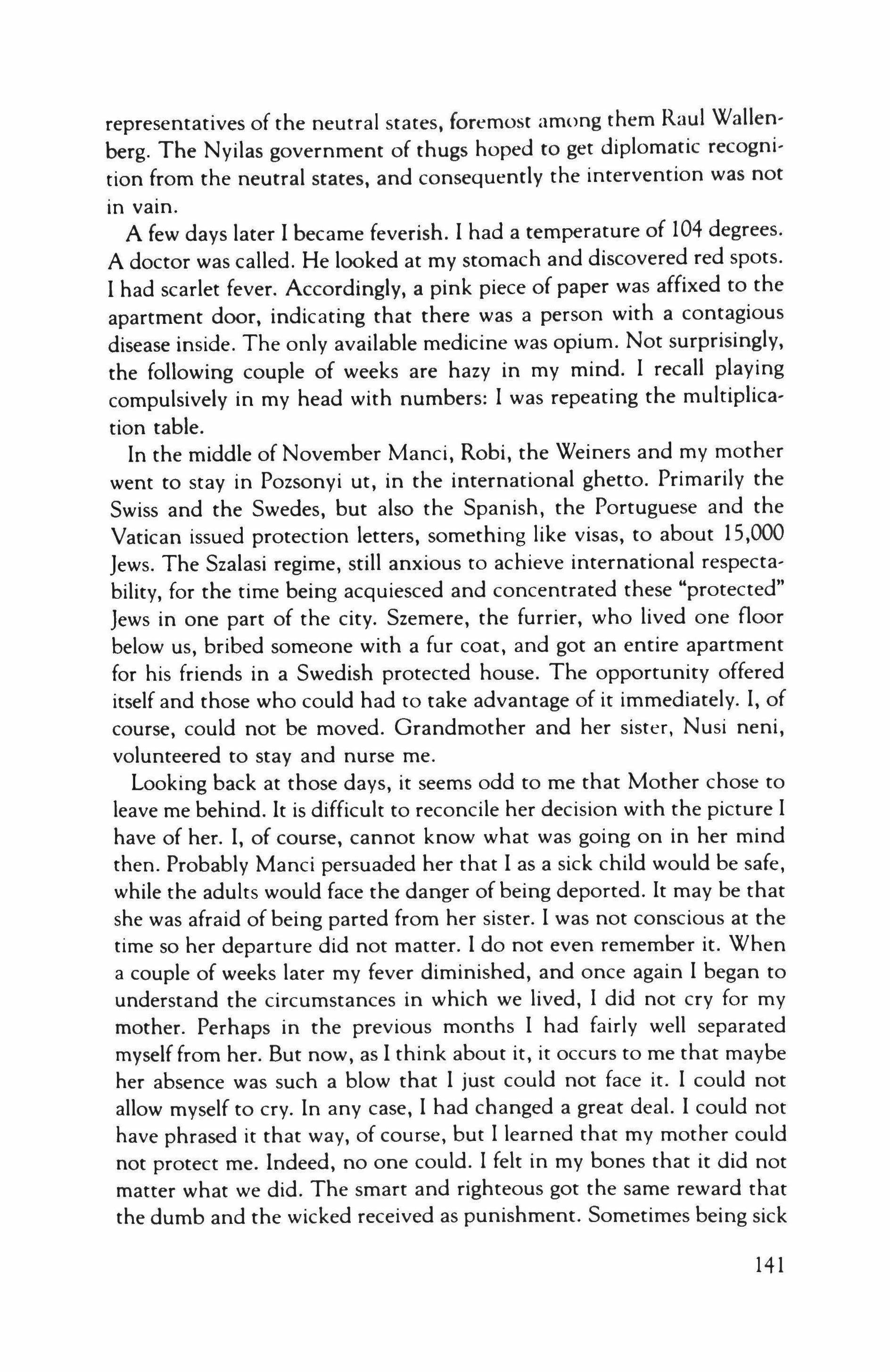
representatives of the neutral states, foremost among them Raul Wallenberg. The Nvilas government of thugs hoped to get diplomatic recognition from the neutral states, and consequently the intervention was not in vain.
A few days later I became feverish. I had a temperature of 104 degrees. A doctor was called. He looked at my stomach and discovered red spots. I had scarlet fever. Accordingly, a pink piece of paper was affixed to the apartment door, indicating that there was a person with a contagious disease inside. The only available medicine was opium. Not surprisingly, the following couple of weeks are hazy in my mind. I recall playing compulsively in my head with numbers: I was repeating the multiplication table.
In the middle of November Manci, Robi, the Weiners and my mother went to stay in Pozsonyi ut, in the international ghetto. Primarily the Swiss and the Swedes, but also the Spanish, the Portuguese and the Vatican issued protection letters, something like visas, to about 15,000 Jews. The Szalasi regime, still anxious to achieve international respectability, for the time being acquiesced and concentrated these "protected" Jews in one part of the city. Szemere, the furrier, who lived one floor below us, bribed someone with a fur coat, and got an entire apartment for his friends in a Swedish protected house. The opportunity offered itself and those who could had to take advantage of it immediately. I, of course, could not be moved. Grandmother and her sister, Nusi neni, volunteered to stay and nurse me.
Looking back at those days, it seems odd to me that Mother chose to leave me behind. It is difficult to reconcile her decision with the picture I have of her. I, of course, cannot know what was going on in her mind then. Probably Manci persuaded her that I as a sick child would be safe, while the adults would face the danger of being deported. It may be that she was afraid of being parted from her sister. I was not conscious at the time so her departure did not matter. I do not even remember it. When a couple of weeks later my fever diminished, and once again I began to understand the circumstances in which we lived, I did not cry for my mother. Perhaps in the previous months I had fairly well separated myself from her. But now, as I think about it, it occurs to me that maybe her absence was such a blow that I just could not face it. I could not allow myself to cry. In any case, I had changed a great deal. I could not have phrased it that way, of course, but I learned that my mother could not protect me. Indeed, no one could. I felt in my bones that it did not matter what we did. The smart and righteous got the same reward that the dumb and the wicked received as punishment. Sometimes being sick
141
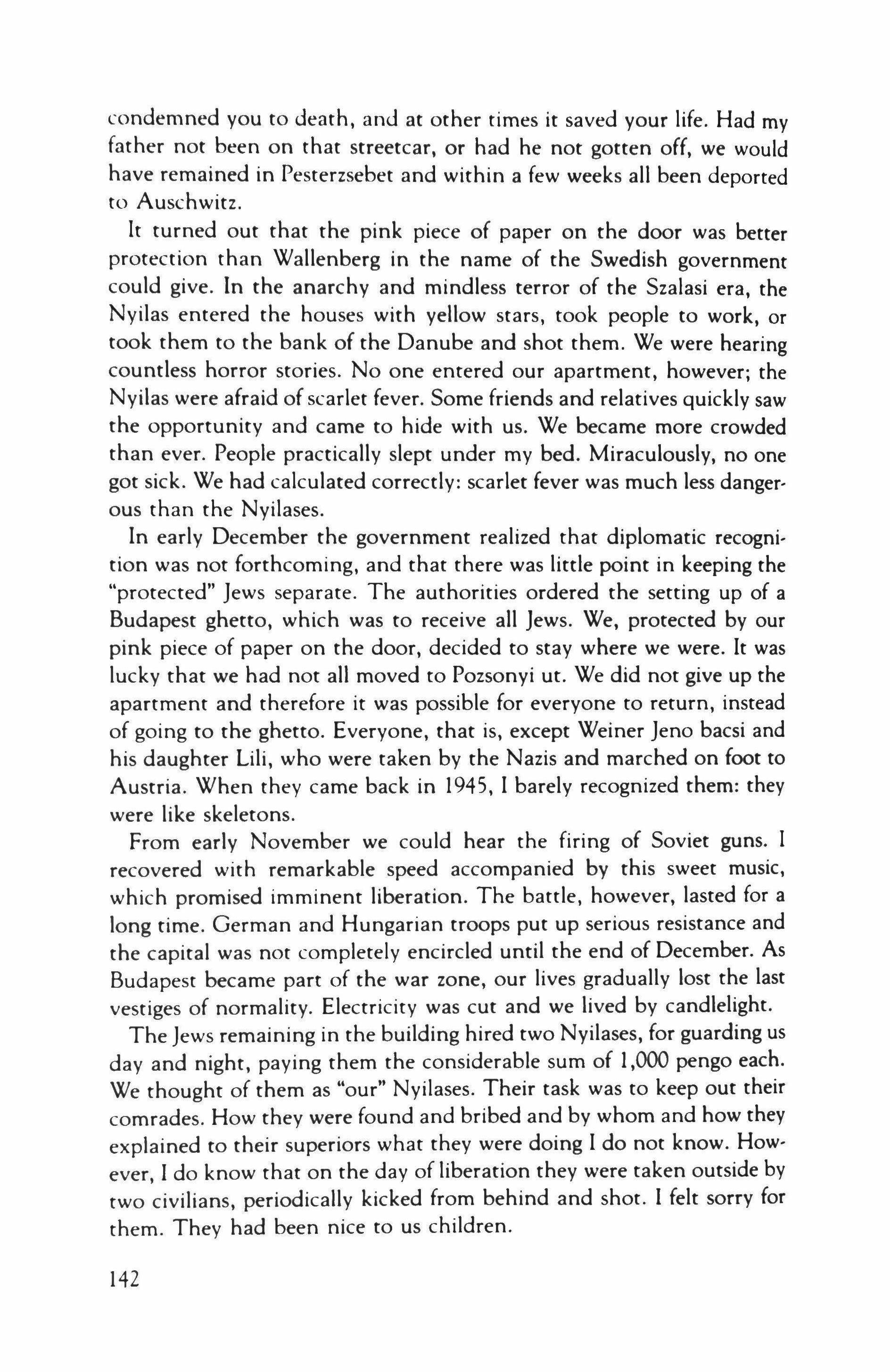
condemned you to death, and at other times it saved your life. Had my father not been on that streetcar, or had he not gotten off, we would have remained in Pesterzsebet and within a few weeks all been deported to Auschwitz.
It turned out that the pink piece of paper on the door was better protection than Wallenberg in the name of the Swedish government could give. In the anarchy and mindless terror of the Szalasi era, the Nvilas entered the houses with yellow stars, took people to work, or took them to the bank of the Danube and shot them. We were hearing countless horror stories. No one entered our apartment, however; the Nyilas were afraid of scarlet fever. Some friends and relatives quickly saw the opportunity and came to hide with us. We became more crowded than ever. People practically slept under my bed. Miraculously, no one got sick. We had calculated correctly: scarlet fever was much less dangerous than the Nvilases.
In early December the government realized that diplomatic recognition was not forthcoming, and that there was little point in keeping the "protected" Jews separate. The authorities ordered the setting up of a Budapest ghetto, which was to receive all Jews. We, protected by our pink piece of paper on the door, decided to stay where we were. It was lucky that we had not all moved to Pozsonyi ut, We did not give up the apartment and therefore it was possible for everyone to return, instead of going to the ghetto. Everyone, that is, except Weiner [eno bacsi and his daughter Lili, who were taken by the Nazis and marched on foot to Austria. When they came back in 1945, I barely recognized them: they were like skeletons.
From early November we could hear the firing of Soviet guns. I recovered with remarkable speed accompanied by this sweet music, which promised imminent liberation. The battle, however, lasted for a long time. German and Hungarian troops put up serious resistance and the capital was not completely encircled until the end of December. As Budapest became part of the war zone, our lives gradually lost the last vestiges of normality. Electricity was cut and we lived by candlelight.
The Jews remaining in the building hired two Nvilases, for guarding us day and night, paying them the considerable sum of 1,000 pengo each. We thought of them as "our" Nvilases, Their task was to keep out their comrades. How they were found and bribed and by whom and how they explained to their superiors what they were doing I do not know. However, I do know that on the day of liberation they were taken outside by two civilians, periodically kicked from behind and shot. I felt sorry for them. They had been nice to us children.
142

The army took over the first two floors of our building and made it into a field hospital. So I, a sick child, suddenly found myself in a hospital without ever moving. Our air-raid shelter became an operating room. I doubt that the doctors practiced much modern medical science. The most valuable instrument in the hands of the surgeons was the saw: the doctors spent most of their time removing bullets and sawing off arms and legs. The makeshift operating room was not far from our little cellar and so we could hear the groans. Later on, when there was no possibility of burying corpses, dead bodies and arms and legs accumulated in the yard. Luckily for us, it was a cold winter and the bodies quickly froze and then were covered with snow.
The consequence of the establishment of the hospital was that we could no longer use the air-raid shelter. Since we now had to protect ourselves not only from air raids but also from bombardment, we had to spend more and more time in the cellar. We had a small coal cellar and gradually that tiny wooden enclosure became our permanent home. The place, of course, was unheated, but our bodies lying close to one another kept it reasonably warm. We put rugs on the top of the coal and slept fully dressed. We were dirty. I was disgusted when my mother first discovered lice in my hair. During daytime a bit of light penetrated through the corridor, but it was winter and the days were short. We had some candles left, but had to economize, and so most of the time we lived in the dark. I hated and feared that darkness; it reminded me of death.
Now we had little food. In November, with the help of intermediaries, it was still possible to exchange valuables for food. During the last four weeks for so, however, there was no food coming in. Once in a while we got some thin but warm soup from the hospital's kitchen. Luckily, our building had had a grocery store. The supplies of the store had been looted long before, and nothing remained there but a seemingly endless supply of beets and onions. I fondly remember the taste and smell of roasted onions. The supply of onions did not turn out to be endless, for we ran out of them a couple of weeks before liberation. But we always had beets. I have always hated beets. In the last few days we did not even have water. The building next to us had been bombed and burned to the ground and so the pipes were cut. We had to go for water underground, from cellar to cellar, through several buildings.
Oddly perhaps, 1944 was the first time that I ever celebrated Christmas. The Christian concierge, Kornyei, never left his apartment during the upheaval. He had a son who was perhaps half a year younger than I was. The boy, Feri, asked me and a couple of other children to come to
143

their house at early evening. There was a lull in the fighting: maybe the soldiers were also celebrating. This was the first time that I saw the inside of their apartment. Considering the circumstances, it was reasonably orderly; it seemed like an oasis of peace. We got something to eat. I almost felt the spirit of Christmas. Unlike in school a year earlier, I felt neither alien nor hostile at this exhibition of Christianity; there was no question about my being an impostor. My [ewishness under the circumstances was all too obvious.
We also celebrated New Year's. We went upstairs into our deserted, cold and dark apartment, and lit the wood stove in the kitchen. Not a single windowpane remained intact. A shrapnel fragment had made a hole in our living-room wall. Nusi neni opened her green wooden treasure box. She had always been like a pack rat: loved to collect things. She also loved to give; it gave her a feeling of superiority. She was proud of herself. We had no idea that she was still hiding little bits of sugar and also egg substitute, which looked and tasted like brick dust. We were cheerful. We knew that next year was bound to be better. Mother herself would not dispute it. We talked about what the world would look like after the end of the war. Even Manci thought that it would take a very long time to reconstruct a normal life.
One late afternoon in early January we went upstairs to boil beets. Darkness seemed safer than daylight, though I doubt that in fact it was. Robi and I went to help our mothers and bring down the food. I was glad to get out of the dark cellar. We heard the dull loud sound of bombardment as we were feeling our way up the broad and dark staircase. We thought, most likely incorrectly, that the battle outside protected us. Perhaps now the Nazis had other things to worry about than how to kill as many of us as quickly as possible. In retrospect we know that the shooting of Jews did not stop until the very end. As we were bringing down the food a small tragedy occurred: I slipped on something in the yard, fell, and we lost some of the beets. First I thought it must have been a rock, but it turned out that it was a frozen human arm, covered with snow, which made me fall. In the darkness I recognized the outstretched fingers. I was not horrified. That bodily part was so much divested from its humanity that it ceased to be frightening. It was hardly more than a rock.
Needless to say, we had no clear ideas about the progress of the fighting. All we knew was that we constantly heard bombardment, and the firing seemed to get closer and closer. Progress was exasperatingly slow. And so the end came, very much anticipated and yet a little surprising. January 17 was a gray and rather cold day. Early in the
144

morning some of my friends and I went from the cellar to our apartment. I do not know what possessed us to want to go and look at that particular time. We looked out the window: it was quiet and the street deserted. Then I saw two Nvilases come out from the building across the street with their rifles. A little later I saw a single Russian soldier appear from behind the corner. He had a submachine gun. I noticed the Russian before the Nvilases did. I heard firing, and did not wait to see the results, but ran down with the other boys, shouting:
"It vannak az oroszok! [The Russians are herel]" Within minutes Russians appeared in our building. I loved them. I loved them so much that after the passage of many years, after learning a great deal about them, I still feel the residue of that love. On that morning I felt as I had often felt after a long and bitter cry, a feeling of wonderful relief. I knew I was going to live.
My cousin Robi, with whom I discussed these matters not long ago, remembers the affair differently. He says that on that day it was my responsibility to bring up the chamber pot from the cellar. He says that it was he who shouted that the Russians had arrived, and that at that point I just dropped the chamber pot and ran with him upstairs to look at our liberators.
145
Not a Beautiful Picture: On Robert Frank
w. s. t» Piero

On his transatlantic journey in 1947 - he was twenty-three when he emigrated from Switzerland to the United States-Robert Frank photographed an overhead view of a male figure leaning over the ship's stern. I The marbled wake looks like earth's swirling land and ocean masses now familiar to us from satellite photos, but it also has a pounded silvery murkiness, the sea-foam resembling macerated ore. The depth of the image is so compressed that the man seems to be standing before a wildly painted backdrop. An artist's images may remain mysterious even while they instruct us in how they ought to be seen and felt. That image of thecrossing is mysterious and instructive because it is a stilled configuration of the massive turmoil of the consciousness of the mind confronting a natural metaphor of the consciousness in which we all swim. We do not experience consciousness as a sequence of thoughts or moments. No one instant can be separated out or known apart from the whole forceful pitch of mental activity, of what comes before and after, or of what we imagine came before and might come after. But photography can represent what we want (and need) to recognize as a moment experienced in time. Frank's work is singular because, by exercising different styles of attention, he not only separates out the moment lived by his subject but he also braids it into its penumbral streak of time passed and passing. One of those styles is evident in his photo of a Detroit drive-in movie, made ten years after his arrival in America. The figures draped across the big screen, vague and granular in the twilight, comprise a stilled moment picked from the narrative that consciousness uses to represent to itself certain patterns of human action. The screen image, as Frank envisions it for us, has a decorative aloofness. The ranked pods of cars beneath it are receivers, little housings for motion-picture lore. Between
146

the screen and cars there exists an intimate confrontational relation. The viewers-those, at least, who are bothering to watch the show-are folding back into their story hoard the patterns acted out above their heads. Frank's station, his angle of attention, is a witness's half-step backward, at the margin of the relation, shaping its tonal blend of melancholy and expectation. But the image is just as decisively shaped by an alertness that cants the artist toward his little world of fact. Slightly estranged from the scene, Frank is at the same time at the threshold of a crossing into the scene.
Frank has enacted that powerful mixed predisposition again and again as his work has progressed. If "progressed" is even the right word. For his work in still photography has not matured or developed along formal lines. He began as a finished artist who moved not through formalist stages of development, but from subject to subject, from one style of attention to another. The ambitious pursuit of formal discoveries that Edward Weston conducted has never been important to him. And yet no other photographer so casually combines quick instincts with formal awe, or possesses a preparedness for the revelatory pattern in a given scene so natural and primed that it is indistinguishable from mere reflex. His work represents, in individual pictures and as an adventure, the crossover state where material being is at once a spiritual consistency; it records, and claims as its most frequent subject, consciousness caught in the act of migration from the inner to the outer.
In "Macy's Parade, New York" (1948) the bulbous ethereal trapeze artist hangs from its balloon, and beneath it swells the darkly corrugated lower rim of the frame. The image is scrubbed of illusionist depth. The tilted, wedge-shaped buildings with their cheesecloth textures are fuzzy backdrops against which the circus figure seems printed. All that familiar solidity, the steel and granite stabilities, is dematerialized in process of transformation to the floating giant's state of helpless weightlessness. It is an image of world-stuff as we sometimes feel it-as momentarily condensed vapors. Frank practices a rather different style of attention when he collapses depth not to deplete the image of materiality but to laminate and impact it. In "White Tower, l+th Street, New York" (1949), for instance, the image is pressured forward with the joyful urgency of selfoffering or appeasement. In such a picture, the display of its contents is an act of moral intensification, physically enacted in the all-over immediacy of the image. Six young women sit at a window counter facing out at us from the frame of the White Tower window. Five of them-they would be "office girls" - are smoking. Around the head of the central figure, whose mouth blooms with smoke like the old Times Square
147

Camel billboard, bursts an array of signs: "Pie 15ft," "Beans IO«," "Hot Soup 20ft." The prices, the smoking, the costumes, recorded less than half a century ago, have the kind of archival shock that reminds us of the velocity of change in American society. (Only twenty-five years after pie cost 15� Frank would film a documentary of a Rolling Stones tour, called Cocksucker Blues.) But the archival reach of Frank's career-that which is most available, most given, to any straight photographer-is its least interesting quality. Pressed behind the office girls, backs turned, are men sitting at the counter, wearing felt hats. The wall clock reads 5:25. The girls are having their after-work coffee. Like most of Frank's images, this one preserves American facts, especially facts related to ritual celebrations. But what makes it formally compelling is the way all the bundles of facts congest the foreplane, the "front wall," of the picture. Frank refuses to allow for a more discriminating, and therefore more accommodating, clarity of illusionist depth. All the materials occupy a heraldic foreground. Even the background food cases, which ought to suggest depth, are pasted over the front of the image as if it were a transparency. More than just a documentary image of overlapping social and economic zones, "White Tower" is an image of momentary intimacies and the precious spaces that define those intimacies-among the girls, among the men, between the counterman and his customers-and which require social crossings. And the girls, who are having such a great time, look out into the imagined distance that separates their reality in the image life from us. It's the look, and the distance, that we see in "Canal Street-New Orleans" (1955), from The Americans, where the front of the image, engorged with the different races and ages hurrying along the sidewalk, is broken up by the stare of a young man standing tallest in the composition yet almost concealed behind the others. Looking into that distance, out at us, he is the courier of consciousness from the image life to our own, and he triggers a nostalgia that inheres in a lot of straight photography, as it represents things or places or persons which at some time have been the mind's home and are lost or far away. That look, from the girls, from the young New Orleans man, is a call to another existence which, even while it carries the full charge of consciousness, does not change.
Photography is an act of visitation. It does not engulf and master reality with a made form-language, as painting does. The visitations conducted in Frank's images are invariably polite, wary and unstoppably inquisitive. In the late 1940's and early 1950's, while earning a decent living as a fashion photographer for Harper's Bazaar and other magazines, he spent his off-hours taking photographs of street life in New
148

York and in the European and Latin American countries he visited during that time. The attention in many of those pictures-as in the "White Tower" and "Macy's Parade" pictures-is pressurized by the fugitive circumstances in which they were made. They already showed the manners of a migrant or transient who must depend on the disclosures and presentations of strangers; but the manners are also shaped by hunger, and that brings with it an almost rude pertinacity. When he received a Guggenheim Fellowship in 1955 (it was renewed the following year) Frank was able to cut loose for a while from his commercial work, and the product of those two years was The Americans, first published in France and later criticized by several American reviewers as a vicious, distorted, unjustifiably bleak portrait of American culture. Frank's ambition to move through the different levels of American life, to visit not only marginal social groups but also more stable and prosperous communities, with special concentration on politically charged scenes, brought him into natural affinity with Beat writers. His images have the breakneck rush into the random offerings of circumstance that we hear in the poetry Allen Ginsberg and Gregory Corso were then writing. It can be heard in Jack Kerouac's prose, too, though the introduction he wrote for the 1959 edition of The Americans strikes a tone of petulant righteousness: "Anybody doesnt like these pitchers dont like potry, see? Anybody dont like potry go home see Television shots of big hatted cowboys being tolerated by kind horses." That tone of sour rebuke, mocking the presumed expectations of a philistine bourgeois audience, whined beneath even the more exuberant and audacious assertions of Beat writers. Frank, however, was too curious about experience to be self-righteous or sullen or theatrically manic, and he was too polite to whine. Unlike Ginsberg, Corso and Ferlinghetti, he was not a megaphone artist, though one of his favorite subjects was the megaphone squeal that pierces so much American culture.
From that early image of crossing in 1947 to a 1981 picture of Mabou, Nova Scotia, with snowdrifts and mist melting around coastal rockthey seem two energy states, gaseous and solid, transferring one into the other- there is an all-availing readiness of vision, a formidable receptivity to the instant lost as soon as it is lived in the course of time. The spiritual configuration of the instant, as it is actualized in appearances, is one of Frank's subjects. In his 1965 film Me and My Brother-from 1959 to 1969 he worked almost exclusively as a filmmaker, usually on independent low-budget productions, with occasional money-making assignments in still photography from magazines like Fortune, Vogue, Esquire, Glamour-the subject is Julius Orlovsky, brother of Allen Ginsberg's
149
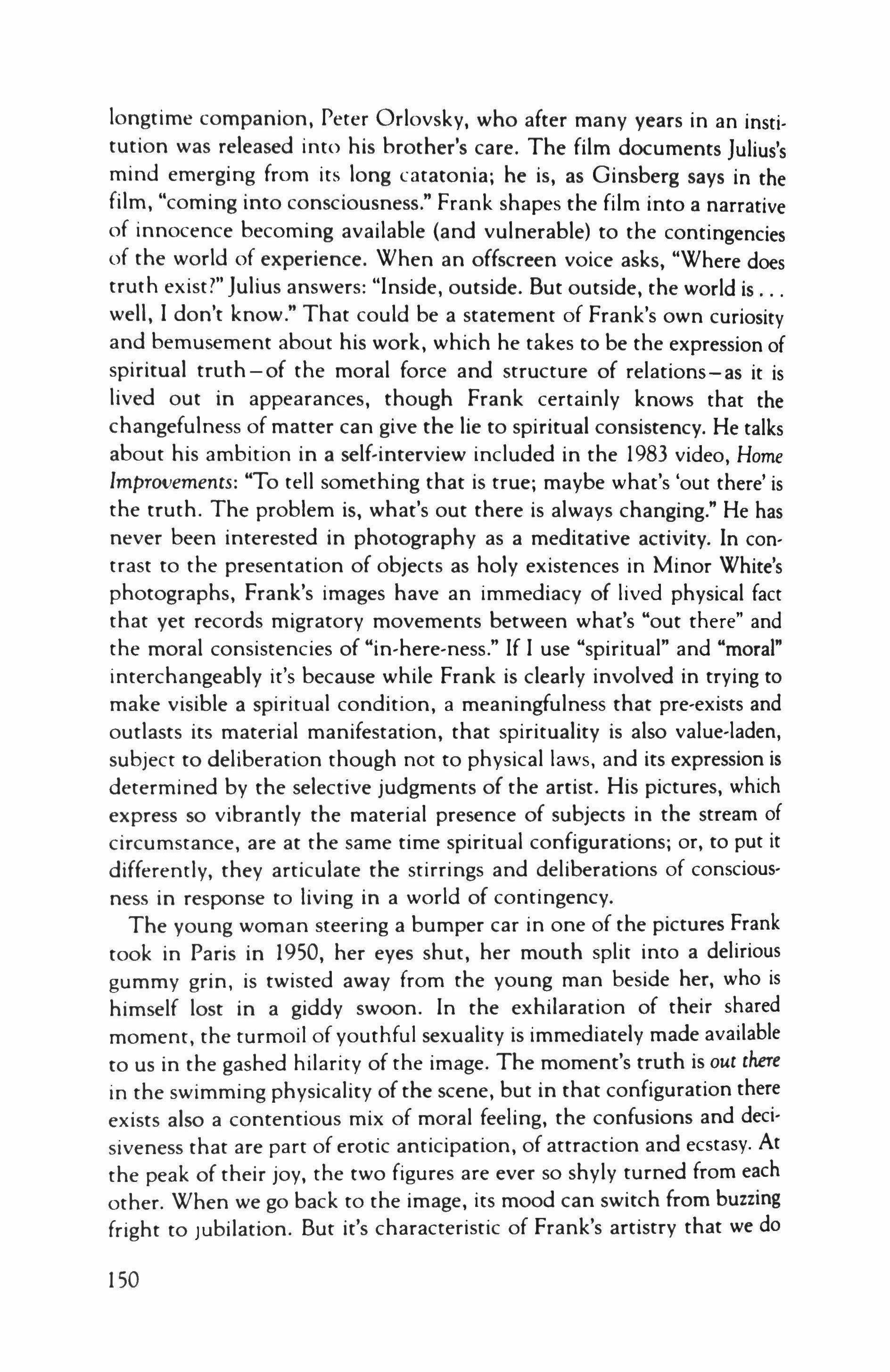
longtime companion, Peter Orlovskv, who after many years in an institution was released into his brother's care. The film documents Julius's mind emerging from its long catatonia; he is, as Ginsberg says in the film, "coming into consciousness." Frank shapes the film into a narrative of innocence becoming available (and vulnerable) to the contingencies of the world of experience. When an offscreen voice asks, "Where does truth exist?" Julius answers: "Inside, outside. But outside, the world is well, I don't know." That could be a statement of Frank's own curiosity and bemusement about his work, which he takes to be the expression of spiritual truth -of the moral force and structure of relations-as it is lived out in appearances, though Frank certainly knows that the changefulness of matter can give the lie to spiritual consistency. He talks about his ambition in a self-interview included in the 1983 video, Home Improvements: "To tell something that is true; maybe what's 'out there' is the truth. The problem is, what's out there is always changing." He has never been interested in photography as a meditative activity. In contrast to the presentation of objects as holy existences in Minor White's photographs, Frank's images have an immediacy of lived physical fact that yet records migratory movements between what's "out there" and the moral consistencies of "in-here-ness." If I use "spiritual" and "moral" interchangeably it's because while Frank is clearly involved in trying to make visible a spiritual condition, a meaningfulness that pre-exists and outlasts its material manifestation, that spirituality is also value-laden, subject to deliberation though not to physical laws, and its expression is determined by the selective judgments of the artist. His pictures, which express so vibrantly the material presence of subjects in the stream of circumstance, are at the same time spiritual configurations; or, to put it differently, they articulate the stirrings and deliberations of consciousness in response to living in a world of contingency.
The young woman steering a bumper car in one of the pictures Frank took in Paris in 1950, her eyes shut, her mouth split into a delirious gummy grin, is twisted away from the young man beside her, who is himself lost in a giddy swoon. In the exhilaration of their shared moment, the turmoil of youthful sexuality is immediately made available to us in the gashed hilarity of the image. The moment's truth is out there in the swimming physicality of the scene, but in that configuration there exists also a contentious mix of moral feeling, the confusions and decisiveness that are part of erotic anticipation, of attraction and ecstasy. At the peak of their joy, the two figures are ever so shyly turned from each other. When we go back to the image, its mood can switch from buzzing fright to Jubilation. But it's characteristic of Frank's artistry that we do
150

not feel manipulated into a predetermined moral "fit" or attitude. The crossed zones, the spiritual pitching into the quick of physical fact, exist entirely there in the (apparently casual) formal qualities of the image. It is not a formal perfection he seeks but a quality of presence. In fact, the better part of his art grows out of his passion for imperfections and irresolutions.
The children playing on the slag heap in "Caerau, Wales" (1953) have the same look of crazy joy as those Parisians. But if the bumper-car lovers are a momentary resolution of the shimmering flares of light on metal shattering all around them, the kids on the slag heap look like concentrates of the crude industrial bvproducts on which they play. They don't emerge from the glittering heap of scoria; they are stamped on it, tooled into that support. The dross that possesses the children's flesh, their material being, is a valueless castoff from the material that supports the town's economy. A moral and economic relation is thus made available in the physical truth of the image. The simultaneity of matter and spirit becomes more complexly toned in the series to which the image belongs. In one of the Caerau street scenes, for instance, three generations of males stand on a corner, idle, backs to a wall. A dog crosses the street. (It looks like Giacornetti's scavenger dog.) Grimy row houses slant upward to the right like a stage flat in The Cabinet of Doctor Caligari. Down the street runs muck from the slag heap we've seen in the other picture. The town, with its inert economy and distressed male population, is physically and spiritually trapped in, and fouled by, the consequences of its own mean prosperity.
When I try to understand why Frank's images have been so tenacious in my life, why their mystery and clarity have for nearly twenty years called me back again and again, asking for some answer, some reciprocal spiritual response, I come up with things not very helpful to formal analysis. His purity of intent, for instance. He is more than just preternaturally sensitive to surprise. His mind holds no determinants, no categorical resolutions or sentences of experience, nor does it imply any expectation of them. Among photographers he is the one who most completely possesses the quality of imaginative response which Keats called Negative Capability, "that is, when man is capable of being in uncertainties, mysteries, doubts, without any irritable reaching after fact & reason A too-scrupulous creative mind, or one too obsessed with thoroughness and completion, "would let go by a fine isolated verisimilitude caught from the Penetralium of mystery, from being incapable of remaining content with half-knowledge." It's certainly not innocence. It's
151

rather a fearless availability which exercises itself as inquisitiveness. It's judgment by selective inclusiveness, not by austere exclusiveness. What are the purest expressions of this quality? There is a picture in The Americans of a black funeral in St. Helena, South Carolina: six men stand around cars, self-contained, each an island of thoughtful, ritualized waiting, except for the figure deepest in the image who stares at us from his distance. In formal terms, though, the image has no "deepest" point or "distance"; the figures, the cars, the gray air, everything floats on the surface of the scene, a scene that they themselves comprise. There is the black Pentecostal in "Mississippi River, Baton Rouge, Louisiana," dressed in white, a white cross in one hand, a tambourine in the other; kneeling on the riverbank, he looks at once like a black parody of a Klansman and a minstrel-show performer, but subsuming both shadow presences is the sheer presence of power worship generates, especially when it is enacted by that river, America's holy river, which we can almost see flowing. There is the black woman in "Beaufort, South Carolina," sitting in a chair in a field at sundown: at her elbow, though positioned at the field's horizon line, rises a telephone pole that looks like a man-sized version of the cross held by the Pentecostal. The passing awe of his encounter with the world is written into so many of Frank's pictures that they suggest the purity of apprehension of early childhood, or of holy idiocy. But I never feel that the pictures issue from an Edenic blankness or dawning of consciousness. Frank's strange purity is history-freighted. He is not naming what has not yet been named. He is feeling in images the particularity and value-charged distinctiveness of what he knows to be old and used. If there is any Golden Age innocence in him, it is welded to Swiss orderliness and American good sense. His purity of intent, at any rate, accounts in part for his attraction to children as subjects. In the Parisian lovers we still see the hysterical child, and the Welsh children on the slag heap are already miniature adults.
Unlike the drifters and marginal characters slanted into their scenesuch as the cowboy of "Rodeo, New York City" (1955-56) leaning against a sidewalk trash basket rolling a cigarette, or the black and Hispanic queens mugging the camera from a doorway, with their penciled eyebrows, hip-shot poses, and "done" hair-the children in Robert Frank's photographs are positioned among the world's instructive objects, as if in preparation for the irreversible passage into adulthood's circumstantial improvisations. During his 1952 visit to Spain, Frank made another of his sea-journey images: a child in diapers sits atop a wooden horse, ramping on the shore. The horse looks seaward, the
152

child toward the clapping hands of his mother. The formless sea is the counterforce that would pull the child from those protective, instructive maternal hands. In a 1948 picture, Peruvian children sit on a curb watching a military review, absorbing that model of force, discipline and order. The swaggering precision is one appeal from the adult order to children just beginning to sort through desirable images of behavior. Frank often photographed his own children. (The child on the horse is his son Pablo.) They rode along for several months while he took pictures for The Americans, one of which, "U.S. 90, en route to Del Rio, Texas," shows them drowsing in the car with their mother, Mary Lockspeiser, whom Frank married in 1950. Road-weary, cocooned in the dark car in dusk light, they form an image of love sustained during a fugitive existence. A counterimage is "Mary and Andrea, Third Avenue, New York City," (1956): Frank's young daughter occupies the light at the lower right of the image, looking straight at us while her mother, on the left, stares out the window. Andrea is patched by a smothering light spread across her face. Her emergent consciousness is so needful and vulnerable that she seems adrift from the mother, who is distracted, secretive, absorbed in an already formed selfhood. For Frank, making pictures has always been a way of living into the moral moment. Of The Americans he once said it "showed that period in an unmistakable way, how I felt about it, where I stood-it's a way of life for me-How I live, that's my politics."! This is, I think, his own version of Matisse's insistence on making an image not of the thing seen but of the feeling the thing calls into existence. For Frank, however, the intimacies of photography are tied not only to the rhythms of his own life of feeling but also to his politics, his view of life in a governed society. Bristled about by a contingency it is only beginning to intuit, a child's mind is the purest, most immediate register of these two conditions. The two fused in the adult mind make for political feeling. Frank is by no means a naive or childlike artist, but he is (like Wordsworth and certain other poets) by sympathetic capability wonderfully close to the child's experience as it is kept by adult consciousness in its experiences of the world, and this makes him a photographer of unusually complex yet fresh political feeling. Throughout The Americans children are implicated into political mood. In the famous image of the New Orleans streetcar-the most congested image he has made - centered in that synoptic view of America's sullen racial and social varieties are two children staring from a window. Like all the faces in the picture, theirs are in distress. Each of the adults looks out with a different greeting of the spirit, from the white
153

woman's defiant frown to the black man's pained squint. The children are placed as both precursors and inheritors of those moods.
Like most of the pictures in The Americans, the New Orleans image is so bled of vivacity and good cheer, and is therefore so contrary to what the popular imagination conceives-or did at least in those days conceive-to be essential characteristics of our national temperament, that the book inevitably drew outraged moralistic criticism from some reviewers. In Popular Photography Bruce Downes wrote: "There is no pity in his images. They are images of hate and hopelessness, of desolation and preoccupation with death. They are images of an America seen by a joyless man who hates the country of his adoption." Frank himself said of the book: "I knew the photographs were true. They were what I felt, they were completely intuitive. There was no thinking." The remark suggests his hatred of pedantry and justified suspicion of any moralistic intellectualism that would suck the intuitive force out of art images. But I think he is also saying that in making that book (and, I would generalize, in nearly all his work up until 1974) he did not design or belabor scenic elements in his pictures, did not concern himself with the "supreme instant" of formal realization, did not seek out social configurations that might serve as political slogans. If he is the purest (and least smug) straight photographer of our time, pure in his attention to the ceremonies of circumstance as value-laden relations, he cares little about the formal purity of his images. The few times he has tried to contrive the order of a scene or over-determine the political content of an image, the results have been arch, self-satisfied and literary. Perhaps because it is yet another portrait of childhood, the most glaring example for me of things gone wrong is "Cape Cod" (1962), where Andrea is running across the beach unfurling an American flag that forms a canopy beneath which sits Pablo, reading the Daily News. The headline, shoved at us in the compressed space, announces: "MARILYN DEAD." From a front-page photo the movie star's hand reaches out, a familiar gesture of appeal in Frank's pictures. The image is programmatic, the figures of children inserted into a scheme of cultural signs that carry a monotonal charge. It's the one photograph of his that might pass as Beat art-a sour, overconceptualized image of moral relations that have had all the suppleness and mystery of actual existence, actual occasion, leached from them. Marilyn, the fallen goddess, the fallen fiction, vulgarly remembered beneath the vulgar, glamorous providentialiry of the flag. The picture is not dishonest or lazy. Frank is incapable of the disingenuousness which in some contemporary artists is praised and rewarded for its delectable self-contempt. In "Cape Cod" he is testing another way of
154

making a picture, a way which I think was dangerously available to him if he wanted it, but the effort suppresses his remarkable intuitive capacity for selecting moments in which the moral or spiritual life is enacted most intensely in material circumstance.
In a 1975 lecture at Wellesley College, Frank had this to say about photographic form:"I'm not interested in taking a beautiful photograph. I don't mean that there's no room for it; I just don't want to do it. For example, I live in a very beautiful place [Mabou, Nova Scotia). I could get a camera and make a very beautiful picture. It could be almost as good as Ansel Adams. But I don't want to take a beautiful picture, and I can't, really." Privileged visions, darkroom exaltations, definitive "finish," these have never mattered to him as much as making the photograph a materialization of subjective consciousness. I want to suggest that his work has its best apologist in William James. In the Principles of Psychology James set out his famous description of the stream of consciousness: "Consciousness does not appear to itself chopped up in bits. Such words as 'chain' or 'train' do not describe it fitly as it presents itself in the first instance. It is nothing jointed: it flows Let us call it the stream of thought, or consciousness, or of subjective life." Because of its selectivity a photograph by Robert Frank presents a chopped-away image of consciousness. But most of his pictures also bear signs or memorial traces of their own selection and contain fossil scorings of the stream from which they have been cut. In contrast to the work of photographers as diverse as Weston, Stieglitz, Minor White and Harry Callahan, none of Frank's pictures has the tone or aura of an eternal moment. His images in fact bear some mysterious quality I cannot account for but feel as a healing agent which, serving always continuity and fused consciousness, soothes over the lesions its own chopping activity creates. This is intensified, and situated morally, by his imaginative sympathy for his subjects. In The Americans there is a photo of a Detroit assembly line in which the workers look entangled in the hoses, tools, cables, parts and storage racks all around them. It is not so much an image of industrial tyrannies-workers caught in a web-work their tools and support systems create-as it is an image of toiling absorption, where human attention to a task fuses to the instruments that execute it. There is no tone of exclusivity, no sense of privilege, in the selection of the moment. But like many of his images, it has a shadow existence where other possible pictures, other imagined configurations, stream in his consciousness. Later in the same chapter in Principles, James writes that the mind is a theater of simultaneous possibilities: "Consciousness consists in the com-
155

parison of these with each other, the selection of some, and the suppression of the rest by the reinforcing and inhibiting agency of attention." The selectivity of the subjective consciousness is one of the decisive dramas in Frank's work. His "Bus Series"-pictures taken from Manhattan busses in 1958 and the last thematic series he finished before going into filmmaking- is interesting because the view of consciousness is determined hy a given scheme, a bus route, a pattern for the inquiring eye. I've seen the contact sheet and two prints of a sequence of shots made while Frank's bus was pulling up beside another. Pinched in the narrow space ahead, between the two vehicles, a pedestrian crosses the street. The contact sheet is a record of the chopped moments comprising the mental event. The two prints demonstrate the shocking changes consciousness absorbs and photographic selectivity isolates. In one, a blade of sunlight slashes the image vertically, and the small pedestrian is nearly dissolved in its brilliance. The light, in those city spaces, is heavenly visitation and ordering force. In the second image, taken just a moment before or afterward, the side of Frank's bus obstructs the light, its radiance is deflected, its disclosures interrupted, curtained by the shift in view, by the turning of attention. In formal terms, neither is superior to the other. Each imprints the action of the selective mind, both are rich with the sense of a larger, more inclusive stream of awareness.
But artists who are guided too much by sympathetic attractions and inquisitiveness become hostage to occasion and risk a drifting abritrariness. Decisions must be made, themes pursued, subjects owned. The most decisive figural pattern in Frank's photographs, one which drives and organizes what otherwise might become a desultory receptivity to the world's offered occasions, is the call. Sometimes it's political, sometimes religious. ("Politics," he once said, "it's close to religion. To believe in a voice- that is what I think much of it is about. But I think it is better to believe in religion than to believe in politicians.") When it comes, it gives provisional shape to the community that amasses around it, which may be a crowd of strangers or a familiar group. The call, and the response to it, is not just a theme in Frank's work, it's also a technique. His alertness has a religious intensity, though he usually stations himself a little way from the heat of the source. In 1947 Louis Faurer took a picture of a New York crowd on a sidewalk rubbernecking something out of view: one step back from the crowd is the young Robert Frank, hands in his pockets, interested in the off-camera event but not gawking. The others are looking at what's happening; he is seeing it. The call in American life must have leaped at him when he came here, and
156
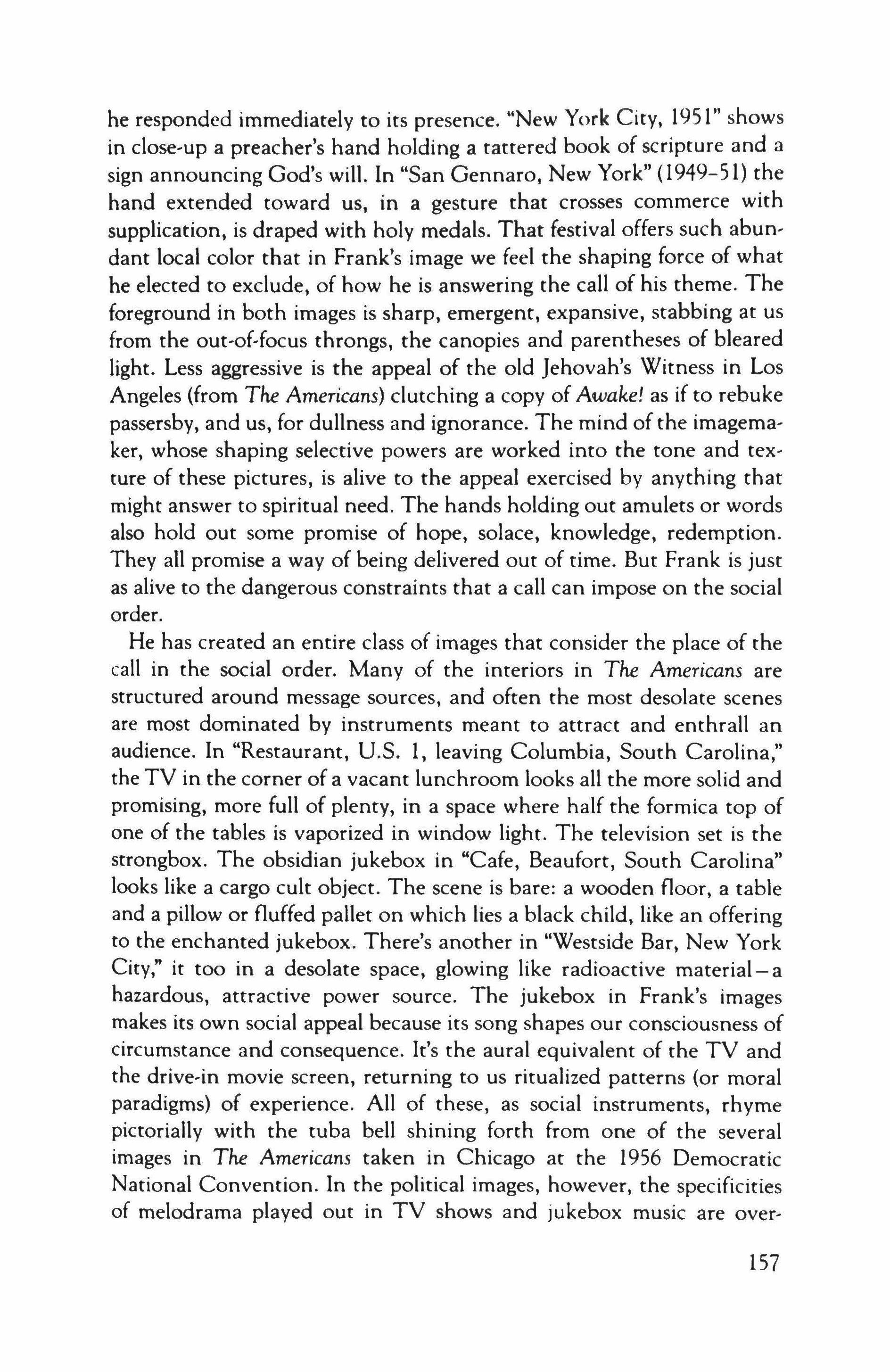
he responded immediately to its presence. "New York City, 1951" shows in close-up a preacher's hand holding a tattered book of scripture and a sign announcing God's will. In "San Gennaro, New York" (1949-51) the hand extended toward us, in a gesture that crosses commerce with supplication, is draped with holy medals. That festival offers such abundant local color that in Frank's image we feel the shaping force of what he elected to exclude, of how he is answering the call of his theme. The foreground in both images is sharp, emergent, expansive, stabbing at us from the out-of-focus throngs, the canopies and parentheses of bleared light. Less aggressive is the appeal of the old Jehovah's Witness in Los Angeles (from The Americans) clutching a copy of Awake! as if to rebuke passersby, and us, for dullness and ignorance. The mind of the imagemaker, whose shaping selective powers are worked into the tone and texture of these pictures, is alive to the appeal exercised by anything that might answer to spiritual need. The hands holding out amulets or words also hold out some promise of hope, solace, knowledge, redemption. They all promise a way of being delivered out of time. But Frank is just as alive to the dangerous constraints that a call can impose on the social order.
He has created an entire class of images that consider the place of the call in the social order. Many of the interiors in The Americans are structured around message sources, and often the most desolate scenes are most dominated by instruments meant to attract and enthrall an audience. In "Restaurant, U.S. 1, leaving Columbia, South Carolina," the TV in the corner of a vacant lunchroom looks all the more solid and promising, more full of plenty, in a space where half the formica top of one of the tables is vaporized in window light. The television set is the strongbox. The obsidian jukebox in "Cafe, Beaufort, South Carolina" looks like a cargo cult object. The scene is bare: a wooden floor, a table and a pillow or fluffed pallet on which lies a black child, like an offering to the enchanted jukebox. There's another in "Westside Bar, New York City," it too in a desolate space, glowing like radioactive material- a hazardous, attractive power source. The jukebox in Frank's images makes its own social appeal because its song shapes our consciousness of circumstance and consequence. It's the aural equivalent of the TV and the drive-in movie screen, returning to us ritualized patterns (or moral paradigms) of experience. All of these, as social instruments, rhyme pictorially with the tuba bell shining forth from one of the several images in The Americans taken in Chicago at the 1956 Democratic National Convention. In the political images, however, the specificities of melodrama played out in TV shows and jukebox music are over-
157
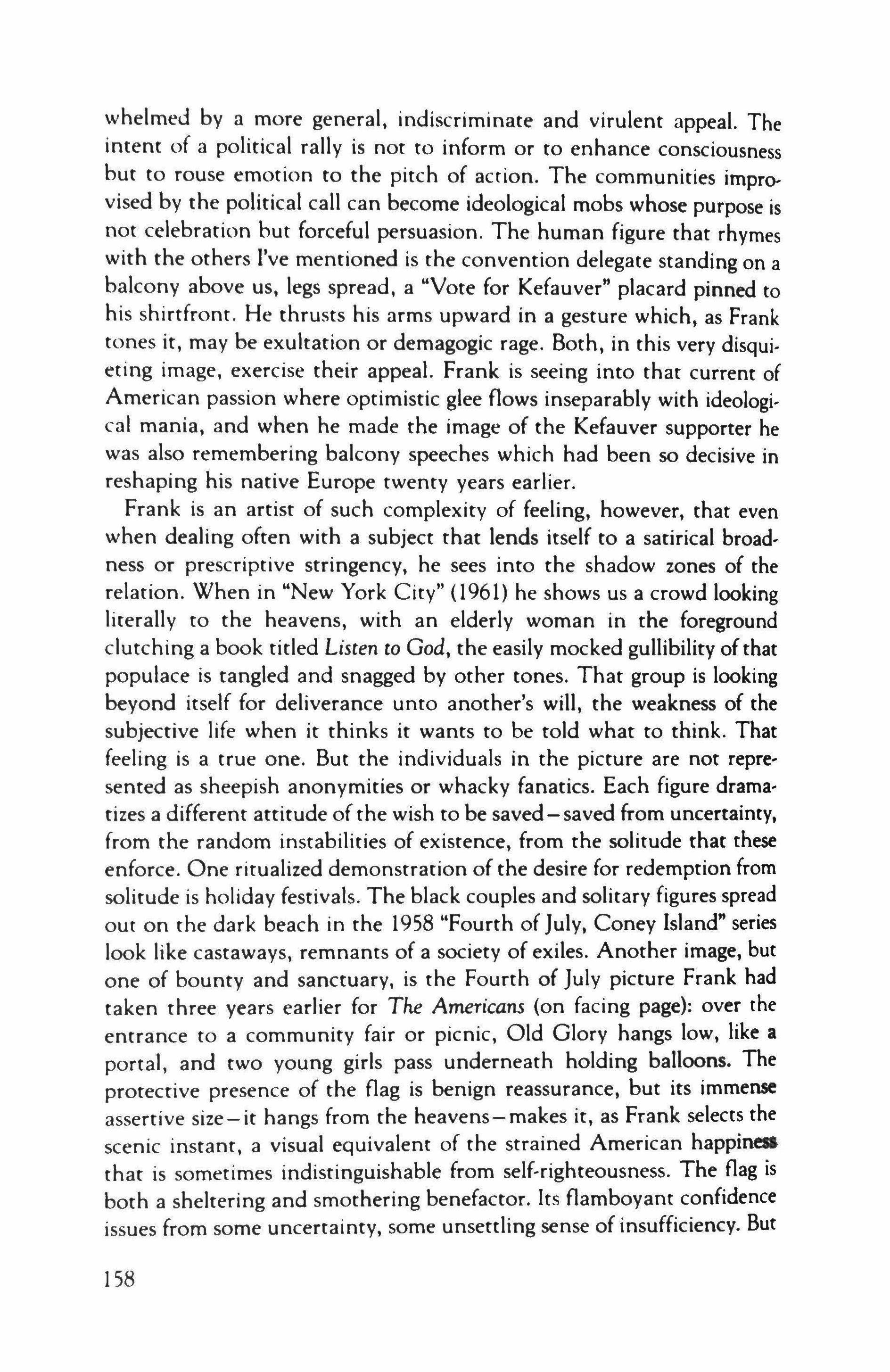
whelmed by a more general, indiscriminate and virulent appeal. The intent of a political rally is not to inform or to enhance consciousness but to rouse emotion to the pitch of action. The communities improvised by the political call can become ideological mobs whose purpose is not celebration but forceful persuasion. The human figure that rhymes with the others I've mentioned is the convention delegate standing on a balcony above us, legs spread, a "Vote for Kefauver" placard pinned to his shirtfront. He thrusts his arms upward in a gesture which, as Frank tones it, may be exultation or demagogic rage. Both, in this very disquieting image, exercise their appeal. Frank is seeing into that current of American passion where optimistic glee flows inseparably with ideological mania, and when he made the image of the Kefauver supporter he was also remembering balcony speeches which had been so decisive in reshaping his native Europe twenty years earlier.
Frank is an artist of such complexity of feeling, however, that even when dealing often with a subject that lends itself to a satirical broadness or prescriptive stringency, he sees into the shadow zones of the relation. When in "New York City" (1961) he shows us a crowd looking literally to the heavens, with an elderly woman in the foreground clutching a book tided Listen to God, the easily mocked gullibility ofthat populace is tangled and snagged by other tones. That group is looking beyond itself for deliverance unto another's will, the weakness of the subjective life when it thinks it wants to be told what to think. That feeling is a true one. But the individuals in the picture are not represented as sheepish anonymities or whacky fanatics. Each figure dramatizes a different attitude of the wish to be saved-saved from uncertainty, from the random instabilities of existence, from the solitude that these enforce. One ritualized demonstration of the desire for redemption from solitude is holiday festivals. The black couples and solitary figures spread out on the dark beach in the 1958 "Fourth of July, Coney Island" series look like castaways, remnants of a society of exiles. Another image, but one of bounty and sanctuary, is the Fourth of July picture Frank had taken three years earlier for The Americans (on facing page): over the entrance to a community fair or picnic, Old Glory hangs low, like a portal, and two young girls pass underneath holding balloons. The protective presence of the flag is benign reassurance, but its immense assertive size-it hangs from the heavens-makes it, as Frank selects the scenic instant, a visual equivalent of the strained American happiness that is sometimes indistinguishable from self-righteousness. The flag is both a sheltering and smothering benefactor. Its flamboyant confidence issues from some uncertainty, some unsettling sense of insufficiency. But
158
 "Fourth of July-Jay, New York" (1955) by Robert Frank. Copyright: Robert Frank, courtesy Pace/MacGill Gallery, New York.
"Fourth of July-Jay, New York" (1955) by Robert Frank. Copyright: Robert Frank, courtesy Pace/MacGill Gallery, New York.
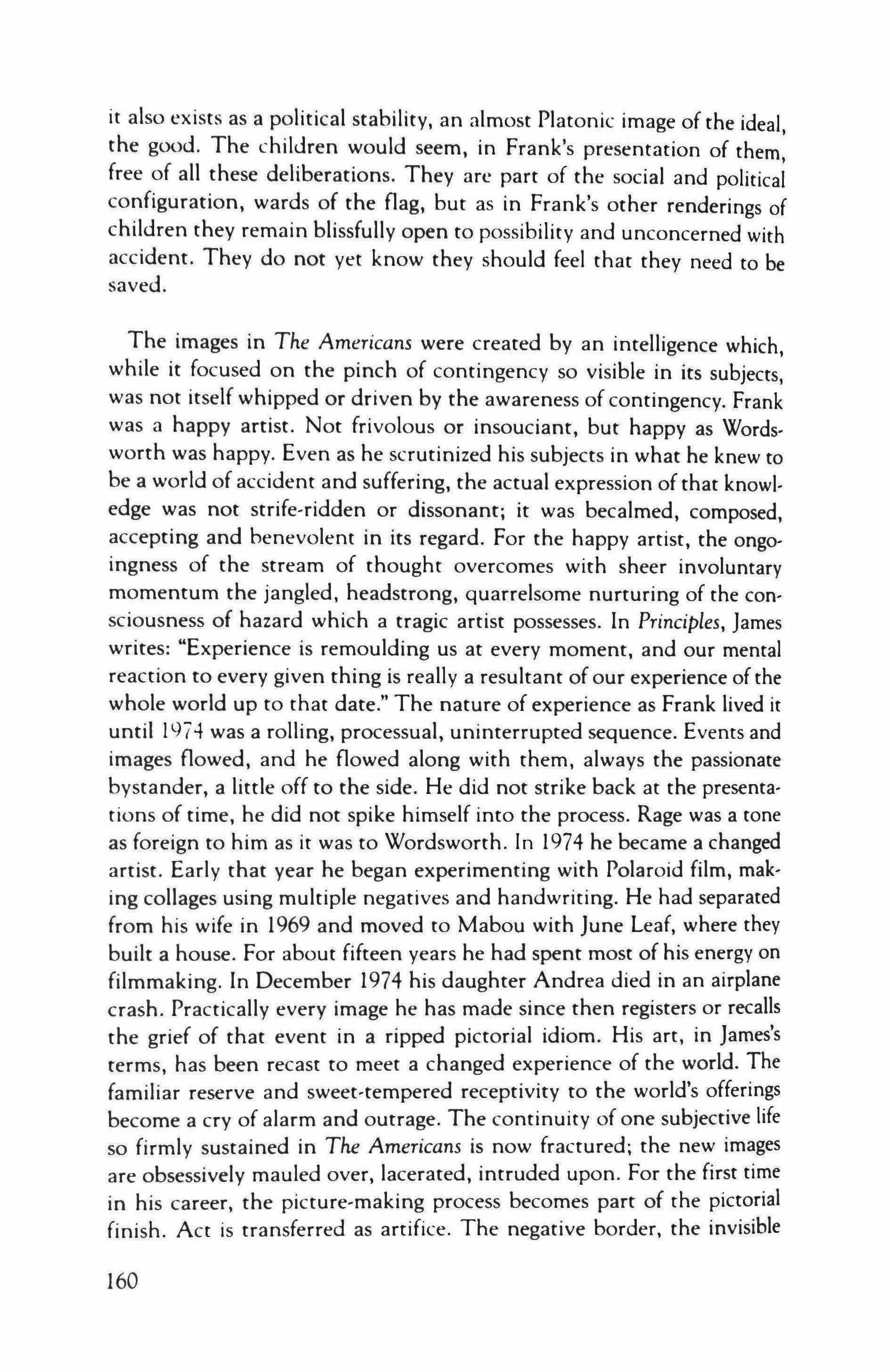
it also exists as a political stability, an almost Platonic image of the ideal, the good. The children would seem, in Frank's presentation of them, free of all these deliberations. They are part of the social and political configuration, wards of the flag, but as in Frank's other renderings of children they remain blissfully open to possibility and unconcerned with accident. They do not yet know they should feel that they need to be saved.
The images in The Americans were created by an intelligence which, while it focused on the pinch of contingency so visible in its subjects, was not itself whipped or driven by the awareness of contingency. Frank was a happy artist. Not frivolous or insouciant, but happy as Wordsworth was happy. Even as he scrutinized his subjects in what he knew to be a world of accident and suffering, the actual expression of that knowledge was not strife-ridden or dissonant; it was becalmed, composed, accepting and benevolent in its regard. For the happy artist, the ongoingness of the stream of thought overcomes with sheer involuntary momentum the jangled, headstrong, quarrelsome nurturing of the consciousness of hazard which a tragic artist possesses. In Principles, James writes: "Experience is remoulding us at every moment, and our mental reaction to every given thing is really a resultant of our experience of the whole world up to that date." The nature of experience as Frank lived it until 1l)74 was a rolling, processual, uninterrupted sequence. Events and images flowed, and he flowed along with them, always the passionate bystander, a little off to the side. He did not strike back at the presentations of time, he did not spike himself into the process. Rage was a tone as foreign to him as it was to Wordsworth. In 1974 he became a changed artist. Early that year he began experimenting with Polaroid film, making collages using multiple negatives and handwriting. He had separated from his wife in 1969 and moved to Mabou with June Leaf, where they built a house. For about fifteen years he had spent most of his energy on filmmaking. In December 1974 his daughter Andrea died in an airplane crash. Practically every image he has made since then registers or recalls the grief of that event in a ripped pictorial idiom. His art, in James's terms, has been recast to meet a changed experience of the world. The familiar reserve and sweet-tempered receptivity to the world's offerings become a cry of alarm and outrage. The continuity of one subjective life so firmly sustained in The Americans is now fractured; the new images are obsessively mauled over, lacerated, intruded upon. For the first time in his career, the picture-making process becomes part of the pictorial finish. Act is transferred as artifice. The negative border, the invisible
160

housing, of his previous images, is now a garishly exposed, tentative restrainer. The front of the image, the inviolate pristine transparency that had been Frank's chief device in organizing the intimacies he observed, becomes a violated zone slashed by messages, stray marks, autobiographical debris. Frank's response to the new devastating fact in his life-it's unseemly to trample on his grief with commentary, but I don't know how else to get at the important questions in the career of this artist - is to tear into his own image patterns, to borrow old pictures and set them in a different redefining context, to disrupt form until it responds adequately to his new feeling. The violence in the images after 1974 is an effort to find new patterns that can answer to a new mind. What once was instinctive and familiar in his art no longer sufficed.
In an essay on Baudelaire, Walter Benjamin describes the peculiar power of the camera to fix an event for an indefinite period of time: "The camera gave the moment a posthumous shock." It's that shock which we feel, in its finely blended tones, in Frank's earlier pictures. After 1974 his images purge the posthumous shock from the fixed moment and dramatize instead the jangled densities of the feeling of remembrance. The new images are excruciatingly self-conscious, above all in the way they expose Frank's interventions. Throughout his career he had made incursions into erotic relations, household intimacies and public ceremonies, but the happy spirit that allowed him to treat the front wall of the photograph as a divisive transparency is shattered now. The image field becomes a workspace memorializing contested feelings. As viewers, we no longer look on safely from the margin, we are made co-witness and conspiritor to turbulent assertions of the image as a contrivance, not a gift; a made thing, not a visionary mood. Our own attention is spiked into the image. The mechanical details of remembrance are hammered into many of the new images not as a retrieval or recovery but as an expression of the strain of rememhrance as it elides, crosses, crowds and chops up moments in time's passing. In the 1977 "Words, Nova Scotia," two of his own famous images, the tuba from the Chicago series and the 1953 "London to New York," in which passengers of the Maurerania look out expectantly from the rail the evening before their arrival, hang from a line across a stretch of beach. Beside them hangs a flag bearing the letters"W 0 R 0 S." Unlike those other autobiographical photographic bits of Frank's early practice, "W 0 R 0 S" recollects no images of the world, has no feeling-tone in isolation, and is morally numb as the other images are not. It refers, it does not image, and it refers to the abstractions of consciousness which give us sometimes the power to express qualities of the visible world. That neutral
161
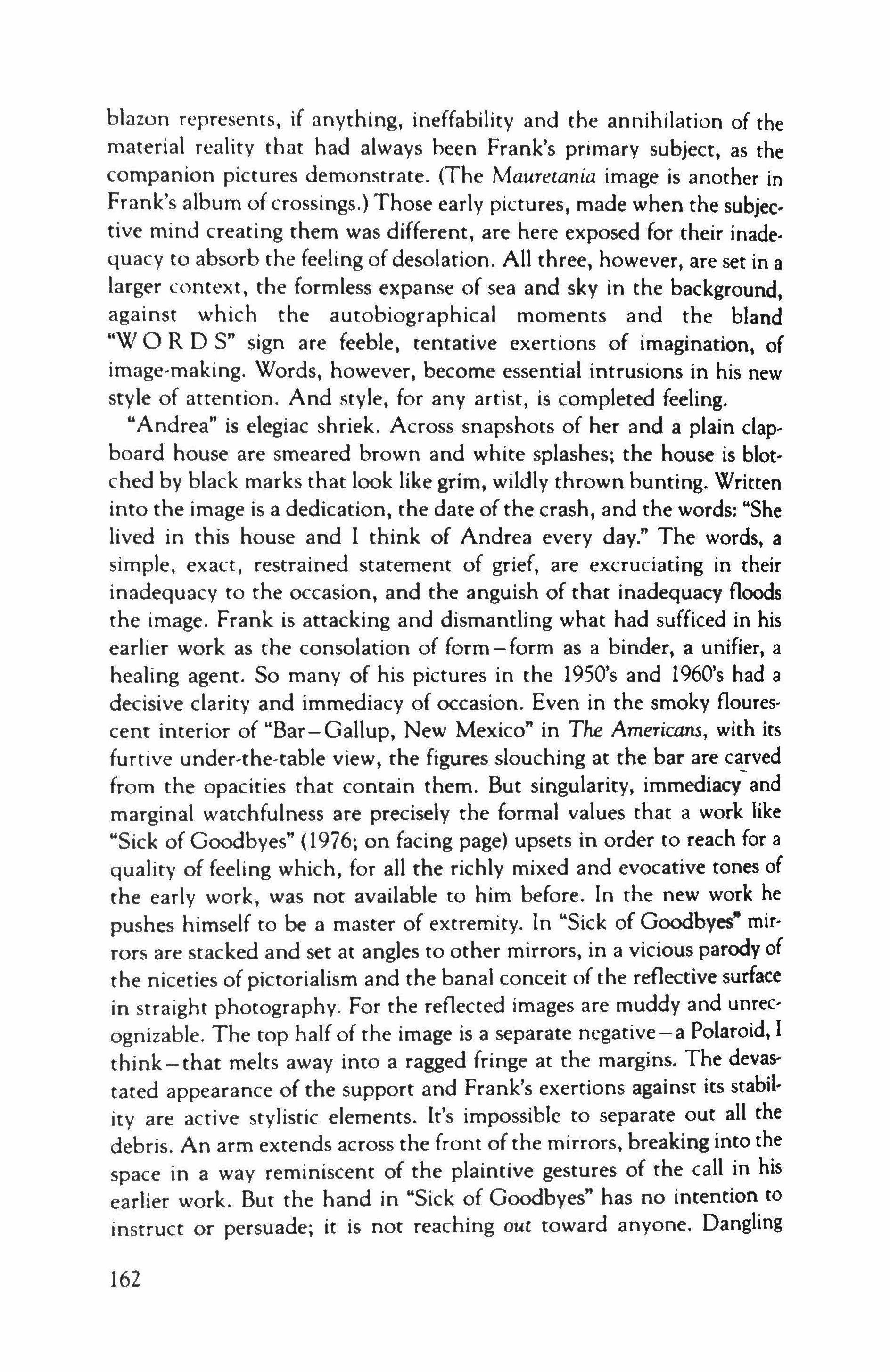
blazon represents, if anything, ineffability and the annihilation of the material reality that had always heen Frank's primary subject, as the companion pictures demonstrate. (The Maurerania image is another in Frank's album of crossings.) Those early pictures, made when the subjective mind creating them was different, are here exposed for their inadequacy to absorb the feeling of desolation. All three, however, are set in a larger context, the formless expanse of sea and sky in the background, against which the autobiographical moments and the bland "W 0 R D S" sign are feeble, tentative exertions of imagination, of image-making. Words, however, become essential intrusions in his new style of attention. And style, for any artist, is completed feeling. "Andrea" is elegiac shriek. Across snapshots of her and a plain clapboard house are smeared brown and white splashes; the house is blotched by black marks that look like grim, wildly thrown bunting. Written into the image is a dedication, the date of the crash, and the words: "She lived in this house and I think of Andrea every day." The words, a simple, exact, restrained statement of grief, are excruciating in their inadequacy to the occasion, and the anguish of that inadequacy floods the image. Frank is attacking and dismantling what had sufficed in his earlier work as the consolation of form-form as a binder, a unifier, a healing agent. So many of his pictures in the 1950's and 1960's had a decisive clarity and immediacy of occasion. Even in the smoky flourescent interior of "Bar-Gallup, New Mexico" in The Americans, with its furtive under-the-table view, the figures slouching at the bar are carved from the opacities that contain them. But singularity, immediacy-and marginal watchfulness are precisely the formal values that a work like "Sick of Goodbves" (1976; on facing page) upsets in order to reach for a quality of feeling which, for all the richly mixed and evocative tones of the early work, was not available to him before. In the new work he pushes himself to be a master of extremity. In "Sick of Goodbyes" mirrors are stacked and set at angles to other mirrors, in a vicious parody of the niceties of pictorialism and the banal conceit of the reflective surface in straight photography. For the reflected images are muddy and unrecognizable. The top half of the image is a separate negative-a Polaroid, I think - that melts away into a ragged fringe at the margins. The devastated appearance of the support and Frank's exertions against its stability are active stylistic elements. It's impossible to separate out all the debris. An arm extends across the front of the mirrors, breaking into the space in a way reminiscent of the plaintive gestures of the call in his earlier work. But the hand in "Sick of Goodbves" has no intention to instruct or persuade; it is not reaching out toward anyone. Dangling
162
 "Sick of Goodbves" (1978) by Robert Frank. Copyright: Robert Frank, courtesy Pace/MacGill Gallery, New York.
"Sick of Goodbves" (1978) by Robert Frank. Copyright: Robert Frank, courtesy Pace/MacGill Gallery, New York.
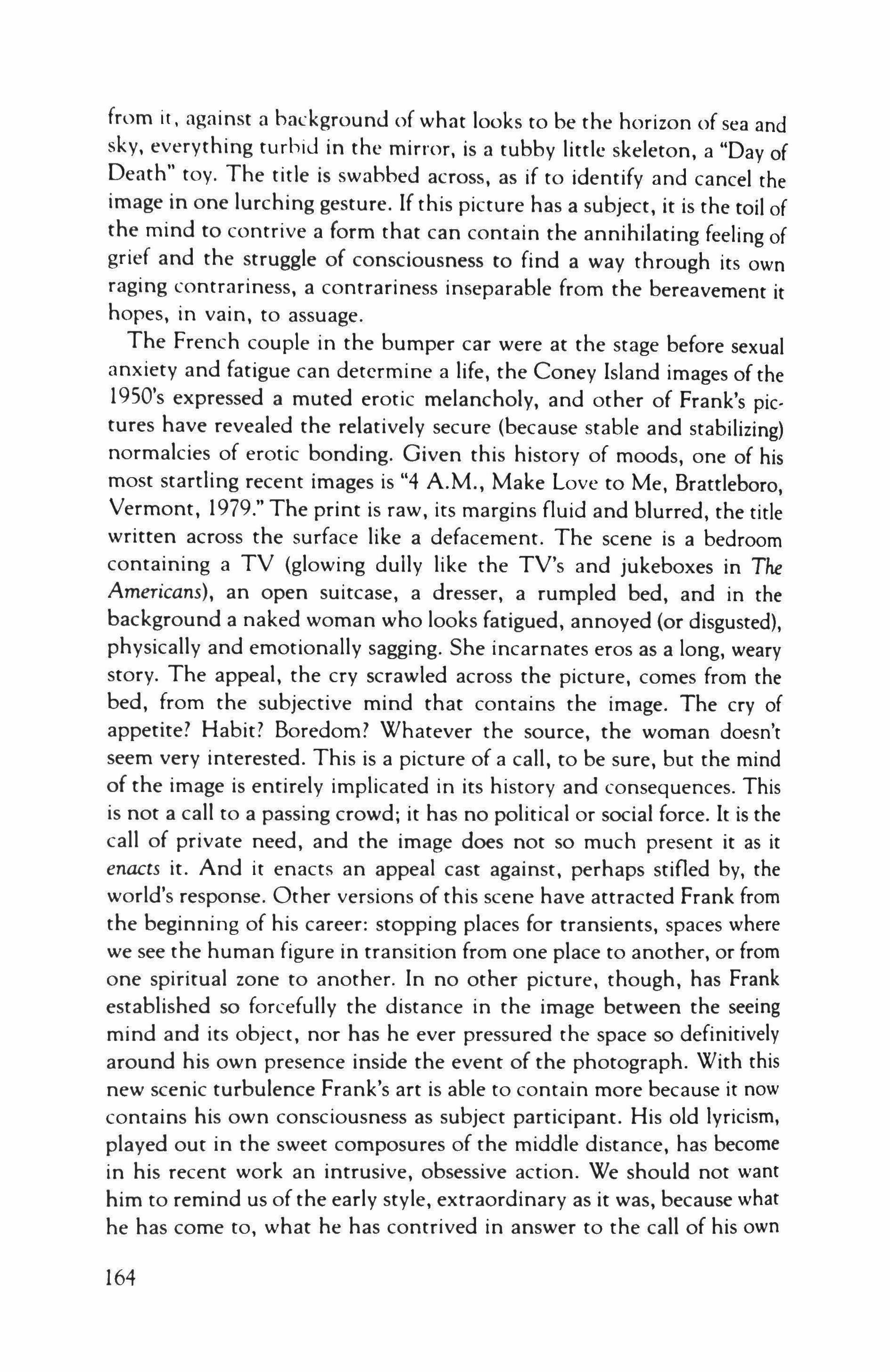
from it. against a background of what looks to be the horizon of sea and sky, everything turbid in the mirror, is a tubby little skeleton, a "Day of Death" toy. The title is swabbed across, as if to identify and cancel the image in one lurching gesture. If this picture has a subject, it is the toil of the mind to contrive a form that can contain the annihilating feeling of grief and the struggle of consciousness to find a way through its own raging contrariness, a contrariness inseparable from the bereavement it hopes, in vain, to assuage.
The French couple in the bumper car were at the stage before sexual anxiety and fatigue can determine a life, the Coney Island images of the 1950's expressed a muted erotic melancholy, and other of Frank's pictures have revealed the relatively secure (because stable and stabilizing) normalcies of erotic bonding. Given this history of moods, one of his most startling recent images is "4 A.M., Make Love to Me, Brattleboro, Vermont, 1979." The print is raw, its margins fluid and blurred, the title written across the surface like a defacement. The scene is a bedroom containing a TV (glowing dully like the TV's and jukeboxes in The Americans), an open suitcase, a dresser, a rumpled bed, and in the background a naked woman who looks fatigued, annoyed (or disgusted), physically and emotionally sagging. She incarnates eros as a long, weary story. The appeal, the cry scrawled across the picture, comes from the bed, from the subjective mind that contains the image. The cry of appetite? Habit? Boredom? Whatever the source, the woman doesn't seem very interested. This is a picture of a call, to be sure, but the mind of the image is entirely implicated in its history and consequences. This is not a call to a passing crowd; it has no political or social force. It is the call of private need, and the image does not so much present it as it enacts it. And it enacts an appeal cast against, perhaps stifled by, the world's response. Other versions of this scene have attracted Frank from the beginning of his career: stopping places for transients, spaces where we see the human figure in transition from one place to another, or from one spiritual zone to another. In no other picture, though, has Frank established so forcefully the distance in the image between the seeing mind and its object, nor has he ever pressured the space so definitively around his own presence inside the event of the photograph. With this new scenic turbulence Frank's art is able to contain more because it now contains his own consciousness as subject participant. His old lyricism, played out in the sweet composures of the middle distance, has become in his recent work an intrusive, obsessive action. We should not want him to remind us of the early style, extraordinary as it was, because what he has come to, what he has contrived in answer to the call of his own
164
spirit, is a jagged, divisive, complex lyricism which, though it has little of the aching affability of The Americans, yet lives into the quickened densities of consciousness more exactly and completely than anything he has done before.
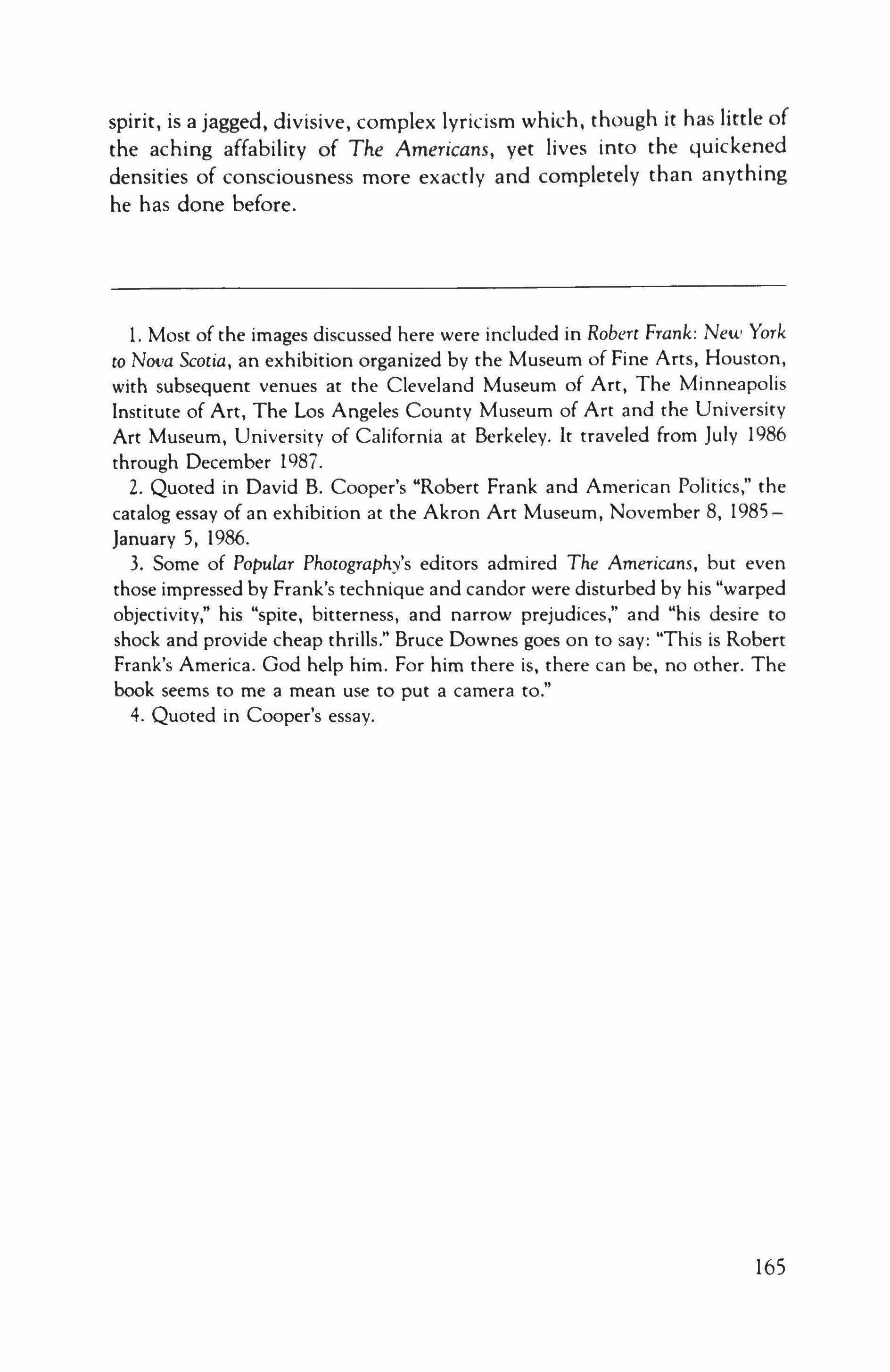
1. Most of the images discussed here were included in Robert Frank: New York to Nova Scotia, an exhibition organized by the Museum of Fine Arts, Houston, with subsequent venues at the Cleveland Museum of Art, The Minneapolis Institute of Art, The Los Angeles County Museum of Art and the University Art Museum, University of California at Berkeley. It traveled from July 1986 through December 1987.
2. Quoted in David B. Cooper's "Robert Frank and American Politics," the catalog essay of an exhibition at the Akron Art Museum, November 8, 1985January 5, 1986.
3. Some of Popular Phocography's editors admired The Americans, but even those impressed by Frank's technique and candor were disturbed by his "warped objectivity," his "spite, bitterness, and narrow prejudices," and "his desire to shock and provide cheap thrills." Bruce Downes goes on to say: "This is Robert Frank's America. God help him. For him there is, there can be, no other. The book seems to me a mean use to put a camera to."
4. Quoted in Cooper's essay.
165
The Flexible Rule: An Essay on the Ethical Imagination
Alan Shapiro
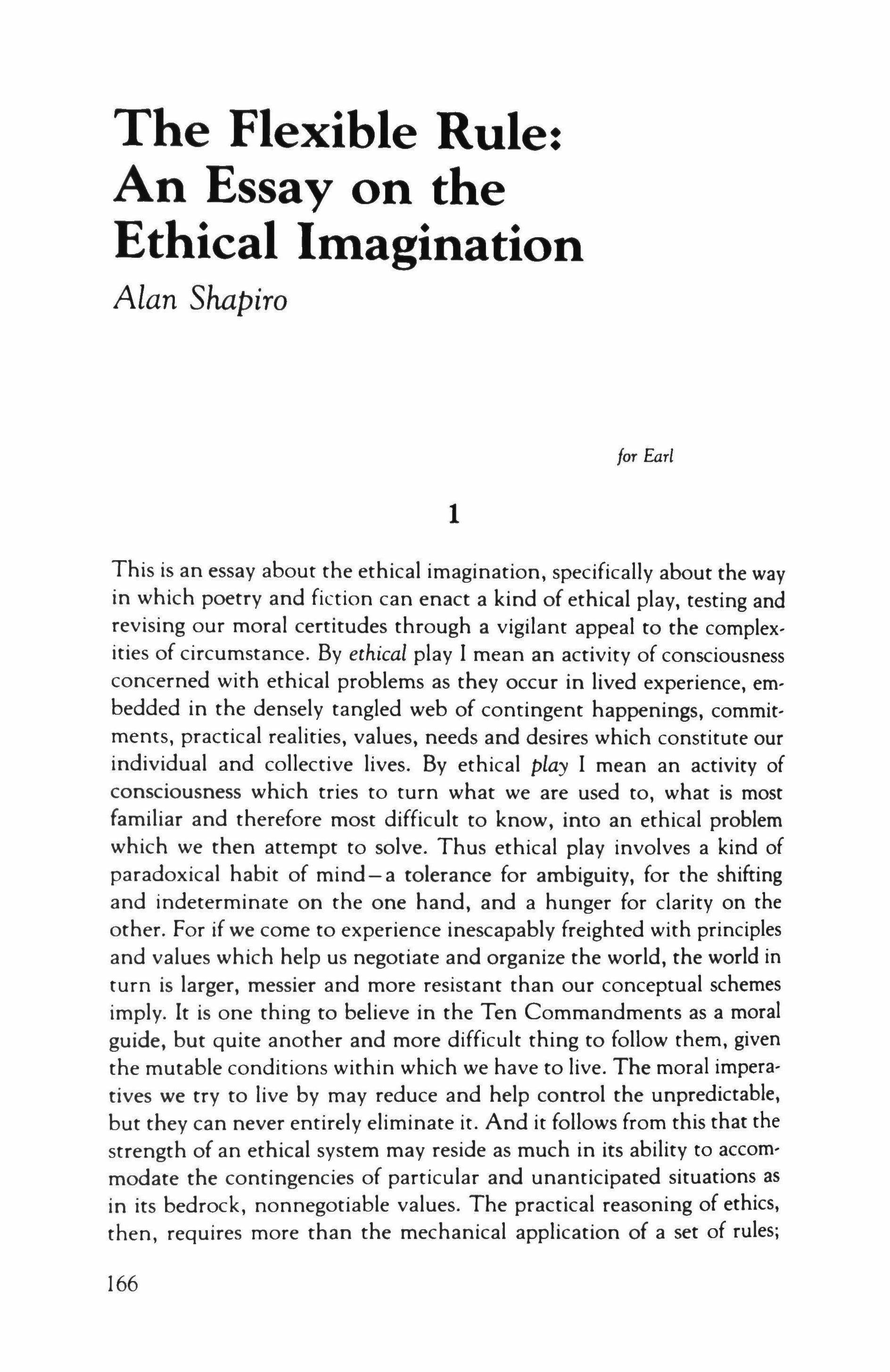 for Earl
for Earl
1
This is an essay about the ethical imagination, specifically about the way in which poetry and fiction can enact a kind of ethical play, testing and revising our moral certitudes through a vigilant appeal to the complexities of circumstance. By ethical play I mean an activity of consciousness concerned with ethical problems as they occur in lived experience, embedded in the densely tangled web of contingent happenings, commitments, practical realities, values, needs and desires which constitute our individual and collective lives. By ethical play I mean an activity of consciousness which tries to turn what we are used to, what is most familiar and therefore most difficult to know, into an ethical problem which we then attempt to solve. Thus ethical play involves a kind of paradoxical habit of mind-a tolerance for ambiguity, for the shifting and indeterminate on the one hand, and a hunger for clarity on the other. For if we come to experience inescapably freighted with principles and values which help us negotiate and organize the world, the world in turn is larger, messier and more resistant than our conceptual schemes imply. It is one thing to believe in the Ten Commandments as a moral guide, but quite another and more difficult thing to follow them, given the mutable conditions within which we have to live. The moral imperatives we try to live by may reduce and help control the unpredictable, but they can never entirely eliminate it. And it follows from this that the strength of an ethical system may reside as much in its ability to accommodate the contingencies of particular and unanticipated situations as in its bedrock, nonnegotiable values. The practical reasoning of ethics, then, requires more than the mechanical application of a set of rules;
166
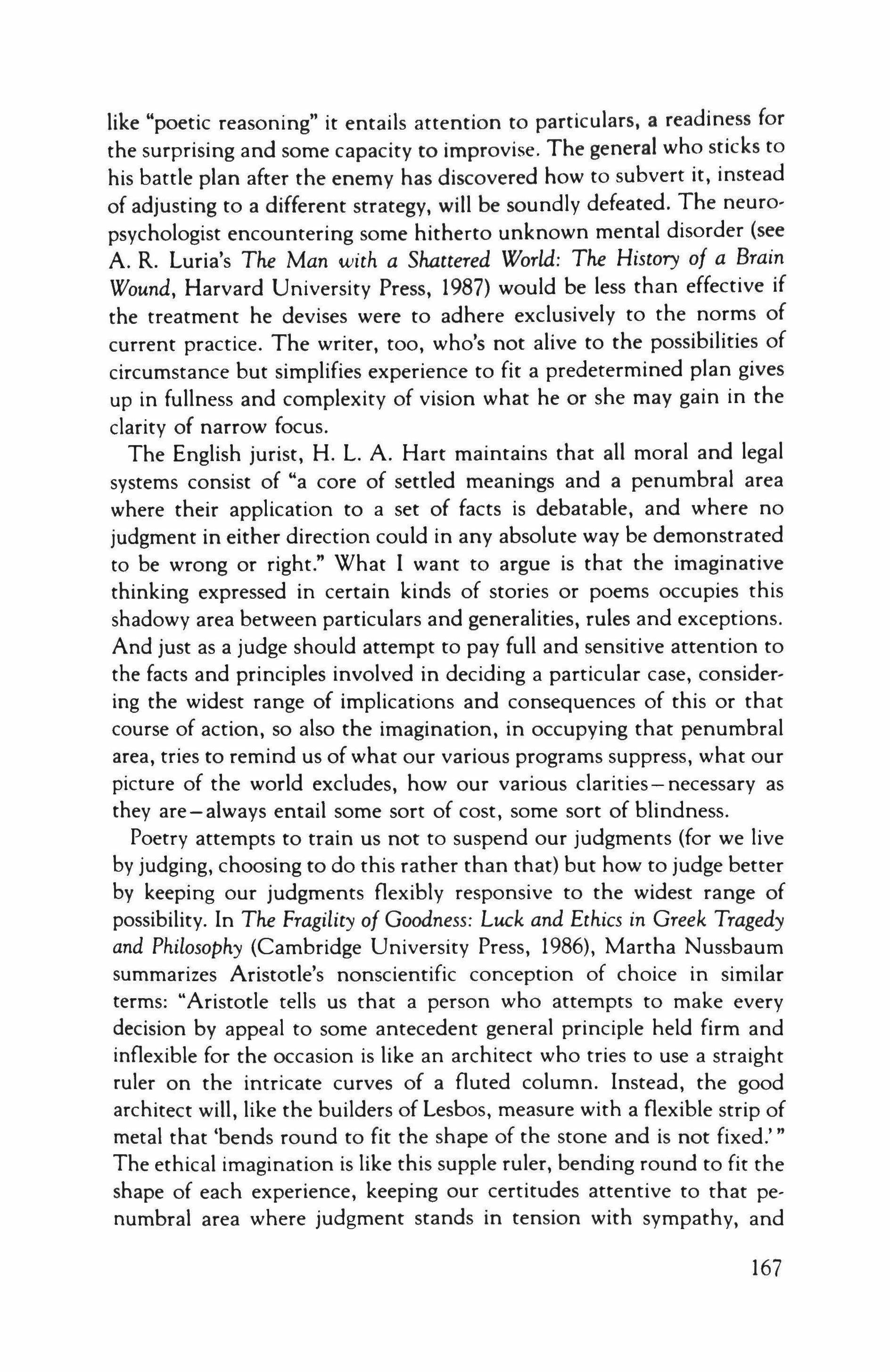
like "poetic reasoning" it entails attention to particulars. a readiness for the surprising and some capacity to improvise. The general who sticks to his battle plan after the enemy has discovered how to subvert it, instead of adjusting to a different strategy, will be soundly defeated. The neuropsychologist encountering some hitherto unknown mental disorder (see A. R. Luria's The Man with a Shattered World: The History of a Brain Wound, Harvard University Press, 1987) would be less than effective if the treatment he devises were to adhere exclusively to the norms of current practice. The writer, too, who's not alive to the possibilities of circumstance but simplifies experience to fit a predetermined plan gives up in fullness and complexity of vision what he or she may gain in the clarity of narrow focus.
The English jurist, H. L. A. Hart maintains that all moral and legal systems consist of "a core of settled meanings and a penumbral area where their application to a set of facts is debatable, and where no judgment in either direction could in any absolute way be demonstrated to be wrong or right." What I want to argue is that the imaginative thinking expressed in certain kinds of stories or poems occupies this shadowy area between particulars and generalities, rules and exceptions. And just as a judge should attempt to pay full and sensitive attention to the facts and principles involved in deciding a particular case, considering the widest range of implications and consequences of this or that course of action, so also the imagination, in occupying that penumbral area, tries to remind us of what our various programs suppress, what our picture of the world excludes, how our various claritiesnecessary as they are-always entail some sort of cost, some sort of blindness.
Poetry attempts to train us not to suspend our judgments (for we live by judging, choosing to do this rather than that) but how to judge better by keeping our judgments flexibly responsive to the widest range of possibility. In The Fragility of Goodness: Luck and Ethics in Greek Tragedy and Philosophy (Cambridge University Press, 1986), Martha Nussbaum summarizes Aristotle's nonscientific conception of choice in similar terms: "Aristotle tells us that a person who attempts to make every decision by appeal to some antecedent general principle held firm and inflexible for the occasion is like an architect who tries to use a straight ruler on the intricate curves of a fluted column. Instead, the good architect will, like the builders of Lesbos, measure with a flexible strip of metal that 'bends round to fit the shape of the stone and is not fixed.' " The ethical imagination is like this supple ruler, bending round to fit the shape of each experience, keeping our certitudes attentive to that penumbral area where judgment stands in tension with sympathy, and
167
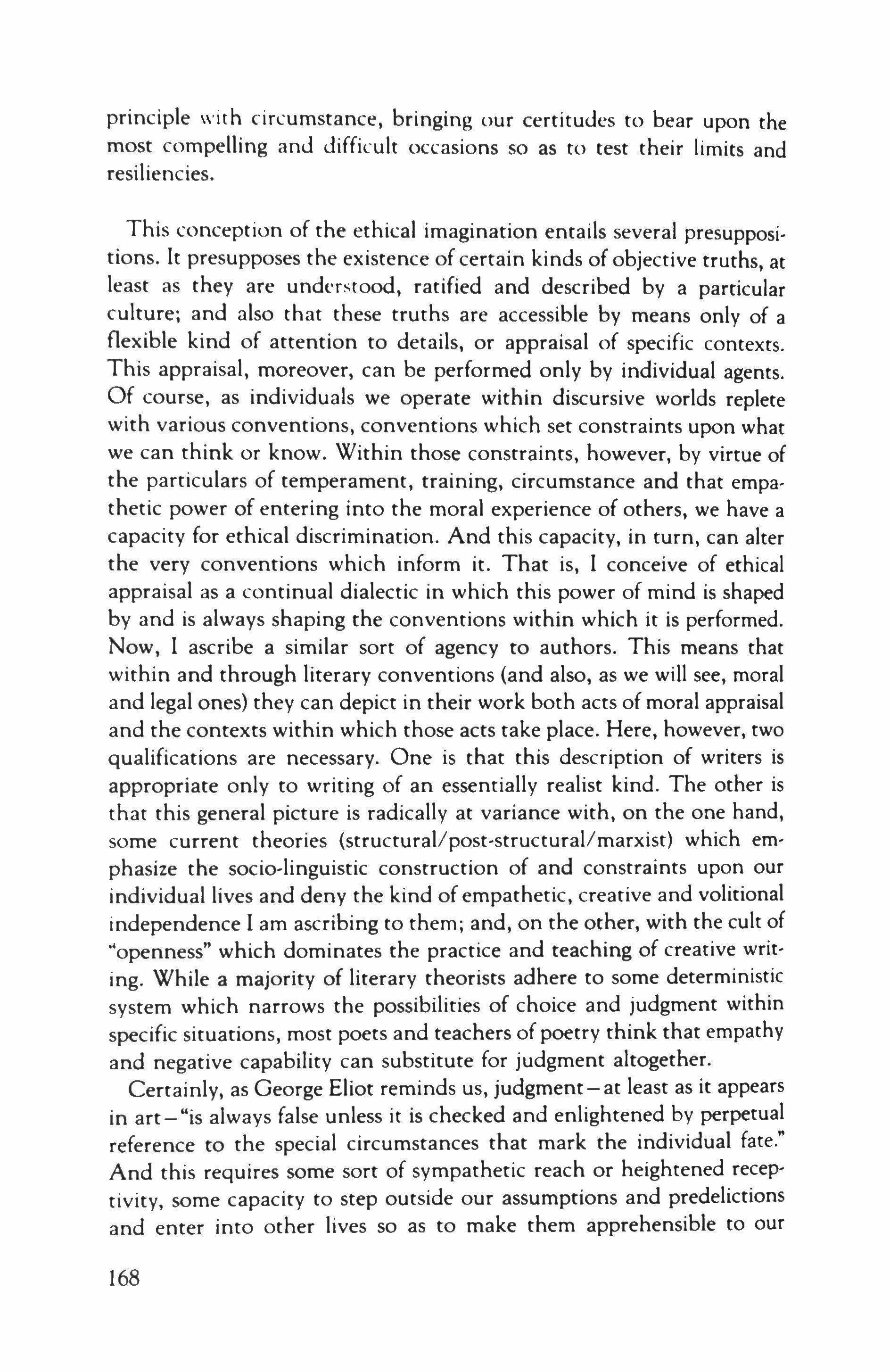
principle with circumstance, bringing our certitudes to bear upon the most compelling and difficult occasions so as to test their limits and resiliencies.
This conception of the ethical imagination entails several presuppositions. It presupposes the existence of certain kinds of objective truths, at least as they are understood, ratified and described by a particular culture; and also that these truths are accessible by means only of a flexible kind of attention to details, or appraisal of specific contexts. This appraisal, moreover, can be performed only by individual agents. Of course, as individuals we operate within discursive worlds replete with various conventions, conventions which set constraints upon what we can think or know. Within those constraints, however, by virtue of the particulars of temperament, training, circumstance and that empathetic power of entering into the moral experience of others, we have a capacity for ethical discrimination. And this capacity, in turn, can alter the very conventions which inform it. That is, I conceive of ethical appraisal as a continual dialectic in which this power of mind is shaped by and is always shaping the conventions within which it is performed. Now, I ascribe a similar sort of agency to authors. This means that within and through literary conventions (and also, as we will see, moral and legal ones) they can depict in their work both acts of moral appraisal and the contexts within which those acts take place. Here, however, two qualifications are necessary. One is that this description of writers is appropriate only to writing of an essentially realist kind. The other is that this general picture is radically at variance with, on the one hand, some current theories (structurallpost-structural/marxist) which emphasize the socio-linguistic construction of and constraints upon our individual lives and deny the kind of empathetic, creative and volitional independence I am ascribing to them; and, on the other, with the cult of "openness" which dominates the practice and teaching of creative writing. While a majority of literary theorists adhere to some deterministic system which narrows the possibilities of choice and judgment within specific situations, most poets and teachers of poetry think that empathy and negative capability can substitute for judgment altogether.
Certainly, as George Eliot reminds us, judgment-at least as it appears in art- "is always false unless it is checked and enlightened by perpetual reference to the special circumstances that mark the individual fate." And this requires some sort of sympathetic reach or heightened receptivity, some capacity to step outside our assumptions and predelictions and enter into other lives so as to make them apprehensible to our
168
understanding. To understand the experience of others may presuppose some initial act of sympathy. But if all we do is pass chameleon-like into another life, we leave ourselves no basis for determining the significance of the experience we seek to understand. That is, to understand experience means in some sense to place it in relation to our needs and values, to see what it is good for. Sympathy divorced from judgment is as incomplete, as false, as judgment which stands too magisterially over and against the special circumstances of the individual. Moreover, though we like to think that Keatsian empathy is itself a moral property, it seems to me more true to say it's a morally neutral quality of mind that can have moral consequences, but in and of itself implies no moral position or principle, since uninformed by some particular judgment it can take morally contradictory forms. Thus, by upbringing and temperament someone could be predisposed to feel especially sympathetic to the plight of Nazis after Hitler; or to the criminally insane; to striking coal miners or to the bosses they strike against. Or my negative capability may be so acute and indiscriminate that I sympathize with everyone, good and bad alike, and am unable thus to weigh the justness of competing claims. Think in this connection of the souls we meet in the third canto of Dante's Inferno. These are the living dead who, Virgil tells us, lived without praise or blame and are therefore relegated only to the outskirts of hell, spurned by the damned as well as by the blessed. Their sin was moral neutrality. And whether this arose from too much or too little empathy, equal concern for everyone, or equal indifference, either extreme amounts to the same ethical paralysis. Exiled from heaven and hell alike, they share this moral no-man's-land with those angels who neither rebelled with Satan nor kept faith with God but merely stood apart, in sympathy perhaps for both opposing points of view. The imagination mediates between the moral and sympathetic faculties, between that which separates so as to discern and order, and that which merges so as to feel, participating in both, restricted to neither, encouraging flexibility of response when our responses grow straight-edged and rigid, and firmness of measure when they're ill-defined and too pliantly at the mercy of occasion.
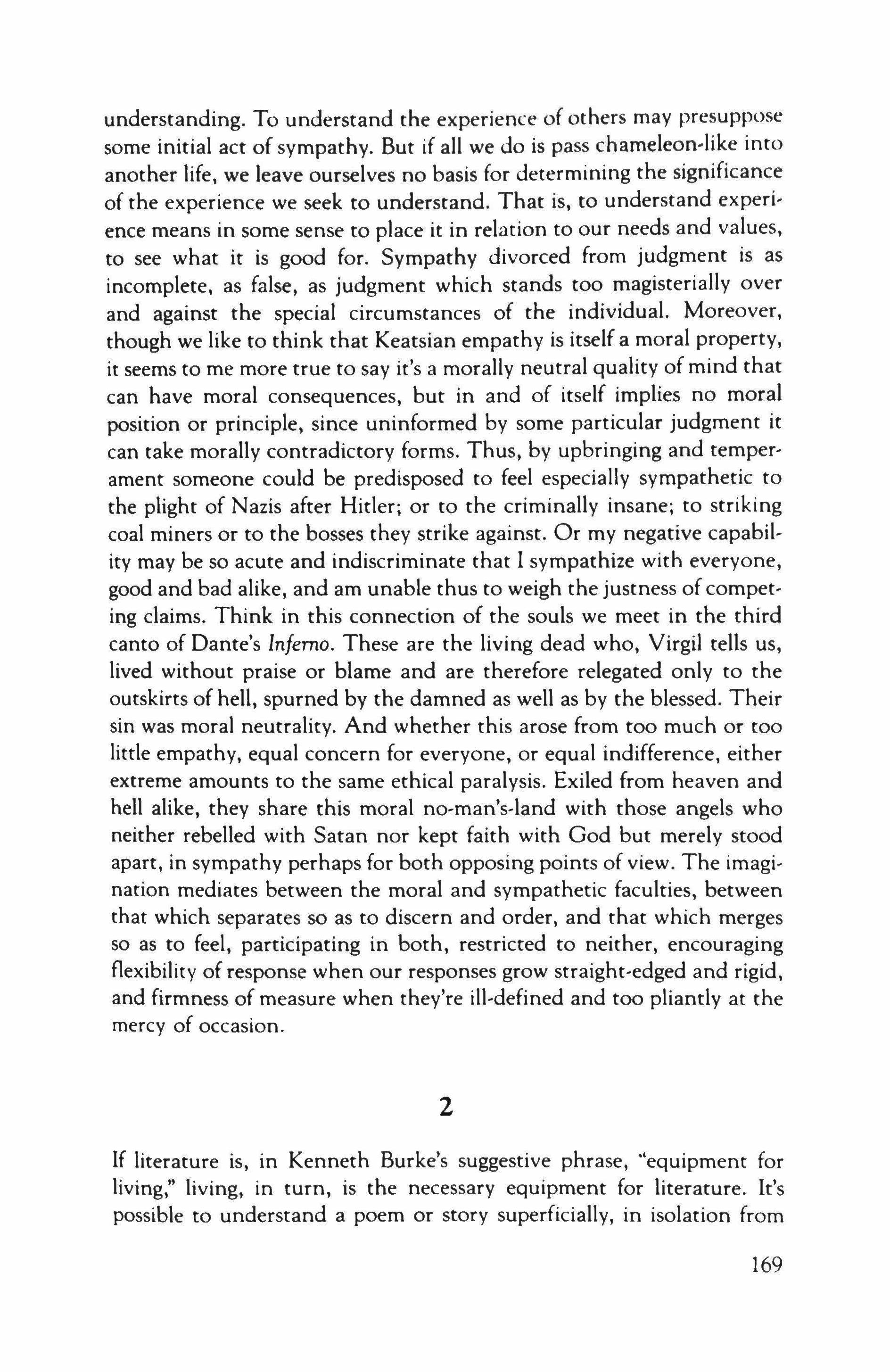
If literature is, in Kenneth Burke's suggestive phrase, "equipment for living," living, in turn, is the necessary equipment for literature. It's possible to understand a poem or story superficially, in isolation from
2
169

the world that generates it. To read more profoundly, though, to realize its meaning with our very nerves, is quite another matter. This requires a kind of readiness which only life itself can give us. This is what Eugenio Montale means when he talks about the second life of poetry, the life it takes on in us years after our initial reading, when it coalesces with some unforeseen experience, when some occasion suddenly recalls it, and it comes to us bearing its gift of revelation. The process is of course reciprocal, for reading itself is part of life, and literature prepares us for the reception of experience just as much and continually as experience prepares us for the reception, the realization, of a story or poem.
Very powerfully ten years ago I discovered this second life of literature in connection with Herman Melville's novel Billy Budd. I first read Billy Budd in high school or college, at an age and in a context where it could mean little more to me than an academic exercise. In 1978, though, when I was living in the San Francisco area, the extraordinary trial of Dan White sent me back to it. For both the novel-particularly the trial scene which stands at the center of it - and the Dan White case brought into painful focus the knotty, complex issues of sympathy and judgment which moral and literary acts entail. Comparing the two, moreover, helped me to see and understand the salient features of both trials, features I would not have seen so clearly had I encountered either trial in isolation.
Dan White, you'll recall, was the San Francisco city supervisor who murdered Mayor George Moscone and Harvey Milk, a fellow supervisor and gay-rights activist. White's attorney mounted what came to be called the "Twinkie Defense," pleading for a verdict of voluntary manslaughter on the grounds of temporary insanity (the technical term for this is "diminished capacity") brought on by two Twinkies White had eaten on the morning of the crime, thus turning him homicidal by raising the level of sugar in his blood and violently intensifying a manicdepressive tendency. As a good defense attorney will do, White's lawyer appealed throughout the trial to the jurors' biases; all of them were, like White himself, working-class people disaffected with a liberal city government they regarded as more responsive to the morally aberrant and socially marginal than to themselves, the mainstream, law-abiding citizenry. Indeed, White himself was elected to office on a staunchly conservative platform of law and order. As he wrote in his campaign literature, "I am not going to be forced out of San Francisco by splinter groups of radicals, social deviates and incorrigibles. You must realize there are thousands upon thousands of frustrated angry people such as yourselves
170

waiting to unleash a fury that can and will eradicate the malignancies which blight our beautiful city." He represented the interests of those who believed in the received, if ill-defined, conventional values of family, country and God. And throughout his term in office he was continually opposed and frustrated by what he perceived to be the doubledealing and corruption of city politics. Time and again he was outmaneuvered by the more politically adroit and more flamboyant Harvey Milk, whose progressive policies and homosexuality came to embody everything that White opposed. Partly because of these frustrations, and partly because of the financial strains of trying to raise a family on a city supervisor's meager salary (his wife had just recently given birth to their first child), White resigned his seat. Ten days later, in response to pressure from the Police Association and the Board of Realtors, whose interests Dan White also represented, he asked Moscone for his seat back, and Moscone at first agreed, and then because of pressure from the gay community, particularly from Harvey Milk, he reneged on his promise and appointed someone more politically congenial to the board of supervisors. To White, the decorated Vietnam vet, the ex-cop, ex-fireman, hard-working family man, this seemed like the ultimate betrayal, and the rage it triggered, a rage compounded by the myriad other pressures he was under at the time, and apparently by the junk food he ate that morning for breakfast, pushed him over the edge of sanity and made him strike back at the two men he thought responsible for his political demise.
Ideally, in a court of law evidence and not emotion is supposed to rule. Not that emotion can ever be eliminated in the adjudication of a case. But what the evidentiary rules try to ensure is that the biases in favor of or against a defendant be minimized as much as possible so that the evidence itself determines judgment. Which is to say, a jury is only as reasonable as the evidence that's brought before it. And without question the defense made a more effective argument than the prosecution, which throughout the trial seemed disorganized, unprepared and halfhearted in pursuing a conviction of first-degree murder. Aside from the fact that Tom Norman, the prosecuting attorney, took only three days to present his case and seldom cross-examined the array of psychiatrists, social workers, friends and relatives whom the defense called to testify for White, he never himself raised the question of motive, never so much as alluded to the political feuding between White and Moscone, and White and Milk. Instead, as Randy Shilts points out in his biography of Harvey Milk, The Mayor of Castro Street (St. Martin's, 1988), "Norman had simply given the chronology of the murders without a
171

hint of the motive." (Motive, of course- "malice aforethought" - is one of the crucial elements in the legal definition of first-degree murder.) Moreover, during the jury selection process, Norman used only six of his twenty-six preemptory challenges and thereby allowed the defense to pack the jury with white working-class ethnic Catholics, like White. Whatever the reasons, and conspiracy theories abounded at the time, the prosecution never contested the defense's central thesis that "good people, fine people, with fine backgrounds" - people like the jurors themselves- "simply don't kill people in cold blood."
As my brief summary indicates, the story the defense attorney told was tailored to fit the biases and fears of the jury. It's a story which emphasized Dan White's background and character; it appealed to the jurors' sympathies, their identification with a man who was presented to them as no more a murderer than they were, a man, moreover, who shared their values, their concern for family, but whose high ideals were poorly suited for the slick practicalities city politics required. "Dan White," the defense attorney argued, "was supremely frustrated with crime and the politics of the city, and saw the city deteriorating as a place for the average and decent people to live." The city government itself and its liberal policies were put on trial, while Dan White and the beleaguered values he represented were portrayed as victims, a portrayal the prosecution never challenged. The jury from the start was predisposed in White's favor, so much so that even when the prosecution played the tape of White's confession taken hours after the crime, four of the jurors were brought to tears by the sound of his tortured voice describing the various pressures that finally made him snap. It was no surprise then that the jury found Dan White guilty of just two counts of voluntary manslaughter, for which White was sentenced to seven years of prison.
Beyond determining whether or not a defendant has committed an alleged offense (in Dan White's case there was no ambiguity on this point), a court of law does more than merely fit a legal statute to a particular act. Insofar as it also allows social and psychological contingencies to inform how a legal statute should apply to that act, the judicial process bears important similarities to the ethical imagination, as I described it earlier. In a sense, the interplay of argument and counter-argument, sympathetic or unsympathetic appeal and counterappeal, which the defense and prosecution bring before a jury, is the judicial equivalent of the imaginative play literary works enact. A writer tries to exercise the fullest range of faculties upon his subject so that whatever judgment is attained emerges from a full engagement with the experiential evidence. He fails, moreover, when he tries to force the
172

evidence to fit a preconceived idea. when his judgment seems a measure of his insulation from experience. not engagement with it. Likewise. the judicial process ideally tries to bring the fullest play of argument before a jury. and it follows from this that the more vigorous the play, the greater chance there'll be for a fair and responsible hearing. Where there's collusion. however, or incompetence, no serious play occurs. In the Dan White trial, only a semblance of this interplay took place. and consequently only one argument was heard, an argument which shaped the evidence so as to appeal to the feelings and values of a conservative, homophobic jury who identified with White. White. then, became for them a kind of lightning rod for their own sense of fear, anger and powerlessness.
Their sympathetic judgment, though, triggered a riot of sterner judgments in the streets. Hours after the verdict was handed down. thousands of gays gathered at City Hall. Chanting slogans like "Dan White. Dan White/Hit man for the New Right" and "All straight jury/no surprise/Dan White lives/And Harvey dies," they rioted through the night, breaking windows, torching police cars and battling the police. Randy Shilts reports that as a young man torched a last police car, he shouted to a reporter, "Make sure you put in the paper that I ate too many Twinkies."
3
The trial Melville depicts represents in my mind an equally extreme but diametrically opposed response to the tension between judgment and sympathy. For if the jurors in the Dan White case seemed to consider only the extenuating circumstances of the crime, Captain Vere, in judging Billy, considers only the crime itself, the violated rule of law, and none of the mitigating factors, including the love he feels for the man he must condemn.
This story is simpler in outline than the Dan White case yet it dramatizes a more complicated set of problems. Serving on a British warship in the last decade of the eighteenth century, in the revolutionary era, Billy Budd, an impressed sailor, is called before the captain and falsely accused of conspiracy by John Claggart, the master of arms, a man of innate depravity, bent on destroying Billy for no reason beyond the fact that Billy has an innocent heart, good looks and is liked by everyone. Being unreflective and, when agitated, incapable of speech, Billy responds to the accusation by striking and killing Claggart. The trial that
173

follows brings into dramatic focus a host of oppositions which the story up to this point has raised. The most obvious one, of course, is that embodied in Billy and Claggart - an opposition not just between good and evil hut between two innate and "natural" propensities, one of which stands outside the trappings of civilized life and is ill-suited to the "moral obliquities" and "sinister dexterities" civilized life requires, and the other which easily "folds itself into the mantle of respectability," manipulating all of the external qualities we think of as pertaining to the preservation of an orderly rational life-sobriety, deference, selfcontrol-so as to satisfy an irrational aim. Whereas Billy is described as an "upright barbarian" with a nature as simple and innocent as "Adam before the urbane serpent wriggled himself into his company," Claggart's nature "has no vulgar alloy of the brute" in it, but is dominated by intellectuality, and "a cool judgment sagacious and sound." Feeling and reason, "primeval nature" and "formalized humanity," the claims of private conscience versus the expediencies of public order-these are some of the antitheses which the characters of Budd and Claggart evoke, and which Captain Vere internalizes during the trial scene.
Captain Vere occupies a kind of psychological middle ground between the extremes Billy and Claggart symbolize. He comprehends and is deeply moved by Billy's essential innocence but because of his position of authority is compelled to act strictly in accordance with the military code of law. He strongly feels the claims of private conscience but must act against them. To treat such a capital offense with any leniency, especially in time of war and shortly after the Nore and Spithead mutinies, would set a dangerous example for the other sailors. Thus, he insists to his uncertain and wavering officers that they exclude from their judgment all questions of provocation and motive, which is a matter "for psychologic theologians to discuss. But what has a military court to do with it?
The prisoner's deed-with that alone we have to do." The emotional considerations to which the jurors in the Dan White case succumbed, Vere excludes without at the same time denying the force, emotional and moral, of such considerations. His very movements during the trial dramatize his sense of conflict: "Turning, he to-and-fro paced the cabin athwart; in the returning ascent to windward climbing the slant deck in the ship's lee roll, without knowing it symbolizing thus in his action a mind resolute to surmount difficulties even if against primitive instincts strong as the wind and the sea." We see in Vere the effects of war upon the ethical imagination. For if it is imagination which enables Vere to see and feel beyond his military role, to perceive within this situation the moral ambiguities and injustices which the
174

military law cannot acknowledge, the exigencies of war, in turn, prohibit him from acting in accordance with those feelings and perceptions. Wars, even just wars, thrive on the narrowing of moral agency, reducing the self as much as possible to a military instrument whose efficiency depends on limiting free deliberation and flexibility of thought and feeling, capacities which the ethical imagination tries to cultivate. Thus, when Billy cries out, just before his execution, "God bless Captain Vere!," Vere shows no emotion, but stands "rigid as a musket in the shiparmorer's rack."
Yet if we're encouraged, as I think we are, to sympathize with Vere, our sympathy isn't meant to be unqualified. True, Melville does go to great lengths to describe the context which influences Vere's decision: considering the revolutionary temper of the times and the recent mutinies which beset the British navy, some of whose participants are currently on board his ship, plus the particular scouting expedition he is undertaking, not to mention the fact that when the murder happens the Bellipotent is farthest from the fleet, Vere could hardly have acted differently. At the same time, the depiction of Vere's character isn't unambiguous. Though the narrator tells us Vere has "a marked leaning toward everything intellectual," and that he loves books, particularly those "treating of actual men and events no matter of what era - history, biography, and unconventional writers like Montaigne, who, free from cant and convention, honestly and in the spirit of common sense philosophize upon realities," we also learn that Vere is a man of fixed ideas and settled principles, someone for whom reading does not change or enlarge his mind but only confirms "his own more reserved thoughts": there had got to be established in him some positive convictions which he forefelt would abide in him essentially unmodified so long as his intelligent part remained unimpaired" -convictions, the narrator goes on to say, which "were as a dike against those invading waters of novel opinion social, political and otherwise, which carried away as in a torrent no few minds in those days We sympathize with Vere's dilemma; at the same time we see his limitations, that he seems too readily disposed by temperament and character to resolve any moral ambiguities through the austere application of rule, even if this is what the necessities of war require. What makes Vere so interesting is that in terms of feeling and perception he is like the good architect whose supple measure can "bend round to fit the shape of the occasion," but in terms of judgment he is like the one whose rule is straight-edged, even on a fluted column.
The character, though, who most approximates the Aristotelian ideal
175

of a flexibly inclusive vision is the narrator of the tale. It is the narrator who, directly or indirectly, reminds us continually of the most profound dichotomy which underlies the others we have mentioned, the dichotomy between the closure of the "measured forms" we live by and the radical complexity of truth, irreducibly ambiguous and many-sided and which our rules and systems attempt to tidy up in order to control. This dichotomy is crucially involved with the problem of representation, for, as the narrator tells us, "The symmetry of form attainable in pure fiction cannot so readily be achieved in a narration essentially having less to do with fable than with fact. Truth uncompromisingly told will always have its ragged edges." Throughout the novel, moreover, the narrator distinguishes between the story he's attempting to relate, a story which aims at the fullness of truth and is therefore, in its fidelity to detail, necessarily digressive and loosely shaped, and whose judgments and sympathies are complex and guarded, and those narrations which simplify in order to serve ulterior purposes and interests, like the naval historians who may make mention of mutinies without supplying the politically unflattering details, or like the published, official version of the murder and execution which we are given at the novel's end, which reshapes the events and characters (Billy as foreign-born criminal and Claggart as English victim) so as to reinforce the ideals of war and discipline. The narrator likewise distinguishes the aim and method of his own narration from other literary genres-from the patriotic songs of Dibdin, for instance, which serve as "no mean auxiliary to the English government," and from the Gothic romance which has to do primarily with mysteries of plot, and not (as his tale does) with mysteries of character, which don't permit of any easy resolution. The novel's dramatizing, complex, open form represents Melville's allegiance to the ethical imagination and its preoccupation with penumbral areas, zones of experience which are inherently problematic and where no absolute judgment of right or wrong is available.
The narrator, of course, is not participating in the events which he describes and can therefore afford a luxury of vision not available to the characters themselves. Yet what the narrator's fidelity to the truth with all its jagged edges helps us see is how M 'the forms, measured forms'" which Vere confides in are as morally unstable and limiting as they are socially necessary. In putting Billy to death, Vere upholds and safeguards the public order not just to serve the purposes of war, but also-so we learn later-to satisfy "the most secret of all passions, ambition, never attained to the fulness of fame," because he dies in battle shortly after Billy's execution. And if Vere is the upholder of forms, Claggart, the
176

master of arms, is the master of forms, manipulating public order to carry out a private hate.
And this in turn raises another question. If we measure the sophistication of a legal system not just by its laws but by the flexibility with which the laws are fitted to particular occasions, by their elasticity in relation to penumbral areas, we must acknowledge that this pliancy is also what provides a refuge for the sort of evil Claggart dramatizes. It allows evil an orderly continuance; it allows, too, for the distorting appeals to svrnpathetic feeling which that other master of forms, the lawyer for Dan White, was able to achieve. Melville's own political allegiance may fall closer to the humane yet conservative Vere than to the "bloody reforms" going on across the channel. As a citizen, he may believe with Montaigne, Vere's favorite author, that "the greatness of mind is not so much to draw up and hale forward, as to know how to range, direct and circumscribe itself." As an artist, though, whose ultimate allegiance is to the truth and all its jagged edges, he sees that custom, to quote Montaigne again, "is a violent and deceiving school-mistress," that "nothing can be certainly established," both the judging and the judged being in continual alteration and motion, and that we should not be "servily subjected to common laws, but rather with judgment and voluntary liberty apply ourselves unto them."
4
The world of The Agamemnon, the first play in Aeschylus' Orestia, is sunk in various conflicting darknesses, and what light there is is only the false light of murderous self-justification which further deepens and perpetuates the violent gloom. This is a world fraught with pious killers, all appealing to a different history to justify their crimes - a world in which moral claim clashes with moral claim, in which allegiance to one good violates another, and not just between the principal characters but also, and more poignantly, within their minds and hearts. What the play examines is not so much how the characters act, since all the actions are predetermined and inescapable, but how they each respond, emotionally and psychologically, to the dilemma they inherit, how they each attempt to simplify the moral complexity that faces them in order to act the way they do.
Agamemnon is our case in point. "The jugglery of circumstance" has placed him, as it does Vere, between two bad alternatives, two mutually exclusive claims. To appease Artemis and carry out the expedition
177

against Troy, he has to sacrifice his daughter, Iphigenia, but in so doing he will incur the anger of the earth gods, the ancient protectors of the hearth, of familial ties and obligations. Or he can sacrifice the Trojan expedition and save his daughter but in so doing offend almighty Zeus. Either way he risks impiety. "My fate is angry if I disobey these, but angry if I slaughter this child, the beauty of my house, with maiden bloodshed staining these father's altars." Once he decides to sacrifice Iphigenia, though, something peculiar happens. His emotional turmoil disappears. "It is right," he says. "Mayall be right in the end." In her discussion of the play, Martha Nussbaum shows us how Agamemnon "from the moment he makes his decision itself, the best he could have made strangely turns himself into a collaborator, a willing victim." For Vere, the inner agony, the emotional dilemma, continues and intensifies, even after he decides which course of action he must take. At the moment of decision the "military disciplinarian" replaces the father in him without at the same time destroying it. He continues to feel the full force of the conflicting claims, the full range of its emotional implications. For Agamemnon, as Nussbaum demonstrates, the command to sacrifice his daughter enables him to sacrifice his fatherly attachment. Ignoring her "pitying looks," he has her lifted, so the Chorus tells us, "as you might lift a goat for sacrifice." Nussbaum observes that "his only acknowledgment of her human status is his command to stop her mouth, so she will not utter inauspicious curses against his house. And even this command uses animal language: they are to check her voice"by the force and the voiceless power of the bridle." One can see the psychological utility of such coldheartedness: it insulates him from the full effects of what he's doing; it releases him from conflict. But in so doing it diminishes him as a human being. Thus the chorus tells us how "from the heart the breath came bitter and sacrilegious, utterly infidel, to warp a will now to be stopped at nothing." Though the killing has the sanction of divine command, it is as if under the cover of that sanction, Agamemnon gives in to an unholy and violent passion, as if the killing's unavoidable necessity enables him to act out a forbidden bestiality, a bestiality that desecrates the familial order.
As Clvraernnestra says, to justify her murderous act of vengeance "with no thought more than as if a beast had died he slaughtered like a victim his own child." And yet like Agamemnon she simplifies her vision of her situation, for she too is caught between conflicting ties, and can neither act nor refuse to act without incurring blame. Thus she absolutizes one claim - she is lphigenia's mother- and denies the other (as she tells the chorus, "speak of me never more as the wife of Agamem-
178

non"), so as to kill her husband without remorse, with a kind of blasphemous delight: "When he was down I struck him the third blow, in thanks and reverence to Zeus the lord of dead men underneath the ground and as he died he spattered me with the dark red and violent driven rain of bitter savored blood to make me glad, as gardens stand among the showers of God in glory at the birthtime of the buds."
What we have here are two rival conceptions ofjustice, one associated with the feminine, private world of home and family loyalties, and one associated with the public, male-dominated world of war and civic enterprise, which feeds off the children mothers rear. These antithetical allegiances, moreover, mediate almost everything each character says or sees. The allegiances circumscribe the characters' vision and the range of their responsiveness. Clvtaemnesrra, for instance, thinks exclusively in terms of family relations. Even her description of the murder is fraught, ironically, with images of fertility and nurturance (blood falling like rain over gardens "at the birthtirne of the buds"). Likewise, when she describes the taking of Troy, she's compelled to depict not Achaean glory, but the familial devastation which the Trojans themselves have suffered ("children lean to clasp the aged who begot them, crying upon the death of those most dear, from lips that never will be free"); she doesn't revel in victory but warns against the excesses victory can license ("Oh, let there be no fresh wrong done!"). Agamemnon's account of the same event says nothing at all about the family. He dissolves the concrete human realities of loss and pain into a generalized metaphor of "a wild and bloody lion" swarming "above the towers of Troy to glut its hunger lapping at the blood of kings." Inhabiting a world of citizens and soldiers, not husbands and brothers, he thinks strictly in terms of conquest and public glory. Thus, his first concern upon returning home is "the business of the city." The bloody lion becomes the public doctor who "must use medicine, or burn, or amputate" to remove the civic corruption which has flared up in his absence. That anything could be amiss at home does not occur to him.
Only the chorus seems to move between these rival worlds of value, acknowledging the justness and necessity of each without restricting their sympathies or judgments to either. They understand, as Agamemnon and Clvtaernnestra can't, that our human status is a middle state between the sky gods and the gods of earth, and that the powers of both - in their terms, of reason and instinct, light and dark, male and female, choice and necessity -comprise our very being. They also understand that this heterogeneous condition is dangerous, that our mixed allegiances can lead to conflict, and that conflict in turn can tempt us to
179

simplify or purify our lives in one direction or the other. Like the narrator \)1 Bill:v Budd. their allegiance is to the truth and all its jagged edges. and they therefore represent the ethical imagination in action. making themselves throughout the play. as Nusshaum puts it. "look. notice. respond and remember. cultivating responsiveness by working through the memory of these events. until 'the painful memory of pain drips. instead of sleep. before the heart • What they demand of the antagonists. and where they hold them accountable. is in their emotional and imaginative responses to the crimes they commit. Against the psychological evasions of an Agamemnon. which help suppress the painful moral consequences of his actions. the old men of the chorus remind us that "wisdom comes alone through suffering." Only by responding fully to experience. with feeling as well as intellect can we achieve an understanding adequate to the complexities we face. Had Agamemnon done so. he might have realized through the grief he felt the depth of his attachment to his daughter. He might have apprehended more clearly than he does the value of that attachment and the familial consequences sacrificing it would bring. In continuing to feel the force of both competing claims. even after he commits himself to one of them. he might have understood more poignantly the cost of political commitment. the personal and moral cost of war. and might have made himself a more judicious. more attentive ruler. And upon returning home he might have been a better husband. sensitive to Clvtaernnestra, or if not sensitive at least aware that things at home. within his household. could not be as he had left them ten years earlier.
If Clvtaernnestra and Agamemnon seem impervious to remorse. if they avoid the full emotional consequences of their actions and thereby act without learning (in contrast to the chorus. who learn but never act). there is at least a kind of moral progress for their son. Orestes. who seems closer to the choral ideal of full responsiveness. Though his first reaction to killing his mother is to call her "some water snake. some viper," he also grieves "for the thing done. the death. and all our race. I have won; but my victory is soiled. and has no pride." He doesn't simplify his perception of the situation; he experiences the conflict as a conflict. before and after he has acted. He knows himself to be his mother's as well as his father's son. He too could not have acted differently, but he feels differently. and it is in that different feeling that the hope for communal peace resides. It is precisely this incipient remorse and guilt. responsiveness becoming full responsibility. that leads to the trial in The Eumenides which breaks the chain of killings and restores the social order.
180
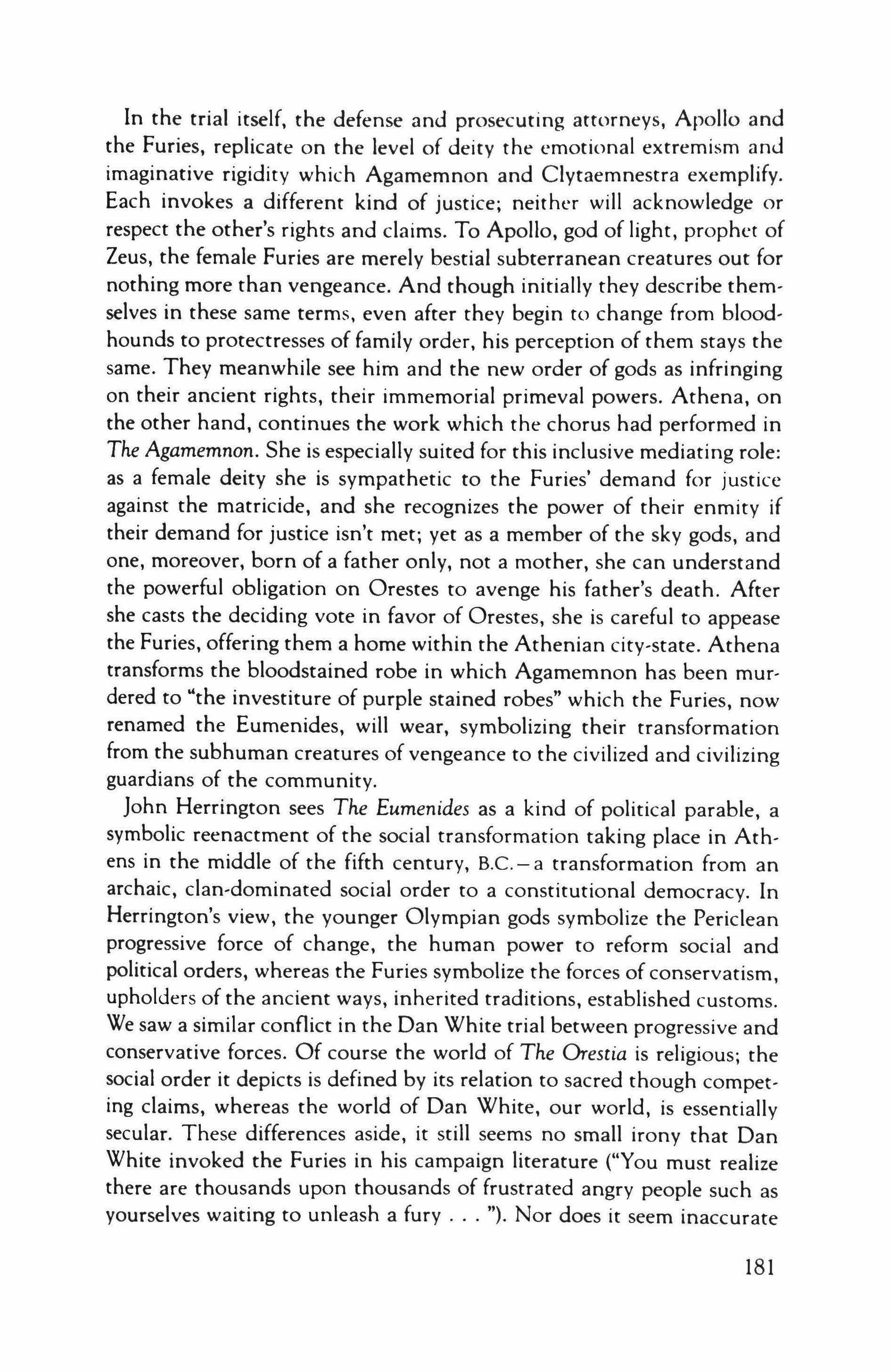
In the trial itself, the defense and prosecuting attorneys, Apollo and the Furies, replicate on the level of deity the emotional extremism and imaginative rigidity which Agamemnon and Clvtaernnestr a exemplify. Each invokes a different kind of justice; neither will acknowledge or respect the other's rights and claims. To Apollo, god of light, prophet of Zeus, the female Furies are merely bestial subterranean creatures out for nothing more than vengeance. And though initially they describe themselves in these same terms, even after they begin to change from bloodhounds to protectresses of family order, his perception of them stays the same. They meanwhile see him and the new order of gods as infringing on their ancient rights, their immemorial primeval powers. Athena, on the other hand, continues the work which the chorus had performed in The Agamemnon. She is especially suited for this inclusive mediating role: as a female deity she is sympathetic to the Furies' demand for justice against the matricide, and she recognizes the power of their enmity if their demand for justice isn't met; yet as a member of the sky gods, and one, moreover, born of a father only, not a mother, she can understand the powerful obligation on Orestes to avenge his father's death. After she casts the deciding vote in favor of Orestes, she is careful to appease the Furies, offering them a home within the Athenian city-state. Athena transforms the bloodstained robe in which Agamemnon has been murdered to "the investiture of purple stained robes" which the Furies, now renamed the Eumenides, will wear, symbolizing their transformation from the subhuman creatures of vengeance to the civilized and civilizing guardians of the community.
John Herrington sees The Eumenides as a kind of political parable, a symbolic reenactment of the social transformation taking place in Athens in the middle of the fifth century, B.C. - a transformation from an archaic, clan-dominated social order to a constitutional democracy. In Herrington's view, the younger Olympian gods symbolize the Periclean progressive force of change, the human power to reform social and political orders, whereas the Furies symbolize the forces of conservatism, upholders of the ancient ways, inherited traditions, established customs. We saw a similar conflict in the Dan White trial between progressive and conservative forces. Of course the world of The Orestia is religious; the social order it depicts is defined by its relation to sacred though competing claims, whereas the world of Dan White, our world, is essentially secular. These differences aside, it still seems no small irony that Dan White invoked the Furies in his campaign literature ("You must realize there are thousands upon thousands of frustrated angry people such as yourselves waiting to unleash a fury "). Nor does it seem inaccurate
181
to say that in striking down the two most prominent and powerful liberal politicians in the city, politicians who in his view were threatening the values of an older, more established conservative community, Dan White was acting with the Furies' blessing, and the Furies not only provided his defense, they also comprised the jury. Unlike Orestes, though, he never once expressed the least regret. And while no Athena intervened, in good choral fashion all that we who looked on could do was sound an ineffectual cry of outrage as the Furies carried out their vengeance under the investiture of law.

Directly or indirectly the ethical imagination is always asking, how should we live our lives, what should we value? At the same time it recognizes that as our circumstances change so to some extent our answers to these questions have to change as well. This recognition, however, doesn't necessarily lead to moral relativism. If we say that in the realm of moral practice there are no absolute and final certainties, we can still believe in certainties of a more local and provisional nature. Or conversely, if we say that our answers to moral questions should be conditional and open-ended we are not at the same time saying that one answer is as good as any other, or that within particular occasions there are no better or worse ways of living. The forms of western poetry may all be arbitrary cultural creations. Given these forms, however, it is possible to say that some are more capable than others as a means of understanding our experience. Imagine for a moment if Milton had tried to justify the ways of God to man in limerick stanzas, instead of blank verse paragraphs. How far would he have gotten?
The first disobedience of man, Of Adam and Eve is my plan, How the fruit God forbid them To taste had undid them, Sing Heavenly Muse once again.
It is precisely in the interests of living a better life, a life more flexibly responsive to the possibilities of being, that the ethical imagination tries to step outside even the deepest assumptions so as to turn what we know best into something strange and puzzling, thereby enabling us to see our lives, the apparent givenness and stability of our arrangements, as only a way of living, as a contingent set of possibilities always open to reform or
5
182

corruption. In its allegiance to the inclusive and many-sided, the ethical imagination attempts at all times to bear witness to whatever our various orders and conventions make invisible, setting the claims of memory and tradition against the forgetfulness of the present, and the claims of the unrealized and suppressed against the past, whose effects, of course, the present bears. It has always, therefore, a political potential, particularly in its hostility to intellectual and emotional complacency, the smug ease of the absolutist, whether of the left or of the right. However, despite this potential, the ethical imagination is not reducible to politics and should not be expected to have any particular political content. Rather, it occupies a space in and beyond culture from which the institutions and discourses of political power can be held under continual review. It is turned toward the political, in other words, but views it always from across a vital and significant distance, so as to see it clearly. Needless to say, the ethical imagination represents a power of consciousness which none of us can realize fully, or at all times. It is a power of consciousness, moreover, extremely vulnerable to the frailties and insecurities of our nature, to our need in the face of a confusing and ever more dangerous world to seek the narrow refuge of some exclusive program, or some comforting nostalgia, or the illusory stability of what often passes for "traditional values." Like the chorus in The Agamemnon, it defends the impure, heterogeneous and tense condition of the human against the equally human temptation for the unambiguous and pure.
Dan White was the voice and agent of one kind of purity. To the likeminded citizens who sat in judgment on him, he represented a nostalgia for the tribal world of small communities unsullied by the abrasive mixtures of race, religion, sexual preference or political values-a world which, of course, never existed, except on the level of their desire. If, as I suggest, the judicial process may frequently function as the legal equivalent of the open and ongoing inquiry which the ethical imagination exercises in the realm of art, the Dan White trial shows how easily corruptible that spirit of flexibility can be, that its weakness-its vulnerability-is inextricably bound up with its very strength.
Given the constraints and complexities of our attachments and needs, few of us can get through life without facing at one time or another the serious moral choices which the characters in Billy Budd and The Orestia face. No amount of vigilance can prevent situations from arising in which one loyalty clashes with another, in which no matter how we act we violate a sacred trust. To most of us, the way of Agamemnon is easier psychologically than the way of Orestes or Vere. Like Agamemnon, we try to eliminate these moral tensions by denying on the level of emotion
183

the claim we choose against. If Orestes or Vere are closer to the moral ideal, if their ethical imagination is keener than Agamemnon's, a measure of that keenness is the pain it causes, the tragic recognition it compells. Billy Budd also suggests that situations arise that are inimical to the ethical imagination, situations like war or political upheaval, which don't permit the careful and humane discriminations that are central, in my view, to the literary arts. At such times, what the ethical imagination tries to do is to remind us of what the times have sacrificed. We see this in some of Yeats's political poems: In "Easter 1916." for instance, we see how even the celebration of political martyrdom does not preclude the acknowledgment that fanaticism, even for a worthy cause, can make "a stone of the heart." It is the ethical imagination that sees and feels both the terror and the beauty in the "terrible beauty" that is born. And in reading and living with the poem we come to see and feel it too.
Art. of course, is not immune to extremism and rigidity of thought and feeling. Within the modernist movement, the tendencies toward "pure art" on the one hand, and art engage on the other, represent two attempts at eliminating the ethical imagination from the esthetic domain. The poem as pure image or pure symbol in isolation from quotidian experience, and the poem as handmaiden of ideological commitment, offer us poetic versions of the moral simplifications we see in The Orestia. They effect a similar escape from the tensions and impurities that face us in our daily lives. This is not to say, though, that Imagism as a movement, to take one example, didn't help rejuvenate the art of poetry. In abandoning the stale conventions of high Victorian Romanticism, the Imagist experiment made it possible to write a poetry more supplely attuned to sensory experience. It purified in order to renew. At the same time, in its exclusive preoccupation with attenuated flashes of perception, its confinement to a slender band of linguistic and experiential possibilities, its aversion to discursiveness of any kind, Imagism also entailed a moral cost; it purified itself of moral substance. One could make an analogous argument even about an opposite of Imagist poetry, the "protest" poetry inspired by the Spanish Civil War, or more recently by the Vietnam War. I'm not suggesting here that poetry should not address itself to social and political injustices, or that in treating subjects of a more public nature the political verse of the thirties and sixties didn't help extend the range of what poetry can say or do. But insofar as such verse fails to do imaginative justice to the injustices it calls attention to; insofar as it indulges in a self-applauding show of moral outrage, or relies on slogans and formulae, blunting its power of discrimination
184
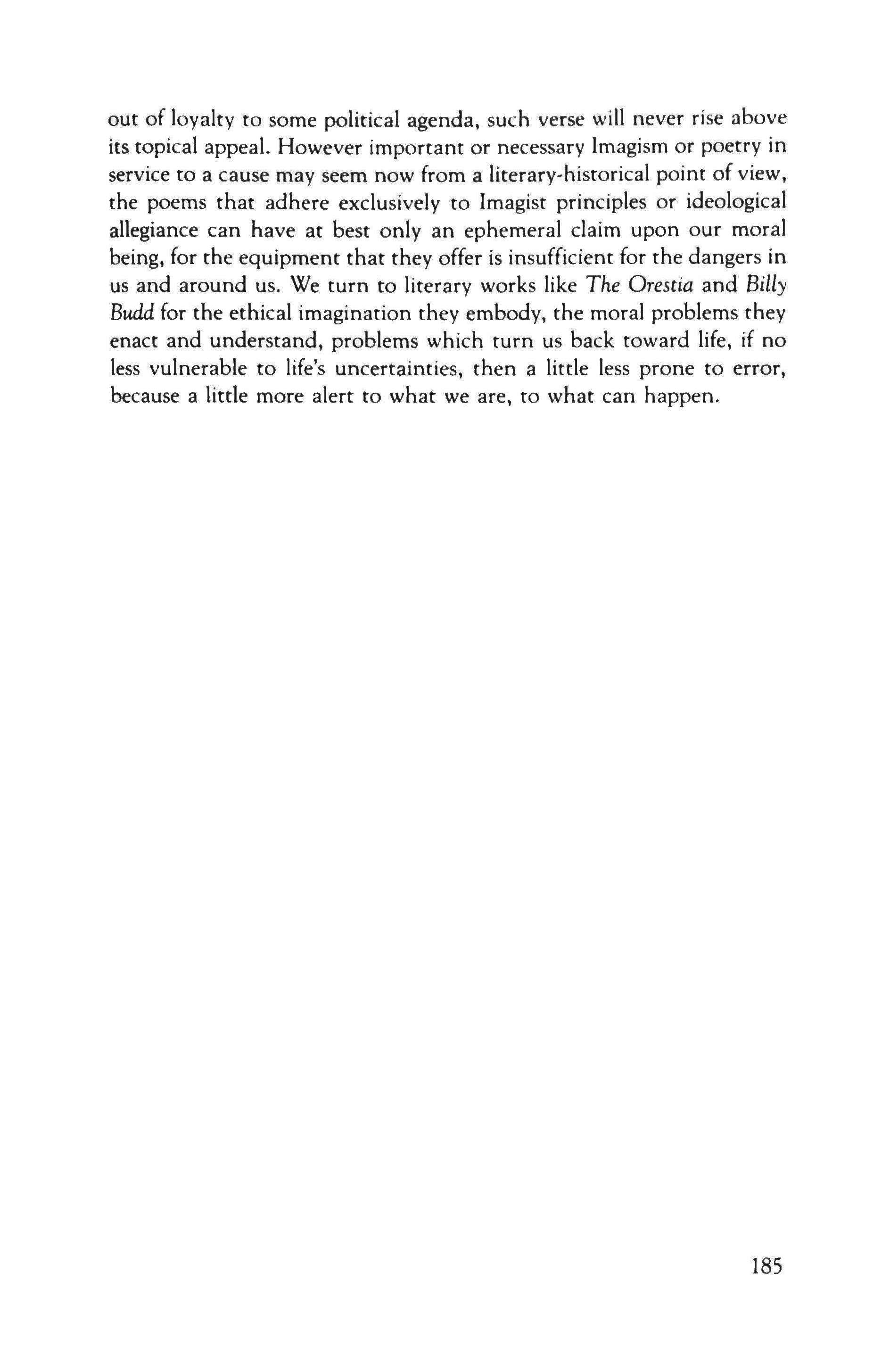
out of loyalty to some political agenda, such verse will never rise above its topical appeal. However important or necessary Imagism or poetry in service to a cause may seem now from a literary-historical point of view, the poems that adhere exclusively to Imagist principles or ideological allegiance can have at best only an ephemeral claim upon our moral being, for the equipment that they offer is insufficient for the dangers in us and around us. We turn to literary works like The Oresns and Billy Budd for the ethical imagination they embody, the moral problems they enact and understand, problems which turn us back toward life, if no less vulnerable to life's uncertainties, then a little less prone to error, because a little more alert to what we are, to what can happen.
185
A False Mustache, A Frozen Swan: The Holocaust from a Distance
Robert Pinsky

1947, or maybe 1948. It is widely believed, as it will be for many years, that Adolf Hitler has escaped the ruins of Europe and is living a new life somewhere in the Western Hemisphere.
My parents are not quite thirty, an attractive small-town couple who have invited friends to the house for highballs. Flirtatiously she combs his forelock onto his handsome brow and with her other hand takes a pinch of her long brown hair and holds it under his nose.
"Everybody's looking for Hitler," she says, "and all the time he's right here on Rockwell Avenue."
He smiles shyly at their amused friends and flinches like a baby tickled on the neck. I can tell that the other couples admire my parents for their physical grace, an admiration salted by the fact that everyone else in their set has tasted the postwar prosperity. Only Milford and Sylvia Pinsky still live in a rented apartment on the wrong end of town, just across the border from Little Africa. For all their prettiness and lightness, the name Rockwell Avenue is a thorn between them.
The high-school basketball hero, a male version of the village beauty, Best Looking Boy in the 1934 Long Branch Senior High School yearbook, was so far not as successful as Walt Weisman or Frank Holtz with their sunken living rooms and picture windows in West Long Branch. The impersonation, failure hiding in the mask of bodily grace, lurked somewhere in her audacious joke, the sexual teasing of that impromptu false mustache.
This essay was commissioned for Testimony: Contemporary Writers Make the Holocaust Personal, edited by David Rosenberg, to be published November 1989 by Times Books, a division of Random House.
186

This memory of the name of Adolf Hitler comes far earlier and in a sense goes deeper than the newsreel images of emaciated bodies hulldozed into mass graves, ovens, the dark thousand-year-old eyes of survivors staring with an obscene, wary composure from bunks crowded and stacked like the rat cages in a pet shop. My mother's little gesture of arrogation may be part of a formative approach to the materials of history and culture. My first apprehension of Hitler is involved with a densely layered family joke. The irreverence, the recruitment of large matters to serve the involved needs of an individual life, the boldness, the eccentric cunning, appeal to me. Possibly, these qualities as a family heritage are related to the fact that whatever it is I have found in the Holocaust, it is not the clear political or religious imperative some have derived from it.
They are qualities that remind me of the literature of Eastern Europe, with its grotesque comedy and violent fonts of emotion, a restless and mutual ambush between the outrages of history and the endurance of private life. Czeslaw Milosz and others have indicated that on the way to the massacre people sometimes carry along their old baggage, the lover, the boss, the brother-in-law, the toothache, the ambition, the bunion, the adultery, the revenge, the teapot. Crockery, indeed, is the theme of one of Milosz's most memorable postwar poems, "Song of Porcelain." In the central stanza, the poet walks past a torn, devastated landscape:
Before the first red tones
Begin to warm the sky
The earth wakes up, and moans. It is the small sad cry
Of cups and saucers cracking, The masters' precious dream Of roses, of mowers raking And shepherds on the lawn.
The black underground stream Swallows the frozen swan.
This morning, as I walked past The porcelain troubled me most.
In the economy of the poem, the tea service with its pastoral adornments perhaps represents Europe itself, but a Europe whose happy and elegant diversions are linked by powerful underground currents to the nightmare. The grotesque image of the frozen swan, like the image of my father as Hitler, suggests a complex binding together of hope and ugliness, love and despair, an approach to the nightmare that could be called ironic, rather than religious.
187

Both the poem and the early memory came back to me in 1980, on a tour of Eastern Europe sponsored by the American State Department. I spoke and read poems to audiences put together from Writers' Unions, PEN Clubs, embassy-hangers-on, students, teachers and (no doubt) spies in such cities as Bucharest, Cracow, Szeged, Budapest, Iasi, Wroclaw: the murderous, frumpy terrain of the unimaginable. In that terrain, my mother's little gesture became the image of a response I couldn't quite formulate, to a series of enigmatic or subtly violating occasions.
For purposes of compression and disguise, imagine a composite and exaggerated country of deep Eastern sadness. The language is related to Finnish, to the Romance tongues by way of Romanian, but also to Slavonic and Turkish - a Marx Brothers or Sid Caesar language, full of recognizable bits and slapdash imitations or mockeries, like the capital city itself, with its minor-key, crumbling Grand Hotels and cynical echoes of Paris and Prague. Also Stalinist Moderne, yes, but because the country has for centuries succumbed readily to Romans, Turks, Russians, Nazis, Russians again - so readily, and with such scant strategic importance, so few resources to plunder, that relatively little destructive force has been squandered on the capital city - it survives intact as an anthology of second-rate and derivative imperial architecture from every era.
Not a prosperous place. Even in the center, on the square surrounding the ironic little Arc de Triomphe, parking spaces abounded all day. Actual beggars appeared in front of the hotel, with not the familiar request for spare change, but the outstretched cupped hand and silent grimace of tradition.
Bribery, or rather the use of one certain brand of American cigarettes as the true currency of persuasion, ruled everywhere. The cartons and packs, seemingly unopened through dozens of transactions with the actual tobacco nearly as theoretical as the metal in Fort Knox, appeared everywhere, symbols that the highest belief was reserved for intimate rather than official arrangements, a confidence in the rigidly prescribed image of the package, king-sized only and never mentholated, tangible, a coinage so respected that only in such settings as the office of an extremely high official did I see a fresh pack ostentatiously opened: posed as in a magazine ad with four staggered virgin smokes extended seductively next to the coffee and cognac, exposed as if offhandedly for consumption.
At the other extreme, I asked for the bathroom at a roadhouse and on the other side of the door was the outdoors, a neat vegetable garden being hoed by the classic, suntanned Grimm's Tales crone dressed in
188
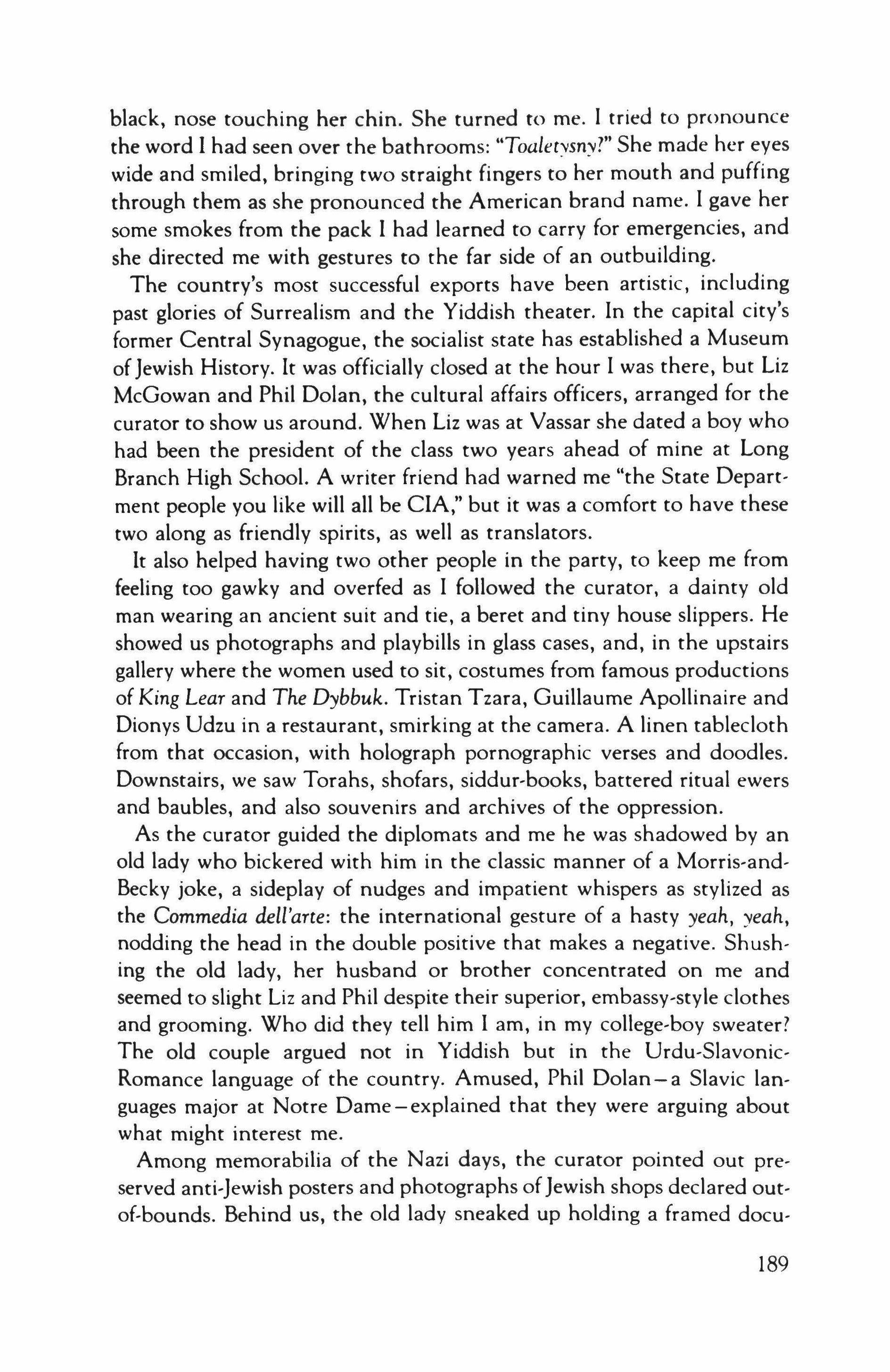
black, nose touching her chin. She turned to me. I tried to pronounce the word I had seen over the bathrooms: "Toaier:vsn:v?" She made her eyes wide and smiled, bringing two straight fingers to her mouth and puffing through them as she pronounced the American brand name. I gave her some smokes from the pack I had learned to carry for emergencies, and she directed me with gestures to the far side of an outbuilding.
The country's most successful exports have been artistic, including past glories of Surrealism and the Yiddish theater. In the capital city's former Central Synagogue, the socialist state has established a Museum ofJewish History. It was officially closed at the hour I was there, but Liz McGowan and Phil Dolan, the cultural affairs officers, arranged for the curator to show us around. When Liz was at Vassar she dated a boy who had been the president of the class two years ahead of mine at Long Branch High School. A writer friend had warned me "the State Department people you like will all be CIA," but it was a comfort to have these two along as friendly spirits, as well as translators.
It also helped having two other people in the party, to keep me from feeling too gawky and overfed as I followed the curator, a dainty old man wearing an ancient suit and tie, a beret and tiny house slippers. He showed us photographs and playbills in glass cases, and, in the upstairs gallery where the women used to sit, costumes from famous productions of King Lear and The Dybbuk. Tristan Tzara, Guillaume Apollinaire and Dionys Udzu in a restaurant, smirking at the camera. A linen tablecloth from that occasion, with holograph pornographic verses and doodles. Downstairs, we saw Torahs, shofars, siddur-books, battered ritual ewers and baubles, and also souvenirs and archives of the oppression.
As the curator guided the diplomats and me he was shadowed by an old lady who bickered with him in the classic manner of a Morris-andBecky joke, a sideplay of nudges and impatient whispers as stylized as the Commedia dell'arte: the international gesture of a hasty yeah, yeah, nodding the head in the double positive that makes a negative. Shushing the old lady, her husband or brother concentrated on me and seemed to slight Liz and Phil despite their superior, embassy-style clothes and grooming. Who did they tell him I am, in my college-boy sweater? The old couple argued not in Yiddish but in the Urdu-SlavonicRomance language of the country. Amused, Phil Dolan-a Slavic languages major at Notre Dame-explained that they were arguing about what might interest me.
Among memorabilia of the Nazi days, the curator pointed out preserved anti-Jewish posters and photographs ofJewish shops declared outof-bounds. Behind us, the old lady sneaked up holding a framed docu-
189

rnent, what looked like a full-page ad in a tabloid. Banned authors, Phil translated. Patriotic citizens will demand that the contaminating works of the following Jewish authors be removed from the shelves of the homeland. Dozens of names, a few even I could recognize-and one, it became clear as the Morris-and-Becky routine got louder and faster, was the name of the very old man himself; he was or had been an author.
Of children's books, Phil explained, following their chatter, very popular at the time. He and Liz watched as the old man beamed up at me, he and the old lady grinning expectantly and unanimously now, as if they had been nagging at one another only about the means to reach this moment. All four people were watching me-eh, what do I think? The old man named his concentration camp, still grinning. An air of expectation.
He was far from the first survivor of the Nazi onslaught I had met. In the world of my childhood synagogue on the Jersey shore, there were several. I remember in particular a man called Yossel. Congregations like mine were populated on Sabbath mornings mainly by two groups: retired men rediscovering their piety and unwilling young boys yearning for freedom from the long, tedious services. My father, Walt Weisman, Frank Holtz, were at work. (Women, of course, were at home.)
Yossel.with his toothless grin and his baggy clothes of a silent film comic had a unique place, somewhere between the boys and the graybeards. The old men treated him with a condescending affection. Sometimes they played small practical jokes on him - hiding the decrepit velvet bag where he kept his prayer equipment, or offering him snuff doctored to make him sneeze. His meaningless, perpetual smile gave the impression that he was feebleminded or shell-shocked. I could not tell because he understood only Yiddish.
Though he couldn't speak with us, Yossel often lined up to pray with us boys, as if he felt more at ease there than with the old men who rocked from the waist and dipped their knees with exaggerated gestures while they prayed, affecting pompous cantorial sobs and grace notes. Once, encouraged by my grandfather, Yossel showed me the number tattooed on his forearm. I have no idea what country he came from, or how he wound up on the Jersey shore. He had no relatives. Some agency must have assigned him as a ward of our congregation.
The congregation accepted Yossel in what seemed an unreflecting way, a brusque, unsentimental, to some extent even an unfeeling embrace that assigned him his role - nor was that role a holy fool's: Yossel was not holy to us. Because the piety of the old men was centered upon the Torah, observance of the Law, Yossel was not sacred but an
190

innocent who had suffered. For many in a later generation (though not (or me) the suffering of those millions might be a holy charge. making Jewish survival sacred. The possibility of thus making a cult of the Holocaust perhaps did not present itself to those old men, immersed as they were in the rituals of their childhood. To make Jewish life sacred would be a redundancy. If they had thought about it, they might have argued that Armenians and others had been the objects of genocide, but only Jews had the Torah. And these men were themselves immigrants. Conceivably, the catastrophe Yossel had survived seemed to them an extension to its ultimate extreme of the cruelty and malevolence of Europe itself.
It was the idea of Europe that the curator called up-deep Europe, not the cultural edifice of T. S. Eliot's essays and not the Rome, Paris, London I had visited from time to time since college, but the ancient grounds of conquest, rape, divisions and enmities of peoples, the suppressed minorities, Slovenes and Estonians and Moldavians and Gypsies, the Romanian minority in Hungary and the Hungarian minority in Romania, the continent's name a reference to the violent carrying-off of a virgin by a furious beast. The knowing, unreadable smile that the two survivors seem in my memory to share is like the hardy, bear-like expression that a denizen of the arctic turns toward a tourist from the temperate zones.
I murmured something about how astonishing his survival was. There was no point in faking an epiphany I did not feel. Could it be that though I had left Judaism behind me, without regret, as soon as I could, it had insulated me against that other religion of the Holocaust? I imagined that the gentile Americans from the embassy would have been gratified by some special show of emotion on my part.
I did not feel nothing. Unlike Yossel, the curator came with a filled-in European life before the atrocities- he was holding documentation of that life in his hands. To challenge my particular imagination the more (as he seemed to know) it was (unlike Yossel's) the life of a writer, one who conceivably sat in cafes with the likes of Tristan Tzara and Dionvs Udzu. I was in the presence of people not unlike me, by birth and inclination, who had lived through the great and infamous storm. And finally, the curator and the old lady who hectored him were unlike Yossel in that they had not left: they still occupied the European terrain of hair-raising historical accounts and statistics, the actual terrain of the forever bone-chilling, barely touchable lore of the Holocaust. The contorted nationalisms and hatreds of Eastern Europe, preserved in the juices of the Soviet system, gave this lore a peculiar immediacy.
191
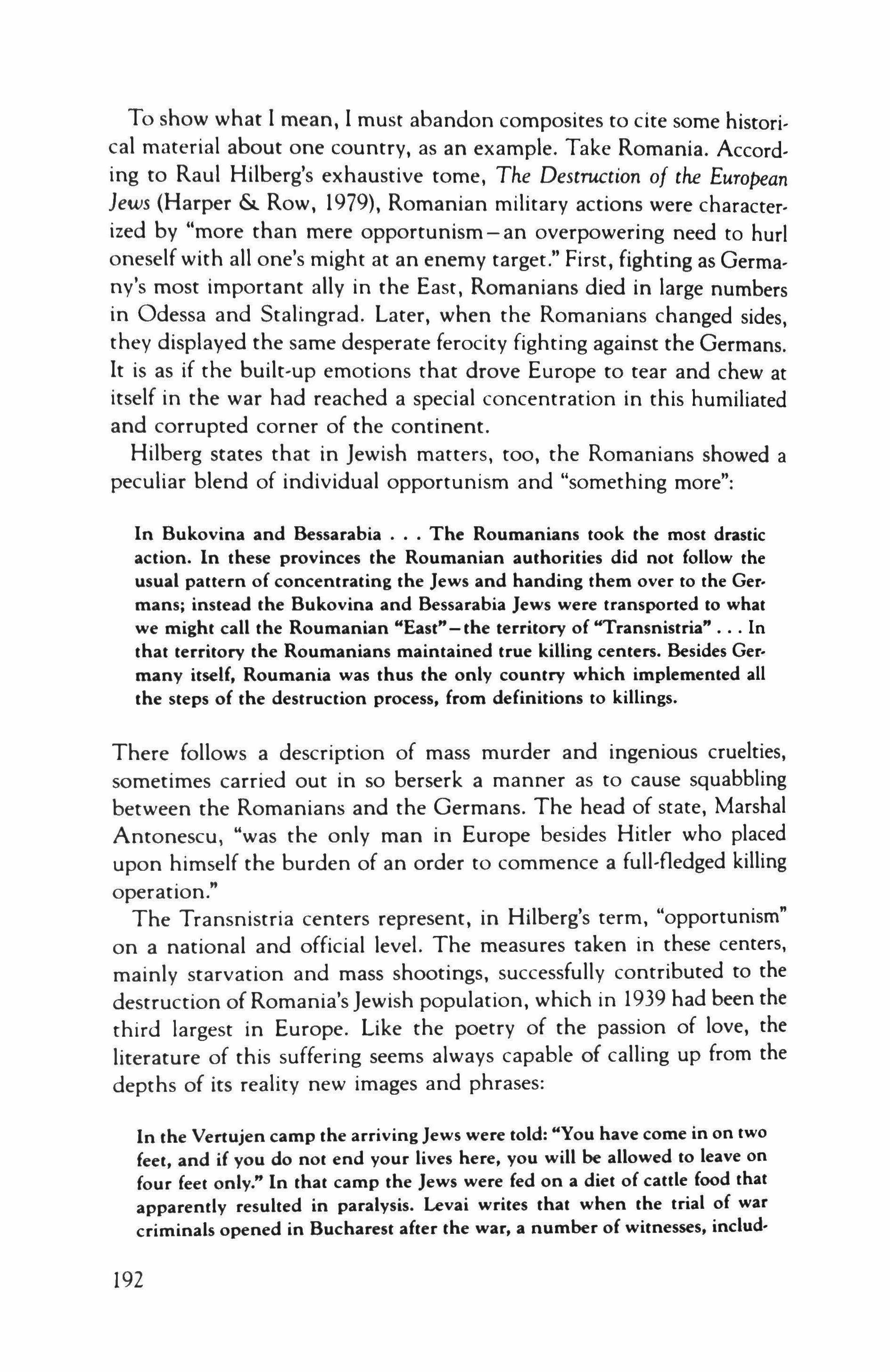
To show what I mean, I must abandon composites to cite some historical material about one country, as an example. Take Romania. According to Raul Hilberg's exhaustive tome, The Destruction of the European Jews (Harper & Row, 1979), Romanian military actions were characterized by "more than mere opportunism - an overpowering need to hurl oneself with all one's might at an enemy target." First, fighting as Germany's most important ally in the East, Romanians died in large numbers in Odessa and Sralingrad. Later, when the Romanians changed sides, they displayed the same desperate ferocity fighting against the Germans. It is as if the built-up emotions that drove Europe to tear and chew at itself in the war had reached a special concentration in this humiliated and corrupted corner of the continent.
Hilberg states that in Jewish matters, too, the Romanians showed a peculiar blend of individual opportunism and "something more":
In Bukovina and Bessarabia The Roumanians took the most drastic action. In these provinces the Roumanian authorities did not follow the usual pattern of concentrating the Jews and handing them over to the Ger. mans; instead the Bukovina and Bessarabia Jews were transported to what we might call the Roumanian "East" - the territory of "Transnistria" In that territory the Roumanians maintained true killing centers. Besides Germany itself, Roumania was thus the only country which implemented all the steps of the destruction process, from definitions to killings.
There follows a description of mass murder and ingenious cruelties, sometimes carried out in so berserk a manner as to cause squabbling between the Romanians and the Germans. The head of state, Marshal Antonescu, "was the only man in Europe besides Hitler who placed upon himself the burden of an order to commence a full-fledged killing operation."
The Transnistria centers represent, in Hilberg's term, "opportunism" on a national and official level. The measures taken in these centers, mainly starvation and mass shootings, successfully contributed to the destruction of Romania's Jewish population, which in 1939 had been the third largest in Europe. Like the poetry of the passion of love, the literature of this suffering seems always capable of calling up from the depths of its reality new images and phrases:
In the Vertujen camp the arriving Jews were told: "You have come in on two feet, and if you do not end your lives here, you will be allowed to leave on four feet only." In that camp the Jews were fed on a diet of cattle food that apparently resulted in paralysis. Levai writes that when the trial of war criminals opened in Bucharest after the war, a number of witnesses, includ-
192

ing the Jewish ballerina Rebecca Marcus, "were indeed able to walk on all fours only."
It is the enigmatic Eastern European extremes of passion and cynicism that I want to dwell on, however, to call them up without presuming to understand them. Lunatic behavior is expected in this context, but Hilberg describes something that seems possibly too bizarre for the category of "opportunism" to contain:
Opportunism was practiced in Roumania not only on a national basis but also in personal relations. Roumania was a corrupt country. It was the only Axis state in which officials as high as minister and mayor of the capital city had to be dismissed for "dark" transactions with appropriated Jewish property The search for personal gain in Roumania was so intensive that it must have enabled many Jews to buy relief from persecution. The institution of bribery was, in fact, so well established that it was diverted for the benefit of the state: the Roumanian government permitted Jews to purchase exemptions from such anti-Jewish measures as forced labor and travel restrictions. However, what was true of personal opportunism in Roumania was true also of personal involvement in killings. Repeatedly the Roumanians threw themselves into Aktionen [formal extermination operations). Witnesses and survivors speak of scenes unduplicated in Axis Europe. Even in German reports there are criticisms of these operations, and in some cases the Germans stepped in to halt killings that seemed offensive even to so hardened an establishment as the German army.
This account recalls the improvised currency of the single brand of American cigarette, trusted single-mindedlv. I mean not simply the idea of corruption or bribery, but the formalized moral exchange rate that, beyond coexisting with the release of savage and long-stored-up passions, seems to be an extension of those passions into the fanatical account books of commerce. Both the assigning of a price to lives and a peculiar, distinctive passion in taking them were parts of a single cultural matrix that expressed itself in the camps of Transnistria. There an indigenous Eastern or Southern emphasis on individual fates and relations seemed to exceed in its passionate cruelty the purposes and regulations of the Nazis themselves.
Among the victims at Transnistria were the family of the Romanianborn poet Paul Celano His poems have been described as dismantling the German language from within, and as a response to the imaginable defeat of all language, culture, individual speech, poetry, by the facts of the great European mass murders of the 1940's, which Celan, born in 1920, himself barely survived. Along with their numbers, a peculiar aspect of these horrors was their cultural intimacy: Europe killed and
193

tortured Europe, the civilization brutalized itself. Culturally polyglot and therefore the more European (a Romanian Jew who lived in France and wrote in German), Celan can also he described as the poet of the place where horror on the mass level comes up against horror on the intimate, personal level. His poem beginning "There was earth inside them, and they dug" (Es war Erde in ihnen, und sie gruben) concludes:
Es kam erne Stille, es kam auch ein Sturm, es kamen die Meere aUe.
lch grabe, du grllbst, und es grabt auch der Wurm, und da Singende dort sagt: Sie graben.
o einer, 0 keiner, 0 niemand, 0 du: Wohin gings, da's nirgendhin ging!
o du grllbst und ich grab, und ich grab mich dir tu, und am Finger erwacht uns der Ring.
In English (as translated by Michael Hamburger):
There came a stillness and there came a storm, and all the oceans came.
I dig, you dig, and the worm digs too, and that singing out there says: They dig.
o one, 0 none, 0 no one, 0 you: Where did the way lead when it led nowhere?
o you dig and I dig, and I dig towards you, and on our finger the ring awakes.
The parody or evocation of a language lesson-lch gtabe, du griibse, es grabe, sie graben-is sardonic in an impersonal way, but nostalgic and childlike in a personal way, a polarity reflected also in the movement between the einer of love and the cold of keiner, between the niemand and the familial intimacy of duo The digging of the doomed is futile, a digging toward mass obliteration, but the digging of the poem is toward an individual loss: "I dig" -or, since it is ich grab mich, "I dig myself""toward you." The poem digs through earth, annihilation and language toward the intimate, personal pronoun of the familiar you.
In Celan's characteristic manner, difficult, allusive, withholding, irritably twisting and collapsing language around his one, obsessive subject, separate things are smoked over, while polarities are clear, especially the polarity between the universal and general, which is deathly, and the individual, which is all but completely obscured. Thus, "They dug and they dug," he writes, "And they did not praise God They dug and
194
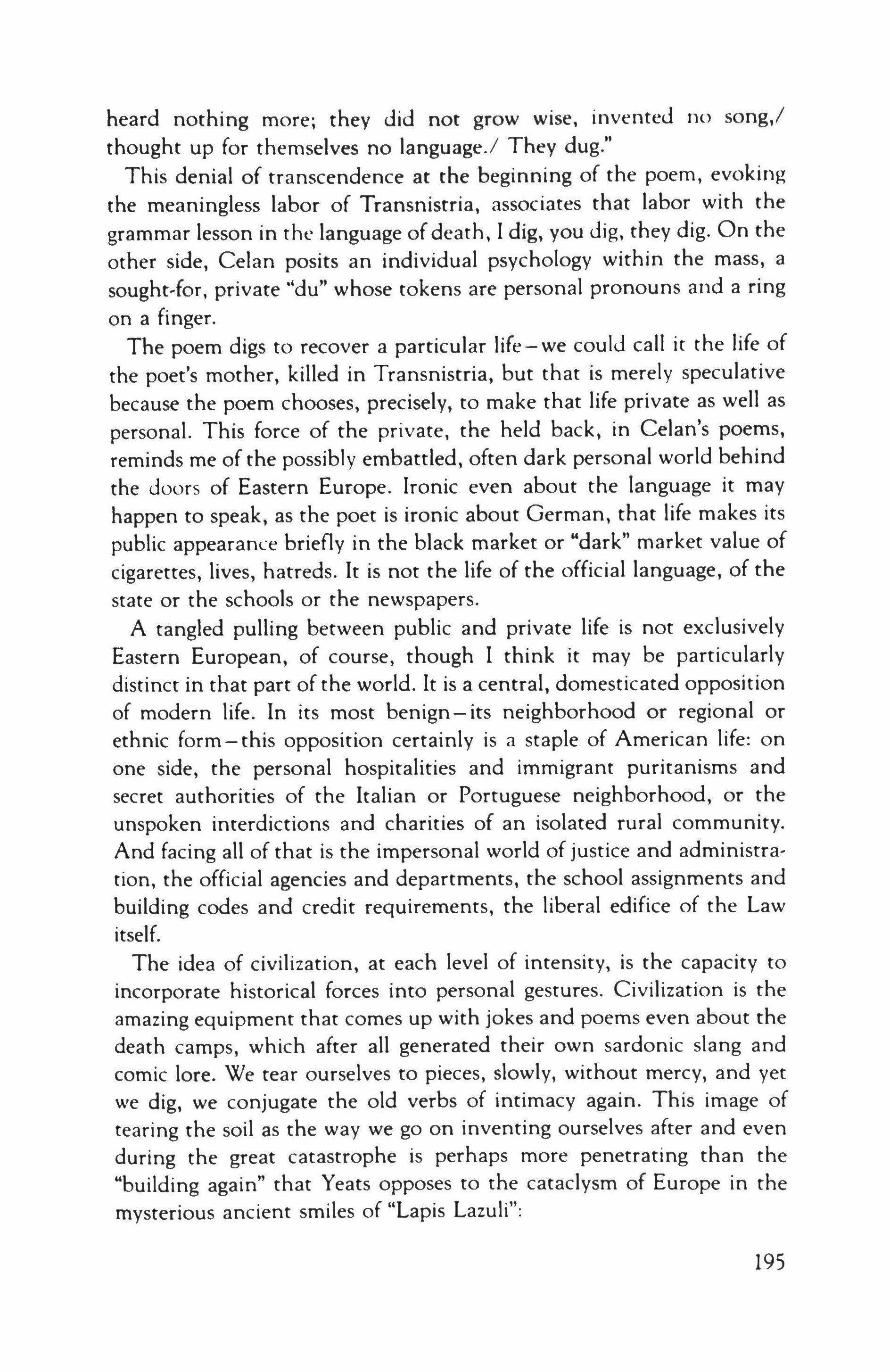
heard nothing more; they did not grow wise, invented no song,! thought up for themselves no language.! They dug."
This denial of transcendence at the beginning of the poem, evoking the meaningless labor of Transnistria, associates that labor with the grammar lesson in the language of death, I dig, you dig, they dig. On the other side, Celan posits an individual psychology within the mass, a sought-for, private "du" whose tokens are personal pronouns and a ring on a finger.
The poem digs to recover a particular life-we could call it the life of the poet's mother, killed in Transnistria, but that is merely speculative because the poem chooses, precisely, to make that life private as well as personal. This force of the private, the held back, in Celan's poems, reminds me of the possibly embattled, often dark personal world behind the doors of Eastern Europe. Ironic even about the language it may happen to speak, as the poet is ironic about German, that life makes its public appearance briefly in the black market or "dark" market value of cigarettes, lives, hatreds. It is not the life of the official language, of the state or the schools or the newspapers.
A tangled pulling between public and private life is not exclusively Eastern European, of course, though I think it may be particularly distinct in that part of the world. It is a central, domesticated opposition of modern life. In its most benign - its neighborhood or regional or ethnic form-this opposition certainly is a staple of American life: on one side, the personal hospitalities and immigrant puritanisms and secret authorities of the Italian or Portuguese neighborhood, or the unspoken interdictions and charities of an isolated rural community. And facing all of that is the impersonal world of justice and administration, the official agencies and departments, the school assignments and building codes and credit requirements, the liberal edifice of the Law itself.
The idea of civilization, at each level of intensity, is the capacity to incorporate historical forces into personal gestures. Civilization is the amazing equipment that comes up with jokes and poems even about the death camps, which after all generated their own sardonic slang and comic lore. We tear ourselves to pieces, slowly, without mercy, and yet we dig, we conjugate the old verbs of intimacy again. This image of tearing the soil as the way we go on inventing ourselves after and even during the great catastrophe is perhaps more penetrating than the "building again" that Yeats opposes to the cataclysm of Europe in the mysterious ancient smiles of "Lapis Lazuli":
195

On all the tragic scene they stare. One asks for mournful melodies: Accomplished fingers begin to play. Their eyes mid many wrinkles, their eyes, Their ancient, glittering eyes, are gay.
Yeats's imaginary Chinese sages and Celan's persistent hopeless diggers both represent endurance beyond the seeming end. So does the zany, obdurate figure who survives to hold up a framed clipping denouncing his work, for the edification of an American visitor: an allegorical representation of the civilizing gesture that starts over again endlessly, jostling and speaking in the very waiting rooms of hell itself. On another and lower frequency, this unquenchable idiosyncracy is replicated by my mother's joke, incorporating Adolf Hitler as folklore into the intricate and actual drama of her marriage. We cannot say what poem or even joke sorneone's imagination might someday come up with, no matter what the subject. (If nothing else saves us from silence, then our vulgarity will.)
A few days after the visit to the Jewish Museum, Liz and Phil took me to visit a preserved concentration camp, the scene of the extermination of millions, two thirds of them Jews. There too the stubborn, ungeneralizable core of personality seemed forced to the surface.
The place had a cafeteria, a turnstile and office where one paid admission, a bookshop. There were trailers where young people from a visiting German religious group, here for some sort of project, slept. The guide who showed us around was a young woman. Halfway through the tour she mentioned that the staff was rather down in the dumps because a coworker had died the night before. Mourning a single death in such a place seemed in itself an odd, meaningless irony. That first impression was overshadowed by the added information that the deceased woman, a commissary worker, was a former inmate of the place. After the war, she had chosen not to leave, and had lived for the last thirty-five years in an apartment built for survivors into a converted part of the original barracks.
Even the embassy people seemed startled. Liz McGowan said, "If I had been here, once I was out I would want to get as far away as possible. Why would anyone choose to stay here?"
The guide explained that the woman was French. Her family and friends had been wiped out. Here at the camp she had the free apartment as well as her government pension. Also, there were people she
196

knew here, other inmates who had chosen to stay on, for similar reasons.
Precisely because on some deep level I did not understand this appalling information very well, I found something oddly restorative in it. Despite its horror it was also evidence of the concentration camp as a place, a place that went on existing as did other places, each with its balance between continuity and discontinuity. This woman's life was closed to me. Marx and Engels write that consciousness is from the start a product of society. Beginning with the division of labor, consciousness deceives itself that it is something other than consciousness of existing practice, the dialectic of production forces and social relations. Even supposing that one accepted this model of life, it is the staggering complexity of the dialectic that is underlined by individual lives: my young parents, wishing they lived in a single-family house; victims bribing or blundering their way to New Jersey or perishing under torture; others choosing after the ordeal to remain where they were.
As amazing as the extent and contortion of human cruelty are the twists of consciousness. Presentation of this fact in detail, precisely, in just proportion to the particular setting, is what gives Primo Levi's book Survival in Auschwitz its amazing force. In his compact, straightforward and artful narrative Levi enacts in the flesh the idea I have cited from Milosz, the idea of the great underground stream that flows between the works of Hell and the works of our hope and leisure, our images of desire. Here is all of the poem from which I quoted earlier. The setting is immediately after the war:
SONG ON PORCELAIN
Rose colored cup and saucer, Flowery demi-tasses: They lie beside the river
Where an armored column passes. Winds from across the meadow Sprinkle the banks with down; A torn apple tree's shadow Falls on the muddy path; The ground everywhere is strewn With bits of brittle frothOf all things broken and lost The porcelain troubles me most.
Before the first red tones Begin to warm the sky
197
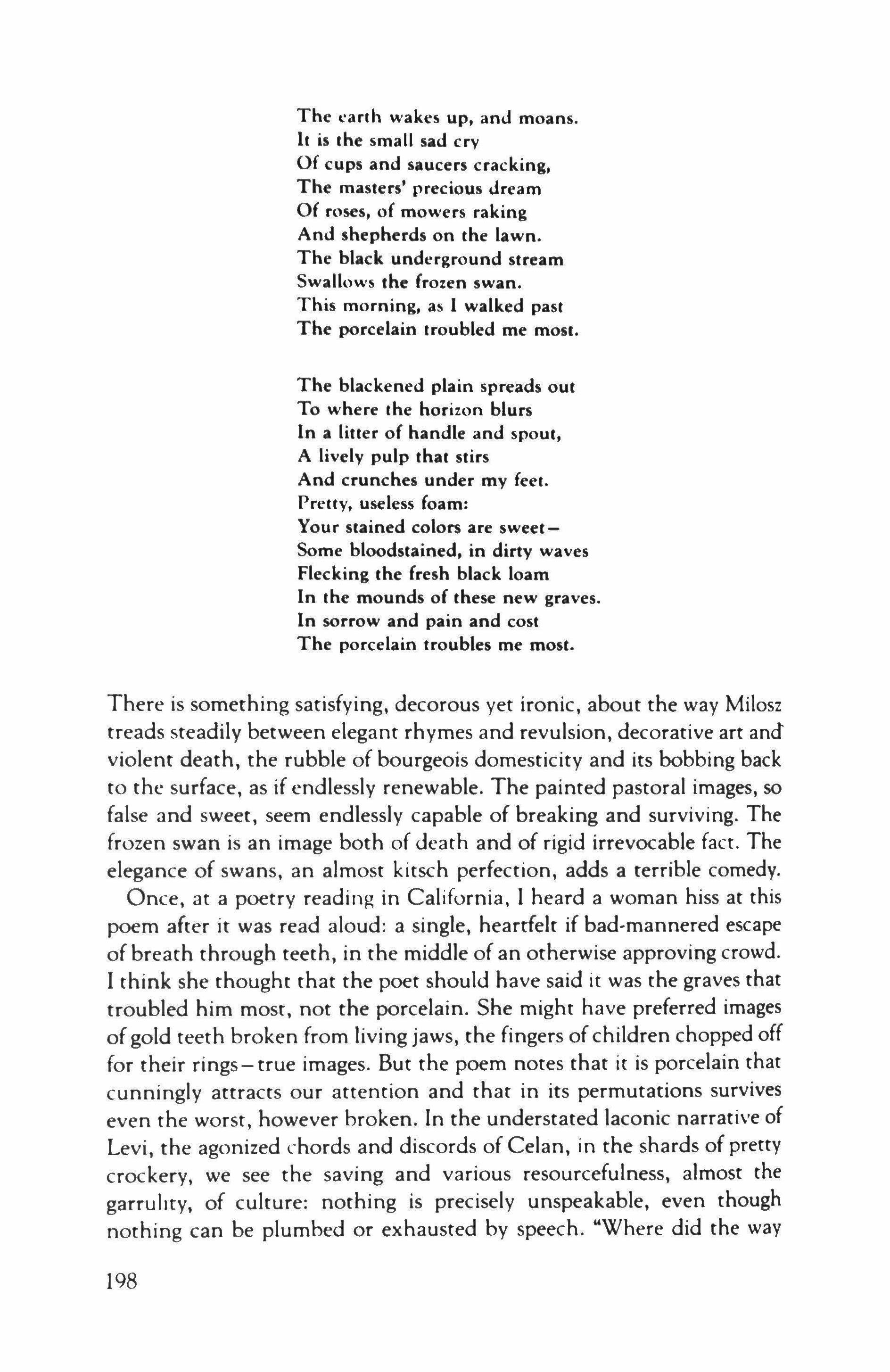
The earth wakes up, and moans. It is the small sad cry Of cups and saucers cracking, The masters' precious dream Of roses, of mowers raking And shepherds on the lawn. The black underground stream Swallows the frozen swan. This morning, as I walked past The porcelain troubled me most.
The blackened plain spreads out To where the horizon blurs
In a litter of handle and spout, A lively pulp that stirs And crunches under my feel. Pretty, useless foam: Your stained colon are sweetSome bloodstained, in dirty waves Flecking the fresh black loam In the mounds of these new graves. In sorrow and pain and cost The porcelain troubles me most.
There is something satisfying, decorous yet ironic, about the way Milosz treads steadily between elegant rhymes and revulsion, decorative art and violent death, the rubble of bourgeois domesticity and its bobbing back to the surface, as if endlessly renewable. The painted pastoral images, so false and sweet, seem endlessly capable of breaking and surviving. The frozen swan is an image both of death and of rigid irrevocable fact. The elegance of swans, an almost kitsch perfection, adds a terrible comedy. Once, at a poetry reading in California, I heard a woman hiss at this poem after it was read aloud: a single, heartfelt if bad-mannered escape of breath through teeth, in the middle of an otherwise approving crowd. I think she thought that the poet should have said it was the graves that troubled him most, not the porcelain. She might have preferred images of gold teeth broken from living jaws, the fingers ofchildren chopped off for their rings-true images. But the poem notes that it is porcelain that cunningly attracts our attention and that in its permutations survives even the worst, however broken. In the understated laconic narrative of Levi, the agonized chords and discords of Celan, in the shards of pretty crockery, we see the saving and various resourcefulness, almost the garrulity, of culture: nothing is precisely unspeakable, even though nothing can be plumbed or exhausted by speech. "Where did the way
198
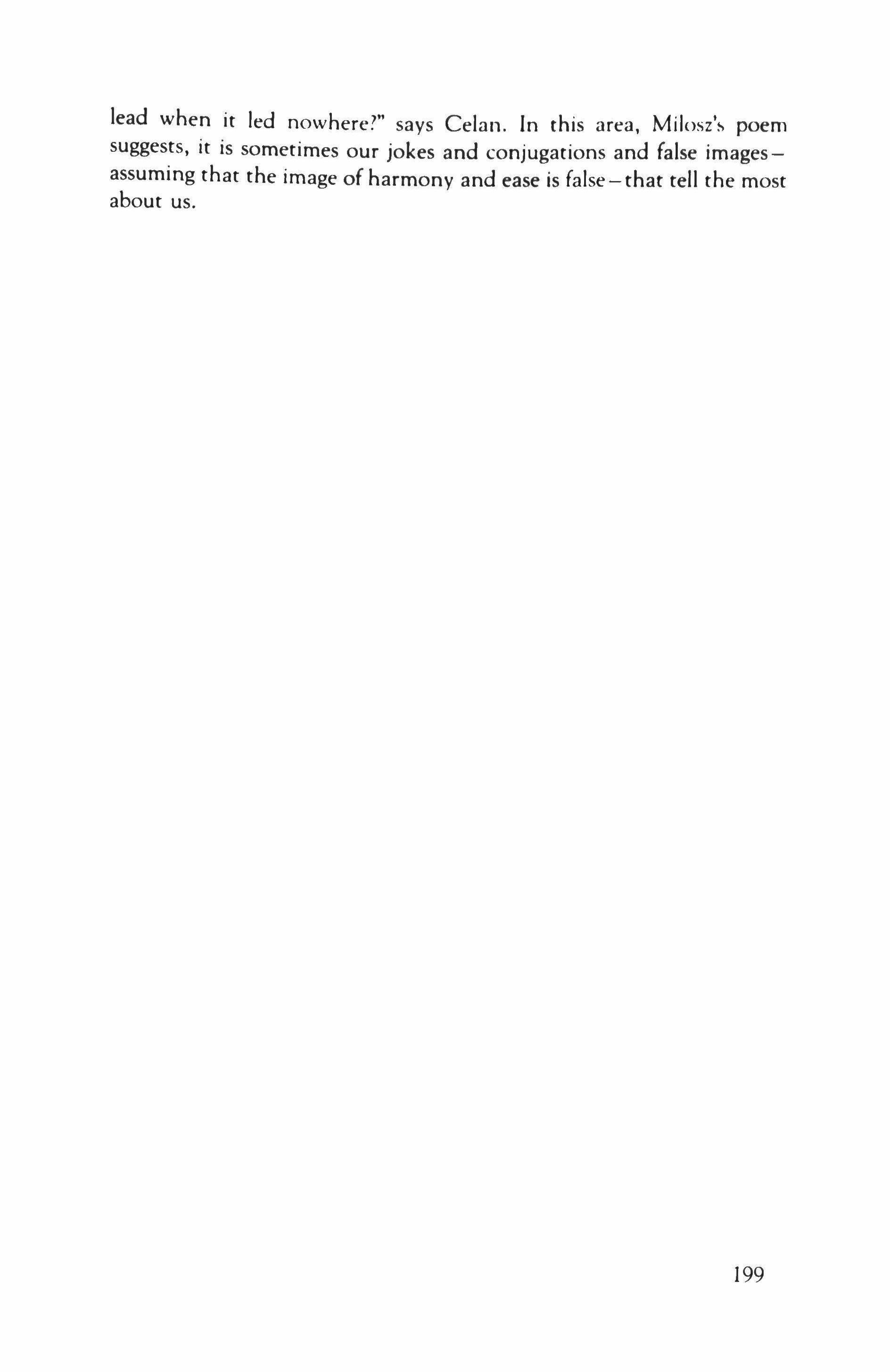
lead when it led nowhere?" says Celan. In this area, Milosz's poem suggests, it is sometimes our jokes and conjugations and false imagesassuming that the image of harmony and ease is false-that tell the most about us.
199
Contributors

Ami Sands Brodoff teaches creative writing at Fountain House in New York City. She lives in Hoboken, New Jersey, and is at work on a novel. * * * Christopher McIlroy has published short stories in Fiction, Missouri Ret'iew, StoryQuarterly and Sonora Review. His story, "All My Relations," which appeared in TQ #62, was selected by Raymond Carver for inclusion in The Best American Short Stories 1986 (Houghton Mifflin, 1986). A resident of Tucson, Arizona, McIlroy is a founder and the fiction instructor for ArtsReach, a nonprofit corporation conducting writing workshops for American Indian students. * * * Katherine Vaz is a graduate student in creative writing at the University of California at Irvine. Her fiction has appeared or is forthcoming in Confrontation, Primavera, Webster Review and other journals. *. * Francine Prose is the author of seven novels. Her most recent book is a collection of stories, Women and Children First (pantheon, 1988). A story of hers appeared in TQ #46.
Dan Chaon is a graduate student in creative writing at Syracuse University, and a recent winner of the Raymond Carver Prize for Fiction. His stories have appeared in MSS, Crazvhcrse and TQ #68.••• Steve Fisher is a resident of the Arizona penal system. His poems and stories have appeared in Shenandoah, ironwood and TQ #74. * •• Rita Dove received the Pulitzer Prize in poetry in 1987 for her book, Thomas and Beulah (Carnegie-Mellon University Press, 1986). She was a Mellon Fellow during 1988-89 at the National Humanities Center in North Carolina and now teaches in the English department at the University of Virginia. Her new book of poems, Grace Notes, is available from W. W. Norton. Two of her poems appeared in TQ #67. • • * Sandra McPherson's most recent collection of poems, Streamers, was published 200

in 1988 by the Ecco Press. She teaches at the Uruvcrsitv of California at Davis, where she is director of the Creative Writing Program.
Andrew Glaze, a Southern poet who has lived in New York City for many years, is the author of several books, including two forthcoming collections of poems, Reality Street: Poems (St. Andrews Press) and Someone Will Go On Owing: New and Selected Poems (Ford-Brown Press). One of his previous books, Damned Ugly Children, will be reissued by Ford-Brown Press. * * * Stuart Dvbek's new book of fiction, The Coast of Chicago, will be published by Knopf in spring 1990. A member of the English faculty at Western Michigan University, Dybek is the author of a collection of poems, Brass Knuckles (University of Pittsburgh Press, 1979), and a book of stories, Childhood and Other Neighborhoods (Viking, 1980; reprinted by the Ecco Press, 1986). * * * Patricia Smith is a lifestyle and entertainment reporter for the Chicago SunTimes. She is a three-time champion of the Uptown Poetry Slam, a competition for performance poets held in Chicago. Her poems have appeared in Kaleidoscope, an anthology of writing by minority women published by Columbia College (Chicago). * * * Mary Karr's first collection of poems, Abacus, was published by Wesleyan University Press in 1987. She teaches at Tufts University, and has poems forthcoming in Poetry and criticism in the Harvard Book Review.
Joseph Gastiger coordinates the honors program and teaches writing at Northern Illinois University. His first chapbook of poems, The Children of Mechanics, will be published by Leaping Mountain Press in 1990. He has published poems in TQ #61 and #68 and in Benchmark: Anthology of Contemporary Illinois Poetry (Stormline Press, 1988). * * * Michael Dennis Browne's fourth collection of poems, You Won't Remember This, will be published by Carnegie-Mellon Press in fall 1990. Two of his poems appeared in TQ #68. * * * Sandra Steingraber has worked as a biologist, journalist and human-rights researcher. Her poems were included in Benchmark: Anthology of Contemporary Illinois Poetry (Stormline Press, 1988). She has also written on the political aspects of cancer for an anthology on women and cancer to be published by Cleis Press. * * * Lisel Mueller's fifth book of poems, Waving from Shore, is being published by Louisiana State University Press this fall. A collection of her essays and out-of-print early poems, titled Learning to Play By Ear, will be released in spring 1990 by Northeast/Juniper Press. Her poems have appeared in TQ #55, #60 and #63.
Cid Corman's most recent books include And the Word (Coffeehouse Press, 1987), Born of a Dream (Gnomon Press, 1988) and OF, Vol. 1 (Lapis Press, 1989). * * * John Matthias teaches at the University of
201

Notre Dame. He has published six volumes of poetry, including Places, Poems (Swallow and Aquila, 1989) and his new and selected poems, Northern Summer (Swallow and Anvil, 1985). He has cotranslated, with Vladeta Vuckovic, The Battle of Kosot'O (Swallow and Aquila, 1987) and, with Goran Prmtz-Pahlson, Contemporary Swedish Poetry (Swallow and Anvil, 1980). He has edited Introducing David Jones (Faber and Faber, 1980), David Jones: Man and Poet (National Poetry Foundation, 1989) and 23 Modem British Poets (Swallow, 1971), which appeared first as TQ n 1 under the title Contemporary British Poetry. * * * A professor of Russian history at the University of California at Santa Cruz, Peter Kenez is the author of Civil War in South Russia, Vols. 1 and 2 (University of California Press, 1971, 1977), and The Birth of the Propoganda State (Cambridge University Press, 1985). He is completing a new book titled Cinema and Sot/iet Society. * * * W. S. Di Piero's new book of poems, The Dog Star, will be published by the University of Massachusetts Press in spring 1990. His collection of essays, Memory and Enthusiasm: Essays 1975-1985, was released in 1989 by Princeton University Press. A special section of TQ #67 was devoted to his poems and essays, and his poems have also appeared in TQ #56.
Alan Shapiro's most recent book of poems, Happy Hour (University of Chicago Press, 1987) was nominated for the National Book Critics Circle Award in poetry and received the William Carlos Williams Award of the Poetry Society of America. Shapiro, who teaches in the English department at the University of North Carolina, Greensboro, has recently completed a new book of poems titled Covenant. His poems and essays have appeared regularly in TriQuarterly. * * * Robert Pinsky's new book of poems, The Want Bone, will be published in spring 1990 by the Ecco Press, which also published his book of essays, Poetry and the World (1988). He teaches in the graduate creative writing program at Boston University. His essay, "Control, Freedom, and the Appetite for Poetry," appeared in TQ #52.
202
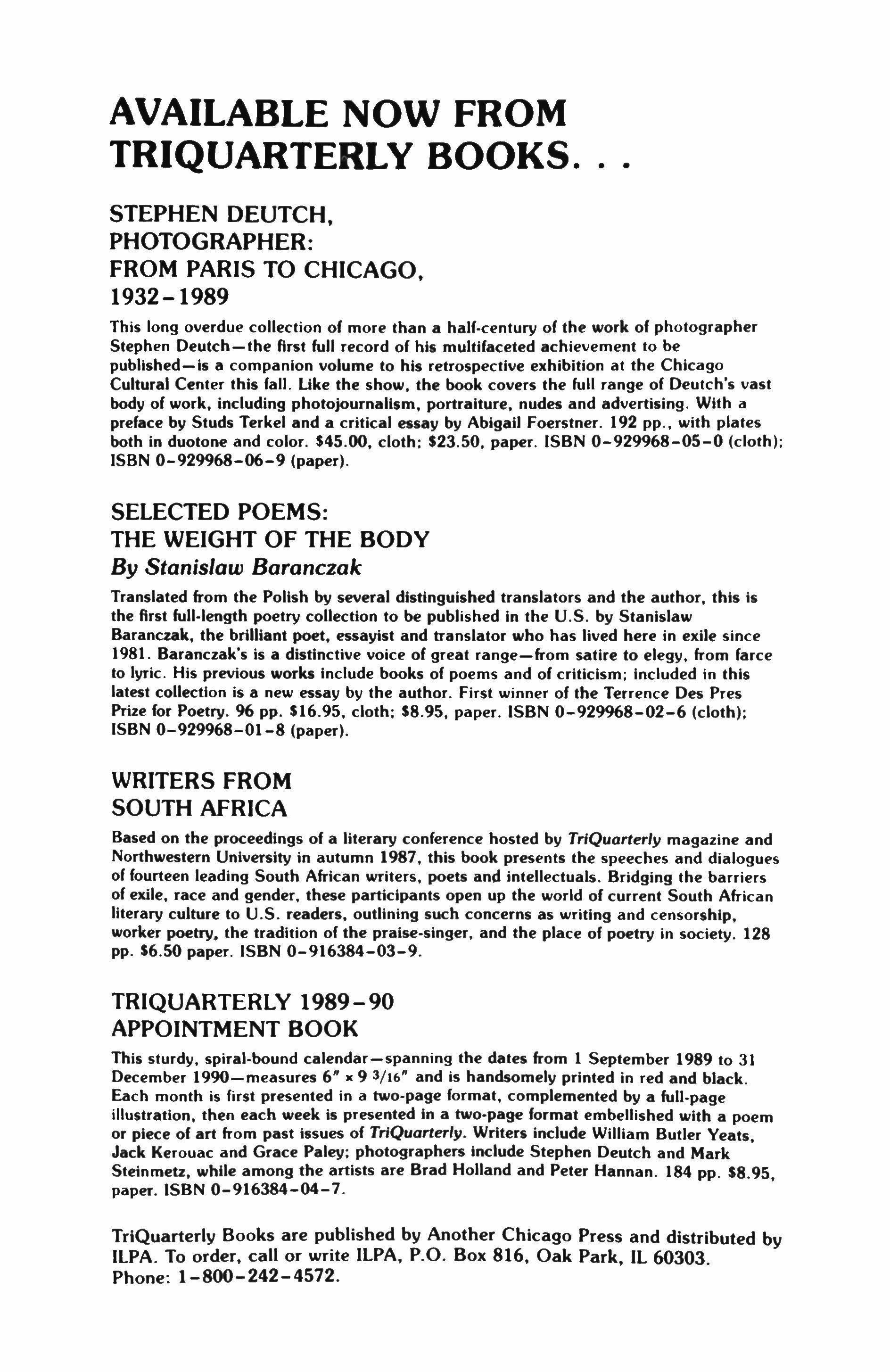
AVAILABLE NOW FROM TRIQUARTERLY BOOKS.
STEPHEN DEUTCH, PHOTOGRAPHER: FROM PARIS TO CHICAGO, 1932-1989
This long overdue collection of more than a half-century of the work of photographer Stephen Deutch-the first full record of his multifaceted achievement to be published-is a companion volume to his retrospective exhibition at the Chicago Cultural Center this fall. Like the show, the book covers the full range of Deutch's vast body of work, including photojournalism, portraiture, nudes and advertising. With a preface by Studs Terkel and a critical essay by Abigail Foerstner. 192 pp., with plates both in duotone and color. $45.00, cloth; $23.50, paper. ISBN 0-929968-05-0 (cloth); ISBN 0-929968-06-9 (paper).
SELECTED POEMS: THE WEIGHT OF THE BODY
By Stanislaw Baranczak
Translated &om the Polish by several distinguished translators and the author, this is the first full-length poetry collection to be published in the U.S. by Stanislaw Baranczak, the brilliant poet, essayist and translator who has lived here in exile since 1981. Baranczak's is a distinctive voice of great range-&om satire to elegy, &om farce to lyric. His previous works Include books of poems and of criticism; included in this latest collection is a new essay by the author. First winner of the Terrence Des Pres Prize for Poetry. 96 pp. $16.95, cloth; $8.95, paper. ISBN 0-929968-02-6 (cloth); ISBN 0-929968-01-8 (paper).
WRITERS FROM SOUTH AFRICA
Based on the proceedings of a literary conference hosted by TriQuarterly magazine and Northwestern University in autumn 1987, this book presents the speeches and dialogues of fourteen leading South A&ican writers, poets and intellectuals. Bridging the barriers of exile, race and gender, these participants open up the world of current South A&ican literary culture to U.S. readers, outlining such concerns as writing and censorship, worker poetry. the tradition of the praise-singer, and the place of poetry in society. 128 pp. $6.50 paper. ISBN 0-916384-03-9.
TRIQUARTERLY 1989-90 APPOINTMENT BOOK
This sturdy, spiral-bound calendar-spanning the dates &om 1 September 1989 to 31 December 1990-measures 6" x 93/16" and is handsomely printed in red and black. Each month is first presented in a two-page format, complemented by a full-page illustration, then each week is presented in a two-page format embellished with a poem or piece of art from past issues of TriQuarterly. Writers include William Butler Yeats, Jack Kerouac and Grace Paley; photographers include Stephen Deutch and Mark Steinmetz, while among the artists are Brad Holland and Peter Hannan. 184 pp. $8.95, paper. ISBN 0-916384-04-7.
TriQuarterly Books are published by Another Chicago Press and distributed by IlPA. To order. call or write IlPA, P.O. Box 816, Oak Park. Il 60303. Phone: 1-800-242-4572.
Collected and Recollected
Collected Stories
R. V. Cassill
Cassill writes about parenthood, love, divorce, the army, and the search for a meaningfullife in the academic world. Collected here are stories which first appeared in the Atlantic, Esquire, Epoch, and other magazines and journals; they represent the lifetime achievement of one of our foremost writers, editors, and teachers of fiction.
"In the world of short fiction, this collection of 39 stories is a major event for R V. Cassill is a literary artist, a modern master of short fiction These selected stories are highly visual stories and the language is fluent, accurate to the ear, suggestive.
- James B. Hall
$29.95 cloth, $14.95 paper

The Writer's
Mind Interviews with American Authors (Volume 1)
Irv Broughton
In this, the first of three volumes, Irv Broughton discusses with novelists, screenwriters, poets, and short story writers everything from literary history to the dynamics of the writer's life and art.
"The Writer's Mind is the best collection of interviews I have ever read. It is lively in tone, relaxed in manner, and sometimes startling in its revelations.
- Fred Chappell
Writers interviewed in this volume include John Beecher, John Ciardi, Richard Eberhart, SannueIFulle�JosephineJacobsen, Andre Norton, Allen Tate, and more.
$22.00 cloth, $14.95 paper
Available at fine bookstores or directfrom ",ARKANSAS The University of Arkansas Press, Fayetteville AR 72701 (SOl) 5�3246
O'CONNOR
"A visionary performance." - Kirkus Reviews
"Salute to these brave stories and to the bold adventurer who wrote them." -GORDON L1SH
"Strange and wonderful wildly inventive." - ����r�}���sehold
"Fearless hallucinatory."
-

author of The Petting Zoo
RESCUE
stories that take chances
ready for STEPHEN
Ifyou're looking for
You're
Words
PHILIP GRAHAM, author of The Art of the Knock "An anecdote to the thinness of recent literature." -BRETT SINGER,
Now at your bookstore. HARMONY 800KS� A divrsion of The Crown Publishing Group, 225 Park Ave. South, N.Y., N.Y. 10003
Stories by Stephen O'Connor
Crafting Language
THE CRAFT OF TRANSLATION
Edited by John Biguenet and Rainer Schulte William Weaver, Gregory Rabassa, and Edward Seidensticker are among the distinguished translators who discuss the difficulties and implications of their craft in this collection of essays. The aCI of translation emerges as a valuable commentary on how we communicate both within a culture and from one culture 10 another.
CIotIt $25_00 Paper $8.95 170pages Chicago Guides to Writing, Editing, and Publishing
THE POET'S WORK
29 Poets on the Origins and Practice of Their Art
Edited by Reginald Gibbons

THE UNIVERSITY OF CHICAGO PRESS
5801 South Ellis Avenue Chicago, IL 60637
Corona Publishing Company
1037 S Alamo. San AniOOlO, Texas 78210 12th Year oj Publishing (Distributed by Texas Monthly Press)
This anthology brings together essays by 201h-cenlury poets on their own an. Included are writings by Paul Valery, Federico Garcia Lorca, Boris Pasternak. Fernando Pessoa, Eugenio Montale, Wallace Stevens, Seamus Heaney, Denise Levertov, and Wendell Berry. Paper $12.95 JIB pages
Contemporary Short Stories by Texas Writers
The new spirit of Texas fiction is strong in this collection of short stories. Some of the region's best known writers are here, together with others who will be new to you. Their concerns are contemporary. Editor Lyman Grant has chosen twentythree stories written in the last five years, many in print here for the first time.
The writers are: Catherine AGRELLA, Rick BASS, Ewing CAMPBELL, Lionel GARCIA, Rqinald GIBBONS, Dagoberto GILB, Rogelio GOMEZ, Elizabeth Forsythe HAILEY, james HANNAH, Shelby HEARON, GuidajACKSON, Peter LaSALLE, Beverly LOWRY, Naomi Shihab NYE, Carolyn OSBORN, Clay REYNOLDS, jim SANDERSON, Daryl SCROGGINS, Roland SODOWSKY, Edward SWIFT, Pat EUis TAYLOR, Miles WILSON, and Thomas ZIGAL.
Apprm. 270 pasn. paperback ISBN 0-931722-75-(, 11095
THE TIMETRAVELER
Poems 1983-1989
JoyceCarol Oates

A new collection of poetry from an extraordinary American writer
"The rewards of an interest in others. and in the Other. are here manifest: a vitality beyond the verbal. the souls dispatches. Read em and leap."-Richard Howard
"These poems are so accomplished-with such control of form and subtlety of feeling-that they prove again. if proof were needed. that joyce Carol Oates can command our language to do her bidding in whatever form she chooses."
-Carolyn Kizer
"joyce Carol Oates is best known for her stories and novels. but the poetic power that informs them finds direct voice in her poems. from vivid imagistic pieces to glancing looks at the risks and costs of living itself."-Theodore Wei..
"From miniaturist dramatic monologues to acerbic social commentary. these poems. tempered by bursts of surprising lyric tenderness. are stamped with joyce Carol Oates's insight into our human condition. "-Maxine Kumin
'The bright center of all ofjoyce Carol Oates's art and craft has always been her poetry; and these new poems in The Time Traveler offer the urgent energy, intelligence, grave concentration, presented by a dear and individual voice, which we have come to expect from her poetry. But there is, as well, a full maturity of vision, nowhere more openly moving than in a haunting series of elegies-for William Goyen, john Gardner, Raymond Carver. "-George Garrett
A William Abraham. Book
E. P. Dutton
$18.9S cloth, $9.9S, paper
Fiction by:
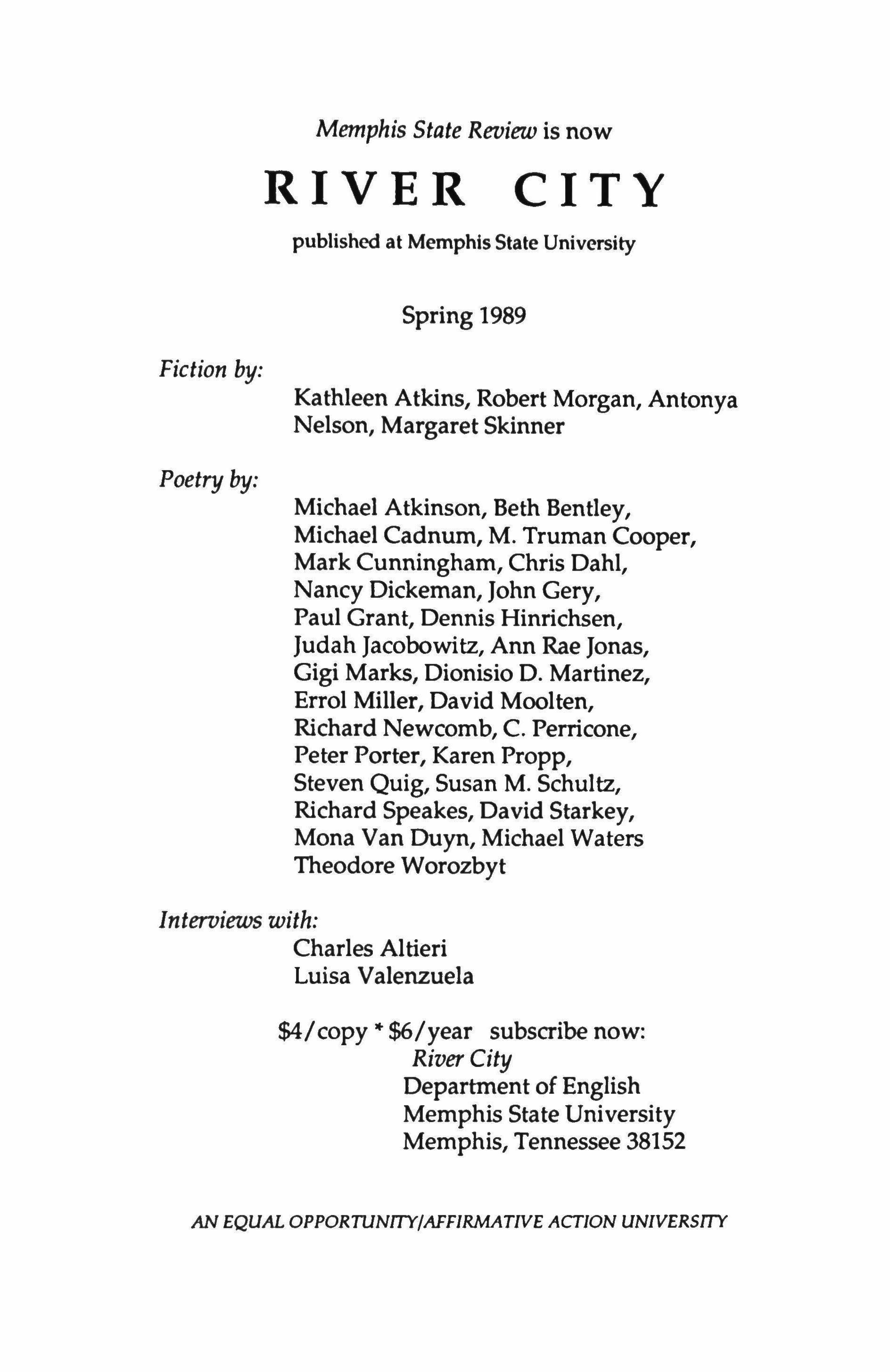
Poetry by:
Memphis State Review is now
RIVER CITY
published at Memphis State University Spring 1989
Kathleen Atkins, Robert Morgan, Antonya Nelson, Margaret Skinner
Michael Atkinson, Beth Bentley, Michael Cadnum, M. Truman Cooper, Mark Cunningham, Chris Dahl, Nancy Dickeman, John Gery, Paul Grant, Dennis Hinrichsen, Judah Jacobowitz, Ann Rae Jonas, Gigi Marks, Dionisio D. Martinez, Errol Miller, David Moolten, Richard Newcomb, C. Perricone, Peter Porter, Karen Propp, Steven Quig, Susan M. Schultz, Richard Speakes, David Starkey, Mona Van Duyn, Michael Waters
Theodore Worozbyt
Interviews with:
Charles Altieri
Luisa Valenzuela
$4/copy II- $6/year subscribe now: River City Department of English Memphis State University Memphis, Tennessee 38152
AN EQUAL OPPOR1UNflYIAFFIRMATIVE ACTION UNIVERSflY

MEMPHIS STATE UNIVERSITY
announcts a new MFA
PROGRAM IN CREATIVE WRITING
THE FACULTY
Fiction: CJ Hribal, Tom Russell, Ray Willbanks
Pottry: Sharon Bryan, Gordon Osing
RIVER CITY WRITERS SERIES
Students will have a chance to work with the 5 nationally known writers who visit campus each year to give readings and lectures and hold workshops. Past participants have included: Eudora Welty, Gwendolyn Brooks, Tobias Wolff, Mona Van Duyn, Thomas Keneally, James Dickey, Donald Justice, Michael Harper, Adrienne Rich, Luisa Valenzuela, Marvin Bell, Carlos Fuentes, Tillie Olsen, and Maxine Kumin.
WRITERS-IN-RESIDENCE
Three writers visit the campus each year for a-week residencies, during which they give readings and lectures and hold individual conferences with students. Participants have included: Heather McHugh, Ellen Bryant Voigt, Peter Taylor, Thea Astley, James Welch, and James Tate.
RIVER CITY
The literary magazine, formerly the Memphis State Review, publishes fiction, poetry, interviews, and essays. Contributors have included: Fred Busch, Madeline DeFrees, Philip Levine, Mary Oliver, Mark Strand, John Ashbery, Margaret Atwood, Albert Goldbarth, Marvin Bell, Sherod Santos, Peter Porter, Charles Altieri, Beth Bentley, and Michael Waters.
STUDENT ACTIVITIES
The Creative Writing Club sponsors student readings, and a new magazine, Prelude, publishes student work.
ASSISTANTSHIPS
Several assistantships are available to incoming students, including one as Editorial Assistant for River City and one as Administrative Assistant for the River City Writers series. MFA students are also eligible to apply for other departmental assistantships.
For additional infonMtion, please write: Director of Creative Writing Department of English Memphis State University Memphis, Tennessee 38152
CONTEMPOMRY LITEMTURE
Founded: J 960
Editor: L. S. Dembo publishes criticism and scholarship on aU forms of contemporary Anglo-American and European literature. In 30 years of publication it has included interviews with both established and rising poets and novelists, special issues on single authors or timely subjects, and reviews of current criticism.
ISSN 0010-7484
Published quarterly by The University of Wisconsin Press
Subscribe now, or recommend a subscription to your library. A detailed brochure will be sent upon request.

RATES
Individuals: S20/yr. (must prepay)
Institutions: S47/ yr. Foreign subscribers add $8/yr. for regular postage, or $20/yr. for Airmail delivery.
REPLY TO Journal Division
University of Wisconsin Press
North Murray Street Madison, Wisconsin 53715 USA (608) 262-4952
The
114

A Celebration of Women Dramatists STUDIES IN AMERICAN DRAMA
1945·PRESENT
EDITORS AND PUBLISHERS

Philip C. Kolin
University of Southern Mississippi Colby H. Kuilman
University of Mississippi
Volume 4 - Available Spring 1990
• Amtrack (complete) and "Gender and Geography" by Megan Terry
Betsey Brown (excerpts) by Ntozake Shange and Emily Mann
• Five new interviews - Adrienne Kennedy, Tina Howe, Megan Terry, Joan Schenk.r, Connie Congdon
Criucal essays on Fornes, Kennedy, Henley; and Childress
An [mily Mann bibliography
Theatre reviews from around Ihe world
Please send your subscription for one year (510.00; 512.00 fomgn) 10 J. Madison Davis, Humanities Division, The Behrend College, Pennsylwnia Stale University, Erie, PA 16563.
NAME
ADDRESS
CITY �An

-
publishes daring new writers & the more radical work of established writers feminist, pan-American
new
bookstores
The American Voice
THE AMERICAN VOICE
A most impressive & ambitious
quarterly' Small Press available at
or by subscription ($12) to
332 West Broadway Louisville, KY 40202 USA
(-PEQUOO')
A JOURNAL OF CONTEMPORARY LITERATURE & LITERARY CRITICISM
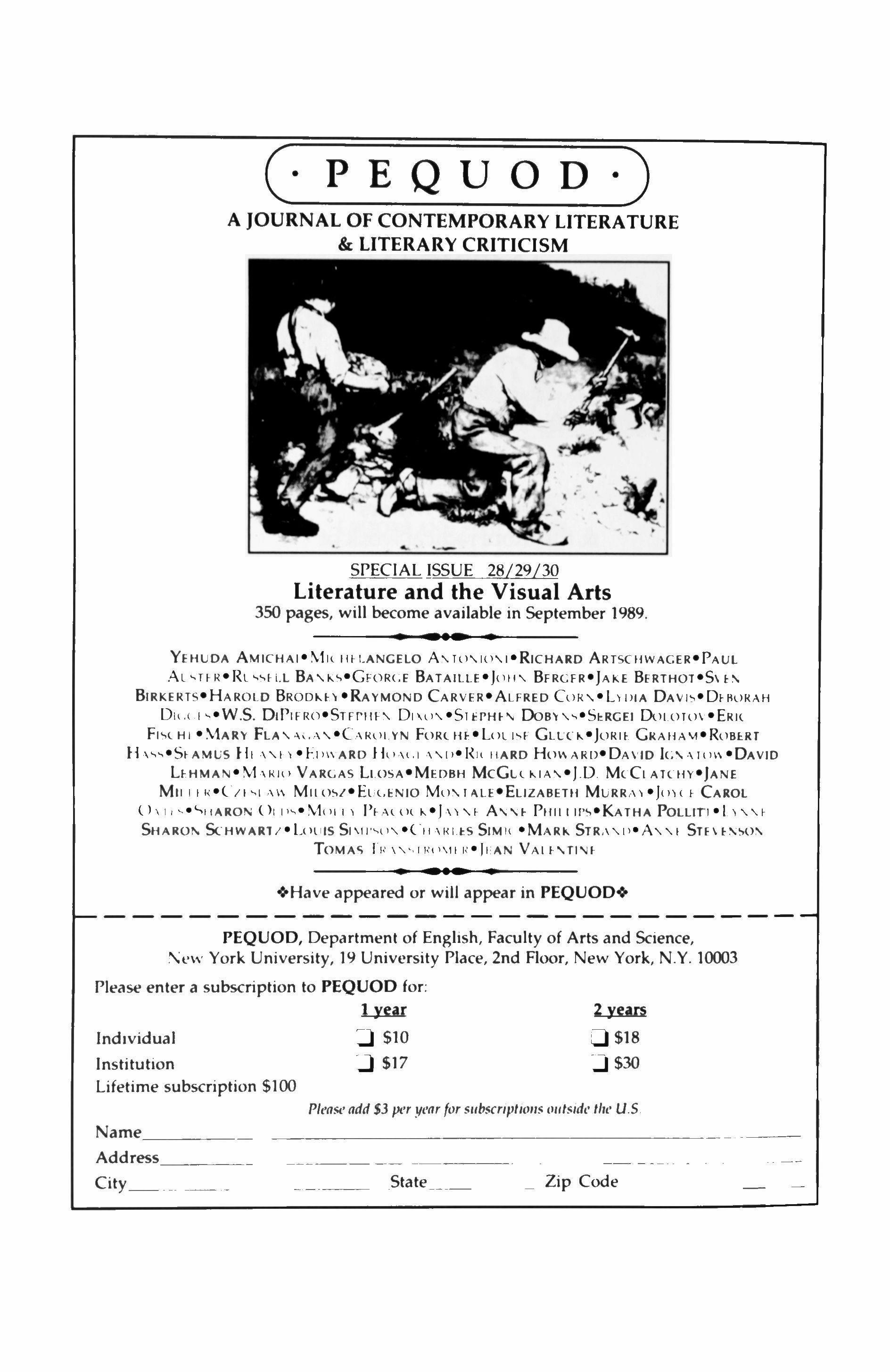
SPECIAL ISSUE 28/29/30
Literature and the Visual Arts 350 pages, will become available in September 1989.
YEHUDA AMICHAI·'llt IIILANGELO A, Tll'-!()'-!·RICHARD ARTSCHWAGER.PAUl AL "HR.lh ""H.L BA,,,�·GFOR('E BATAlllE.)(lll' BFRCFR.)A"-E BERTHOT.S\�, BIRKERTS·HAROLD BROO"D.RAYMONO CARVER.ALFRED CUR,.LIIJIA DAVI".D,BUKAH DI(., I ".W.s. DIPIFRo.STFrIlF' DI\ll,.SlI'PHF" DoB\,,,.S�RGEI DOL01U\.ERll FI�lHI·\1AR\ FLA,�(.A,·CARllIYN FORllu.Lol"F GLLC".jllKIF GRAHAI.1.RoBERT H,,,·SfAMUS til \'-1 I.I-.I)\\ARO fhl\LI \'II.RI( liARD HO\\ARIJ.DA\,ID Ic"·\J()\\.DAVID LFHMAN·'! \KI(I VARGAS LIOSA.MEDBH McGLl "IA'.).o. MlCI ATCHy.jANE Mil I" .li I "I .\ \\ Mil 0'>'· ELl-ENID Me», II\LE.EuZABETH MURR,·\ I.)' 1\ ( f CAROL (. ) \ "IIARON (. )1 ",. 'I, Ii I 1 1'1 Al ()( ".) \ \ -, A", F PHil I II'''. KA THA POLUTI .1 \ v -, 5HAROJI. SCHWARl;. L(llIIS 51 \II'"'' .ell \ I< I.ES SIMI( MAR" 5TR,\ '-I A" I 5TFI �,'>o, TOMAS I" \V,IF(I\l1 "·,1 AN VAl F'T1'\iF
+Have appeared or will appear in PEQUOD+
PEQUOD, Department of English, Faculty of Arts and Science, .'\l'l\' York University, 19 University Place, 2nd Floor, New York, N.Y. 10003
Please enter a subscription to PEQUOD for: I..nn :J $10 .] $17 0$18 .]$30
Individual Institution
Lifetime subscription $100 Pleas» add $3 per y,'ar for subscnptions ,,"tsld,' the u.s
Name Address
City_ State Zip Code
SENECA REVIEW
Vol. XIX, No.1
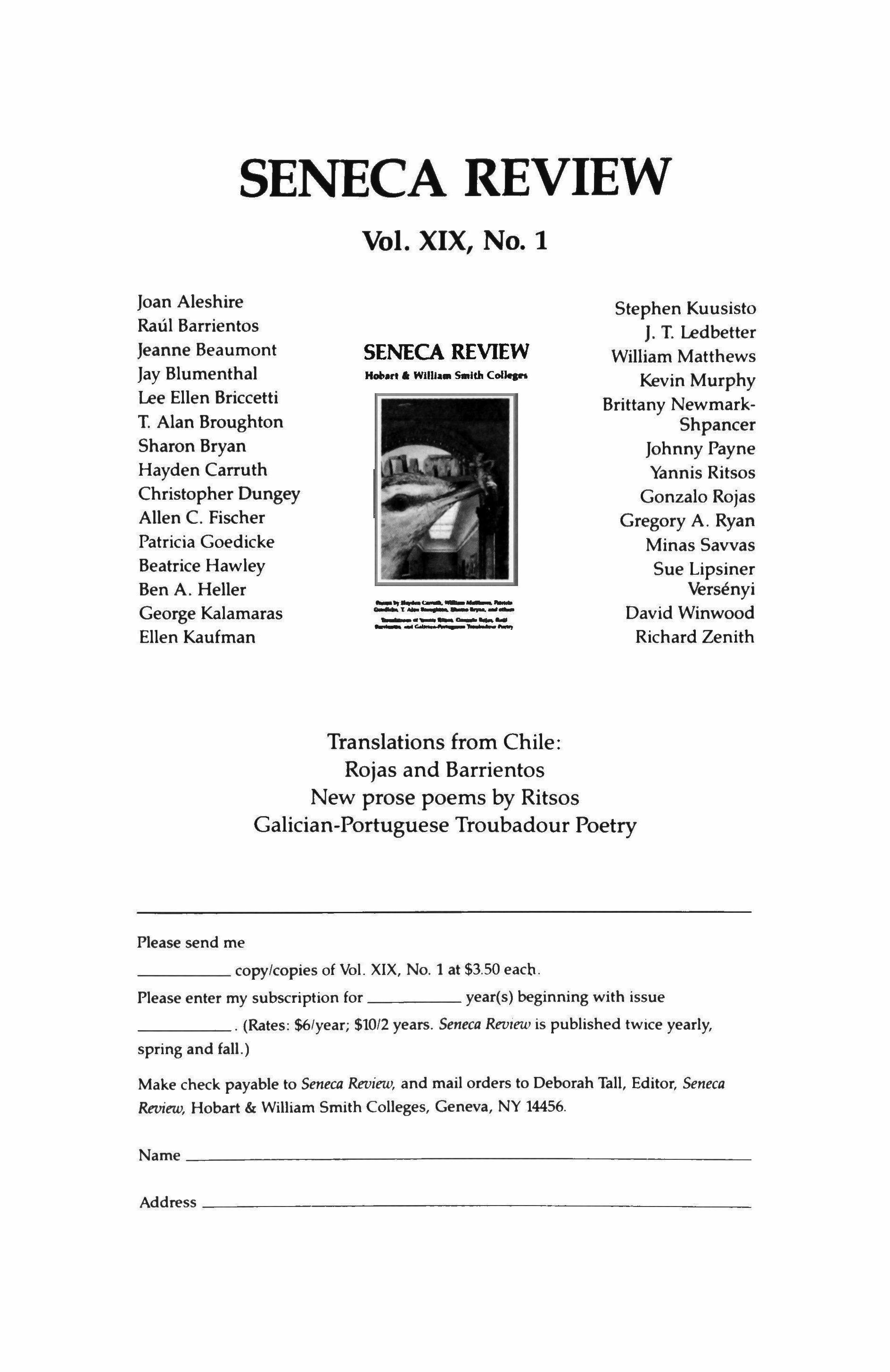
Joan Aleshire
Raul Barrientos
Jeanne Beaumont
Jay Blumenthal
Lee Ellen Briccetti
T. Alan Broughton
Sharon Bryan
Hayden Carruth
Christopher Dungey
Allen C. Fischer
Patricia Goedicke
Beatrice Hawley
Ben A. Heller
George Kalamaras
Ellen Kaufman
SENECA REVIEW
Stephen Kuusisto
J. T. Ledbetter
William Matthews
Kevin Murphy
Brittany NewmarkShpancer
Johnny Payne
Yannis Ritsos
Gonzalo Rojas
Gregory A. Ryan
Minas Savvas
Sue Lipsiner Versenyi
David Winwood
Richard Zenith
Translations from Chile: Rojas and Barrientos
New prose poems by Ritsos Galician-Portuguese Troubadour Poetry
Please send me copy/copies of Vol. XIX, No.1 at $3.50 each.
Please enter my subscription for year(s) beginning with issue (Rates: $6lyear; $10/2 years. Seneca Review is published twice yearly, spring and fail.)
Make check payable to Seneca Review, and mail orders to Deborah Tall, Editor, Seneca Review, Hobart & William Smith Colleges, Geneva, NY 14456.
Name
Address
H • Willi Seith Col "--�-.,_,,., _..,.'t a... a... .._-�,__._...,

Early praisefor Man Without Memory
Stories by Richard Burgin
"Richard Burgin discovers the madness in naturalism and the sanity in surrealism as if reconciling Singer and Borges. This is a brilliant book.
--David Shapiro, author ofLateness and House Blown Apart
"Burgin excels in pinpointing the neurotic behavior of the desperately lonely Burgin's chilling characters will stay with the reader long after his book is finished."
--Booklist
Refreshingly dissimilar to almost anything else in recent American fiction."
--Madison Smartt Bell, author ofThe Year o(Sjlence and Soldier's Joy
"I have not read a contemporary short story collection in a long time that gave me such consistent pleasure."
--Phillip Lopaie, author ofThe Rug Merrhqnl and Agajnst lo;e de Vivre
"Perfectly wise and delicate in their humor and irony, these�
stories are singular achievements
--Toby Olson, author ofI.l11Jh...and The Womqn Who Ey;aped From Shame ::
"Man Without Memory is an astonishing feat... these voices will
horrify, stun, rumble in your bones
-Sharon Sheehe Stark, author ofA W,,£(/jng Season
Available atfine bookstores or order directlyfor $14.95from: University of Illinois Press c/o CUP Services P.O. Box 6525, Ithaca, NY 14851 (800)666-2211
I·
I':::
iili i
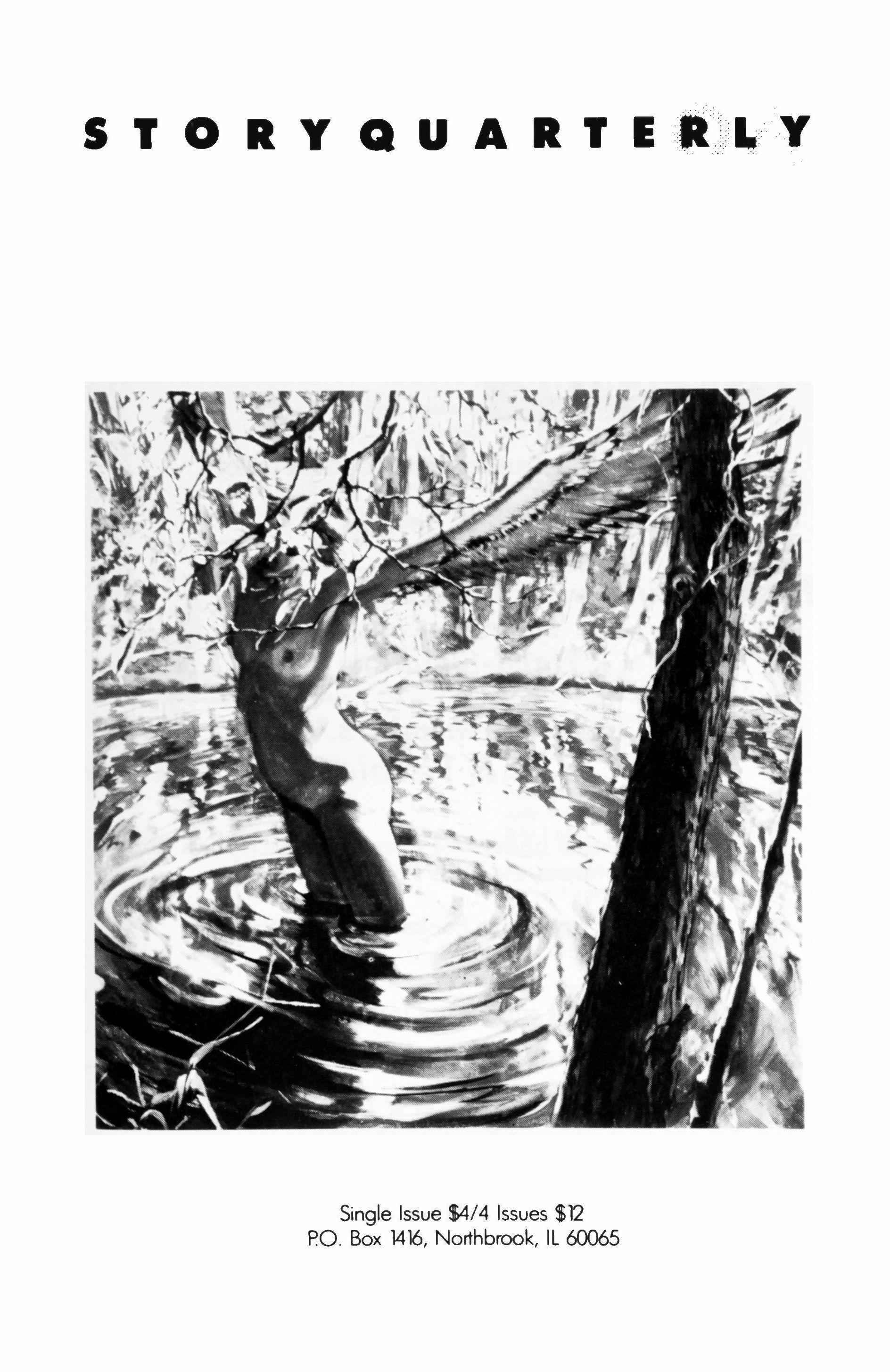
5 , 0 R Y QUA R , E R:L Y Single Issue $4/4 Issues $12 PO. Box 1416, Northbrook, IL 60065

celebrates its 45th Anniversary with four $5000 awards Chosen in international competition Red Letters Homecoming with Reflections Hand-Shadows The Ocean Remembers It Is Visable All are available under one cover in subscription ($20) from the QRL Poetry Series or from your bookstore or library (For manuscript submitting information send SASE)
SHENANDOAH
THE WASHINGTON AND LEE UNIVERSITY REVIEW
"Full of fictional, critical, poetic and biographical splendor." - The New York Times Book Review
"The best literary magazines have always endeavored to discover, accommodate, and sustain good writing ShtfllJruJotJA does all three." - &oklisl
"A showcase for exceptional writing." - The Washington Post
AMONG OUR PAST CONTRIBUTORS:
Alice Adams
W. H. Auden
John Berryman
Philip Dacey
James Dickey
William Faulkner
Jorie Graham
Seamus Heaney
John Hersey
Conrad Hilberry
Daniel Hoffman
William Hoffman
Maxine Kumin

Robert LoweU
Thomas McGuane
Howard Nemerov Flannery O'Connor
Reynold. Price
David Slavin
Jean Stafford
Peter Taylor
Anne Tyler
John Updike
Eudora Welty
Richard Wilbur
Robert Wrigley
SHENANDOAH, Box 722, LEXINGTON, VA. 24450
Name
Add�ss
SINGLE ISSUE: 53.50 SUBSCRIPTION: 511.00 A YEAR (514.00 FOREIGN) City State Zip -=_=_ TQ
Cultural Critique
Number 11

John Boly
Deconstruction as a General Sys
tem: Tropes, Disciplines, and Politics
Timothy Brennan
Literary Criticism and the Southern Question
Laura Donaldson
(ex) Changing (wo) Man: Towards a Materialist-Feminist Semiotics
Hans Robert Jauss
The Literary Process ofModernism from Rousseau to Adorno
Renate Lachmann
Bakhiin and Carnival: Culture as Counter-Culture
Donald Morton and Mas'ud Zavarzadeh
The Cultural Politics of the Fiction Workshop
Brent Whelan "Further": Reflections on CounterCulture and the Postmodern
Martha Woodmansee
Toward a Genealogyofthe Aesthetic: The German Reading Debate ofthe 1790s
Number 12 Special Issue
Discursive Strategies and the Economy of Prestige
John Barrell
'The Dangerous Goddess": Masculinity, Prestige, and the Aesthetic in Early Eighteenth-Century
Britain
Catherine Hall
The EconomyofIntellectual Prestige: Thomas Carlyle, John Stuart Mill, and the Case of Governor Eyre
Richard Leppert
Music, Representation, and Social Order in Early-Modern Europe
Bruce Lincoln
Mortuary Ritual and Prestige Economy: The Malaganfor Bukbuk
Susan McClary
Terminal Prestige: The Case ofthe Avant-Garde Music Composition
Gregory Nagy
The "Professional Muse" and Models ofPrestige in Ancient Greece
Jochen Schulte-Sasse
The Prestige of the Artist Under Conditions ofModernity
James c. Scott
Prestige as the Public Discourse of Domination
Subscriptions: Check or money order (in U.S. dollars) should be made payable to Cultural Critique and sent to English Departament, University of Minnesota, 207 Church St. S.E., Minneapolis, MN 55455.
Individuals: $20 per year (three issues); Institutions: $40 per year. (Subscriptions outside the U.S., add $4 postage per year).
RECIPIENT OF 1989 GRANT FROM THE NATIONAl. ENDOWMENT FOR THE ARTS
Special Issues in 1989
EXPERIMENTAL
WRITING
NATURE WRITING

Guest Editor
Ronald Sukenick
Guest Editor Thomas Lyon
Contributors to Witness in 1987 and 1988
Lee K. Abbott
Carol Ascher
Clara Asscher-Pinkhof
Charles Baxter
Madison Smartt Bell
Joe David Bellamy
Charles Bernstein
Robert Bly
Sidney Bolkosky
Rosellen Brown
Tom Clark
Clark Coolidge
Robert Coover
Richard Currey
Jim Daniels
Fielding Dawson
Tom Disch
Irene Dische
Stephen Dixon
John Domini
Stuart Dybek
Russell Edson
Richard Elman
David Evanier
Edward Field
Amy Gerstler
Todd Gitlin
Donald Hall
Tom Hayden
Steve Heller
David Ignatow
Lawrence Joseph
Maxine Hong Kingston
Joann Kobin
Lawrence Langer
Banning K. Lary
John Lewis
Lou Lipsitz
Gordon Lish
Leo Litwak
Tom Lynch
Danny Lyon
Campbell McGrath
Askold Melnyczuk
Jim Miller
Harry Mulisch
Peter Najarian
Leonard Nathan
Joyce Carol Oates
P.J. O'Rourke
Fred pfeil
Norman Rosen
Alvin Rosenfeld
Lynne Sharon Schwanz
Peter Dale Scott
Charles Simic
Louis Simpson
Gary Snyder
Gary Soto
Keith Taylor
Diane Wakoski
Jerome Washington
Gordon Weaver
Gloria Whelan
Ruth Whitman
Eric Wilson
Kimberly Wozencraft
Lawrence Wright
Rudy Wurlitzer
lndunduals
1 yr/4 issues S16
2 yrs/8 issues S28
Institutions
1 yr/4 issues S22
2 yrs/8 issues $40
111111111 31000 Northwestern Highway Suite 200 Farmington Hills, MI 48018
Fiction Poetry Art. Criticism
Three times a year
The New York Times has called TriQuarterly "perhaps the pre-ermnent journal for literary fiction" in the nation. Chicago magazine describes it as one of the best, issue after issue." But see for yourself-subscribe now.

T-�hlft: $9.00 Sweatshrrt: s 15 00 OS O M
o L 0 XI Both in SO/50 conon/poly blend. Please speofv \lze, and quantities desired.
o 1 year ($IS) 0 2 years ($32) 0 life ($250)
Please enter my subscnptron to TrtQudrterly magazine (Foreign sobscnpnons add $4 per year)
o Charge my VISA/MasterCard #
Muitl-{:olor poster: $9.00 0
This IS" x 24" poster, designed by Glni Kondzrolka and featured as the cover of TQ *74, will be shipped In a sturdy, specially (rafted mailing tube.
o I enclose s 0 Please bill me
Signature Exp. date
Name Address
City Stolte TriQuarterly Northwestern University 2020 Ridge Avenue ZIP Evanston, illinois 60208

TriQuarterly thanks the following life subscrlbers:
David C. Abercrombie
Amin Alimard
Lois Ames
Richard H. Anderson
Roger Anderson
Sandy Anderson
University of Arizona Poetry Center
Gayle Arnzen
Michael Attas
Asa Baber
Tom G. Bell
Carol Bly
Kay Bonetti
Robert Boruch
Van K. Brock
Gwendolyn Brooks
Timothy Browne
Paul Bundy
Eric O. Cahn
David Cassak
Stephen Chapman
Anthony Chase
Freda Check
Michael Chwe
Andrew Cvr
Doreen Davie
Kenneth Day
Mark W. DeBree
Alan Distler
Anstiss Drake
John B. ElHott
Christopher English
Carol Erickson
Steven Finch
David R. Fine
Mr. and Mrs. H. Bernard Firestone
Paul Fjelstad
Torrence Fossland
Helen and C. Dwight Foster
Jeffrey Franklin
Peter S. Fritz
Mrs. Angela M. Gannon
Kathy M. Garness
Lawrence J. Gorman
Maxine Groffsky
Rev. Dr. ElHott Hagle
Jack Hagstrom
Ross B. Heath
Charles Hedde
Donald Hey
Donald A. Hillel
Craig V. Hodson
Irwin L. Hoffman
Irwin T. Holtzman
P. Hosier
Charles Huss
Curtis Imrie
Helen Jacob
Del Ivan Janik
Dr. Alfred D. Klinger
Loy E. Knapp
Sydney Knowlton
Mr. and Mrs. Carl A. Krech
Judy Kunz
Conrad A. Langenberg
John Larroquette
Isaac Lassiter
Dorothy Latiak
Patricia W. Linton
Philip Lister
Mr. and Mrs. W. J. Lorentz de Haas
Prof. Kubet Luchterhand
Ellen L. Marks
Richard Marmulstein
James Marquardt
Kevin McCanna
Robert D. McChesney
Charles Gene McDaniel
Robert McMman
Michael Meaney
George Meredith
Lois Adele Meyer
C. R. Michel
University of Michigan Hopwood Room
Ralph Miller
Kenneth Monroe
James E. Morrison IV
Max Nathan
Dean Neprud
Catherine Ohs
Paul Peters and Rosemarie Kozdron
Scott Peters
Jane Petro
Evelyn Pine
Doyle Pitman
Barbara Polikoff
Alex T. Primm
Richard Prinz, M.D.
Honora Rankine-Galloway
Anne Kathervn Ream
J. M. Reese
Peter Reich
Susan Reiners
Don Reynolds
Christopher Richter
Diane Rider
Rivier College
Sam Rosenthal
Life subscriptions are available at the rate of $250 each for individuals and $300 each for institutions, from TriQuarterly, 2020 Ridge Ave., Evanston, IL 60208.
David Roth, M.D.
Jim Rowe
Patricia Ruby
Joan Rybka
Joel Schilling, D.D.S.
Paul and June Schlueter, Ph.D.s
Mrs. H. C. Schmidt
Robert l. Schneideman
Koji Seki
David A. Selby
Herbert Shore
Martin Silverman
Gregory F. Smolarek
Dr. Wanda Sorgente
Laurel Speer

Jane M. Starkey
Michael O. Stearns
Ken Stevens
Lawrence D. Stewart
Mr. and Mrs. W. H. Sullivan
Miriam Treger-Honig
University Club of San Francisco
William E. Waechter
Daniel Wegner
Anne R. Whipple
Scott R. White
Eric Wilson
Zeljko Zic
Anthony S. Zummer
TriQuarterly Council

Lee Philip BeU
Mr. and Mn. Andrew K. Block
William BrashJer
Mr. and Mn. Richard S. Brennan
Frank D. Campion
Mr. and Mrs. Solway F. Firestone
Mr. and Mn. Stanford J. Goldblatt
Mr. and Mn. Donald Haider
Mr. and Mrs. Dagett Harvey, Jr.
Mn. James E. Hayes
Mr. and Mn. David C. Hilliard
Mr. and Mrs. Thomas D. Hodgkins
Mr. and Mn. C. Hadlai Hull
Ward Just
Mr. and Mrs. Martin J. Koldyke
Mr. and Mrs. David W. Maher
Florence D. McMillan
Mr. and Mn. Andrew McNaUy IV
Michal Miller
Fred S. Novy
Mary EUen Reynolds
Mrs. Richard RineUa
Roberta Rubin
Mrs. Earl W. Shapiro
Mr. and Mrs. Raymond L Skilling
Judith Thomburg
ScottTurow
Charles A. Whittingham
Friends of TriQuarterly
Robert A. Creamer
Mr. and Mrs. James L Currie
Mr. and Mrs. Donald Egan (patron)
Patricia P. Flentye
Mrs. Melvin Gray
Joann B. Griffrth
Mr. and Mrs. John Hartigan
Mary Gray Hughes
Fran Katz (patron)
Ms. Jane Mayer
Mrs. Marlene Welsh Phillips (Benefactor)
Fran Podulka
Barbara Polikoff
Geraldine R. Pratt
Deborah N. Rosen
Faye Schwimmer
Gilaine Shindelman (Benefactor)
Ruth Smith
Mr. and Mrs. Jules N. Stiffel
Geraldine Szymanski
The TriQuarterly Council and the Friends of TriQuarterly support the publication of TriQuarterlv Books and other projects of TriQuarteTly magazine. For infonnation about both groups, please write to the editor.








 fOT Michael
fOT Michael

















































































 for Breyten Brfycfnbach
for Breyten Brfycfnbach







































































 "Fourth of July-Jay, New York" (1955) by Robert Frank. Copyright: Robert Frank, courtesy Pace/MacGill Gallery, New York.
"Fourth of July-Jay, New York" (1955) by Robert Frank. Copyright: Robert Frank, courtesy Pace/MacGill Gallery, New York.



 "Sick of Goodbves" (1978) by Robert Frank. Copyright: Robert Frank, courtesy Pace/MacGill Gallery, New York.
"Sick of Goodbves" (1978) by Robert Frank. Copyright: Robert Frank, courtesy Pace/MacGill Gallery, New York.


 for Earl
for Earl



























































